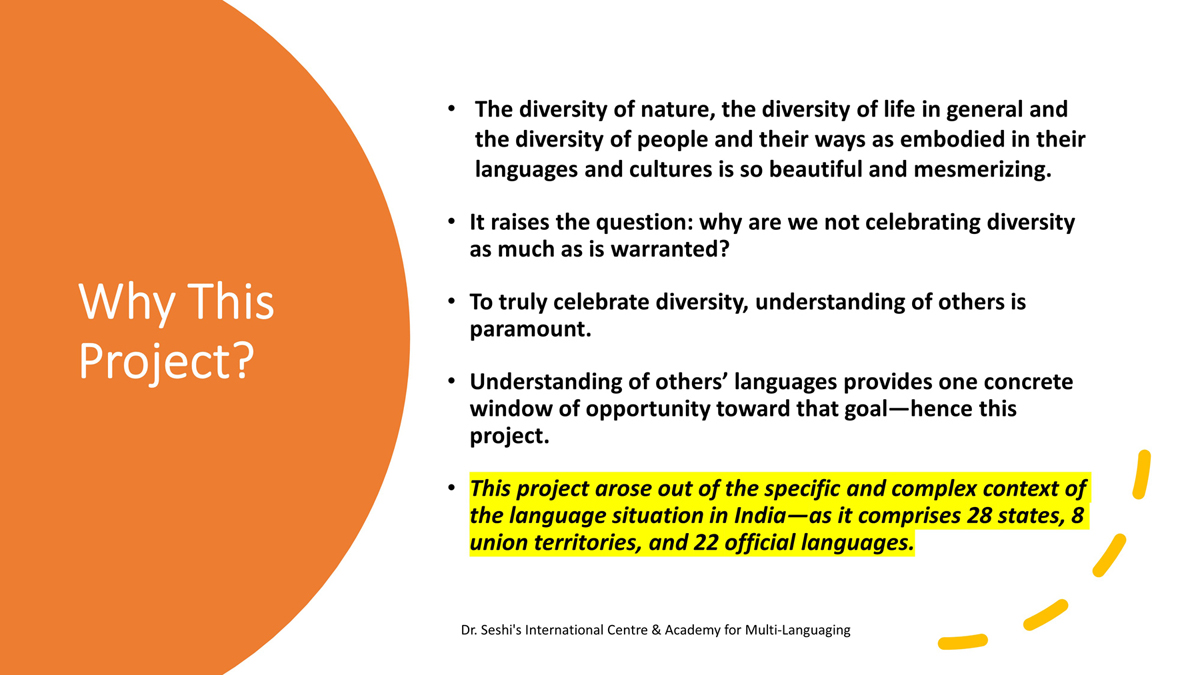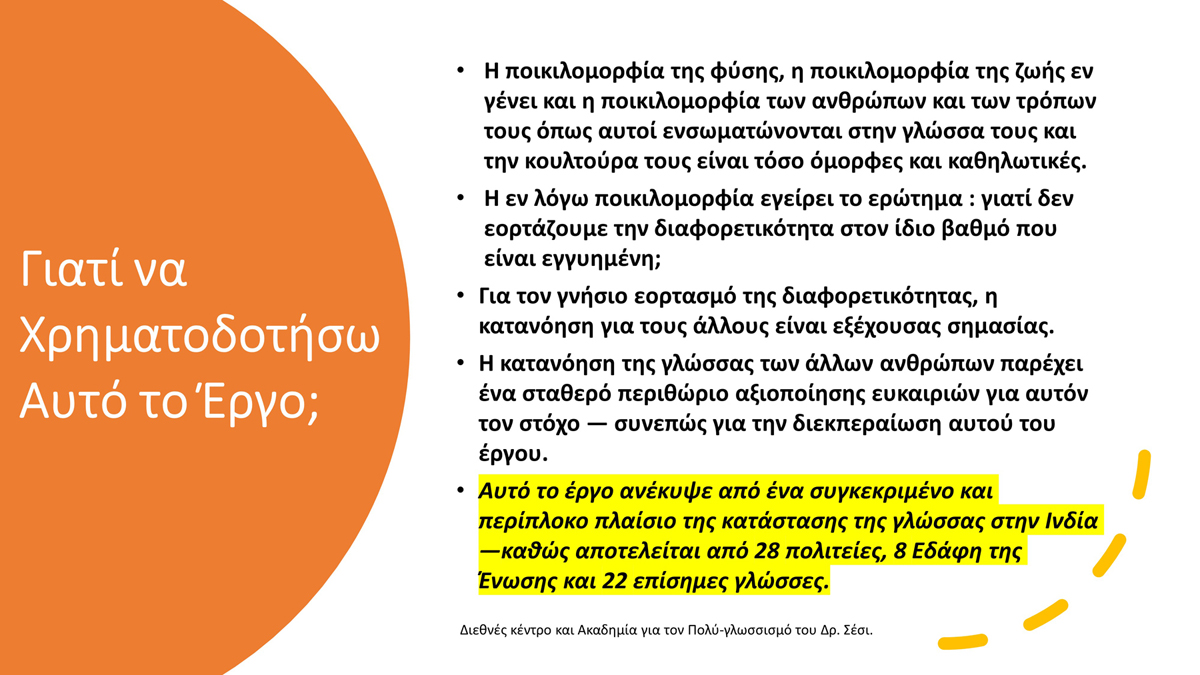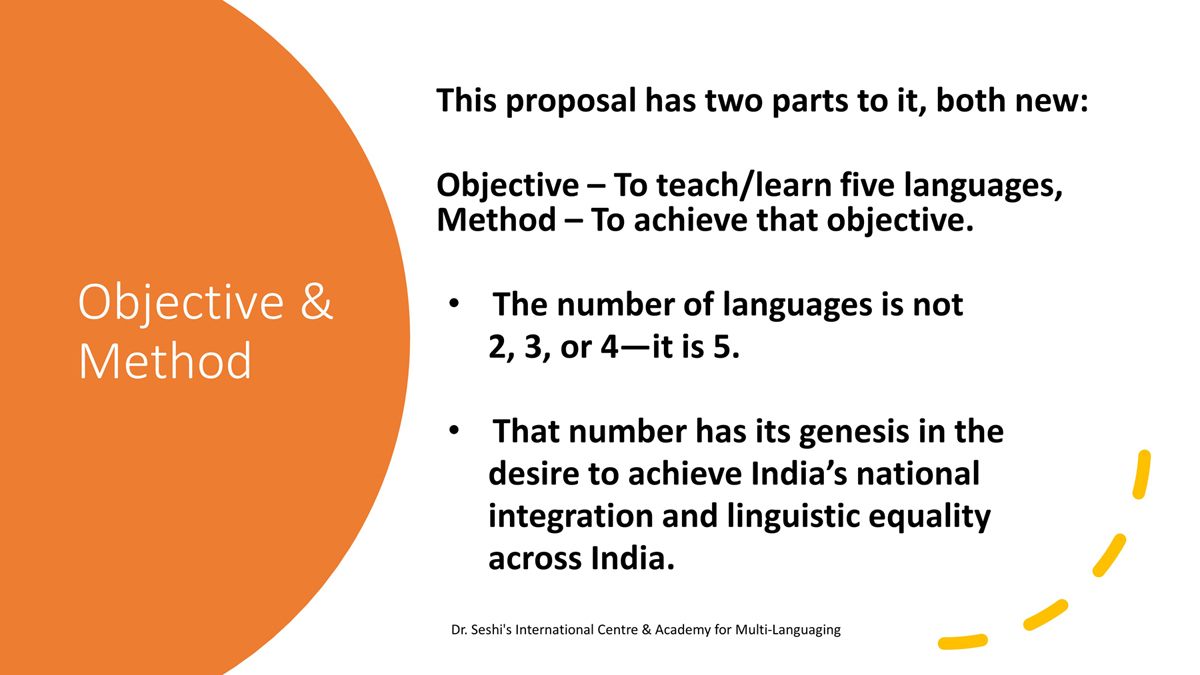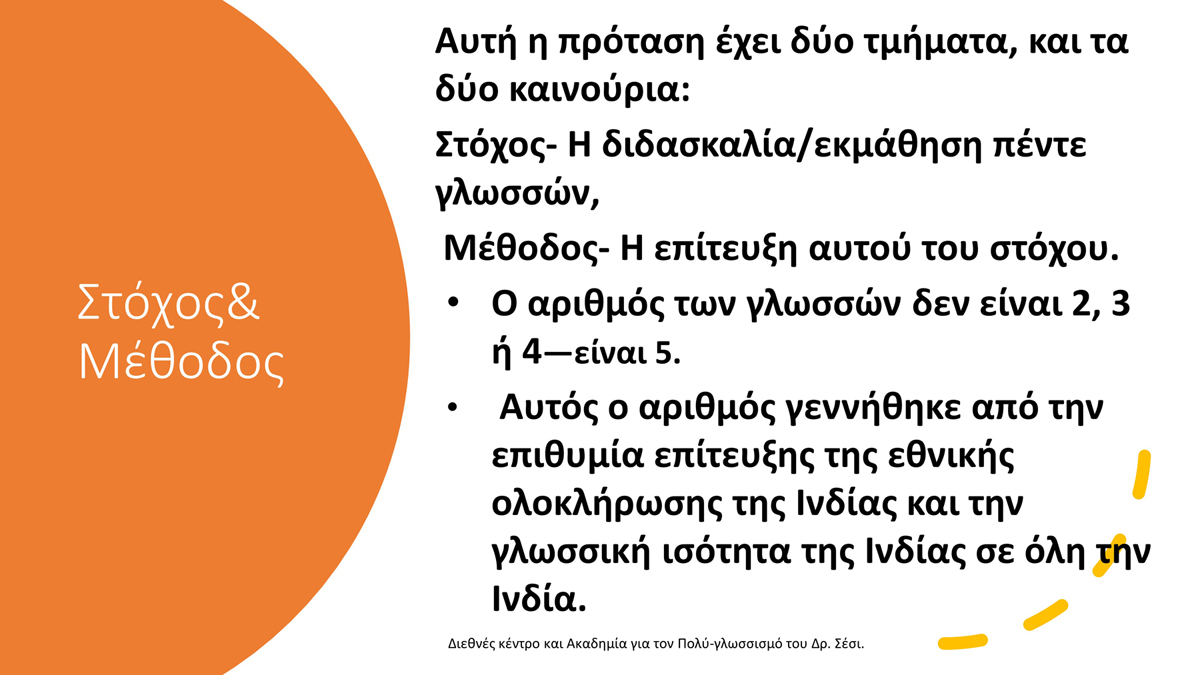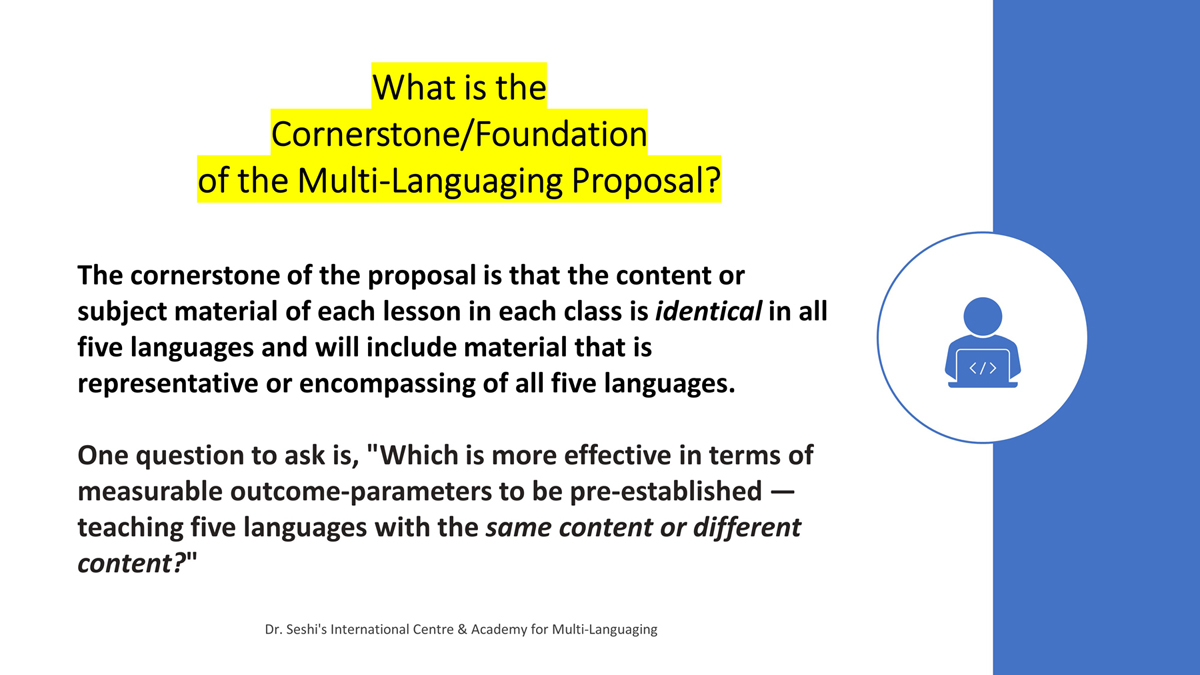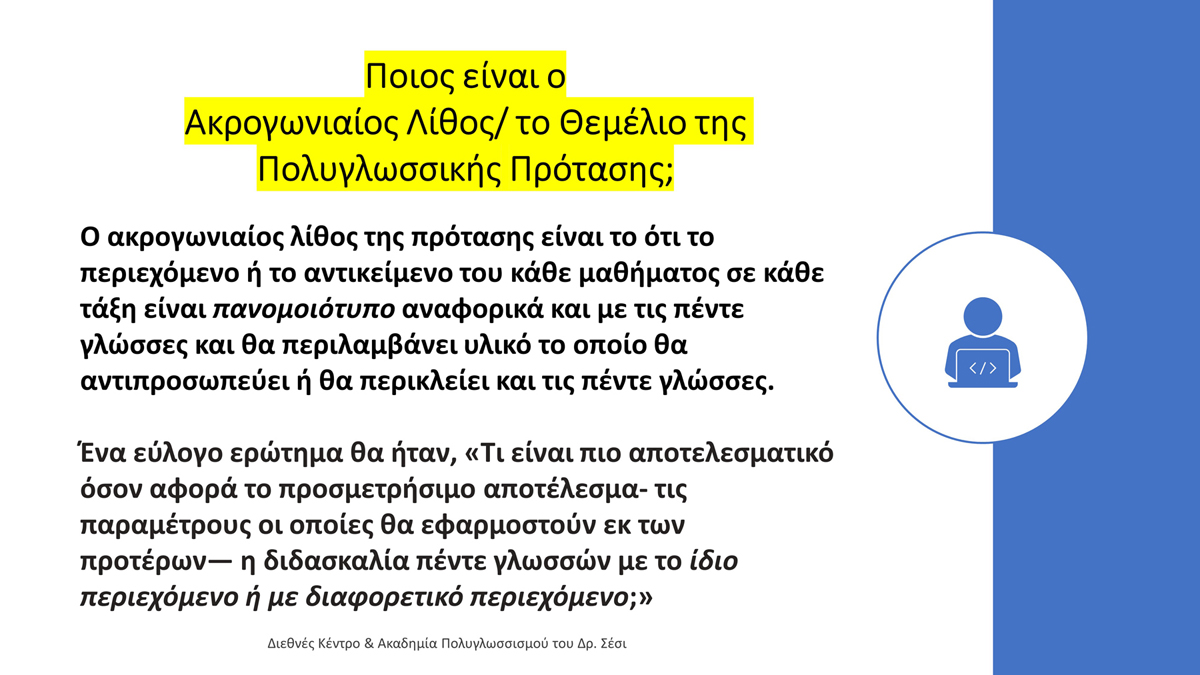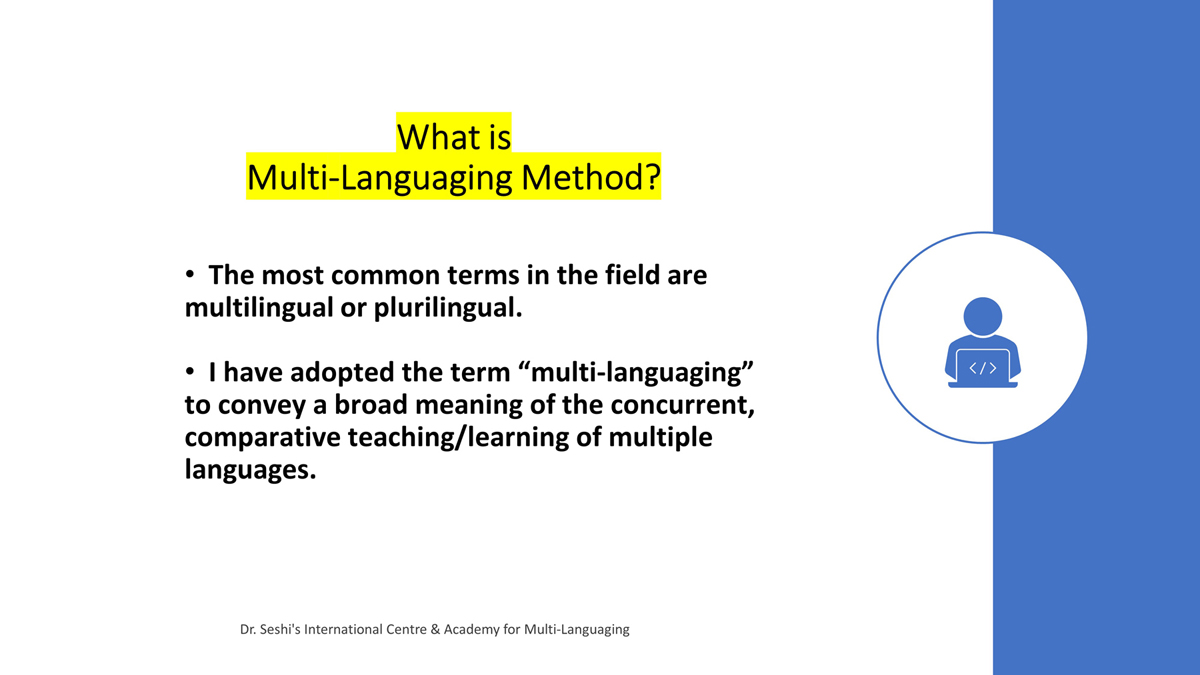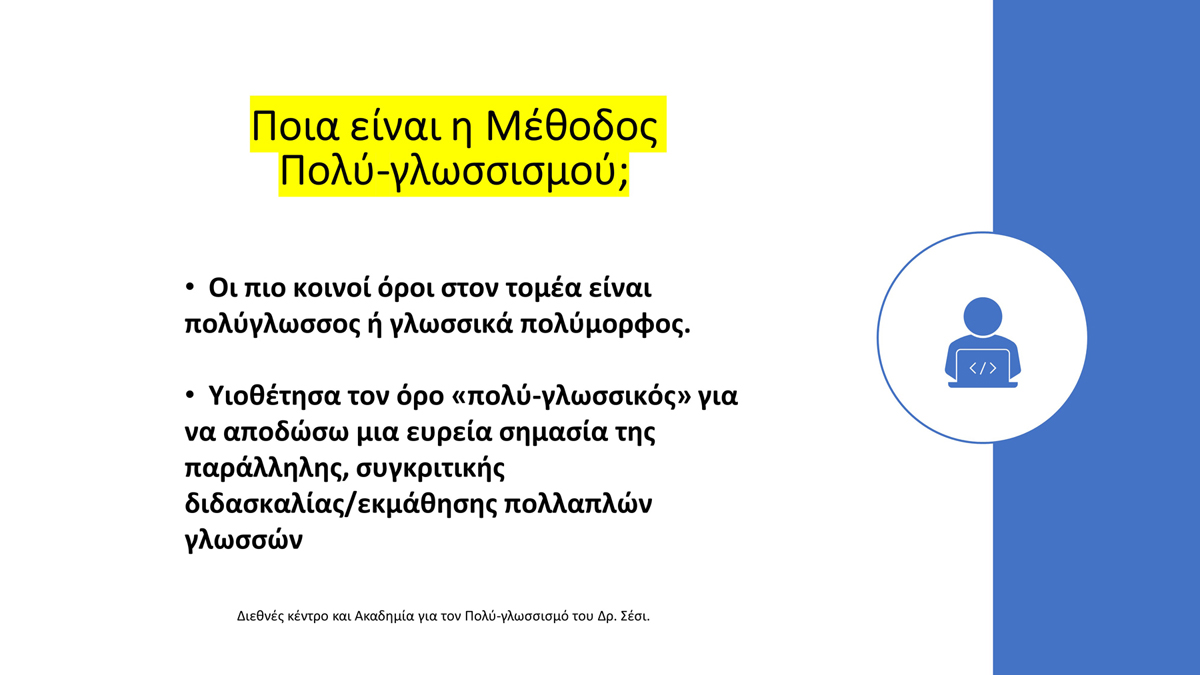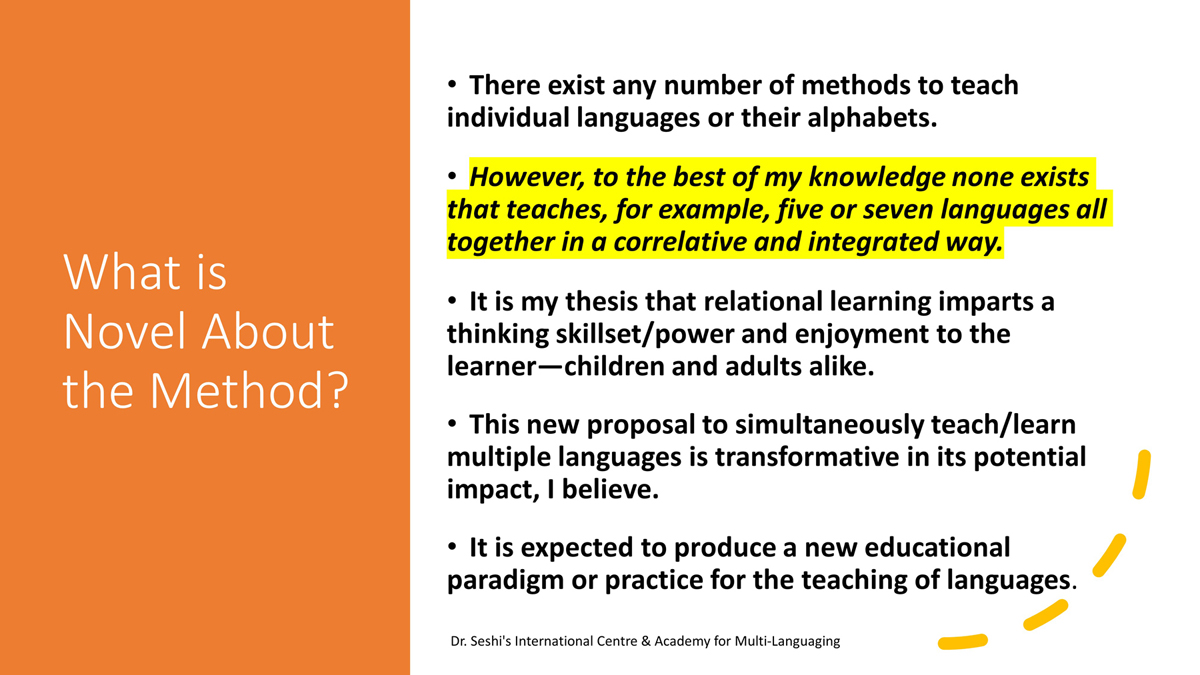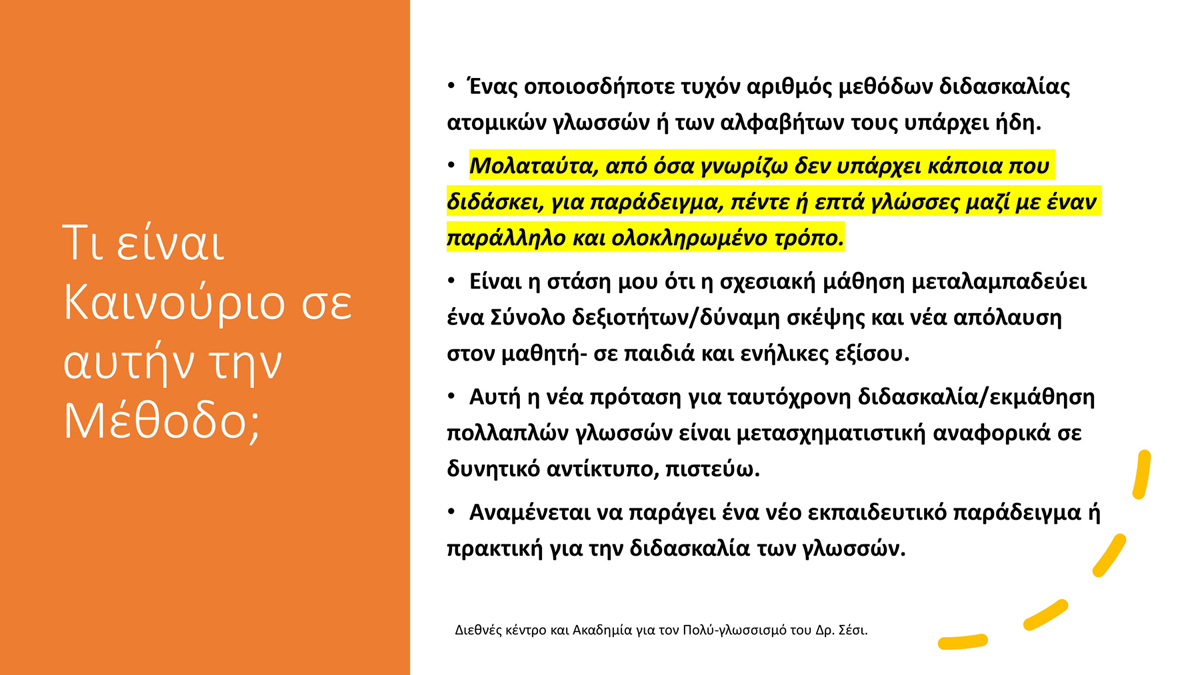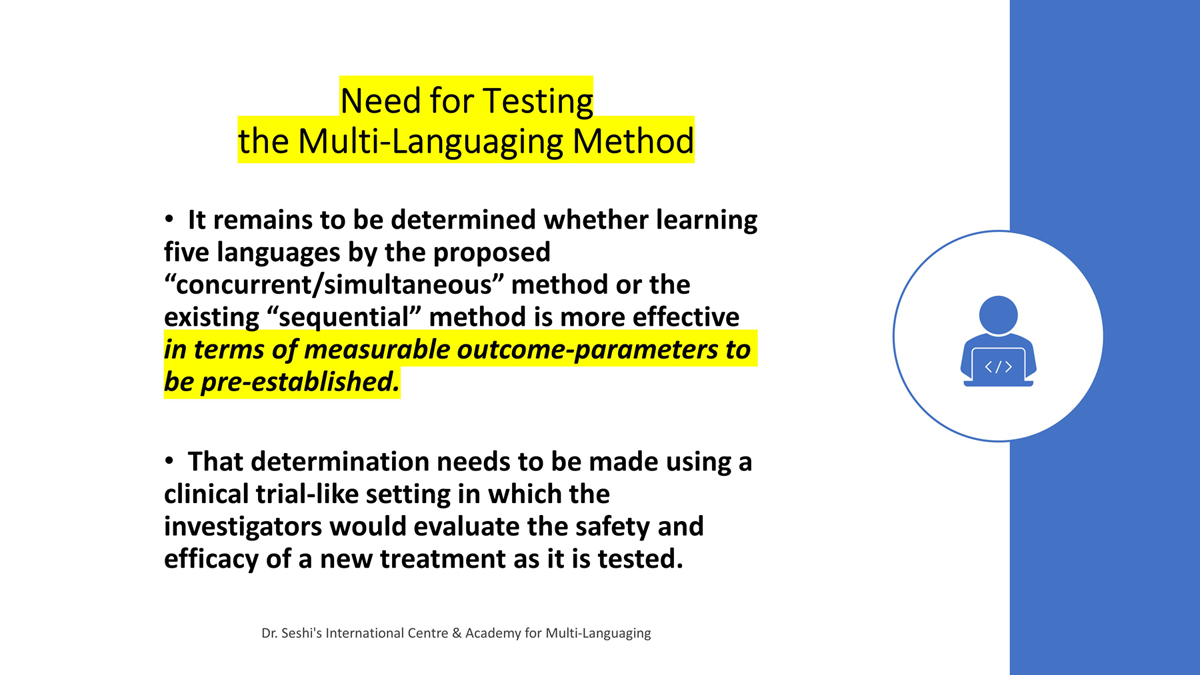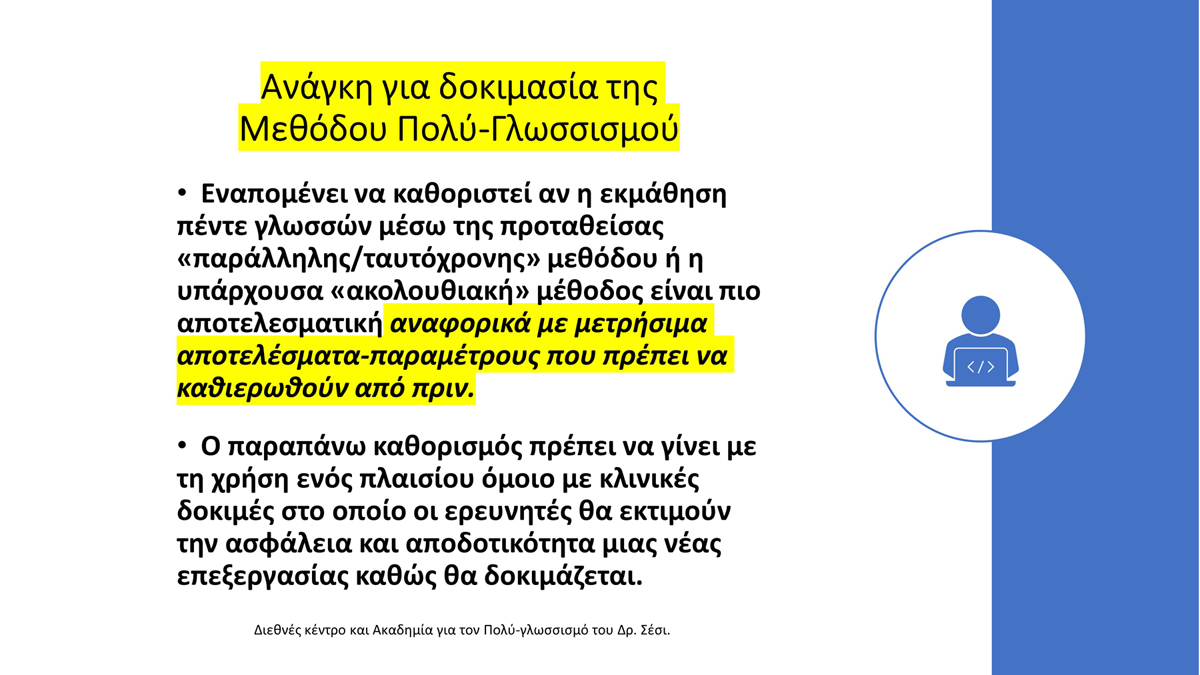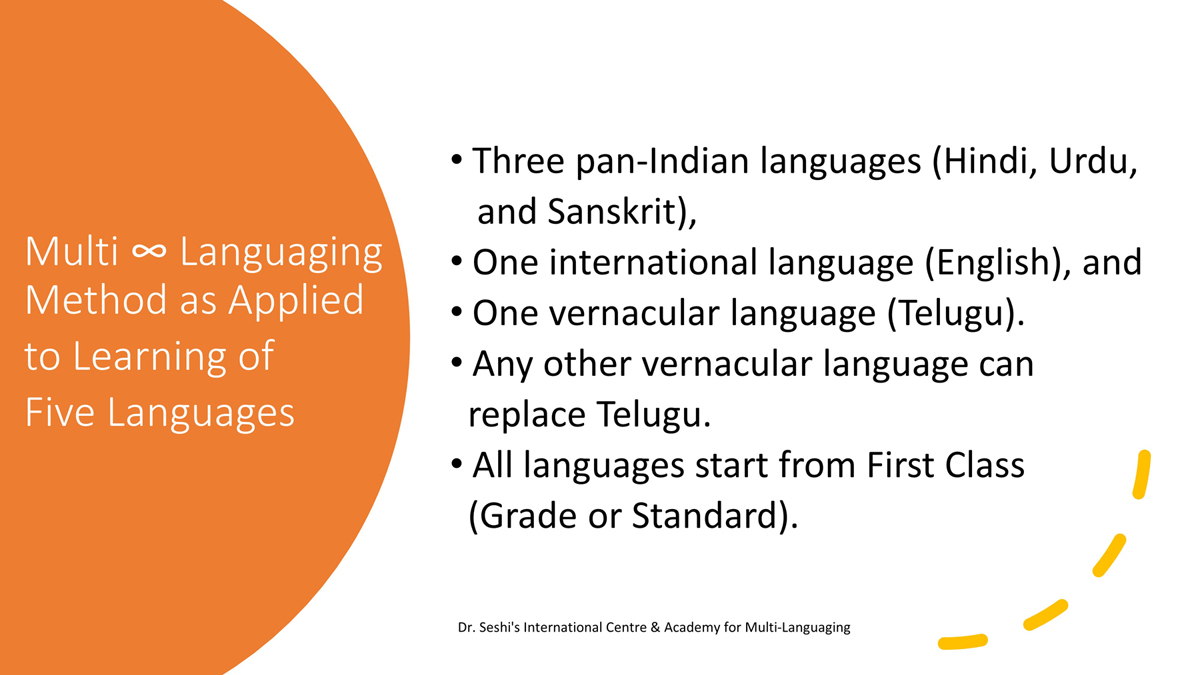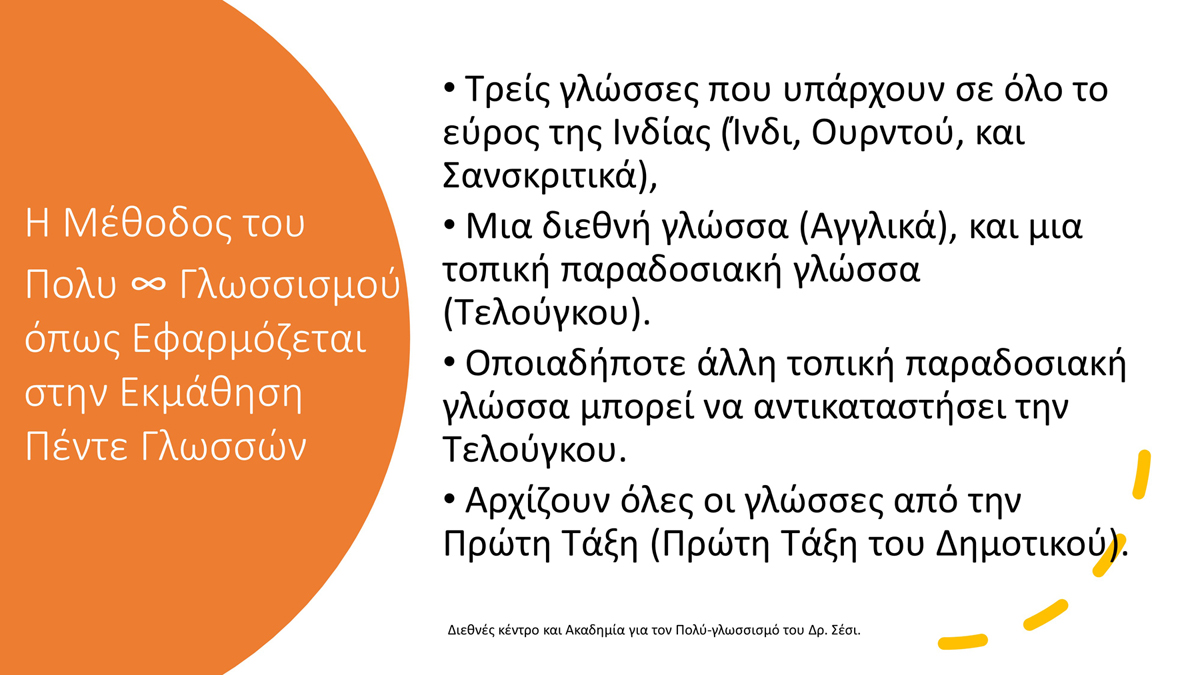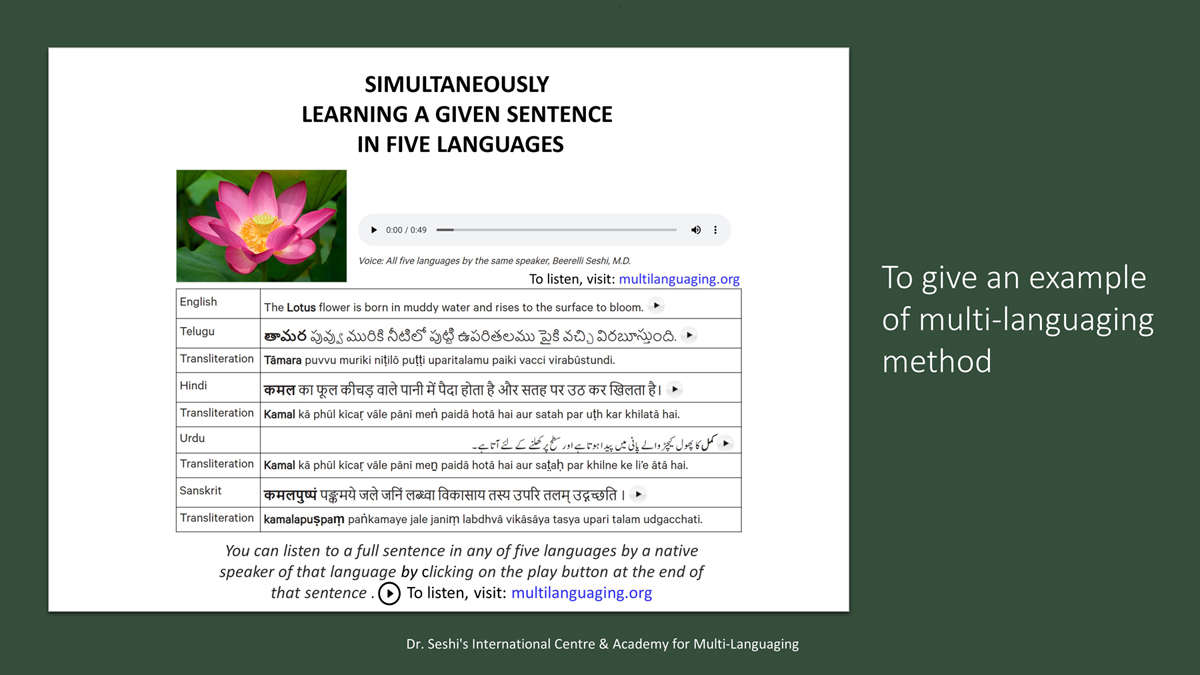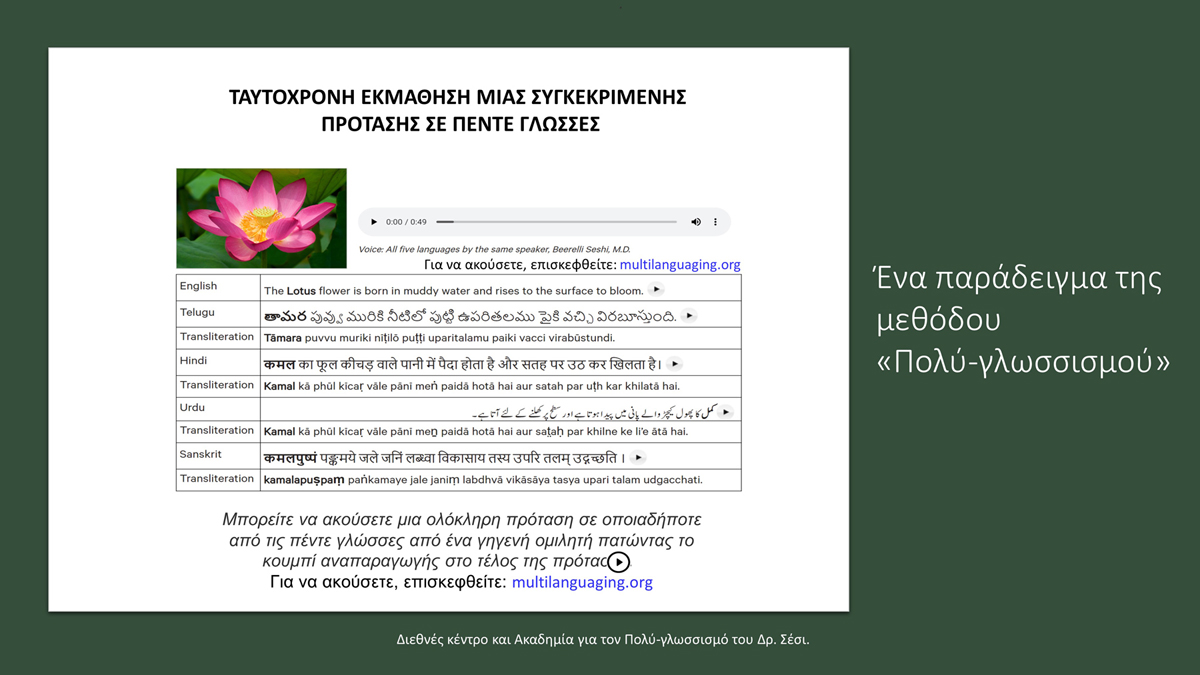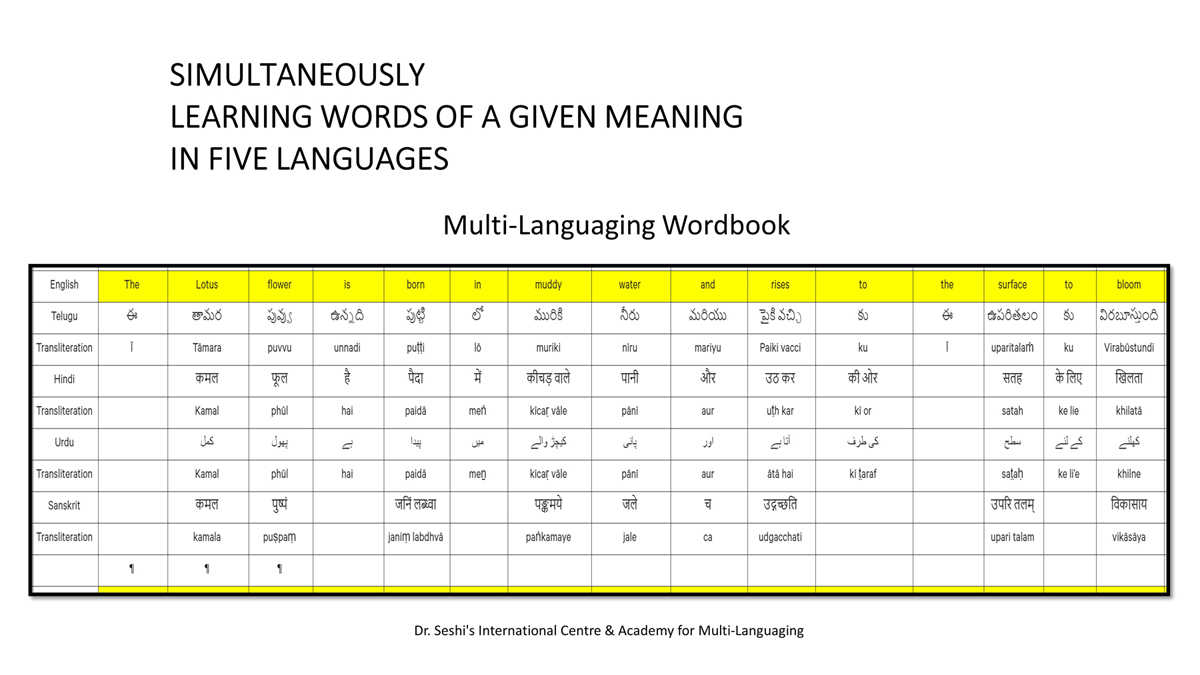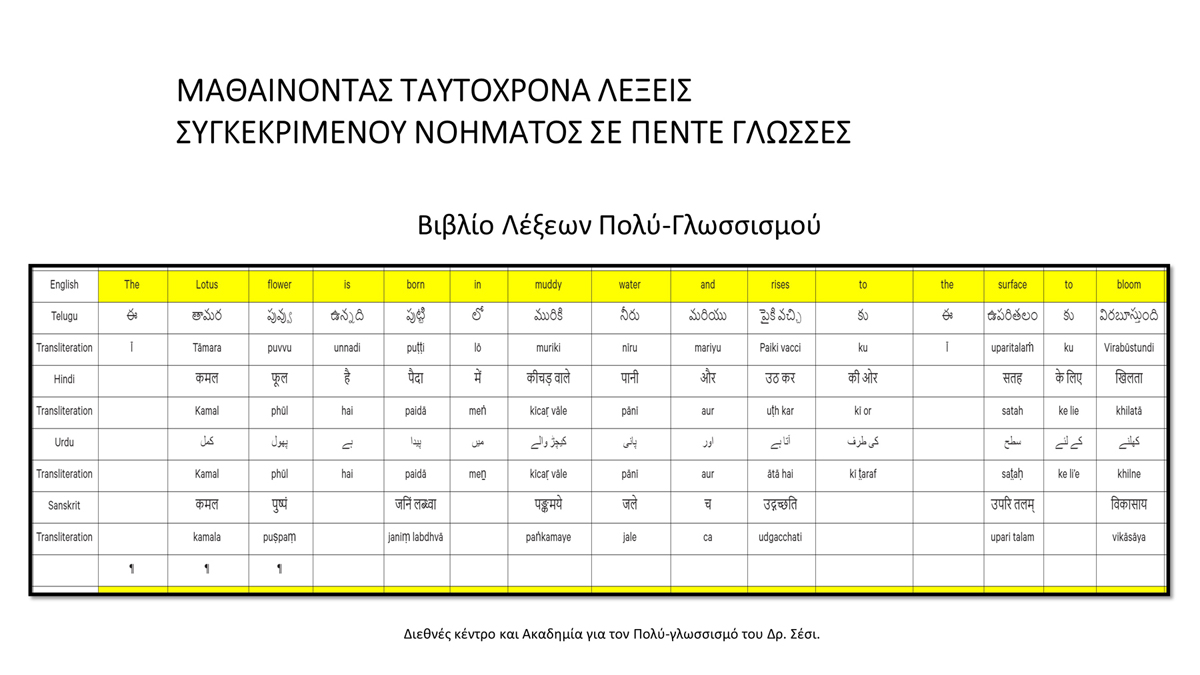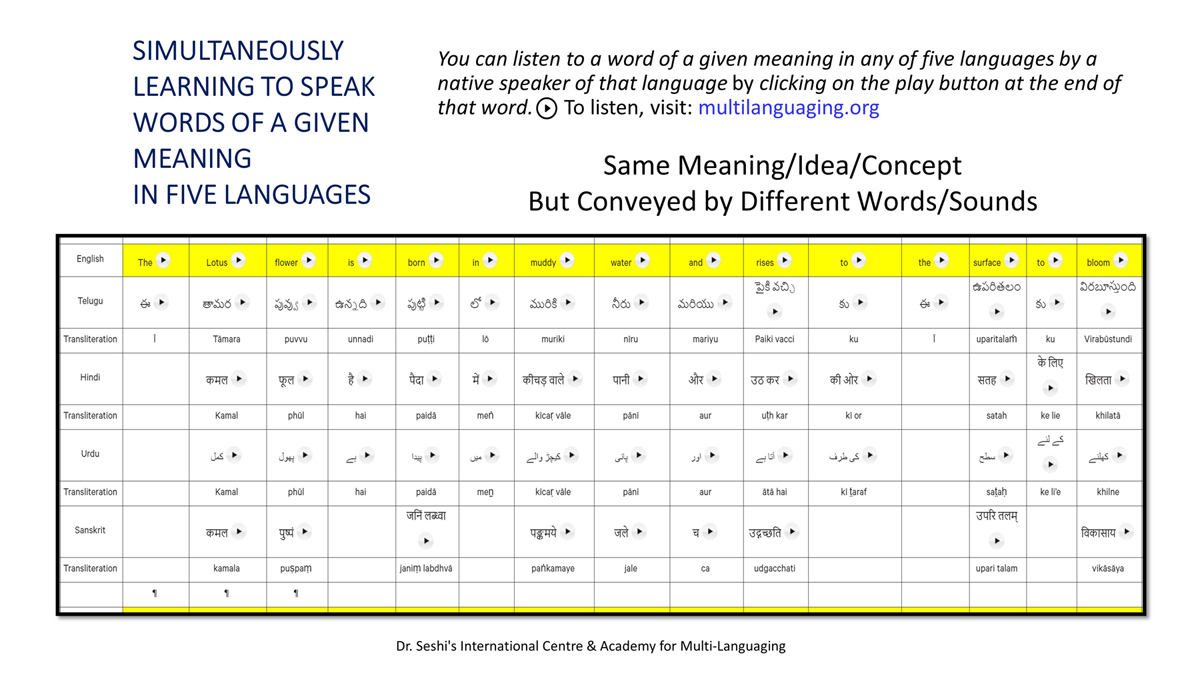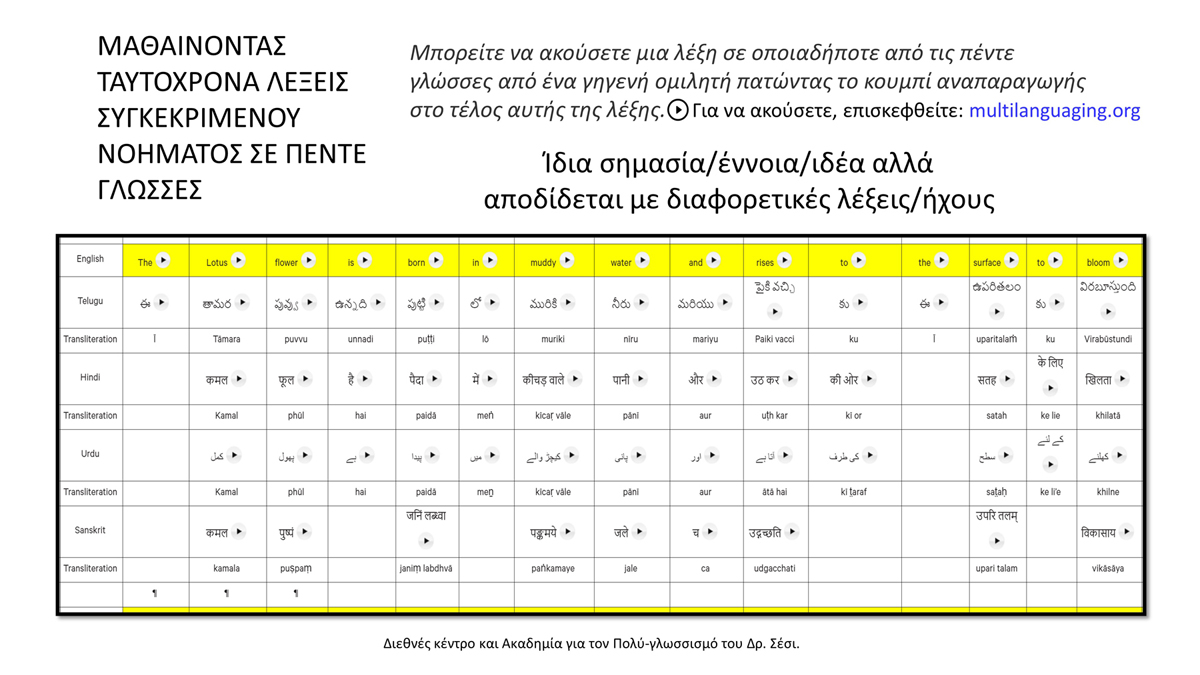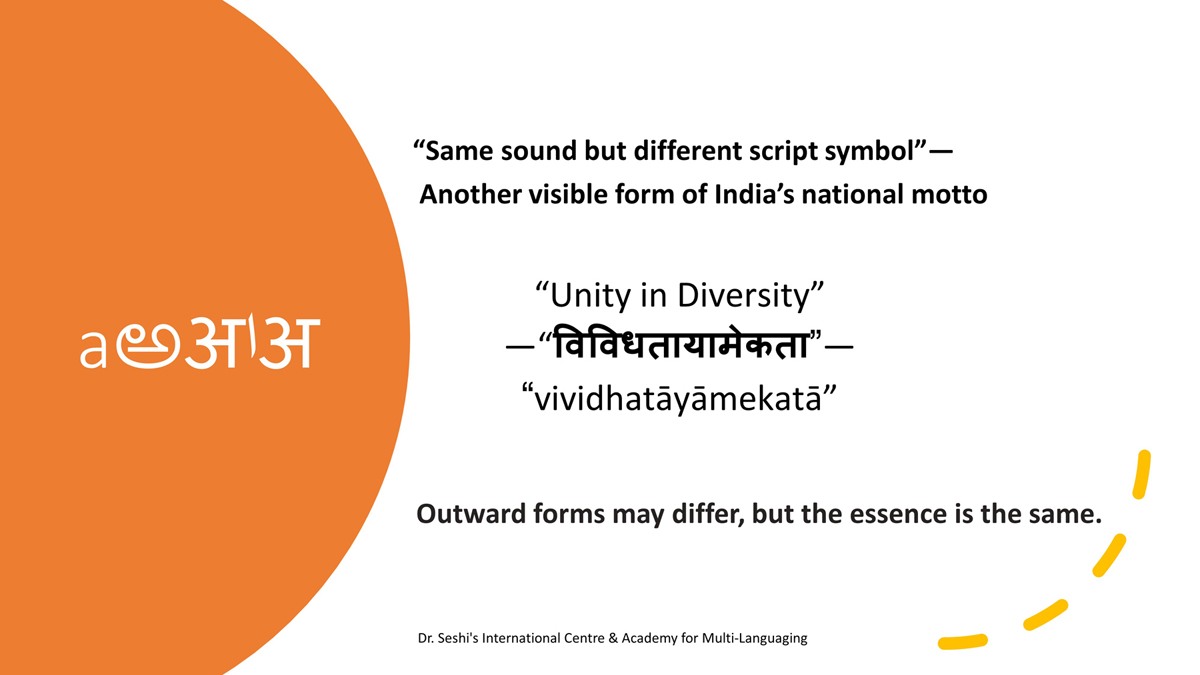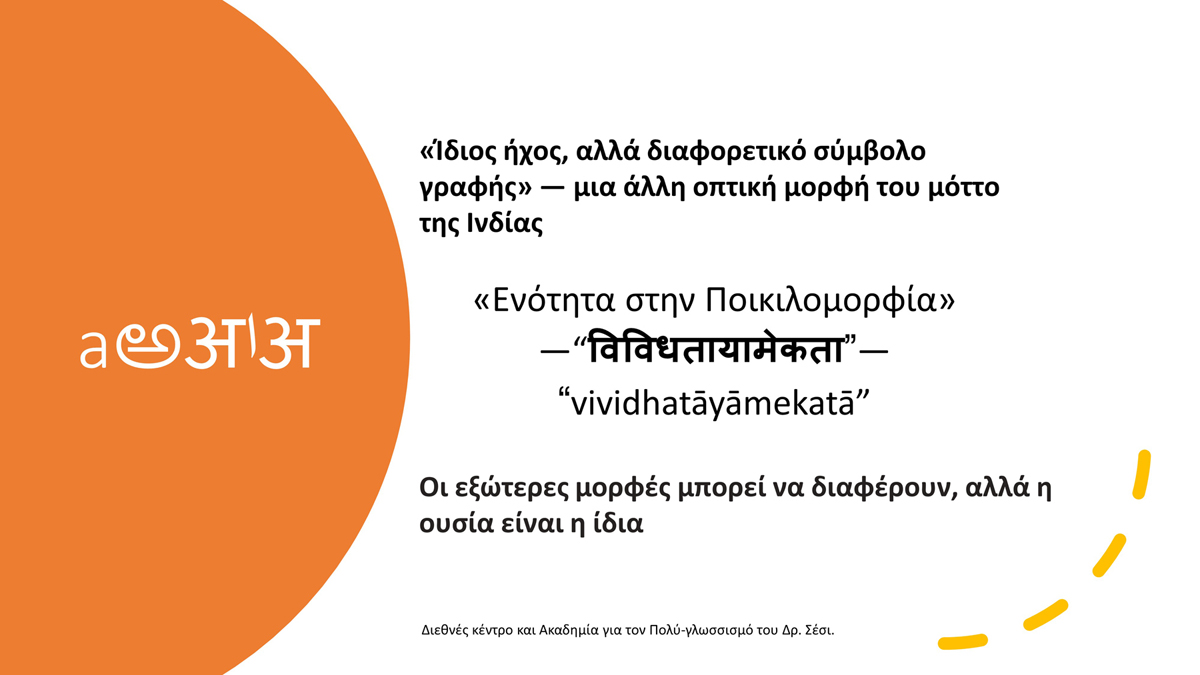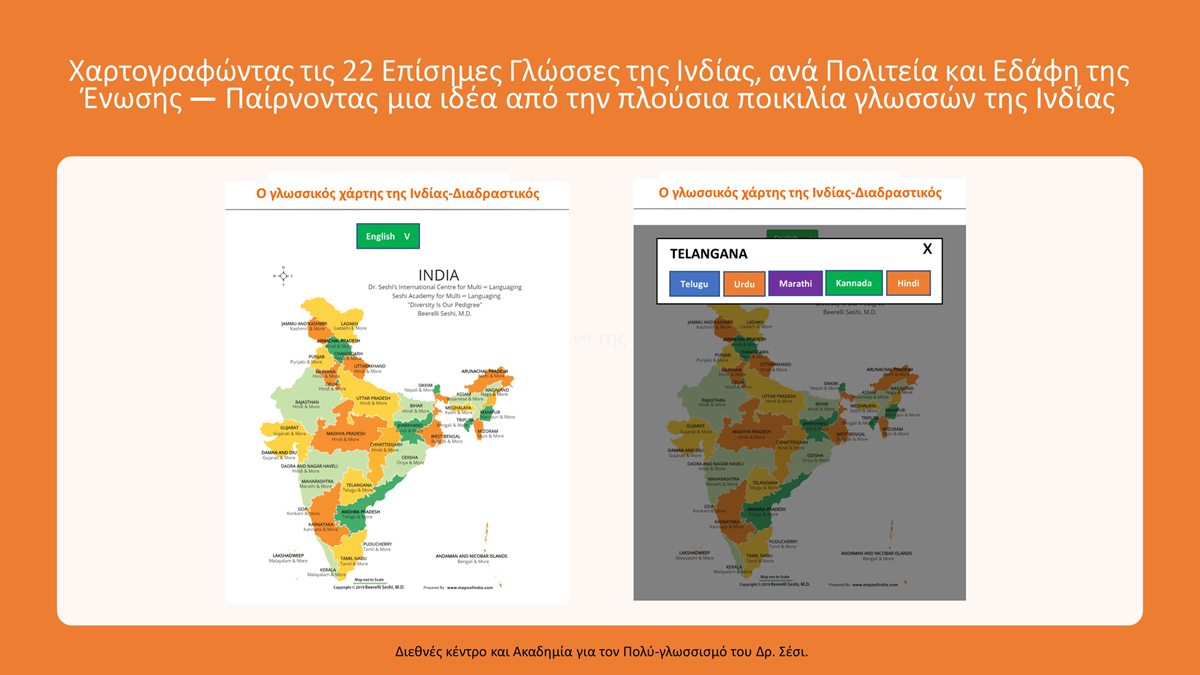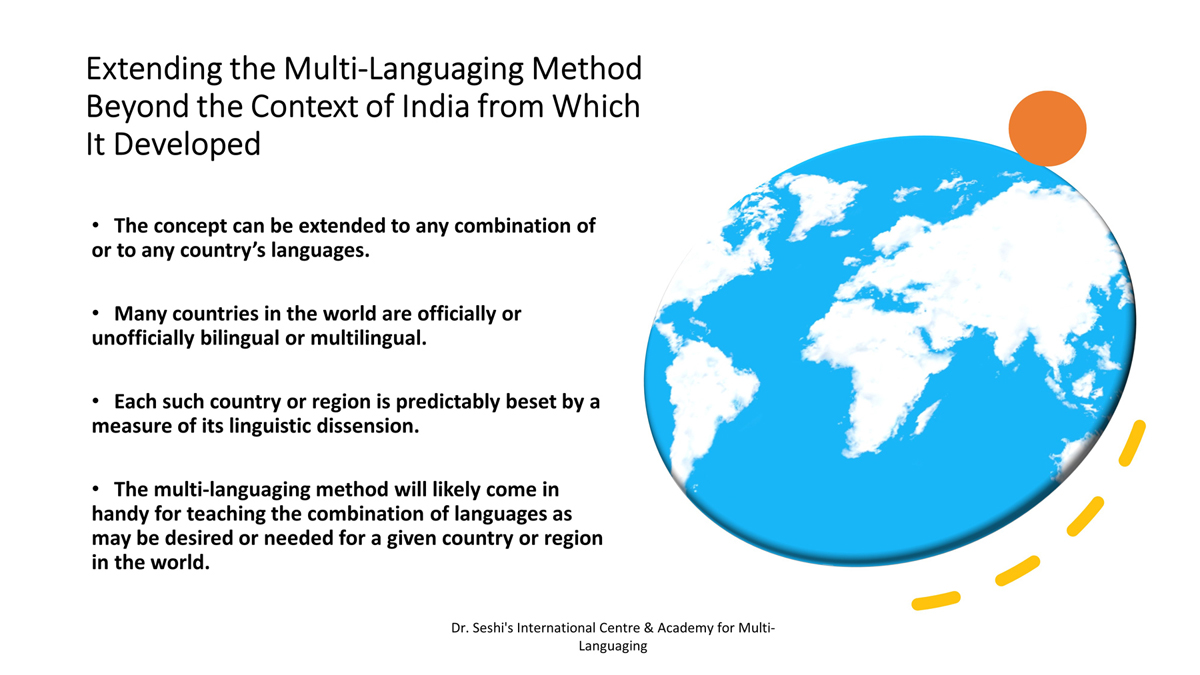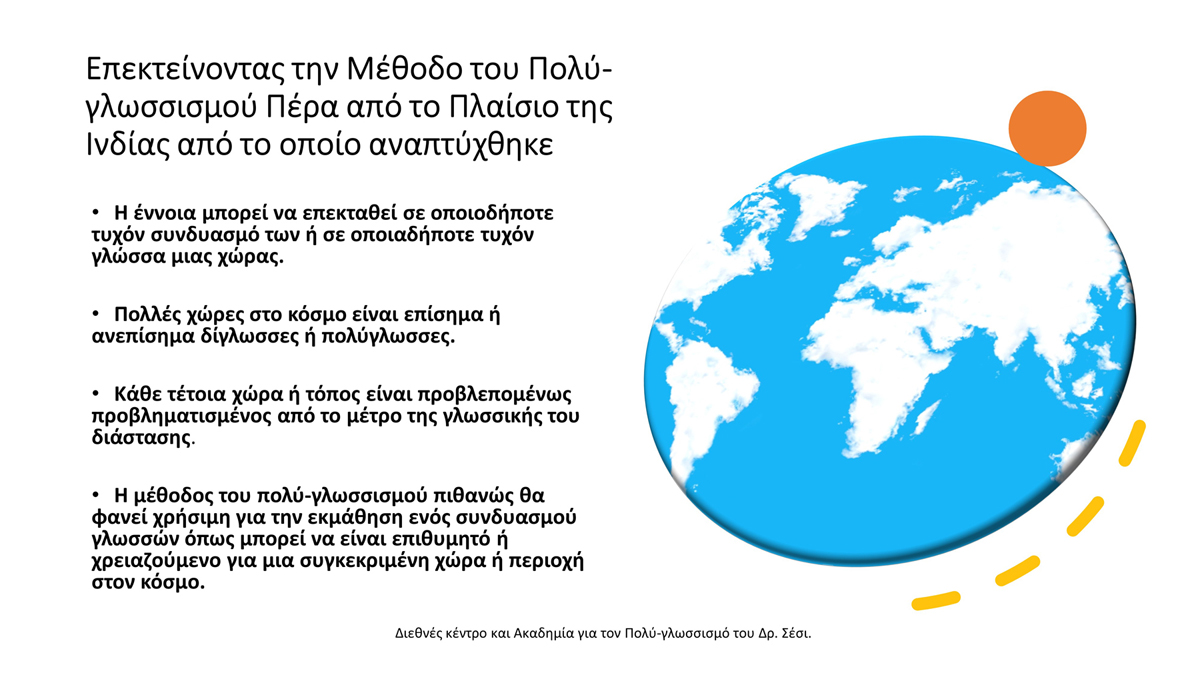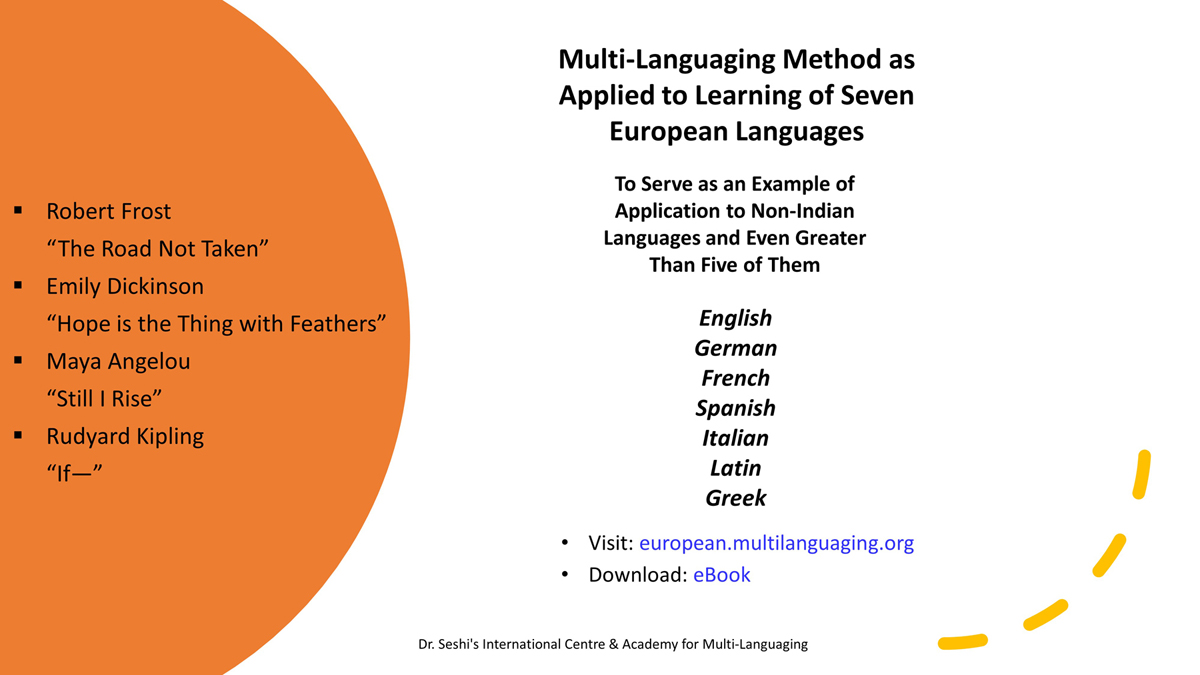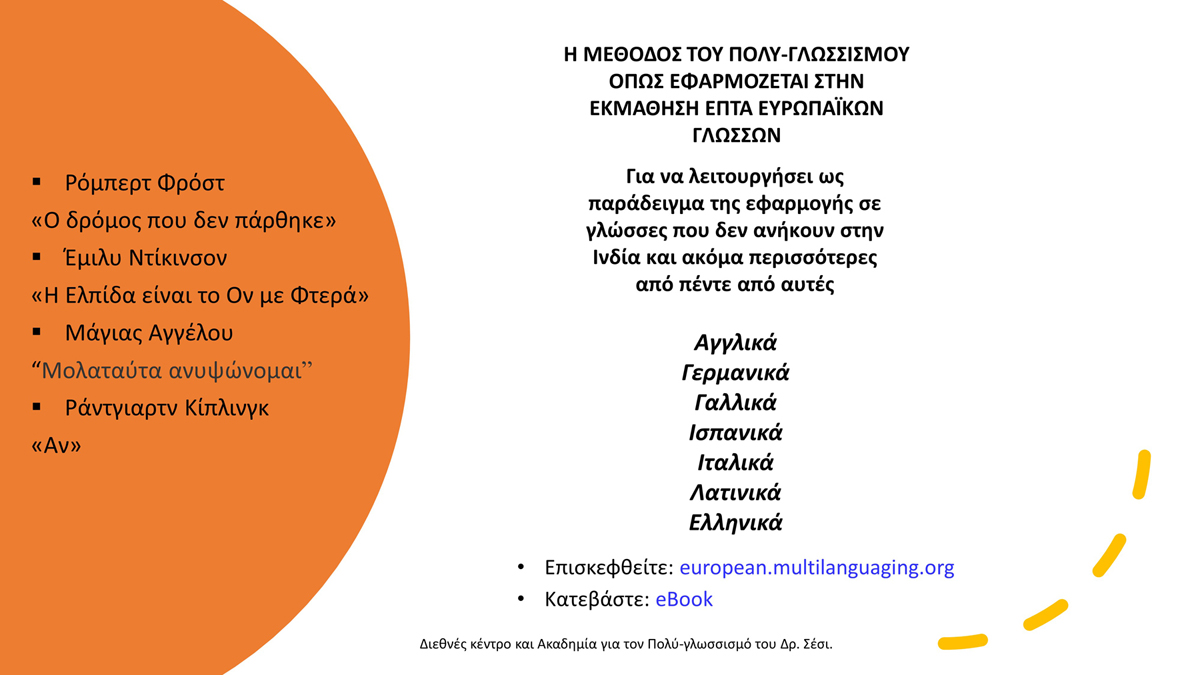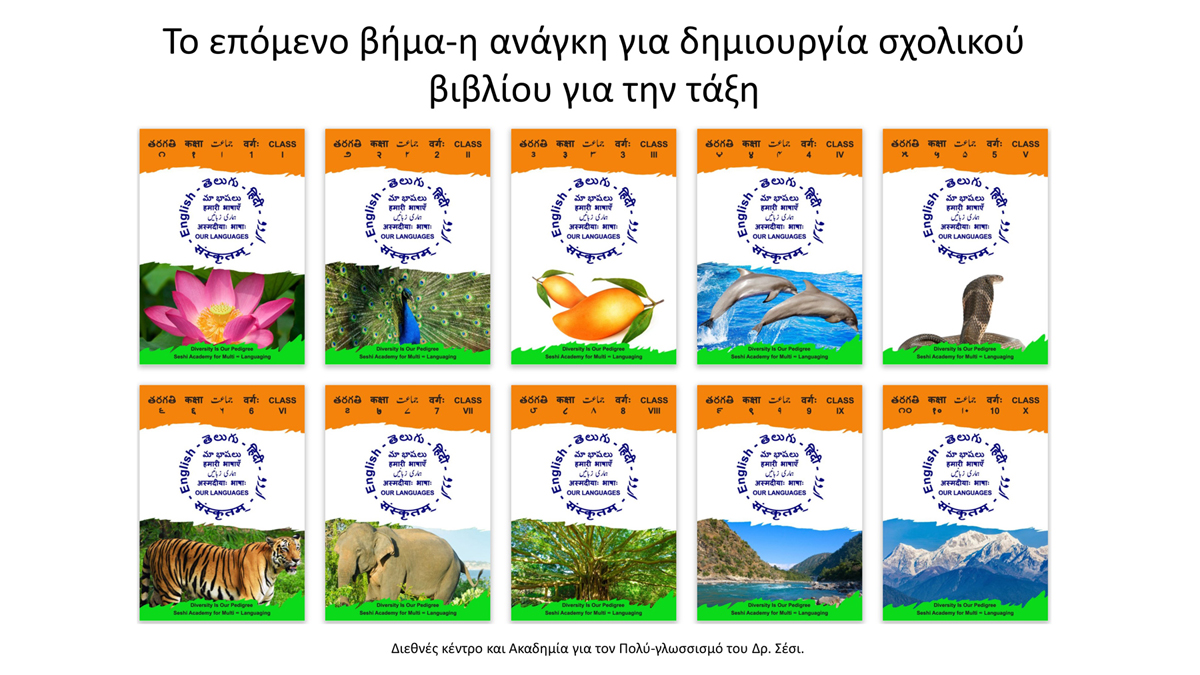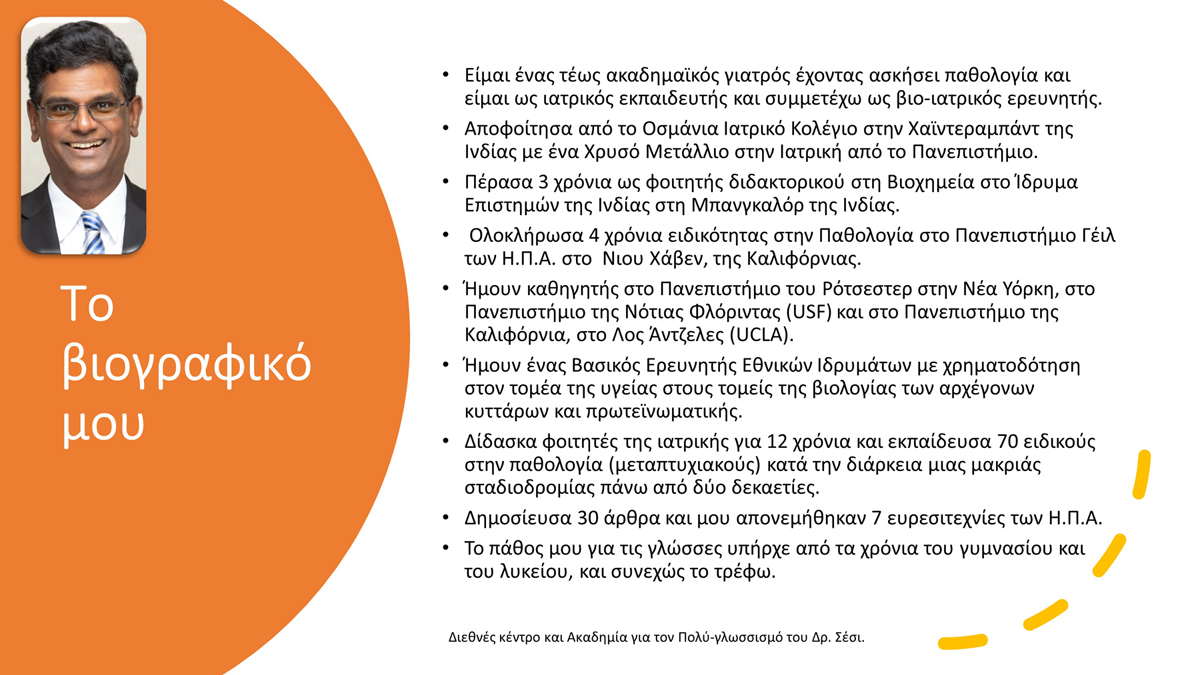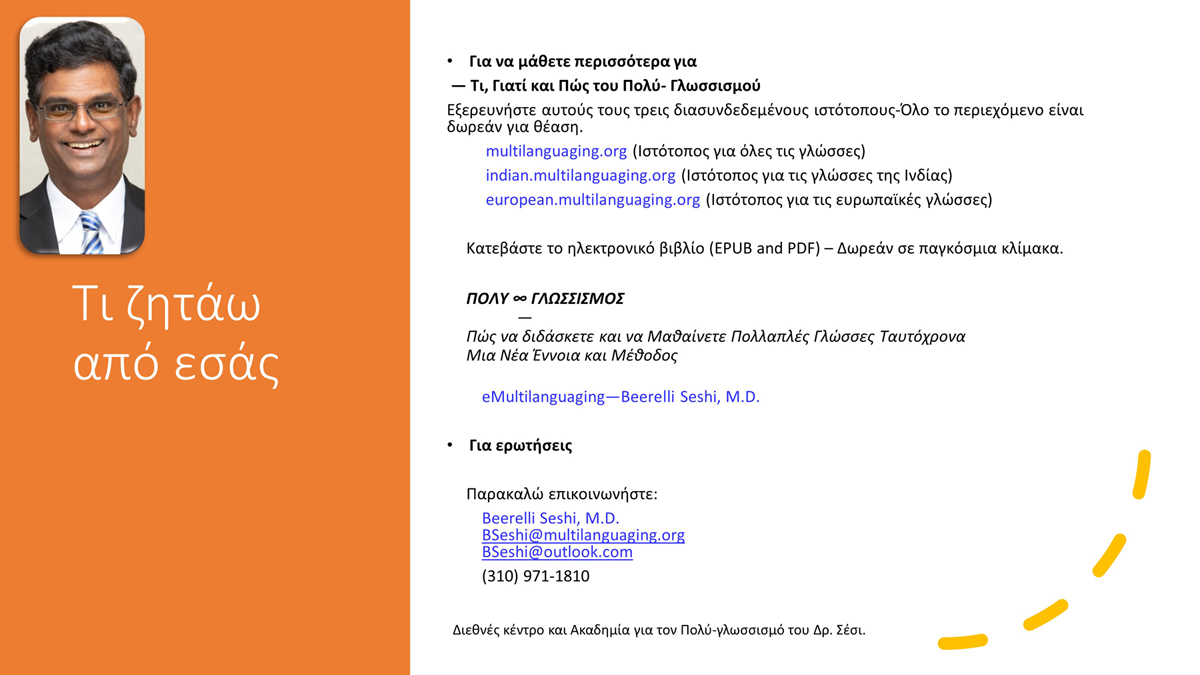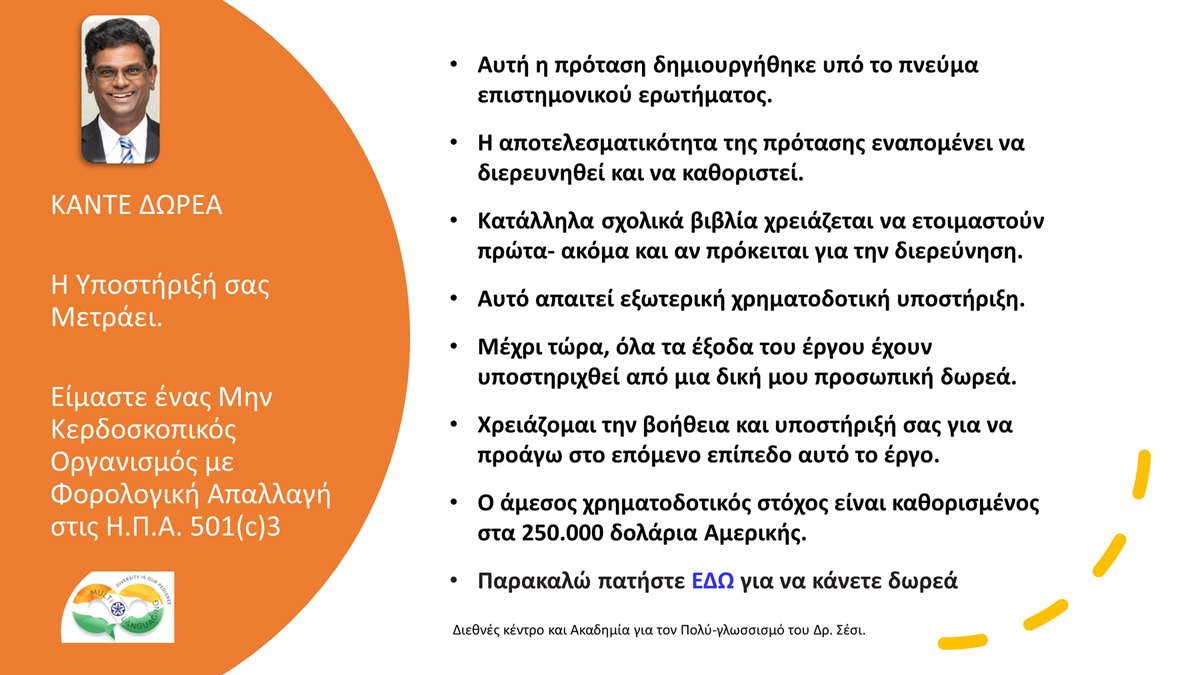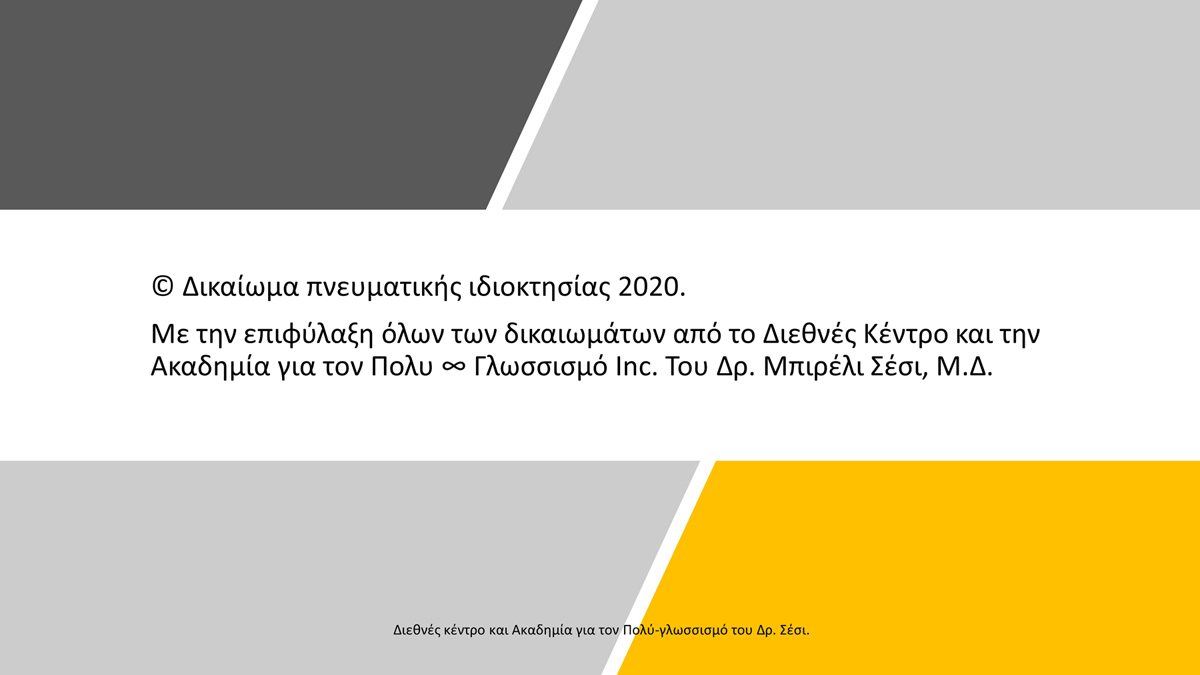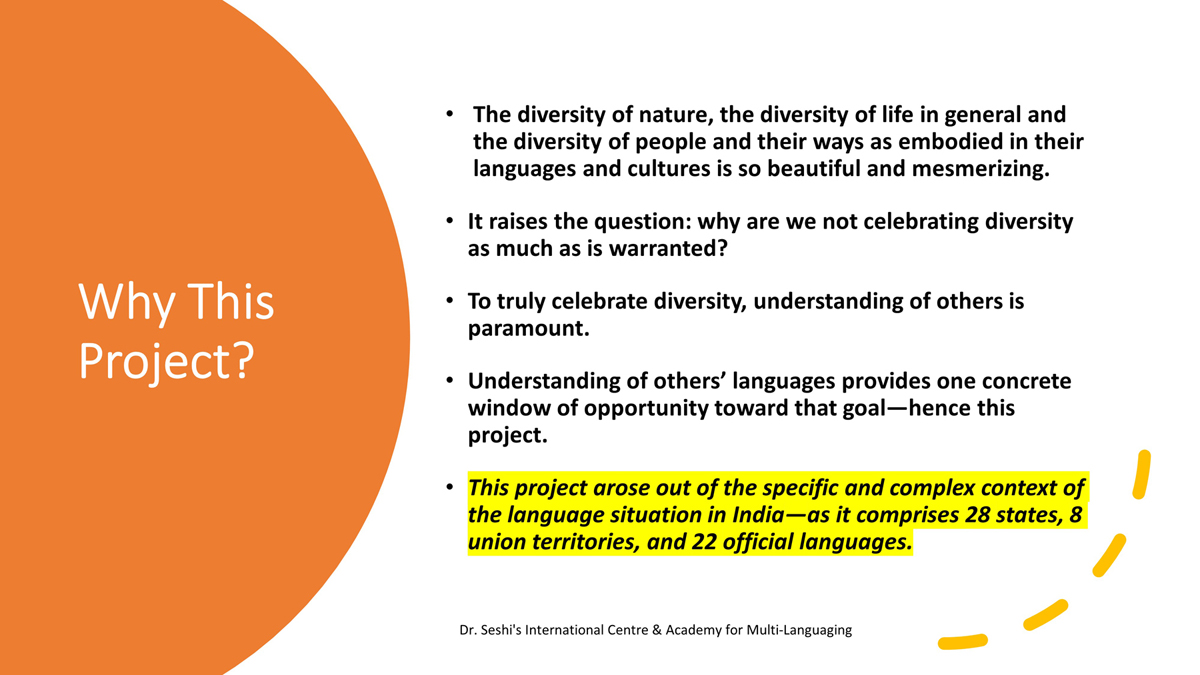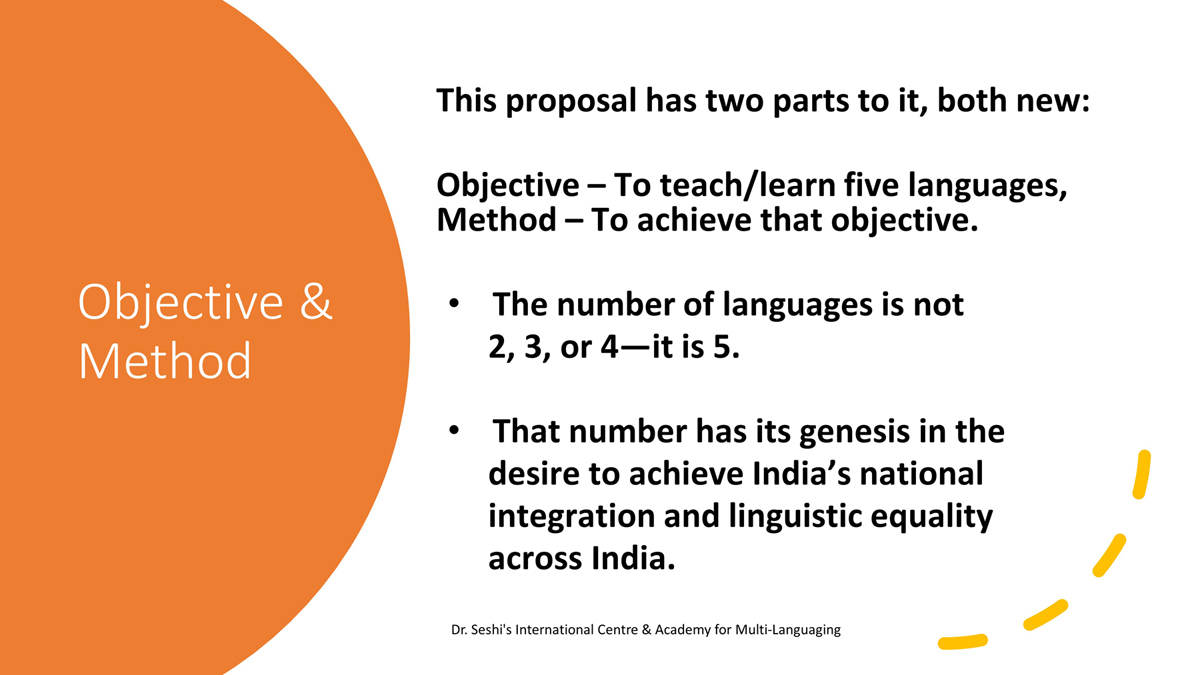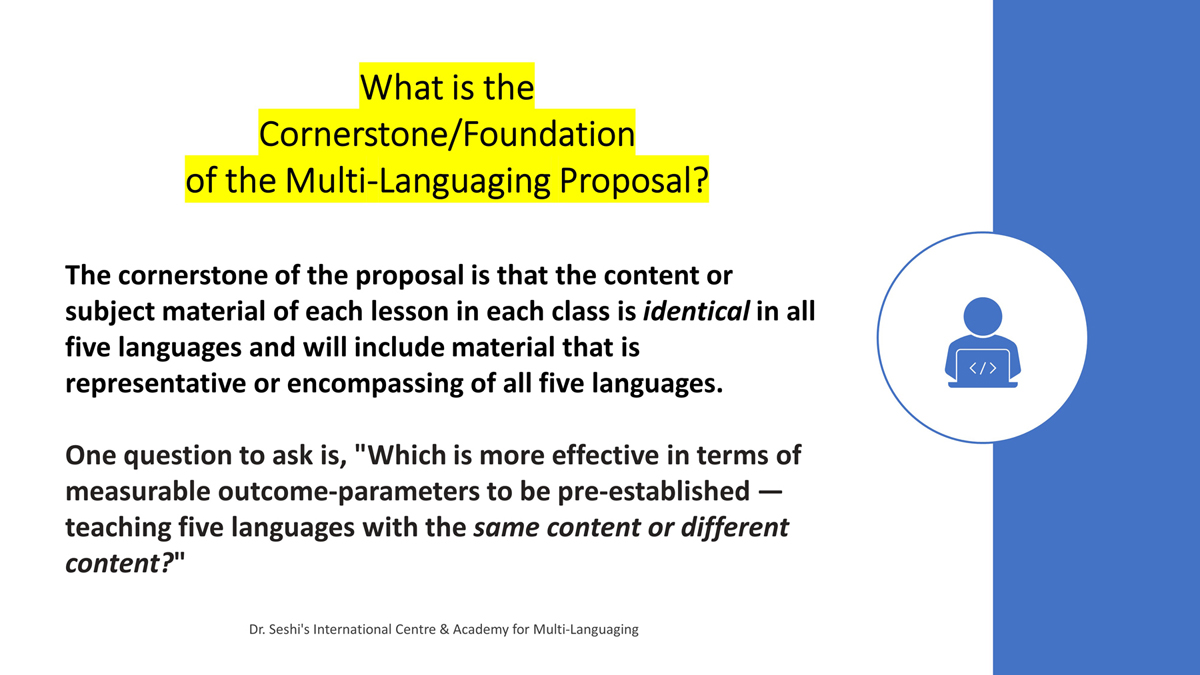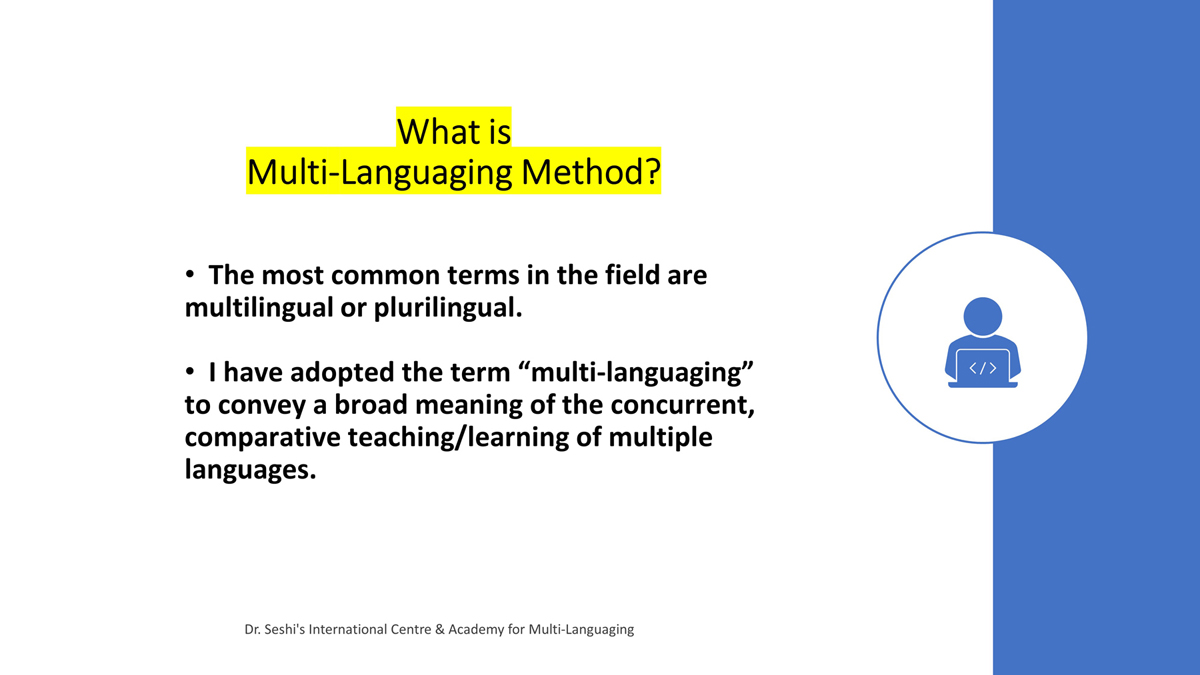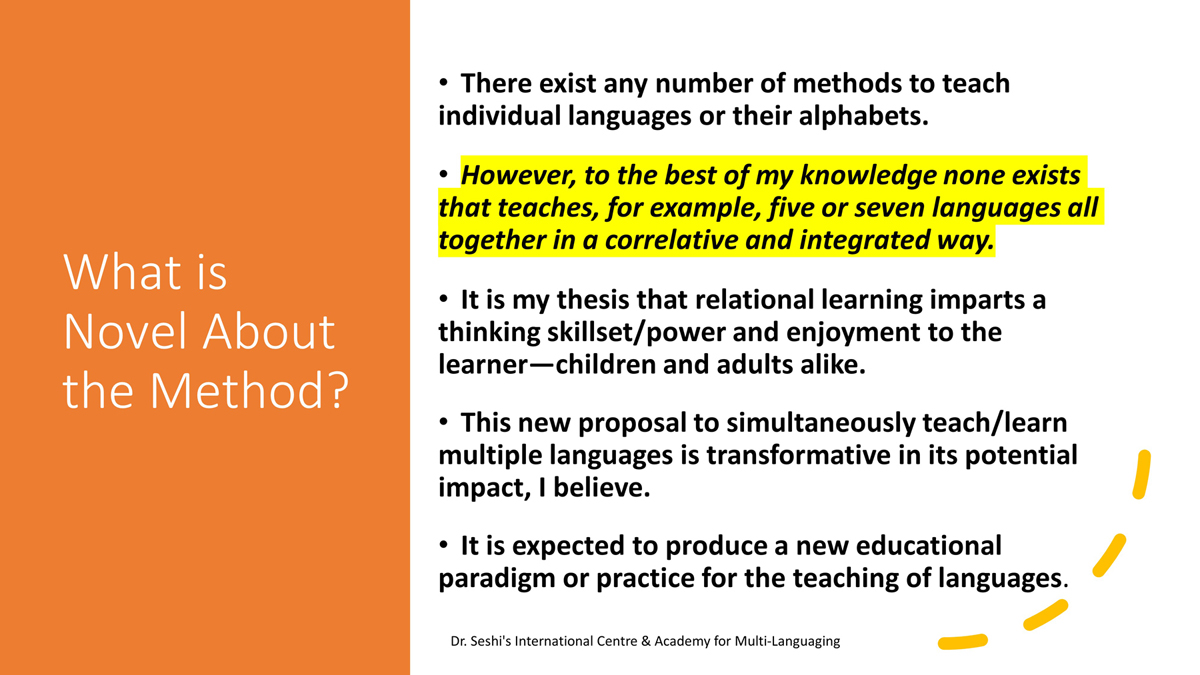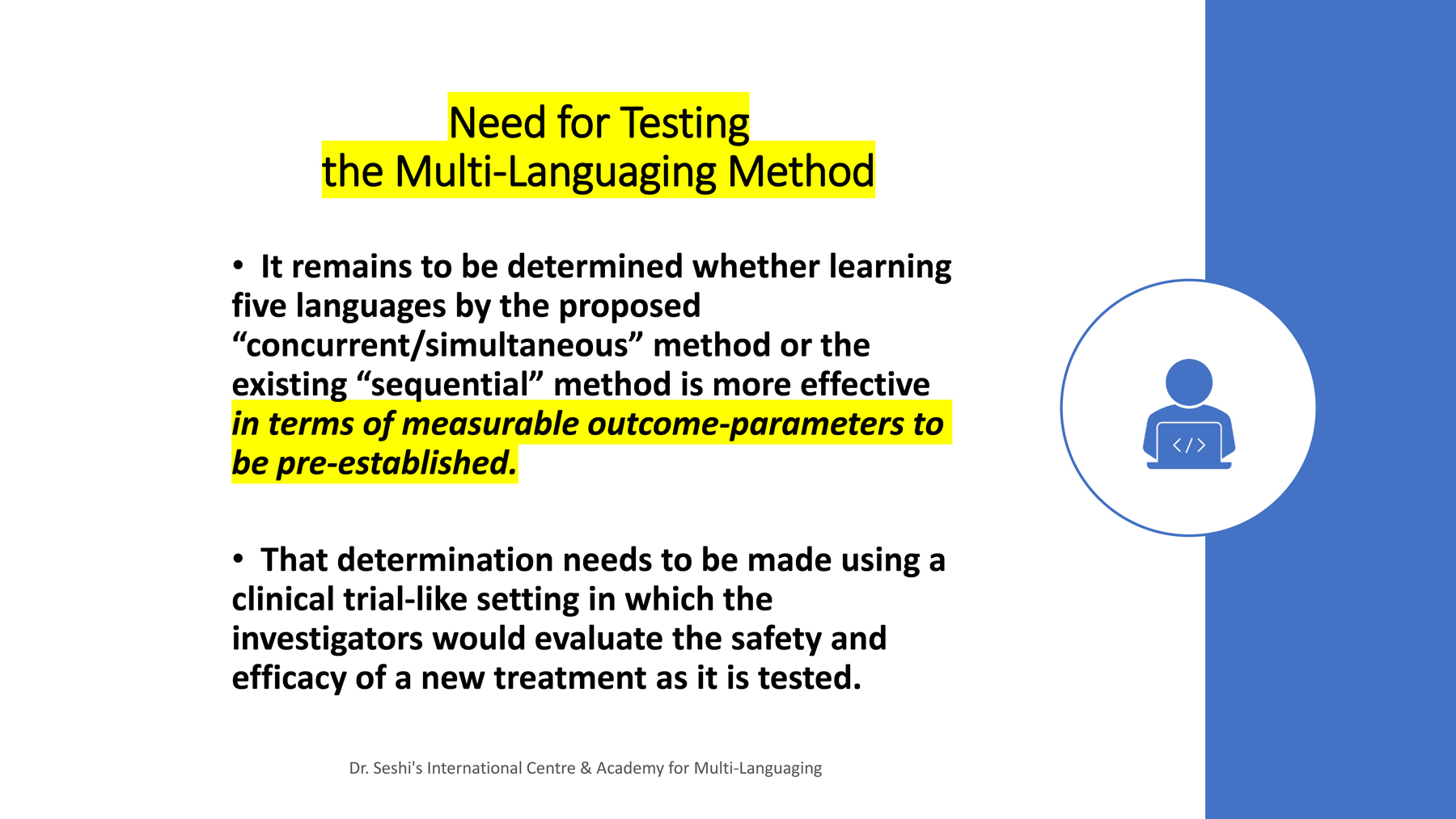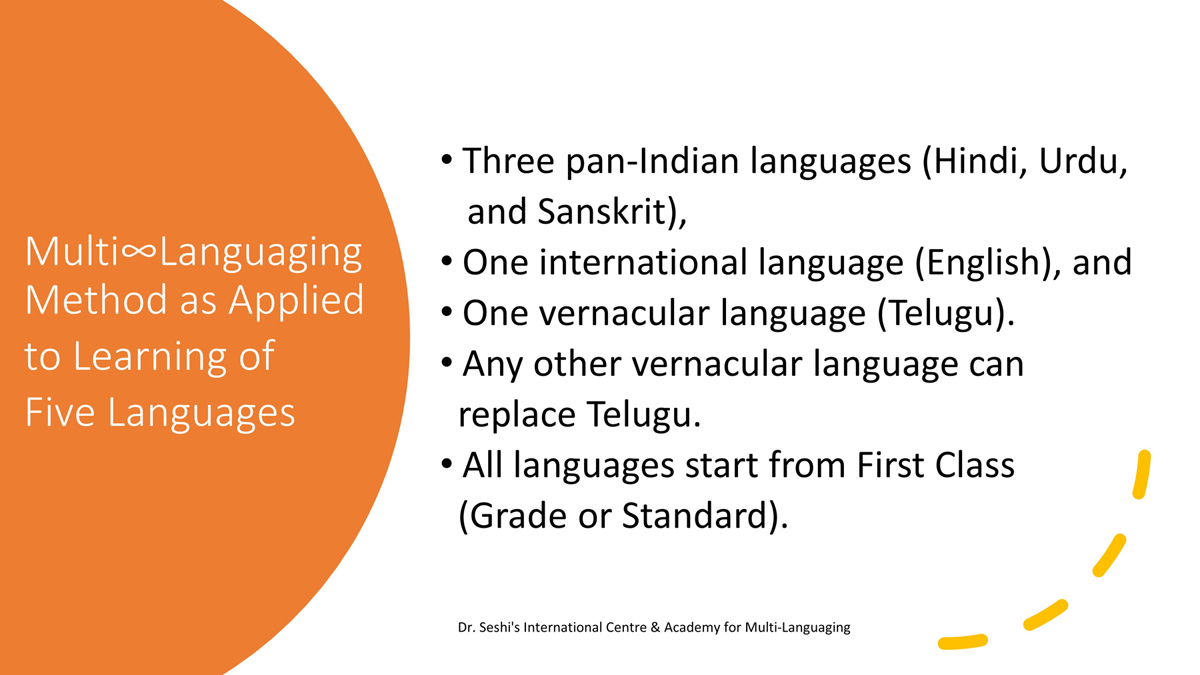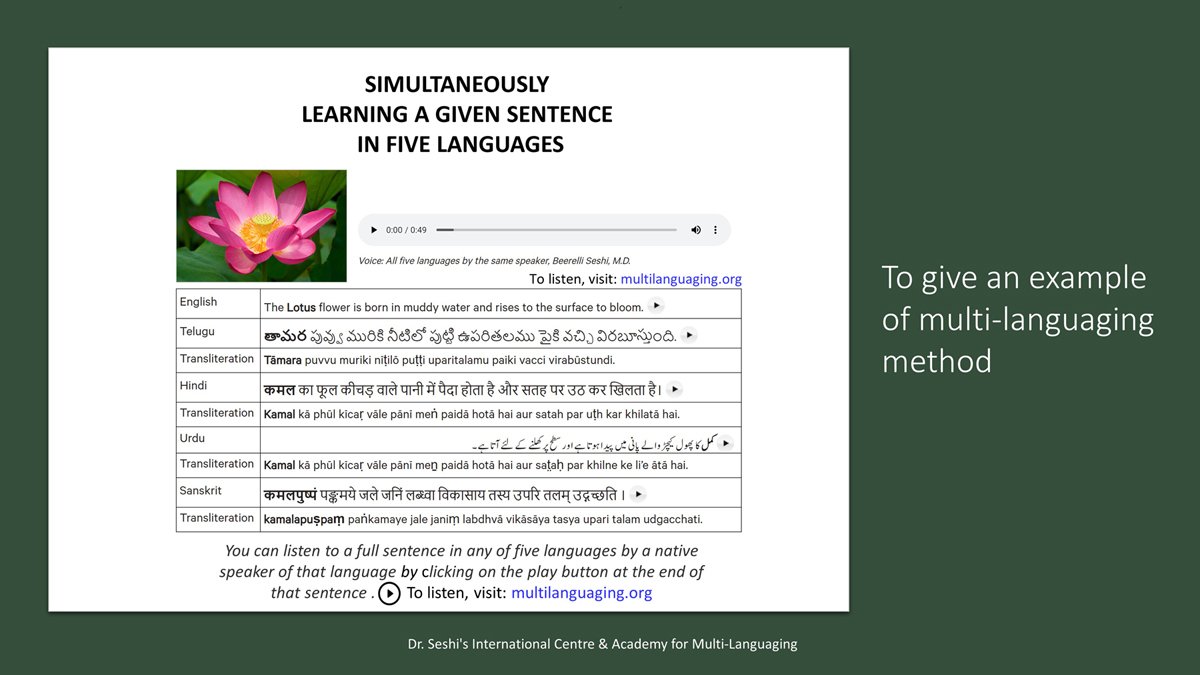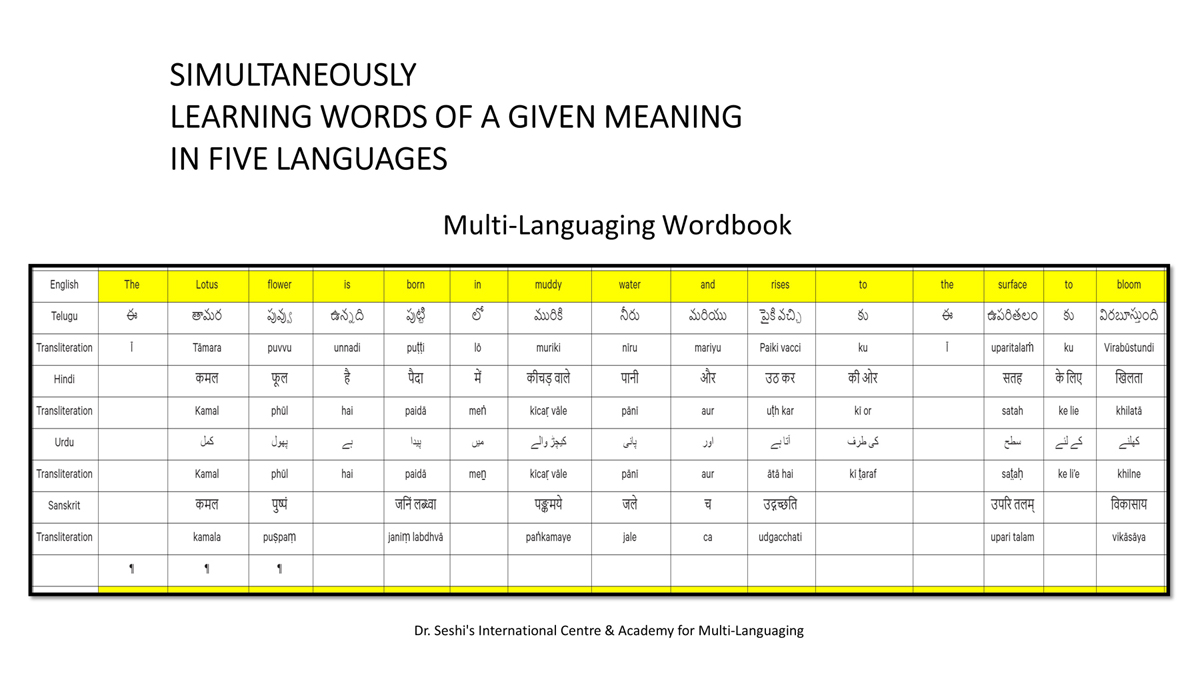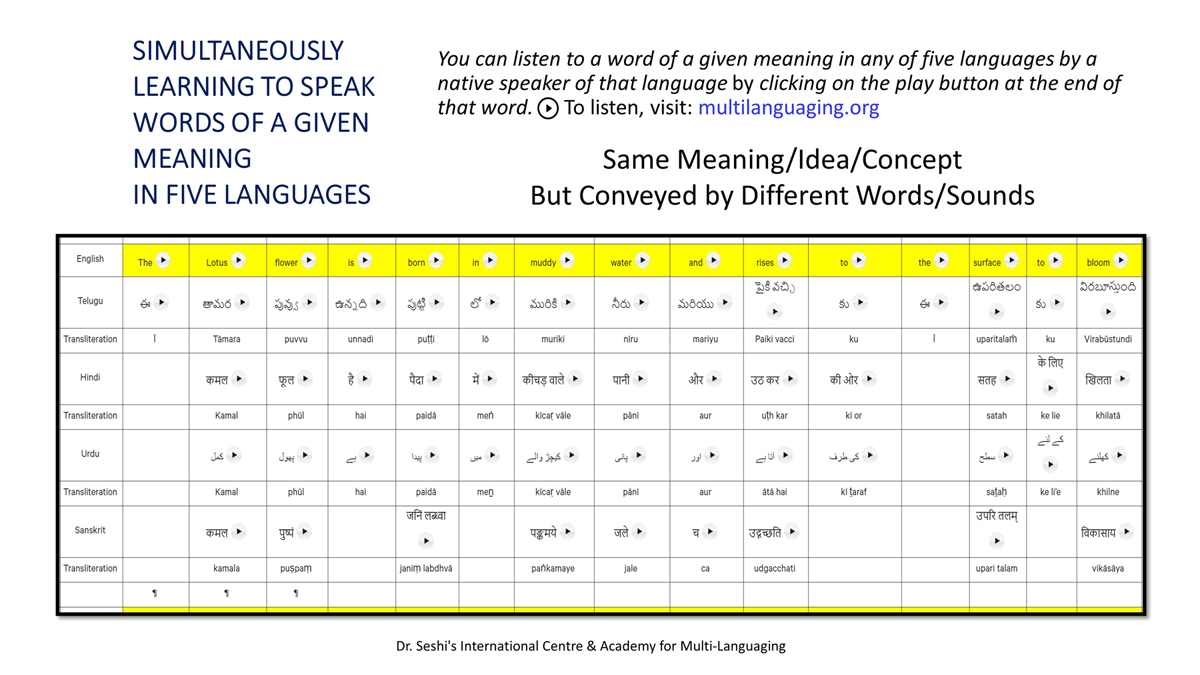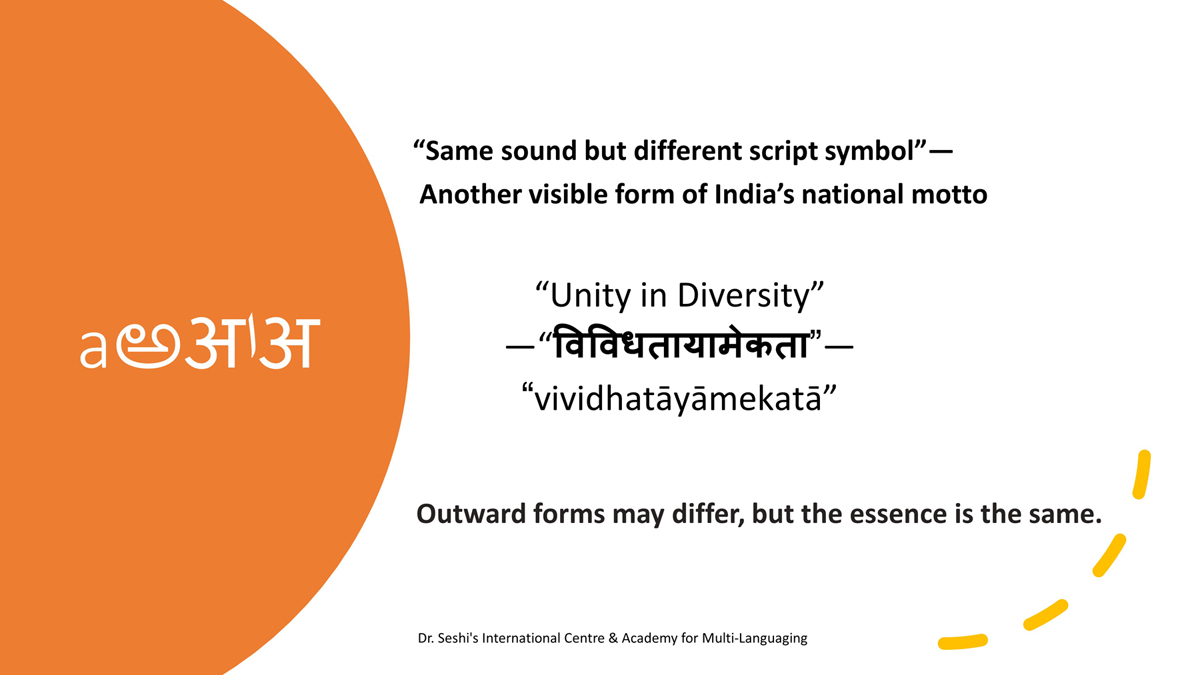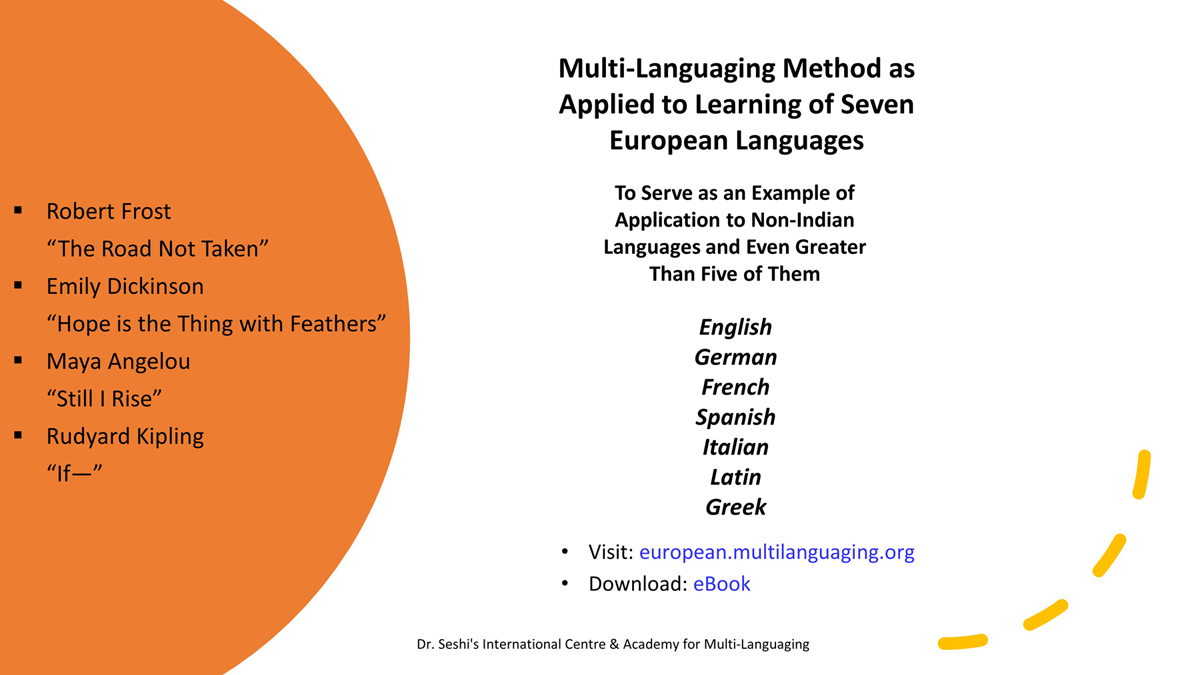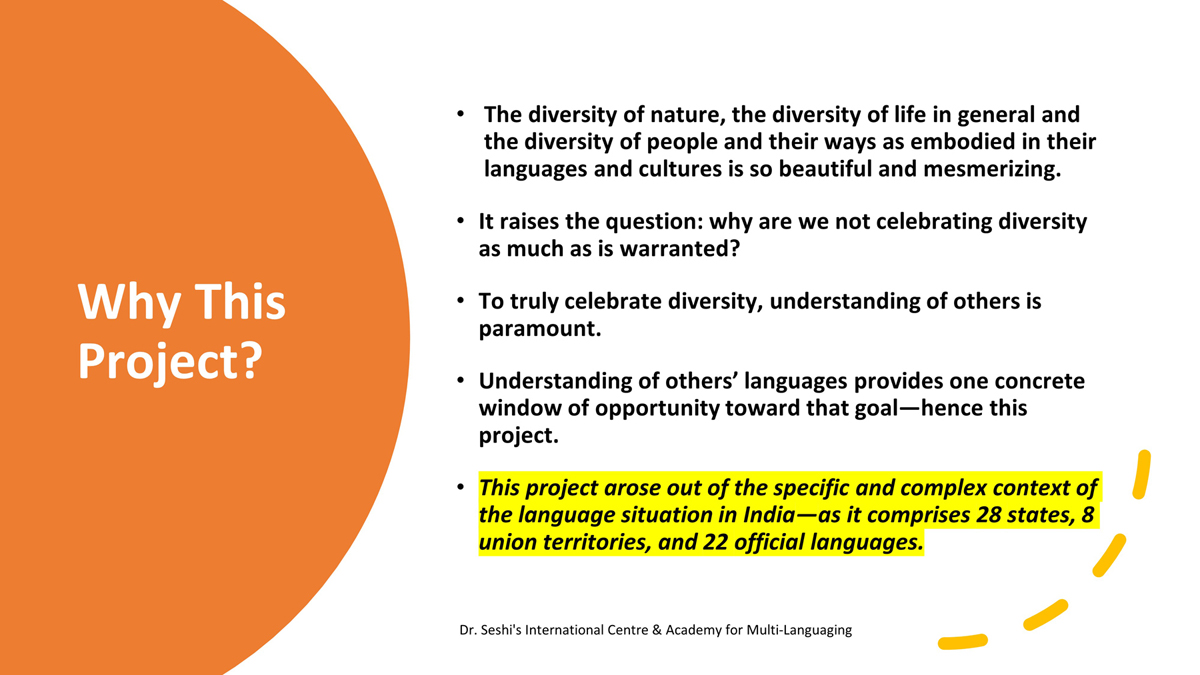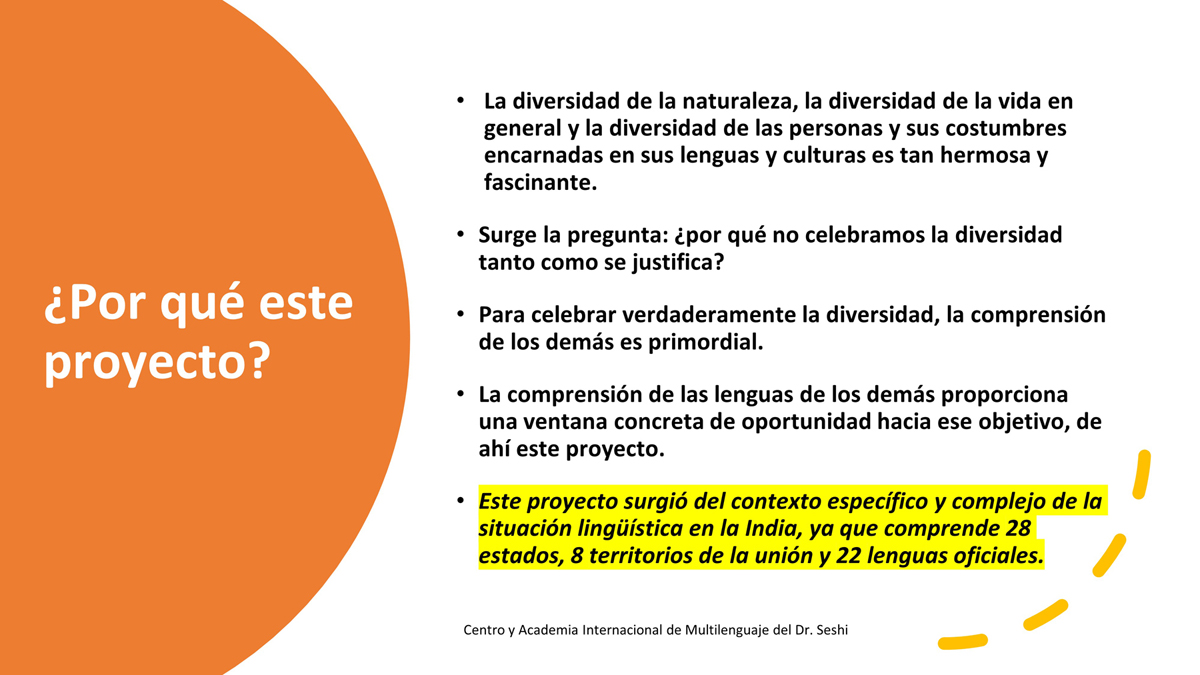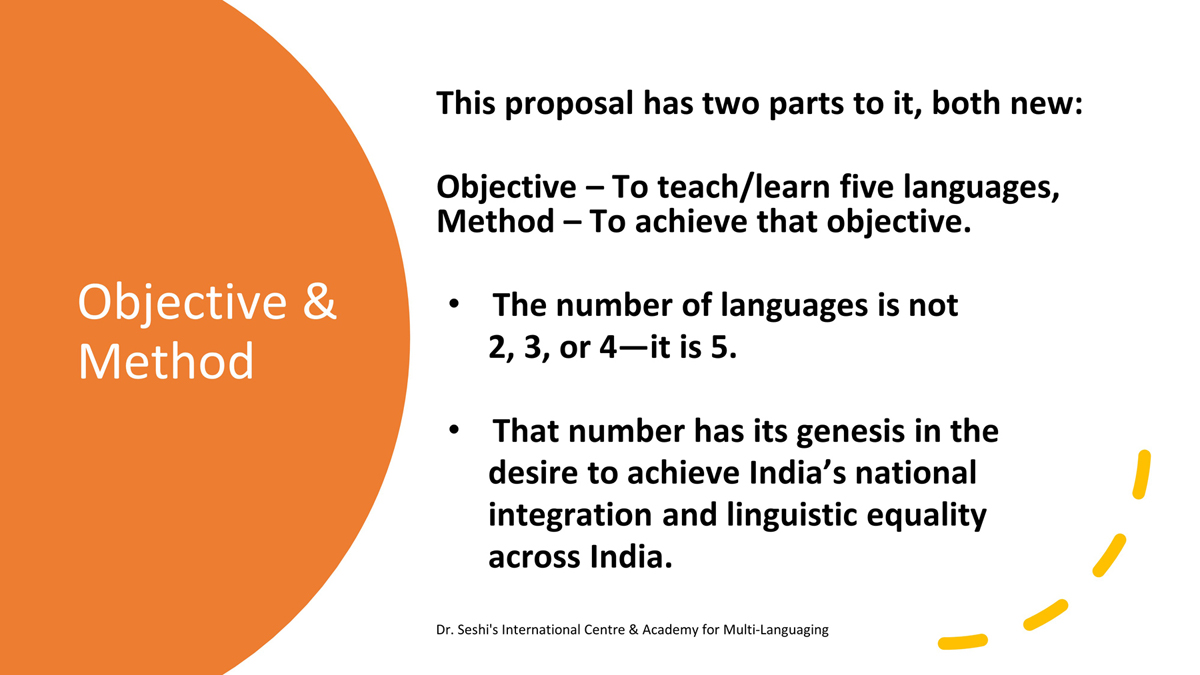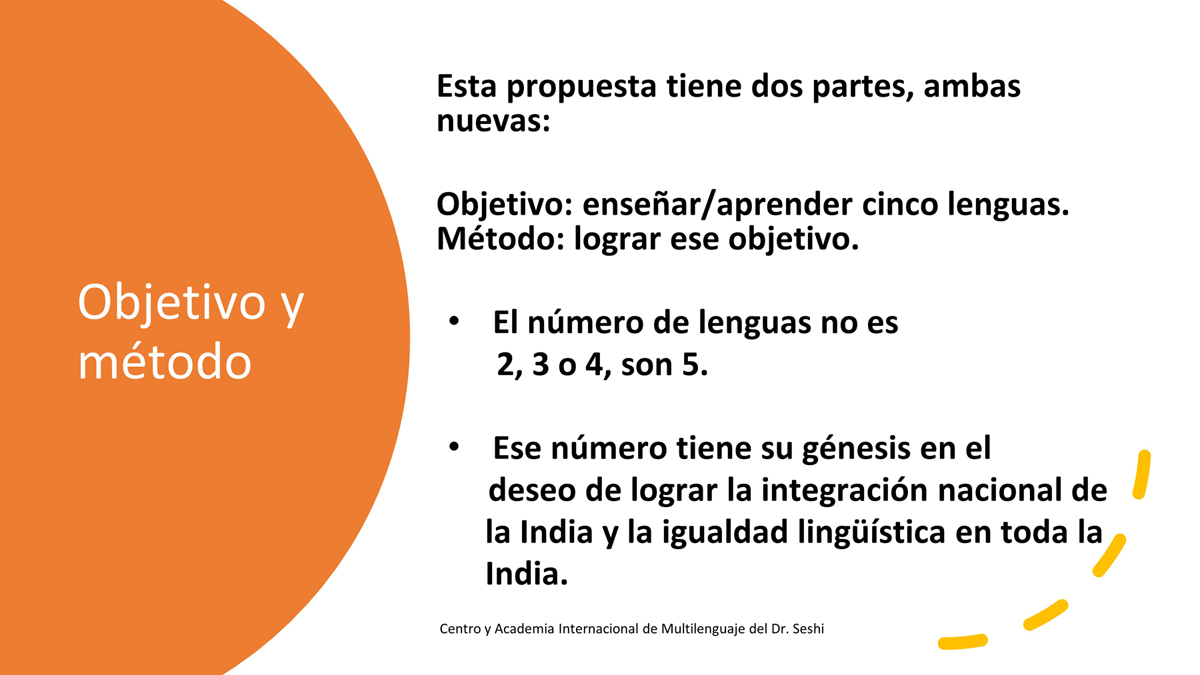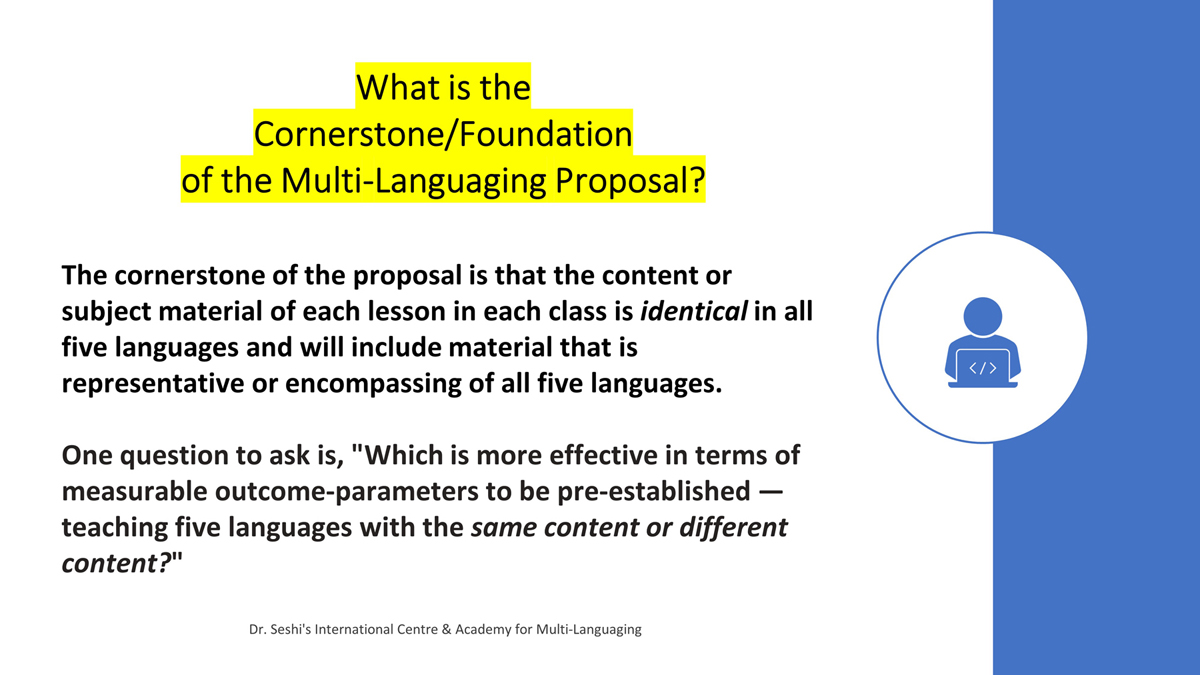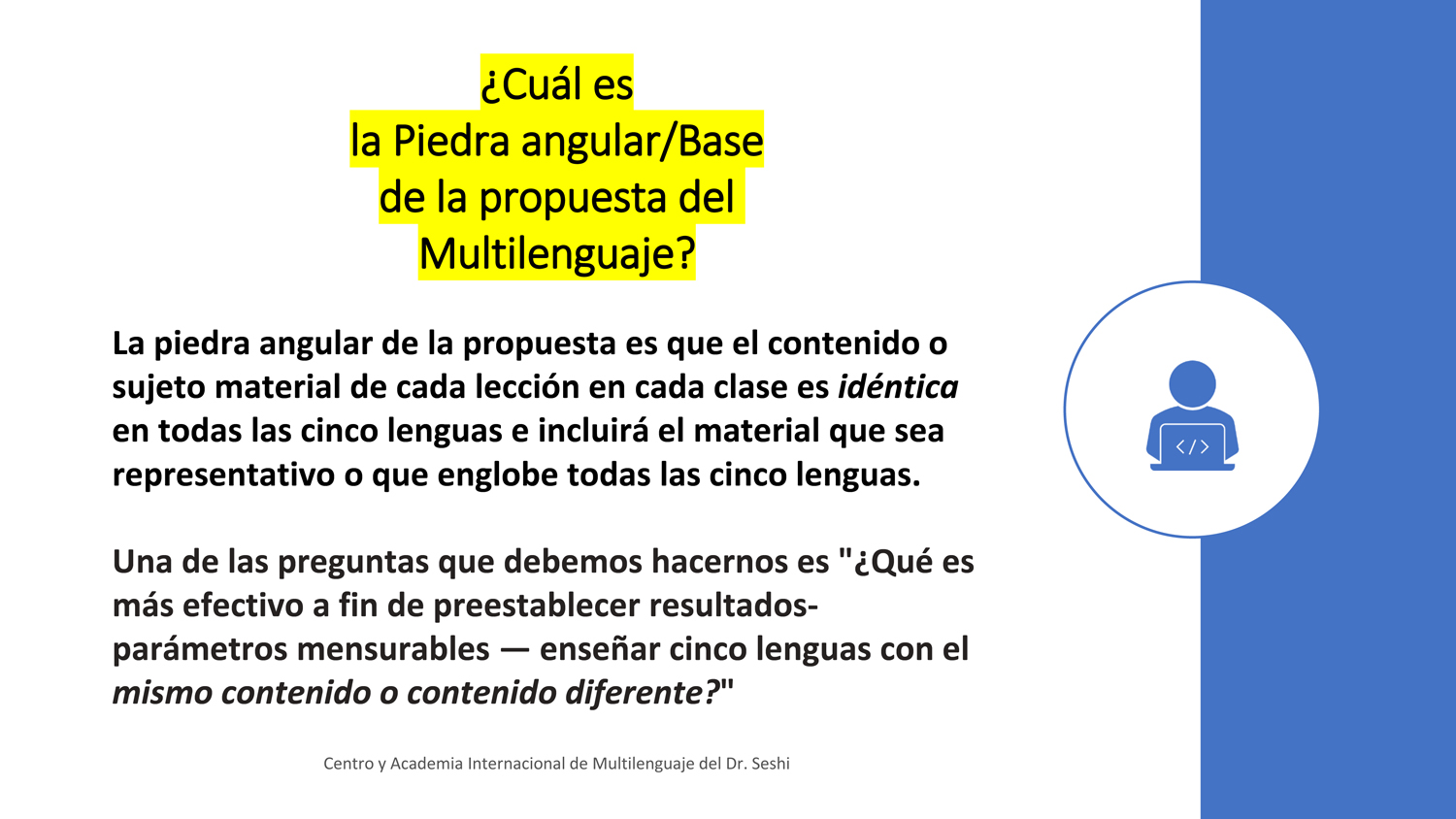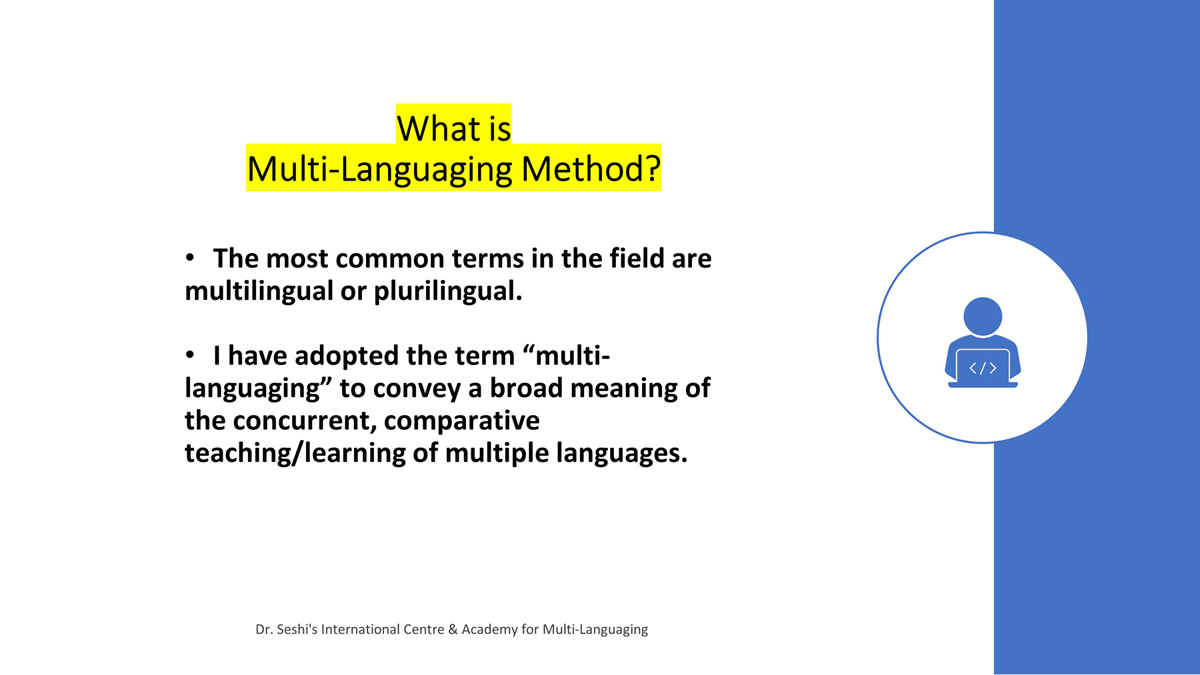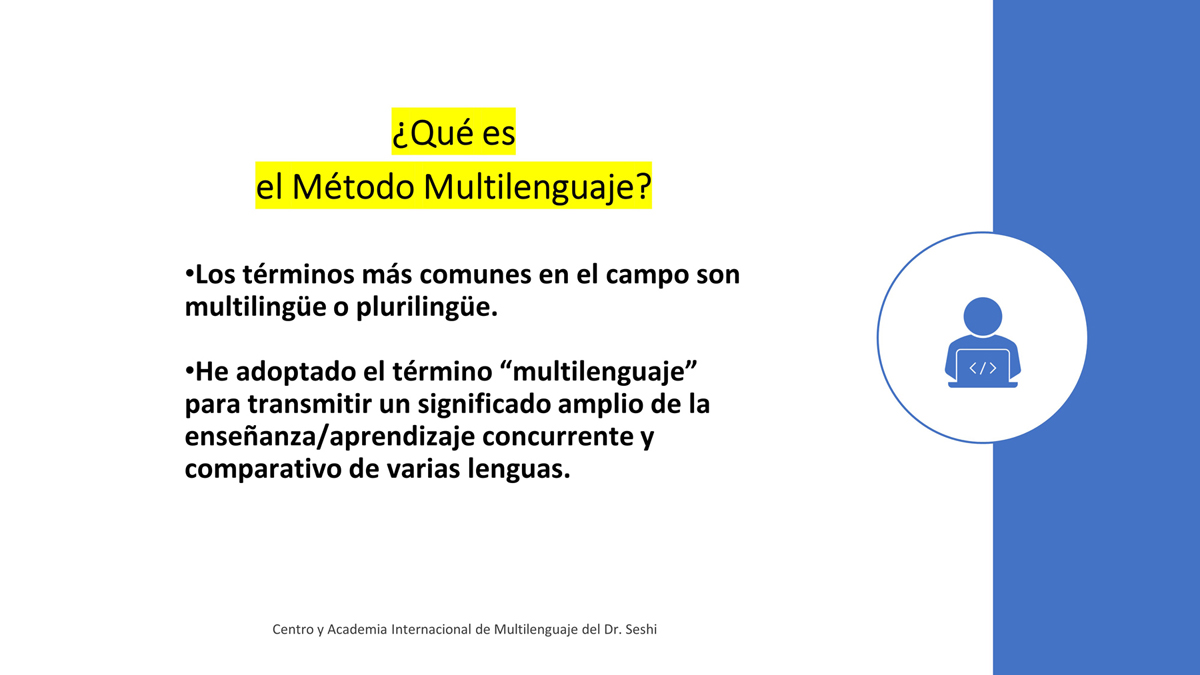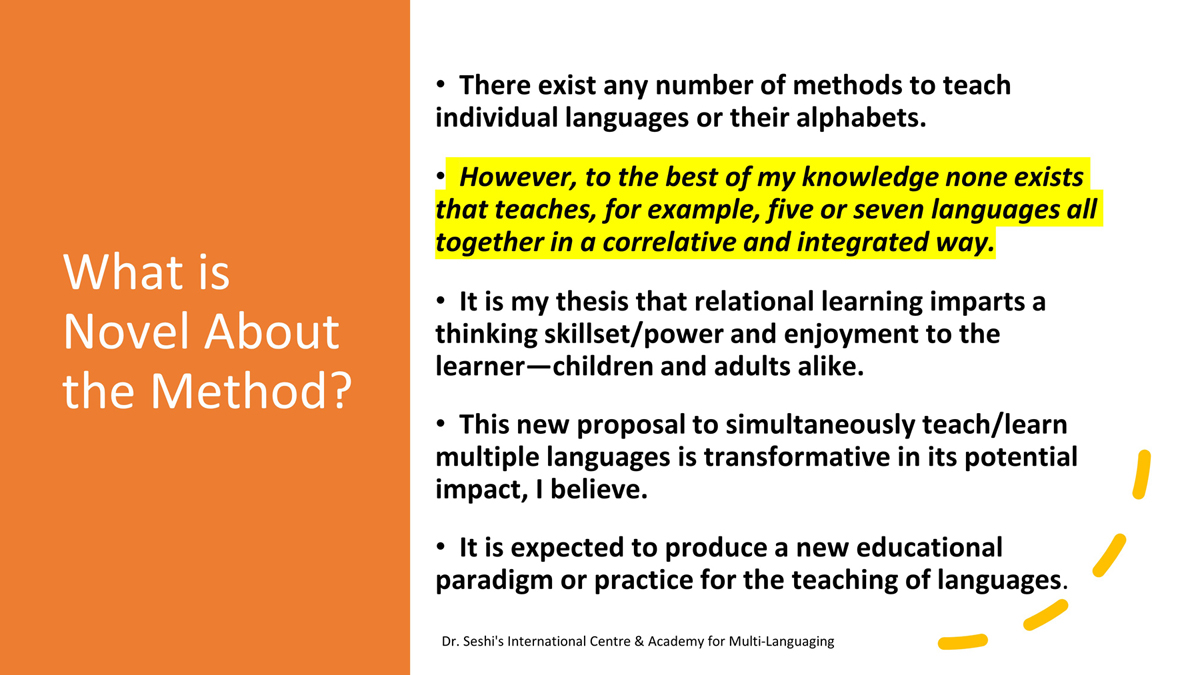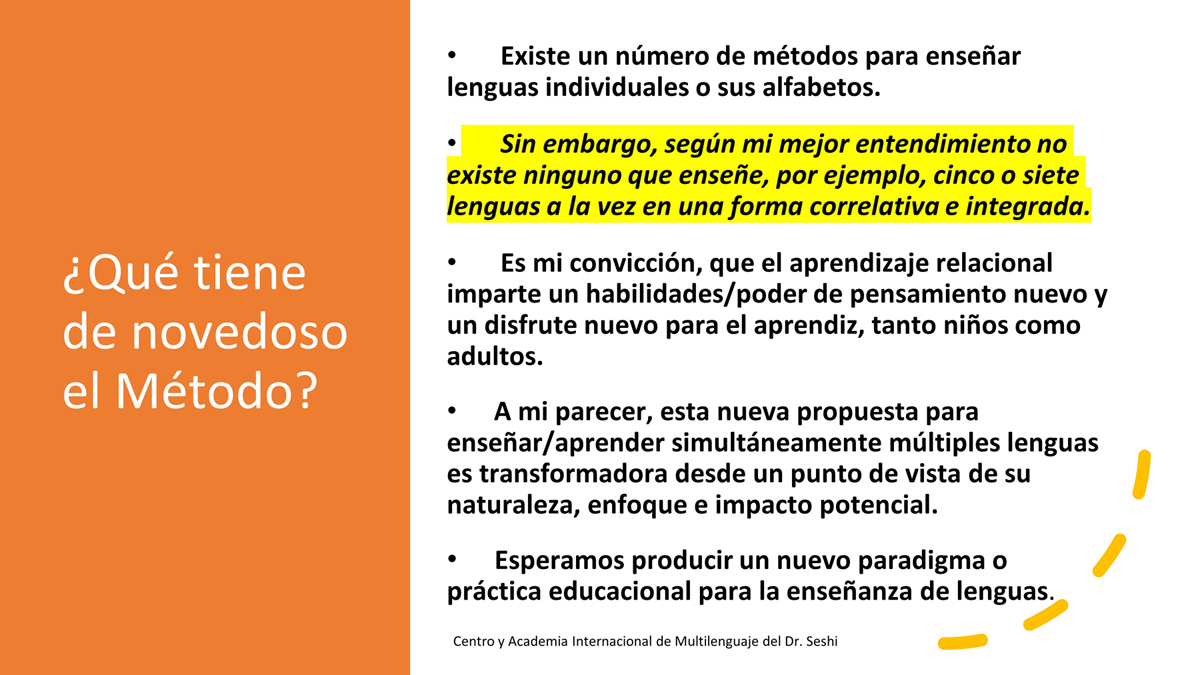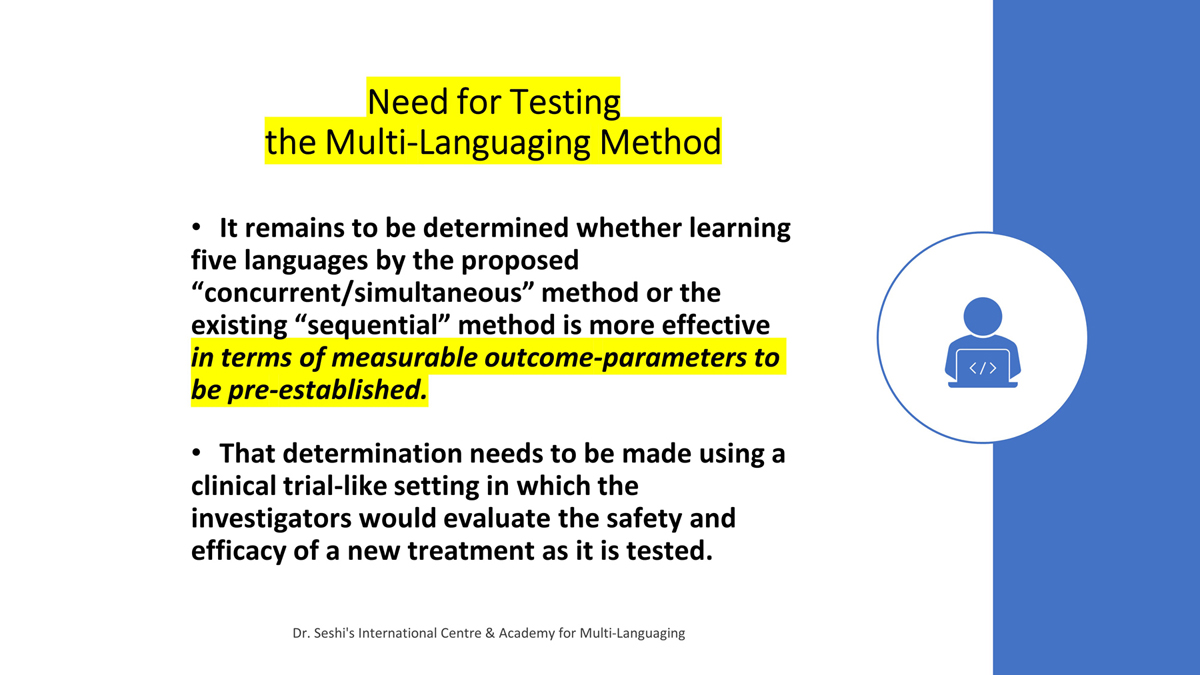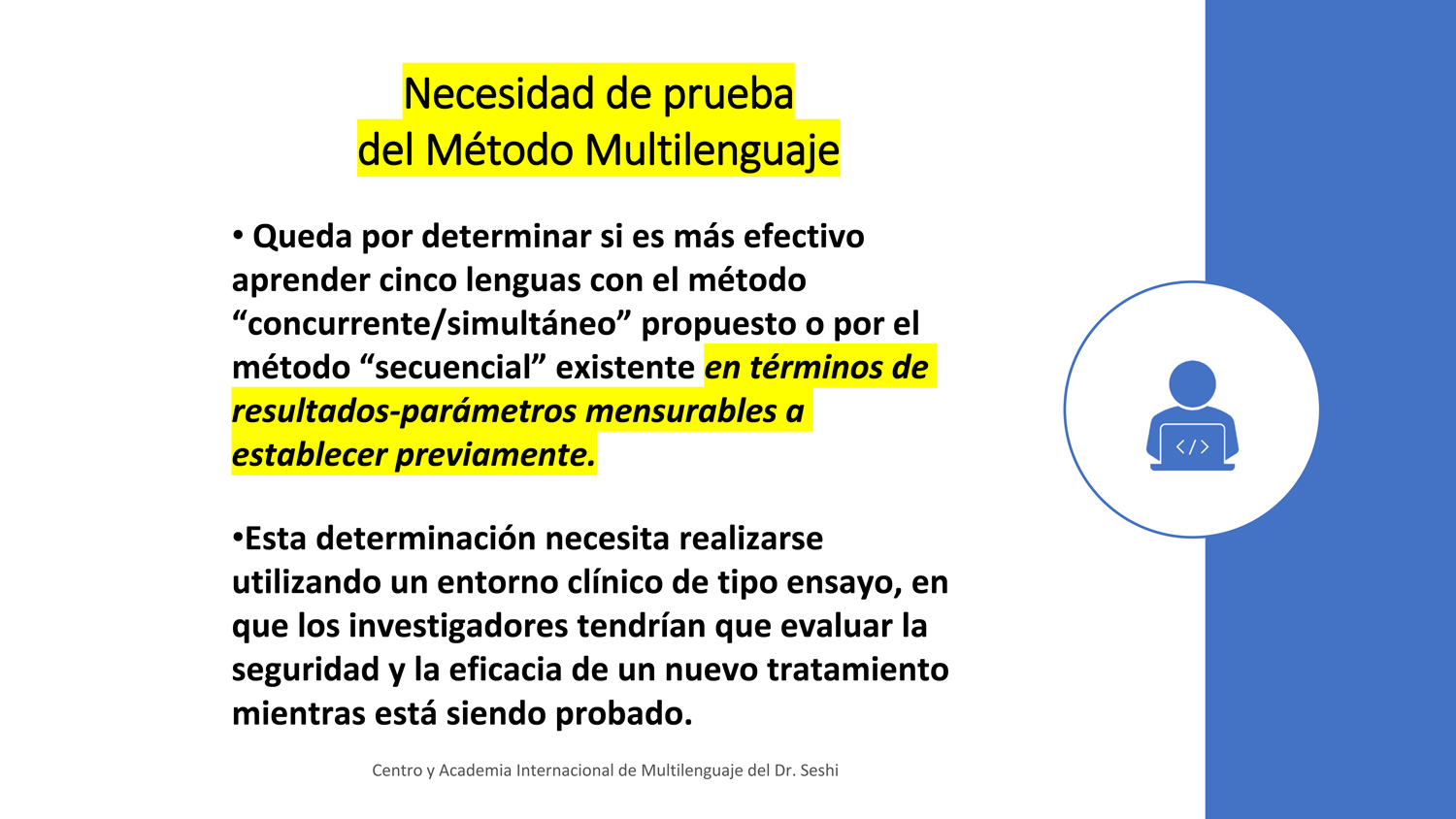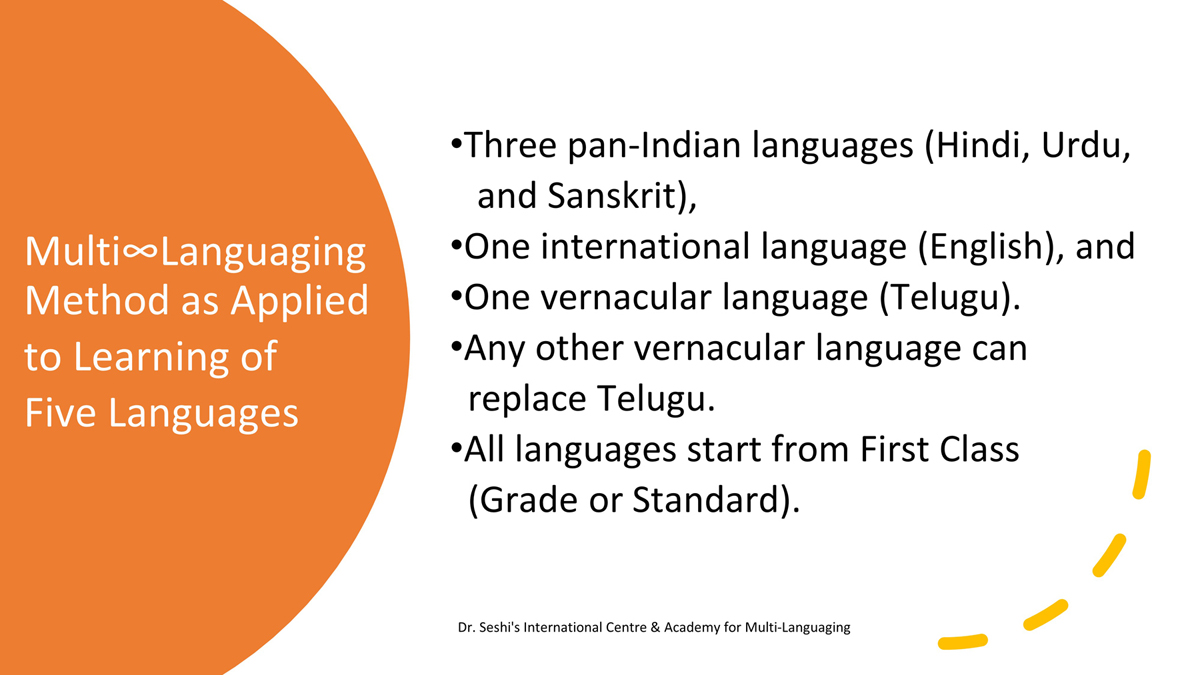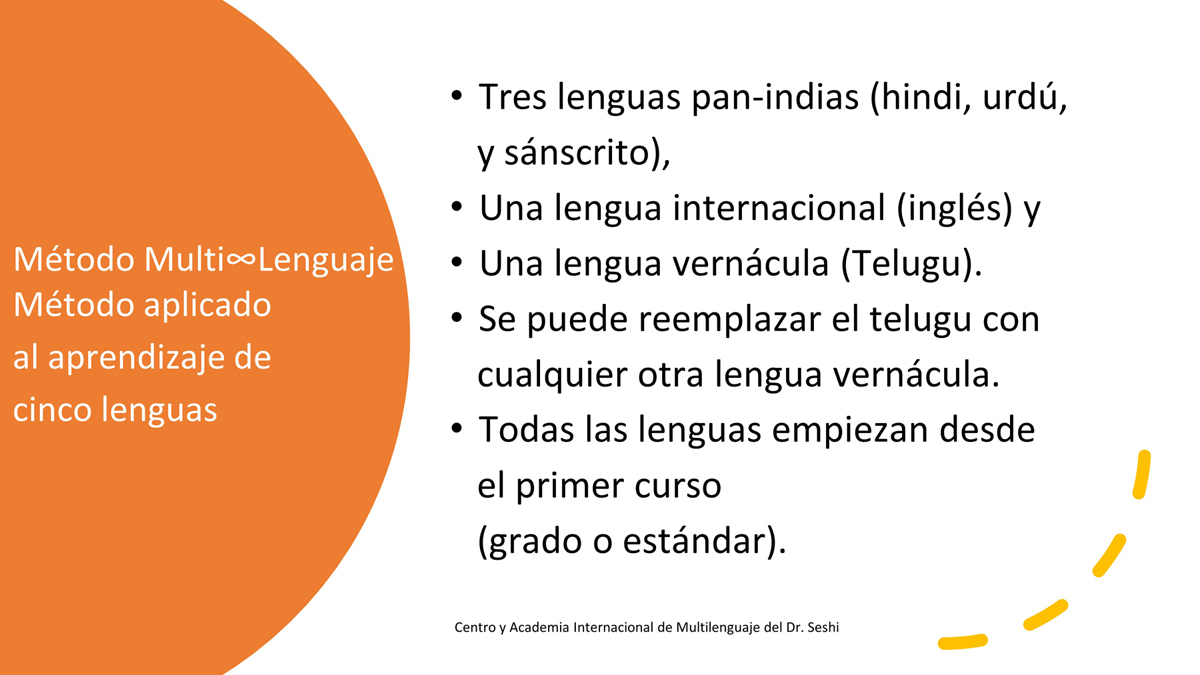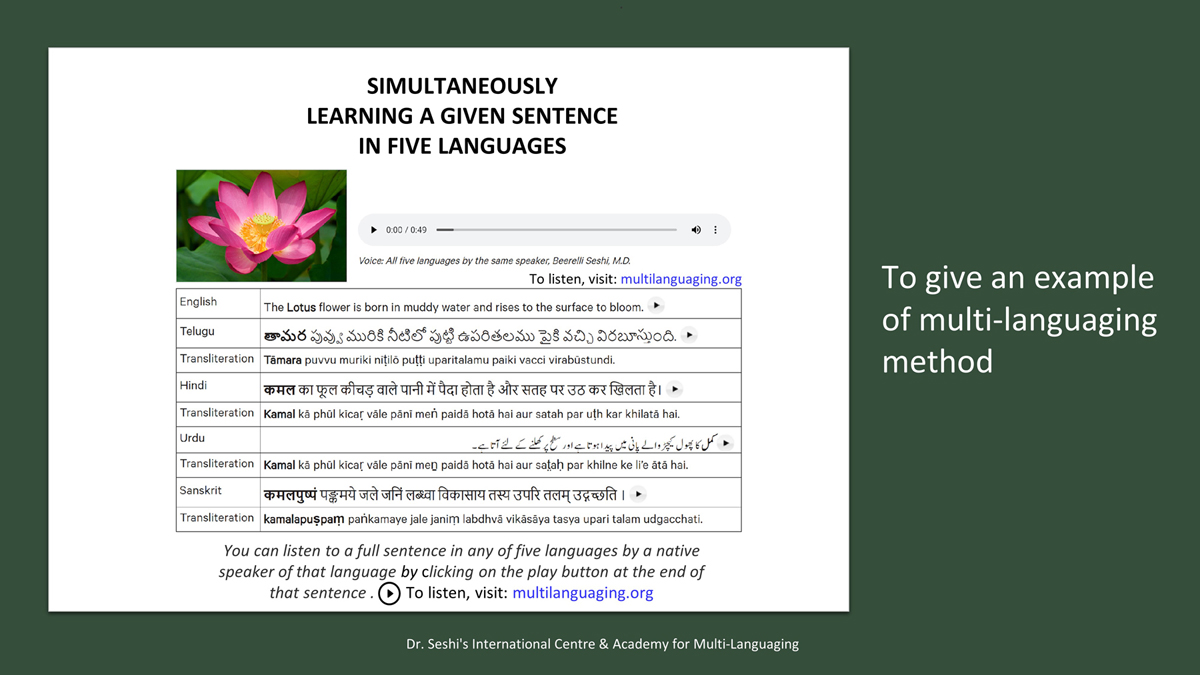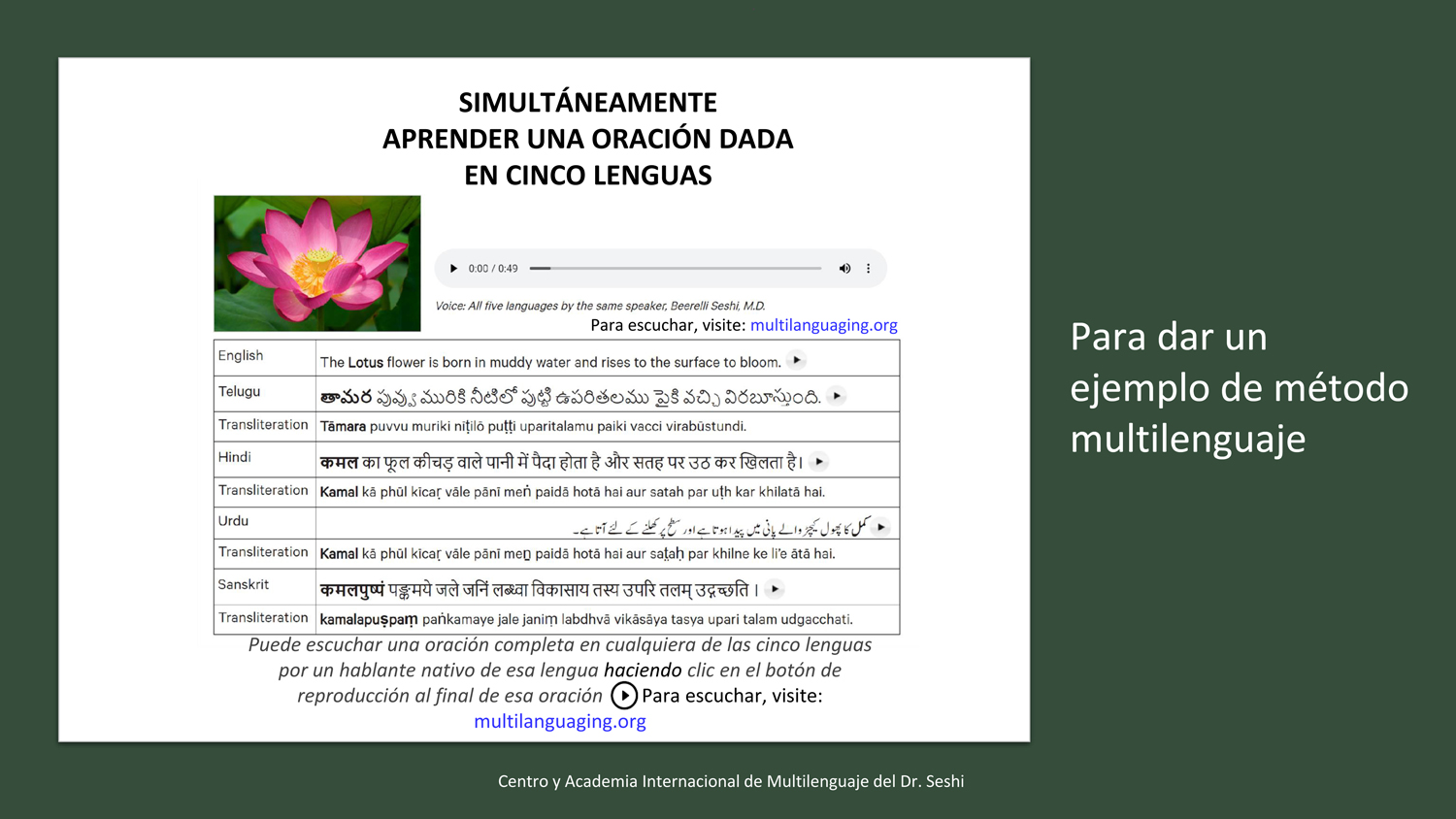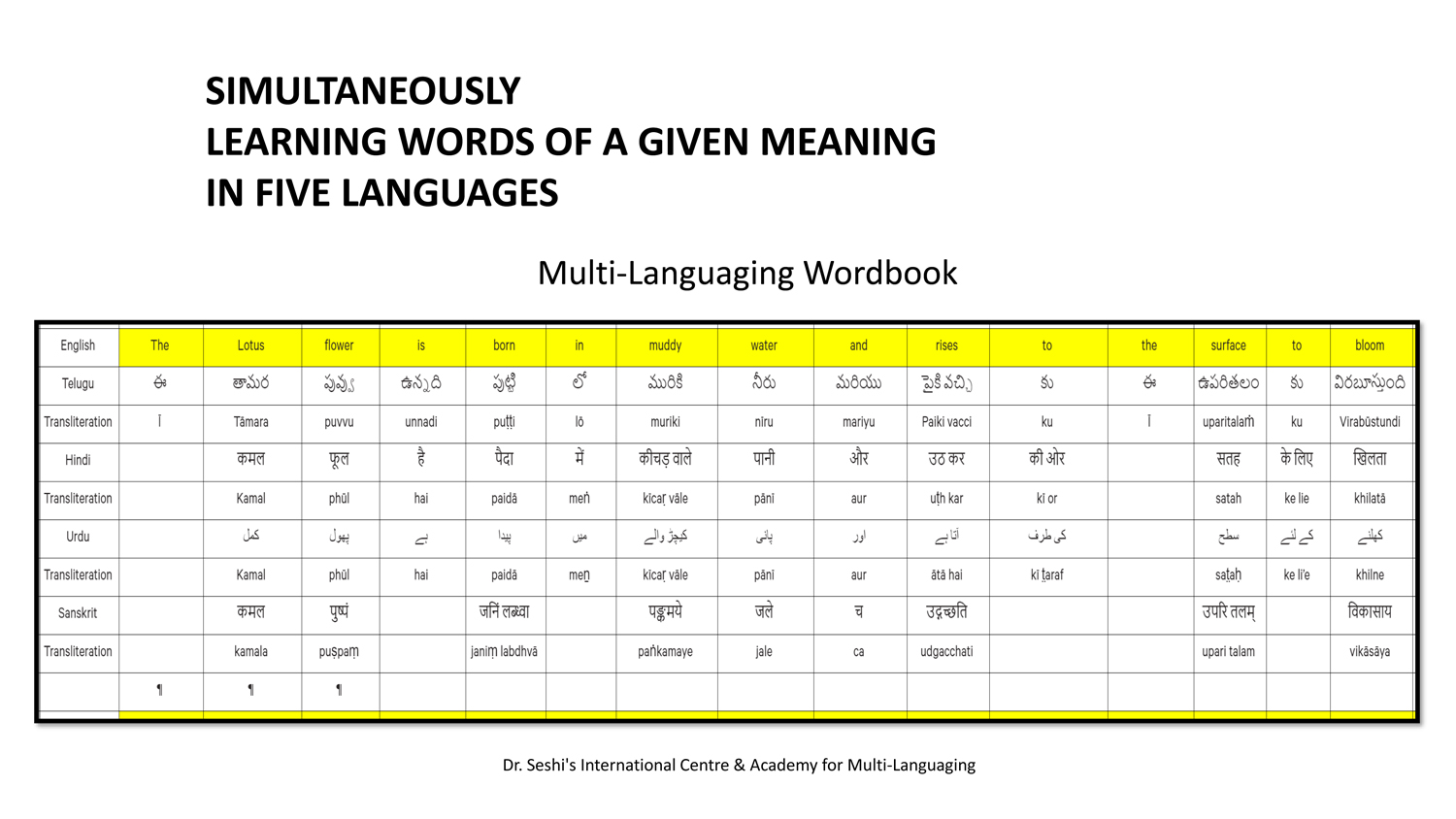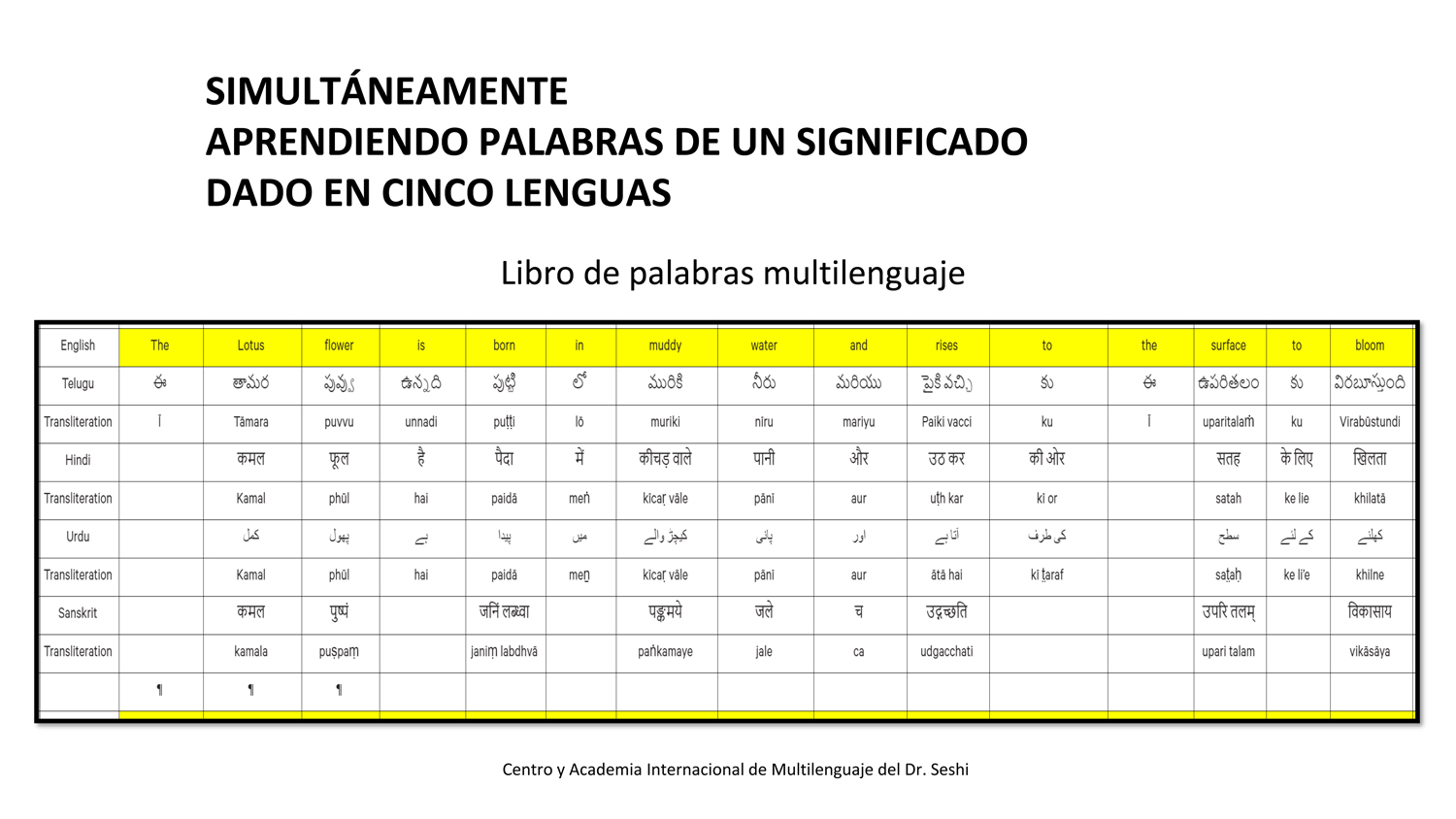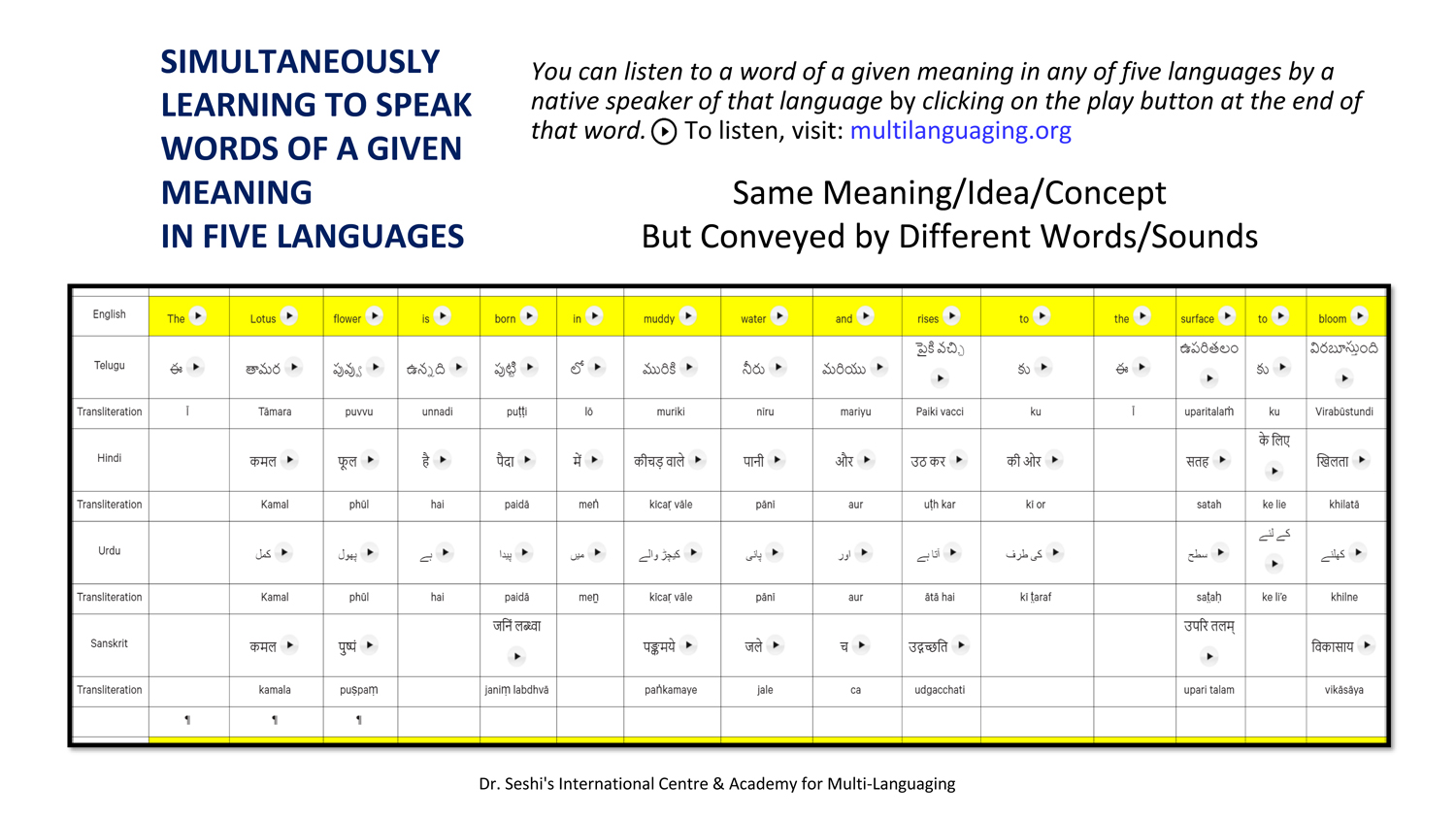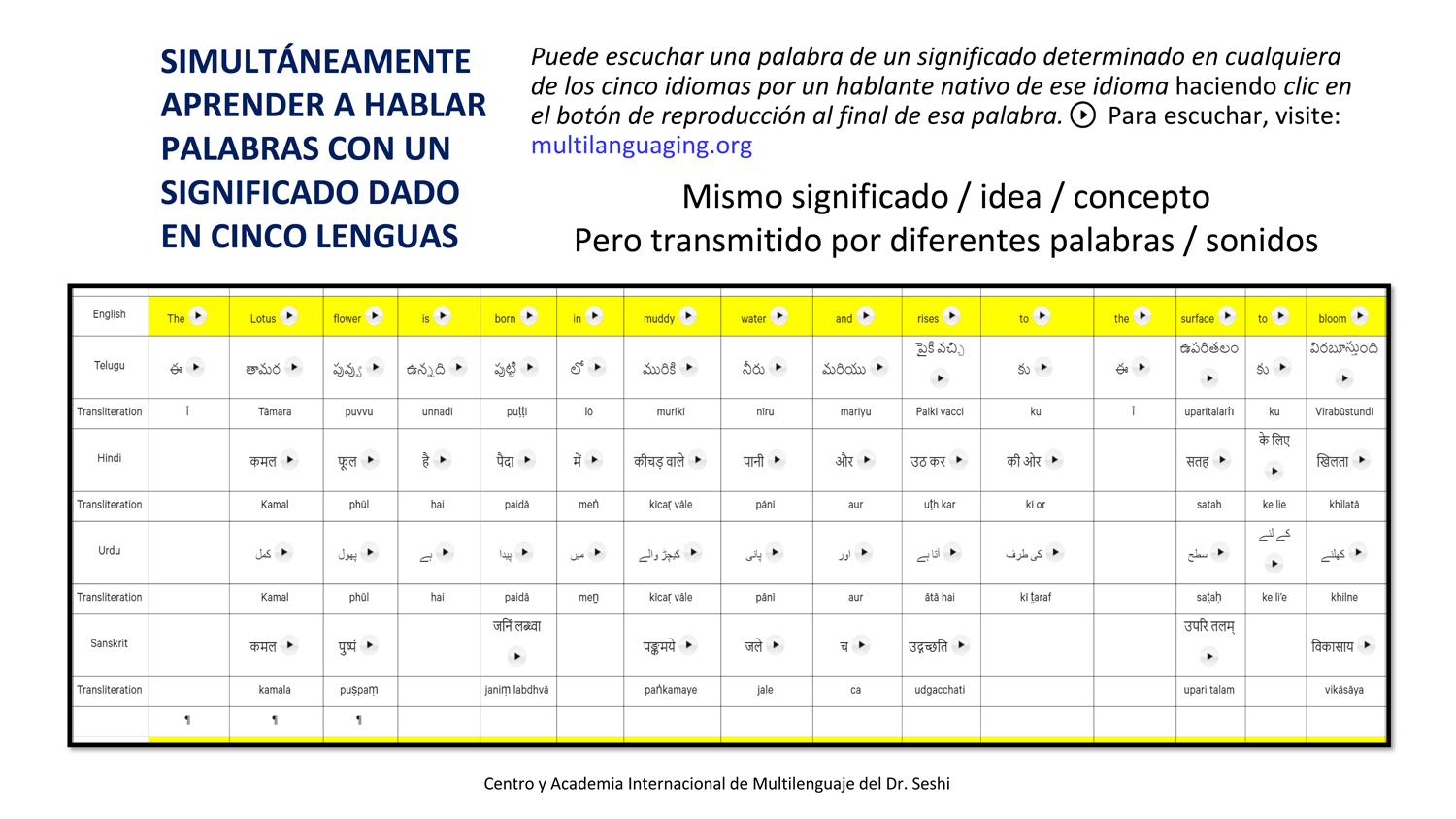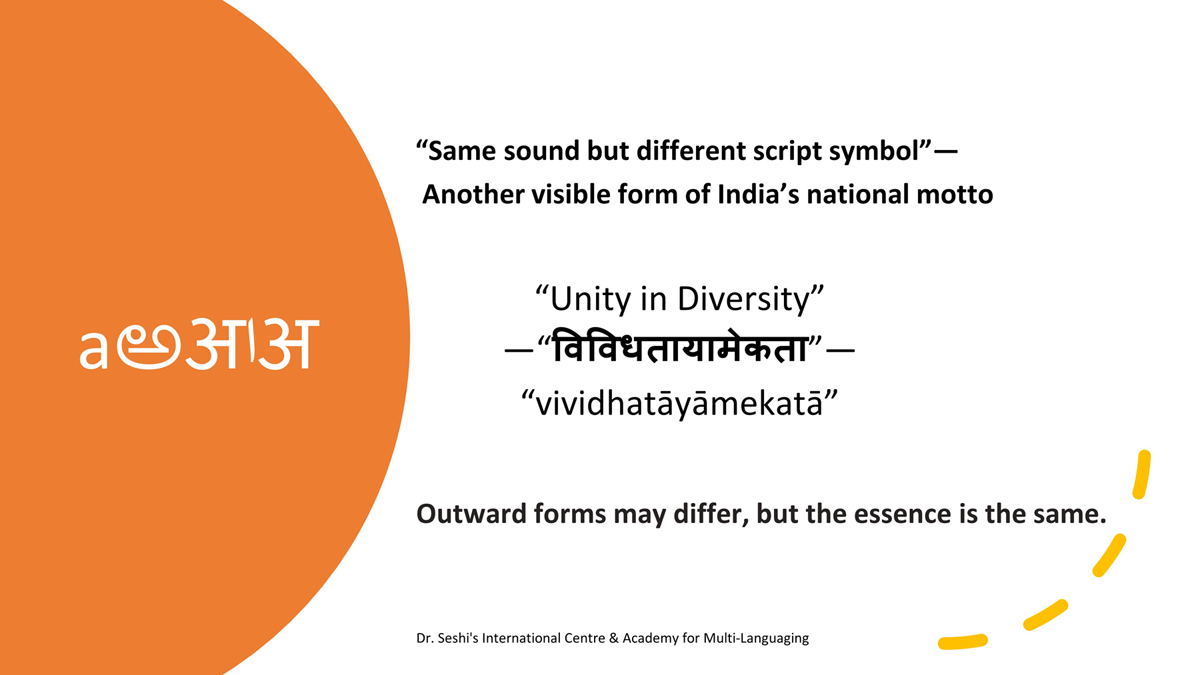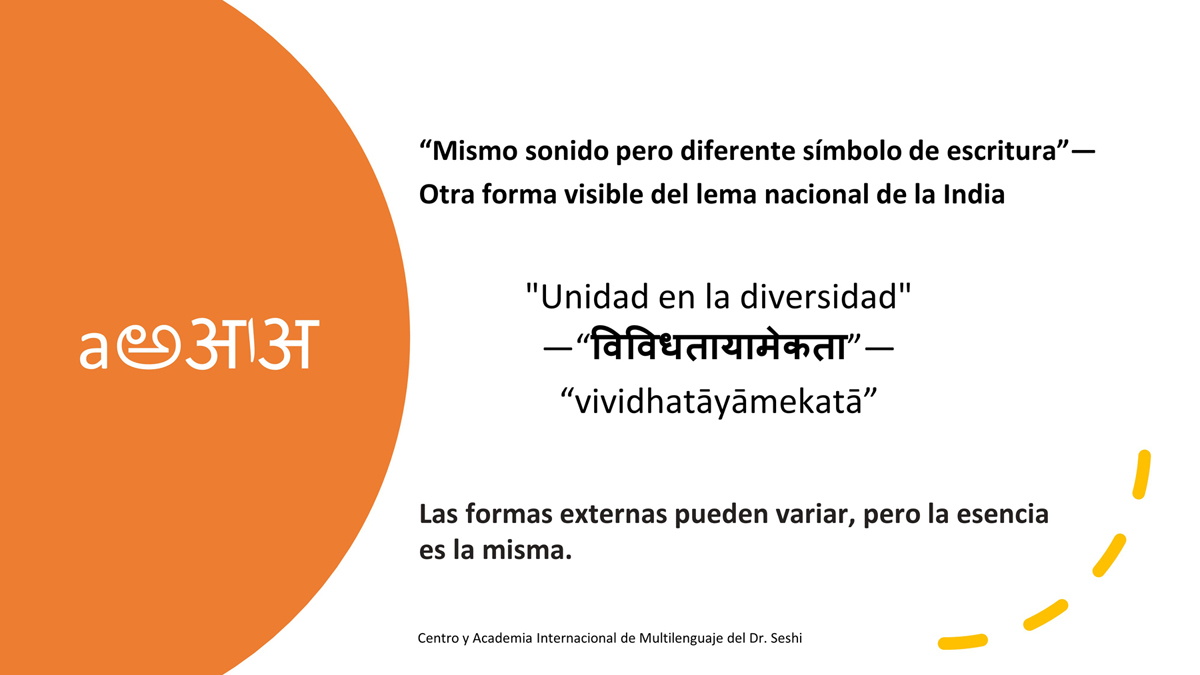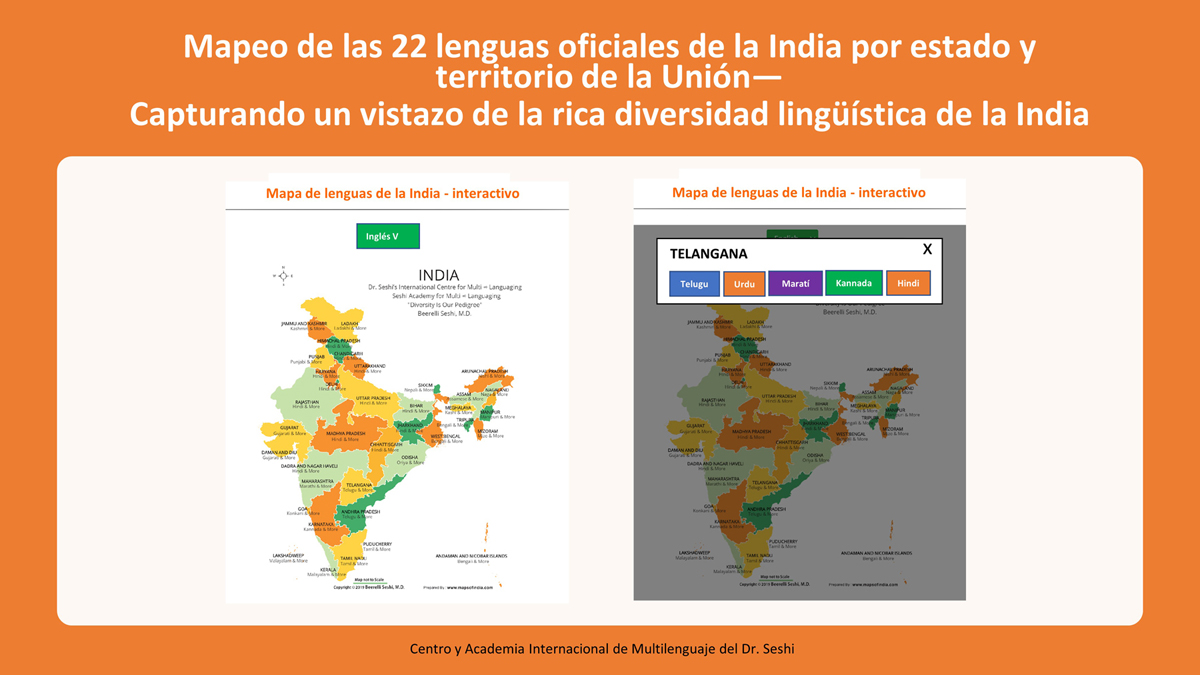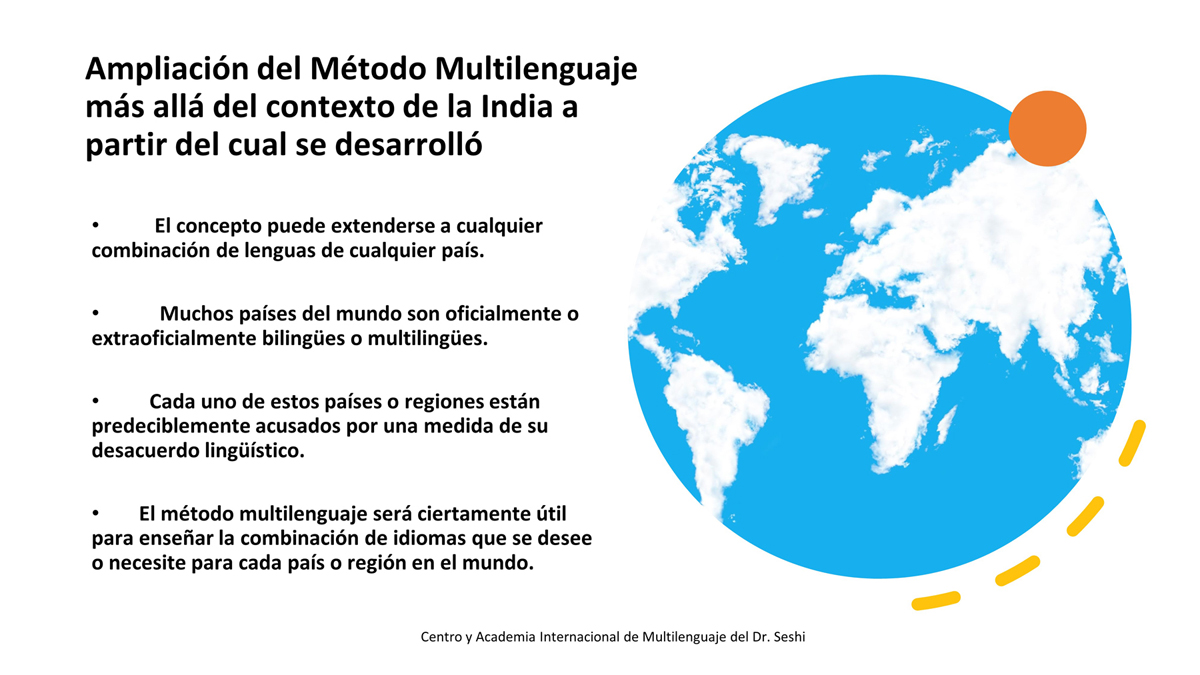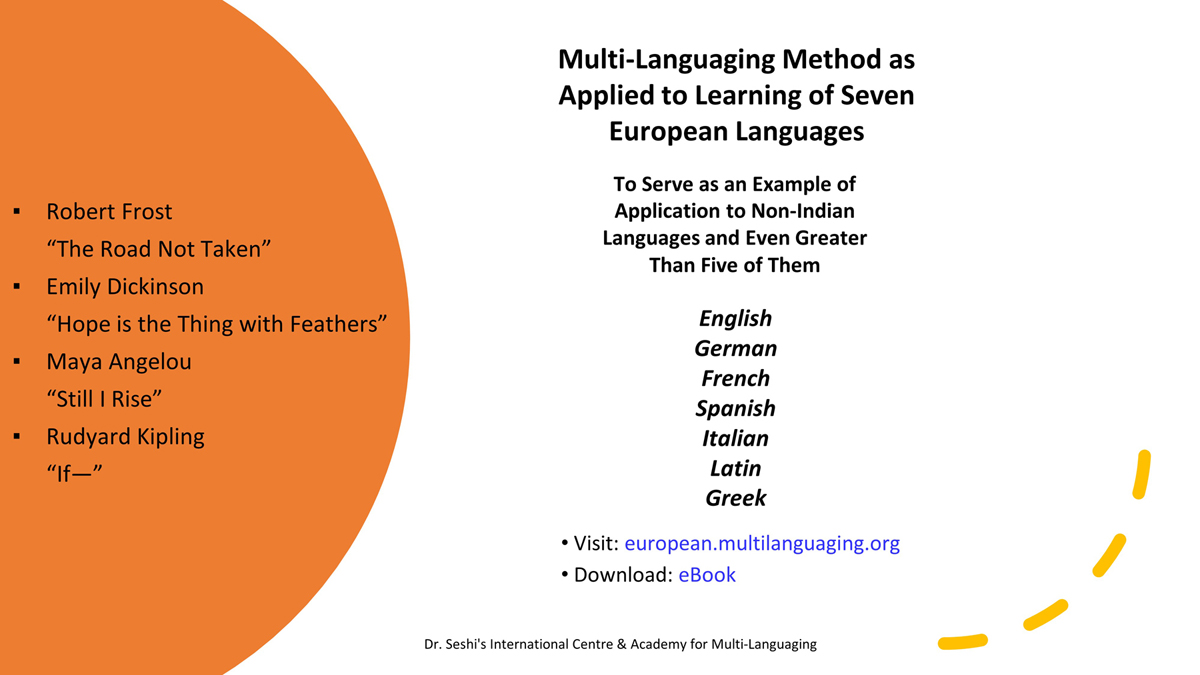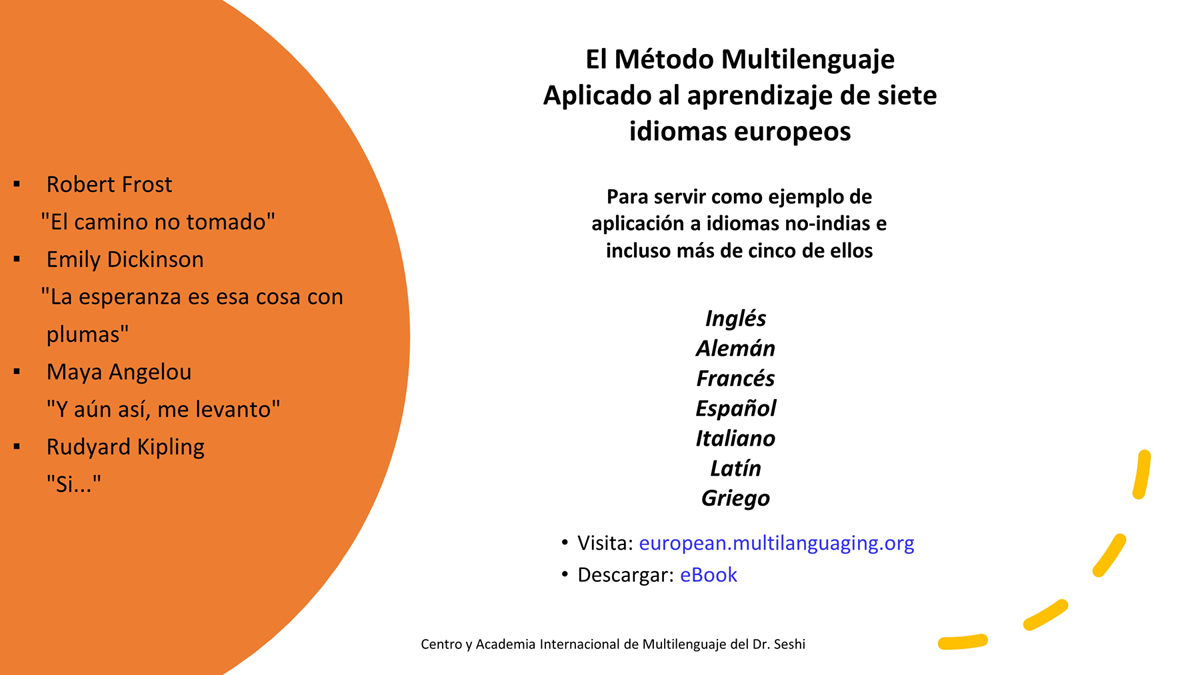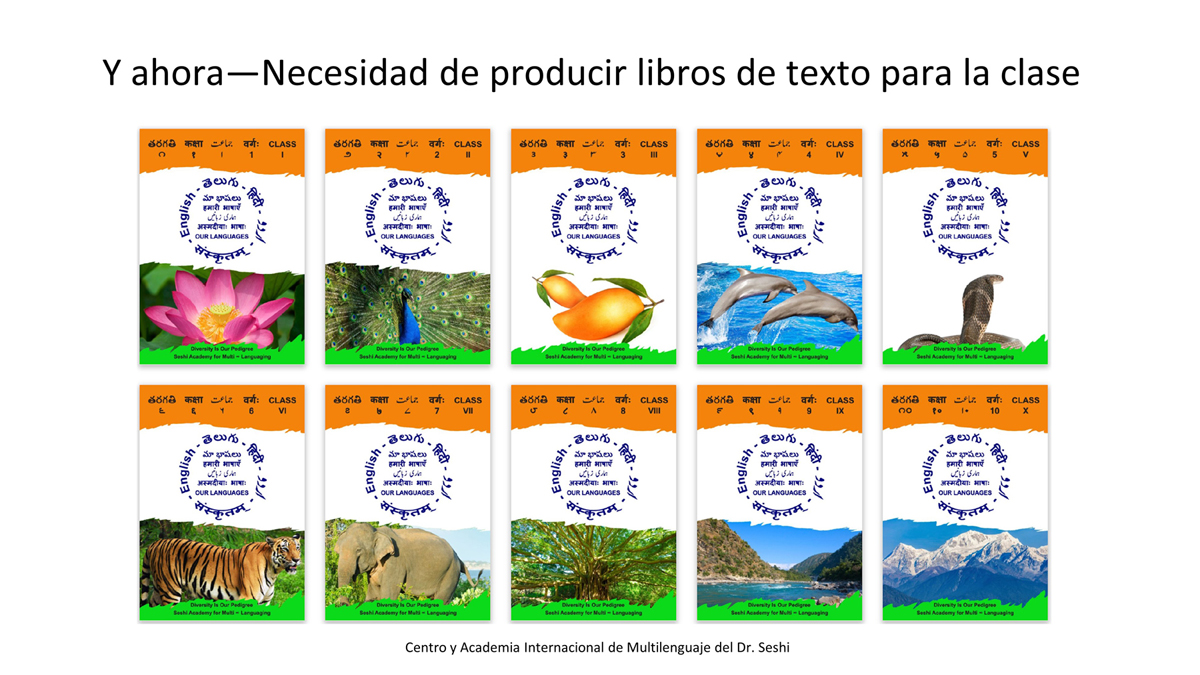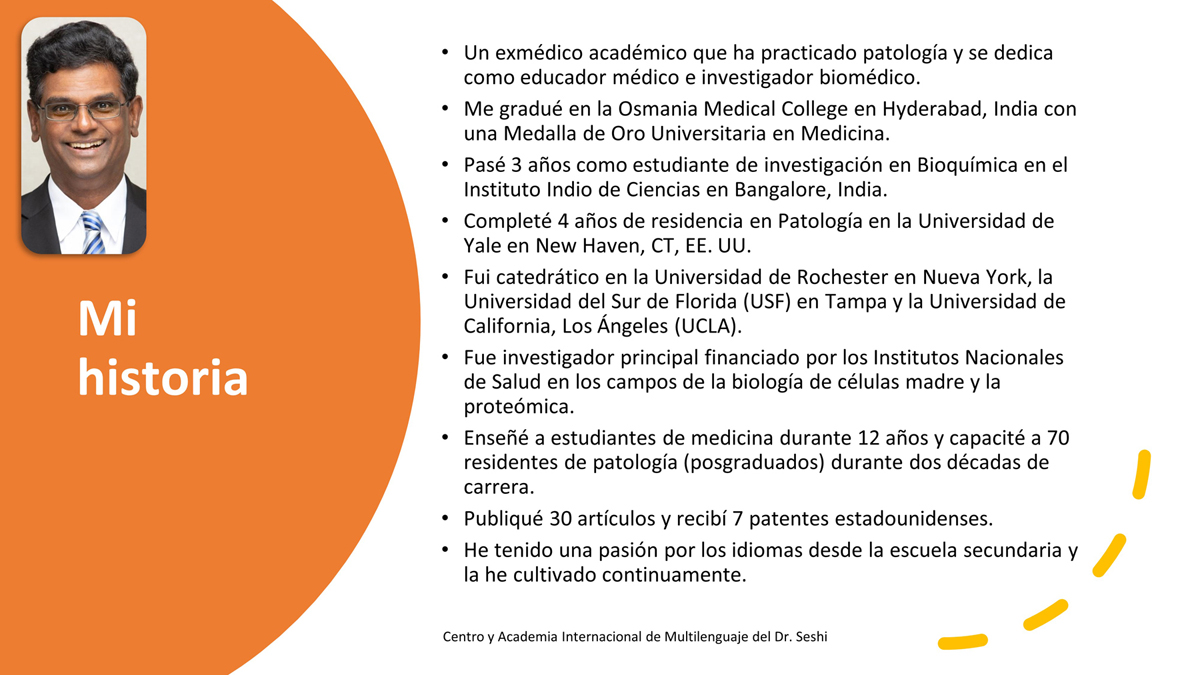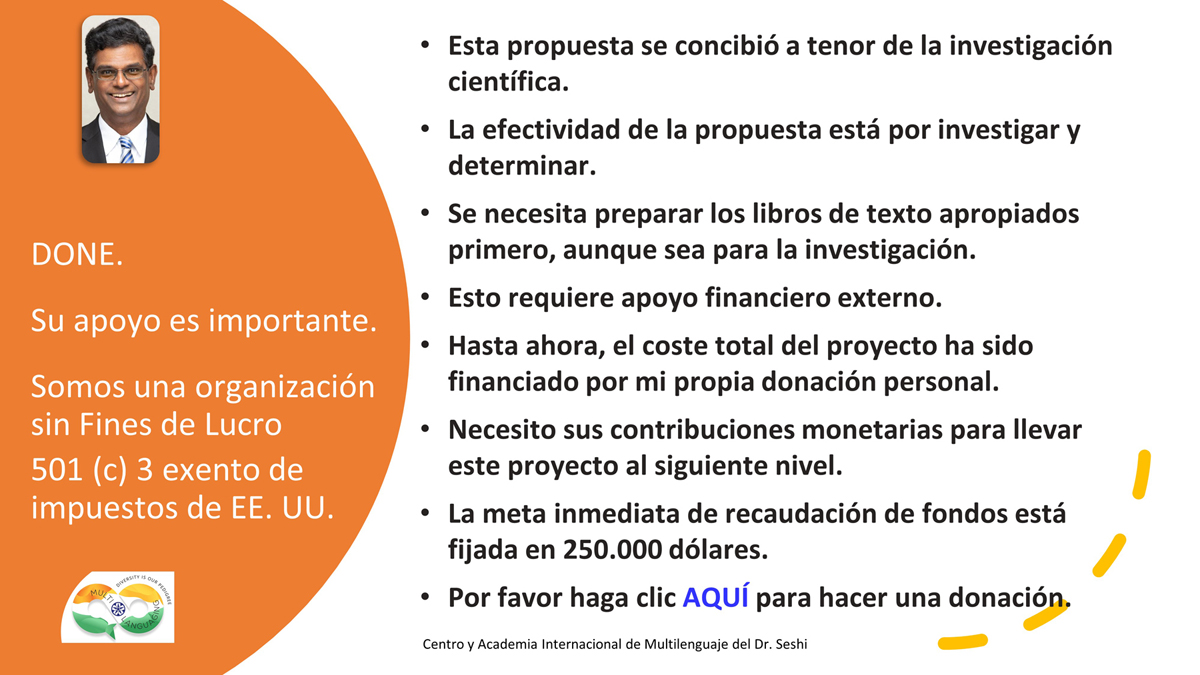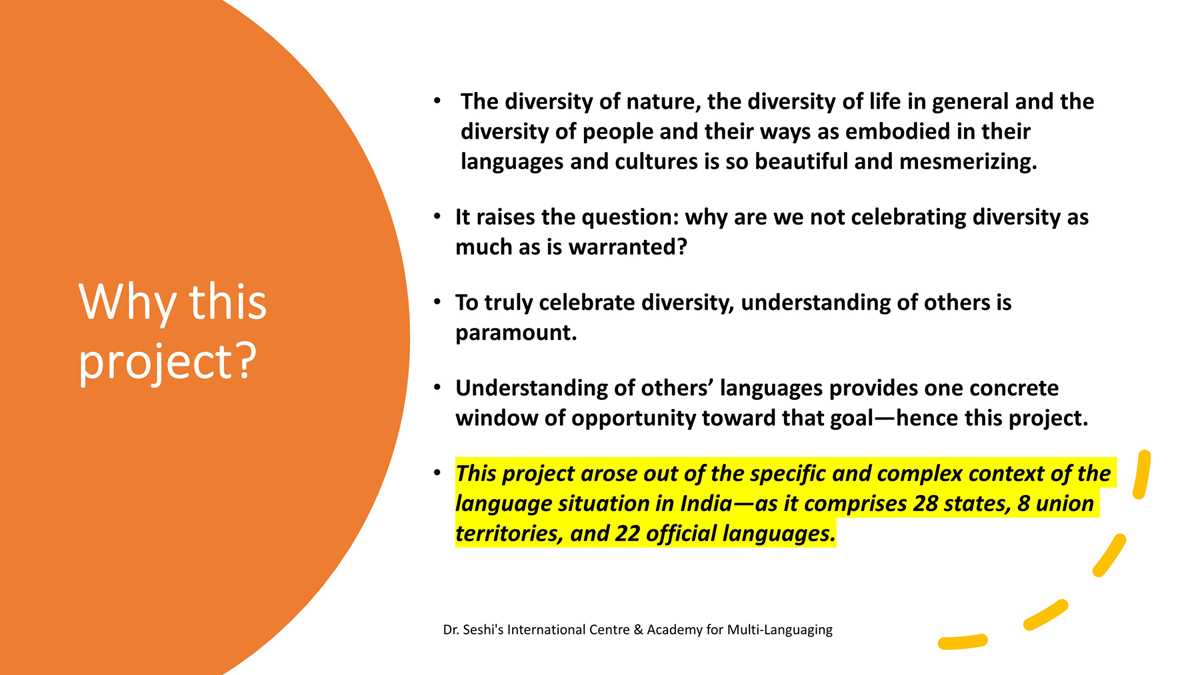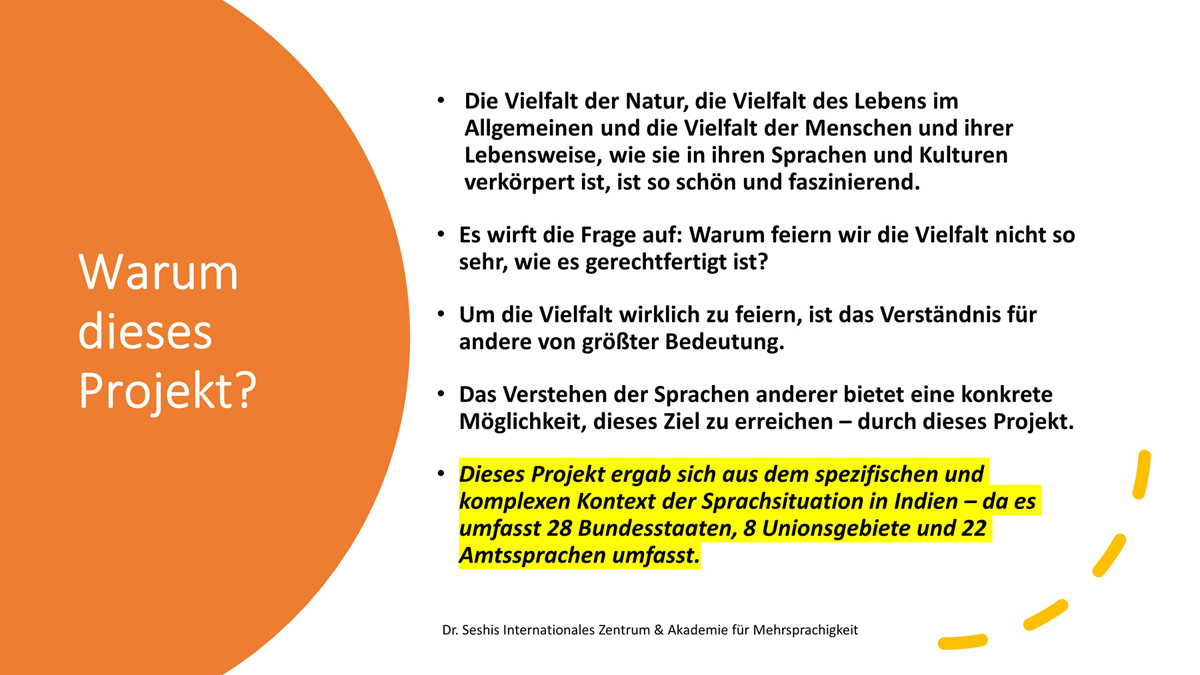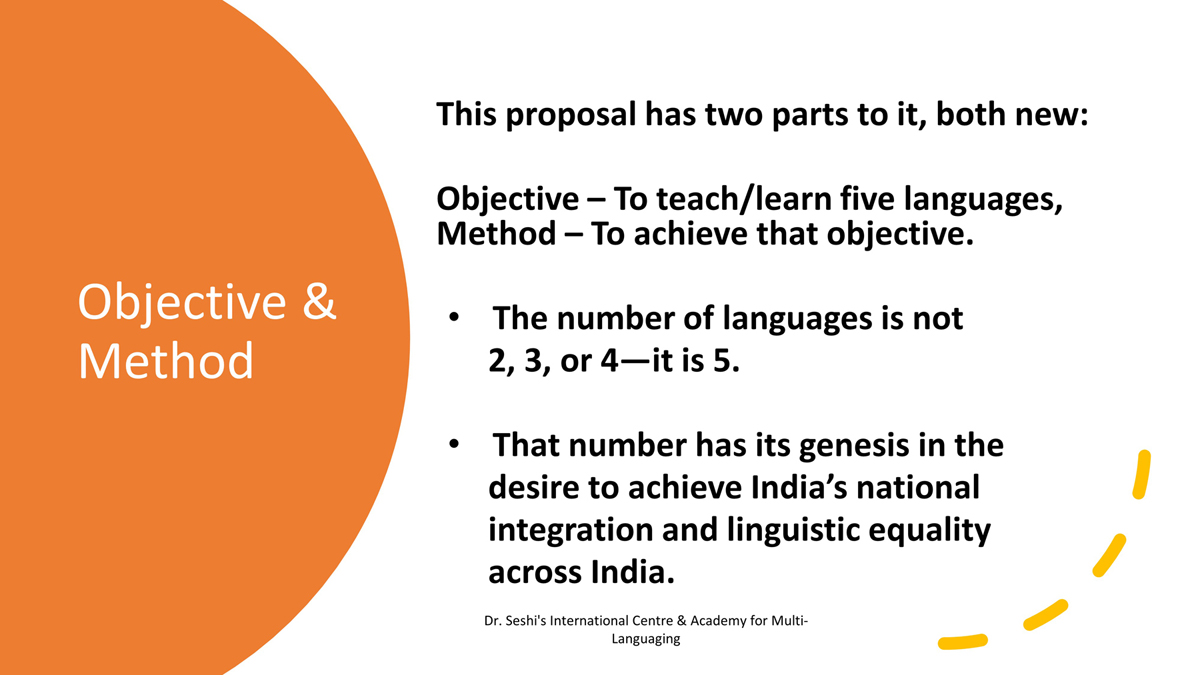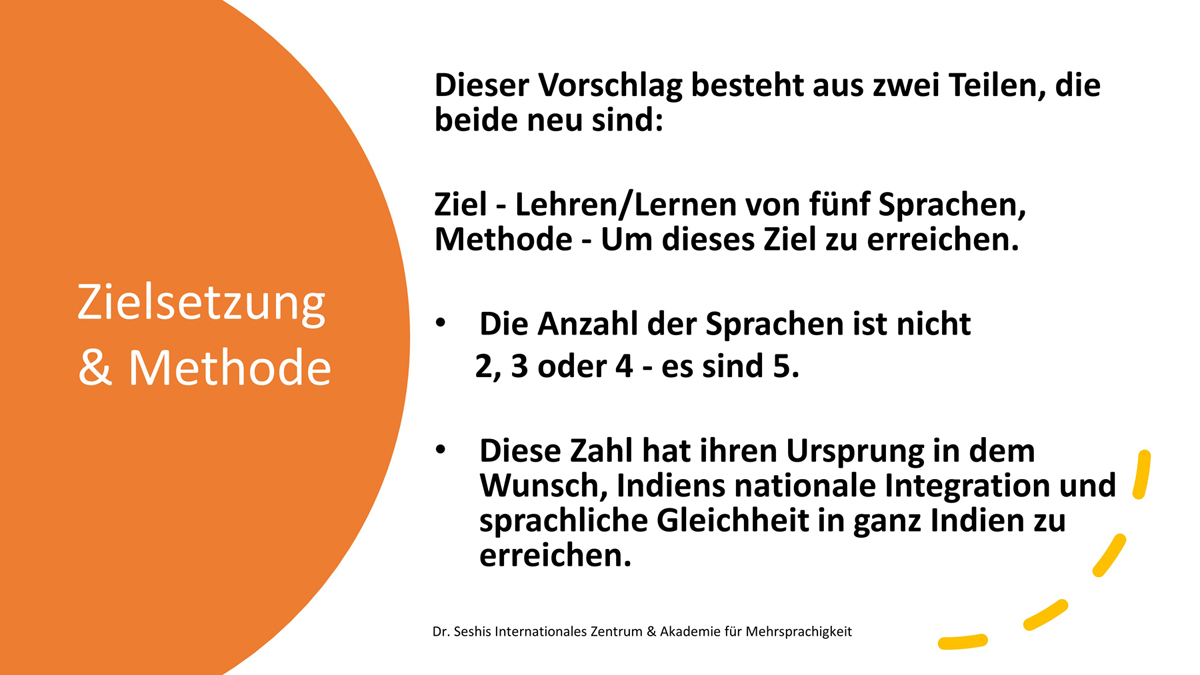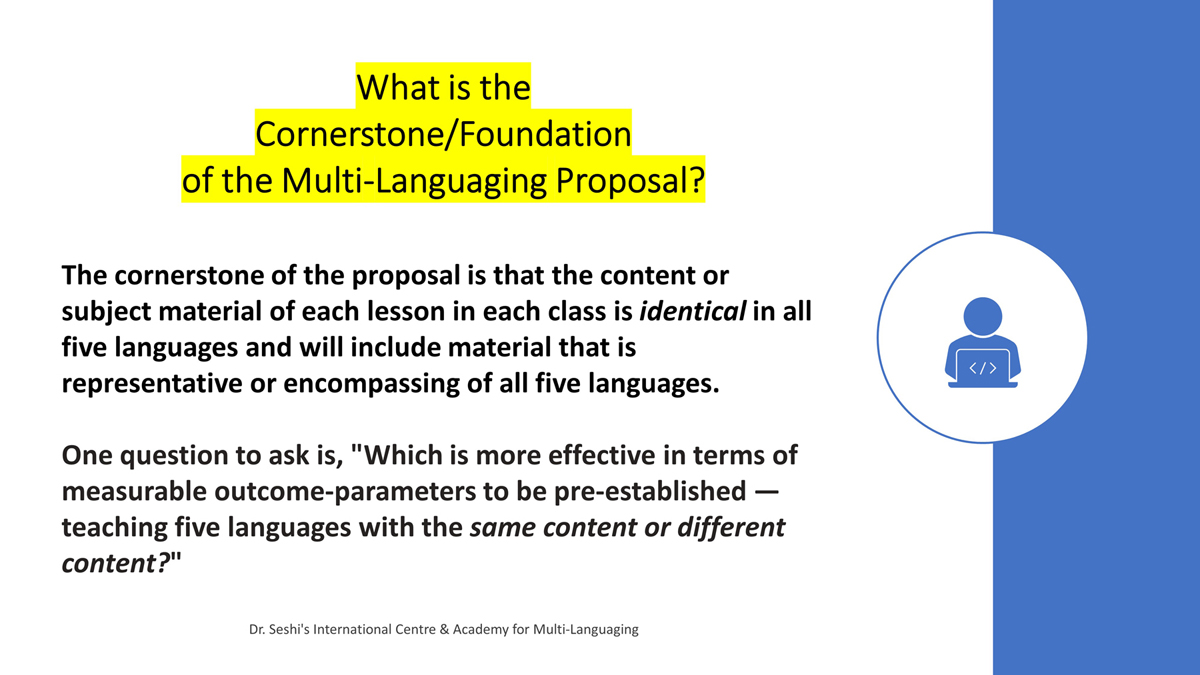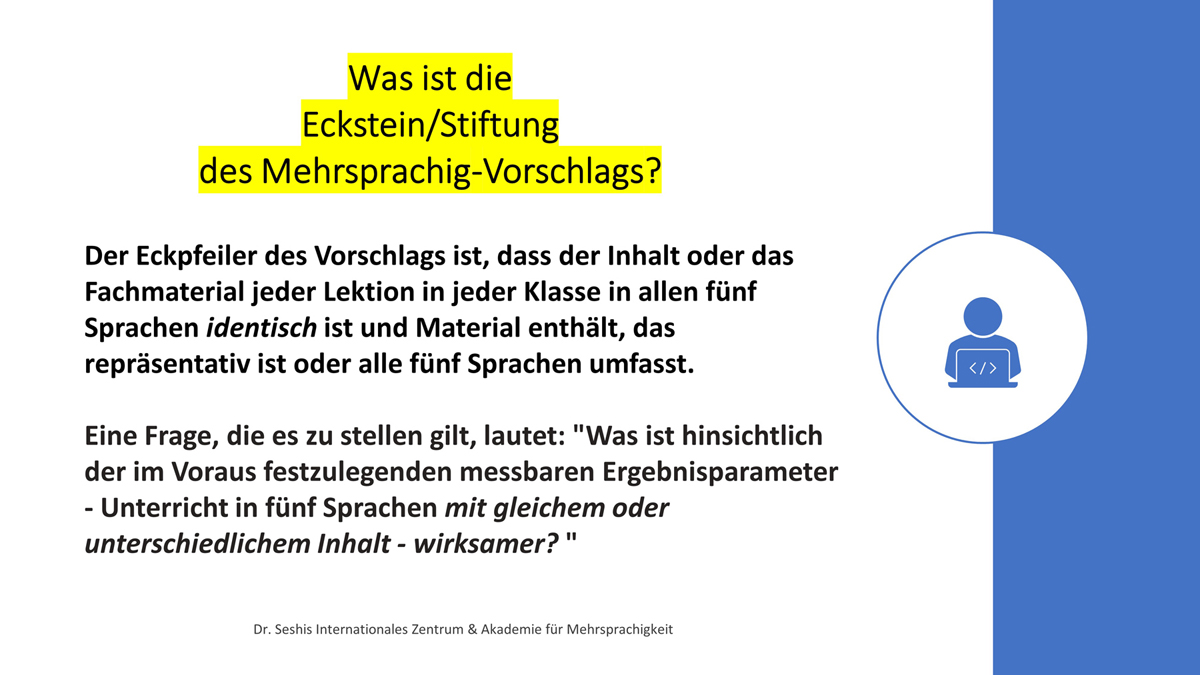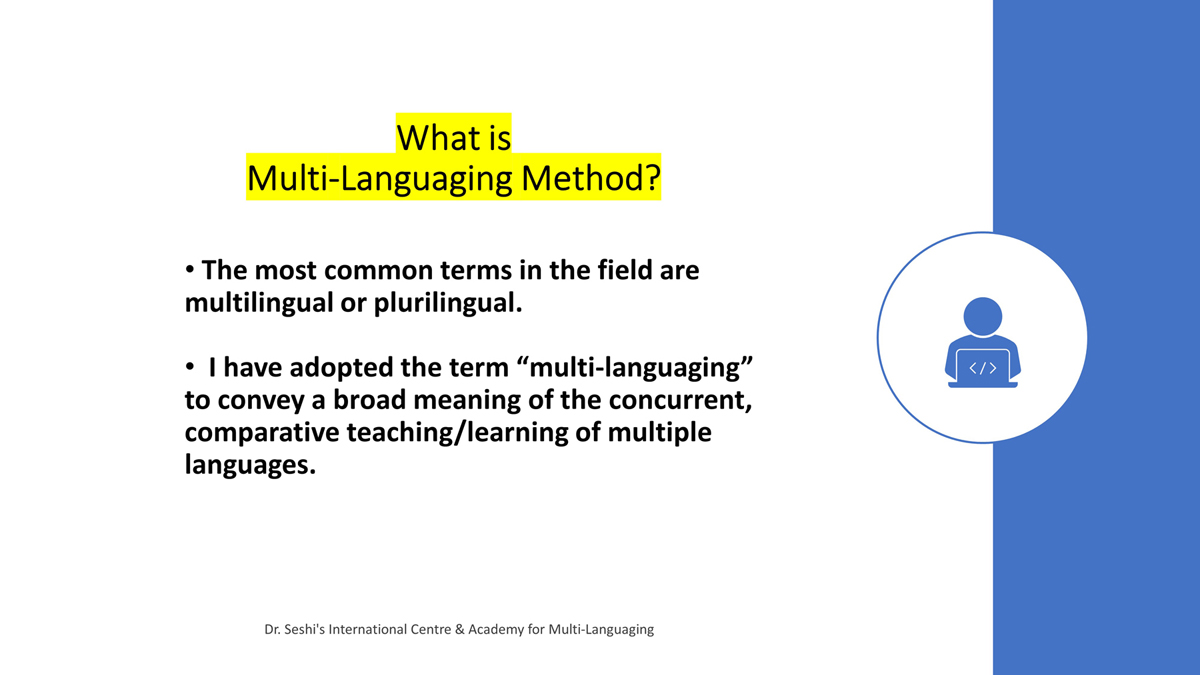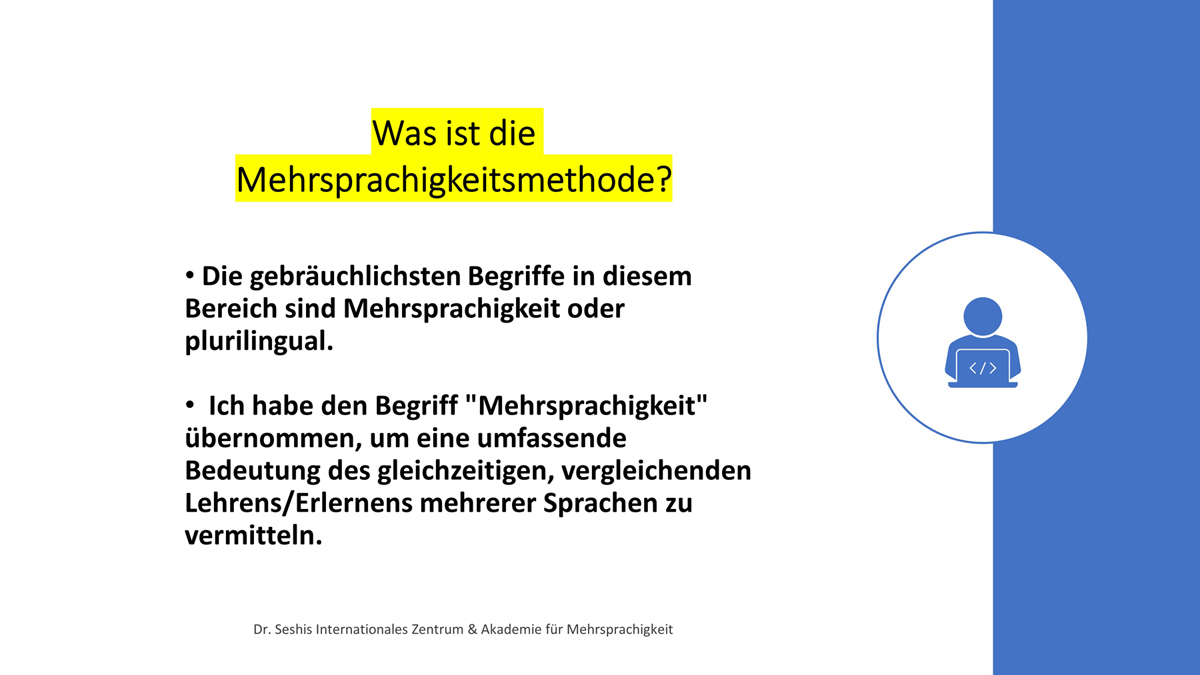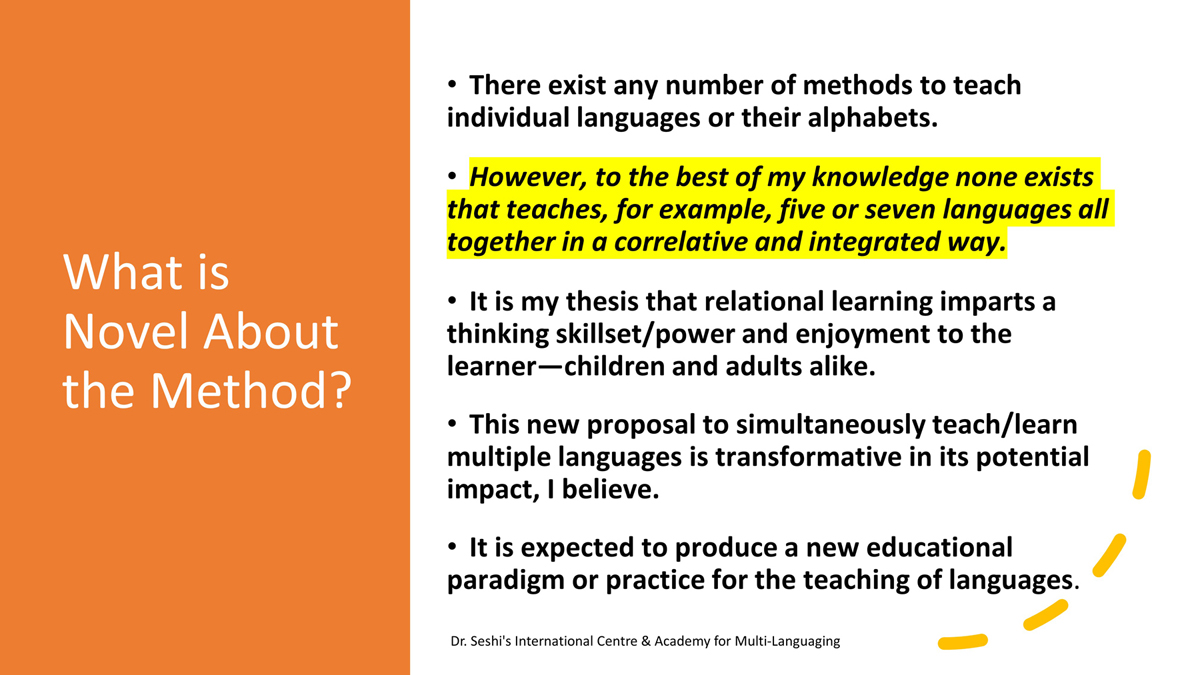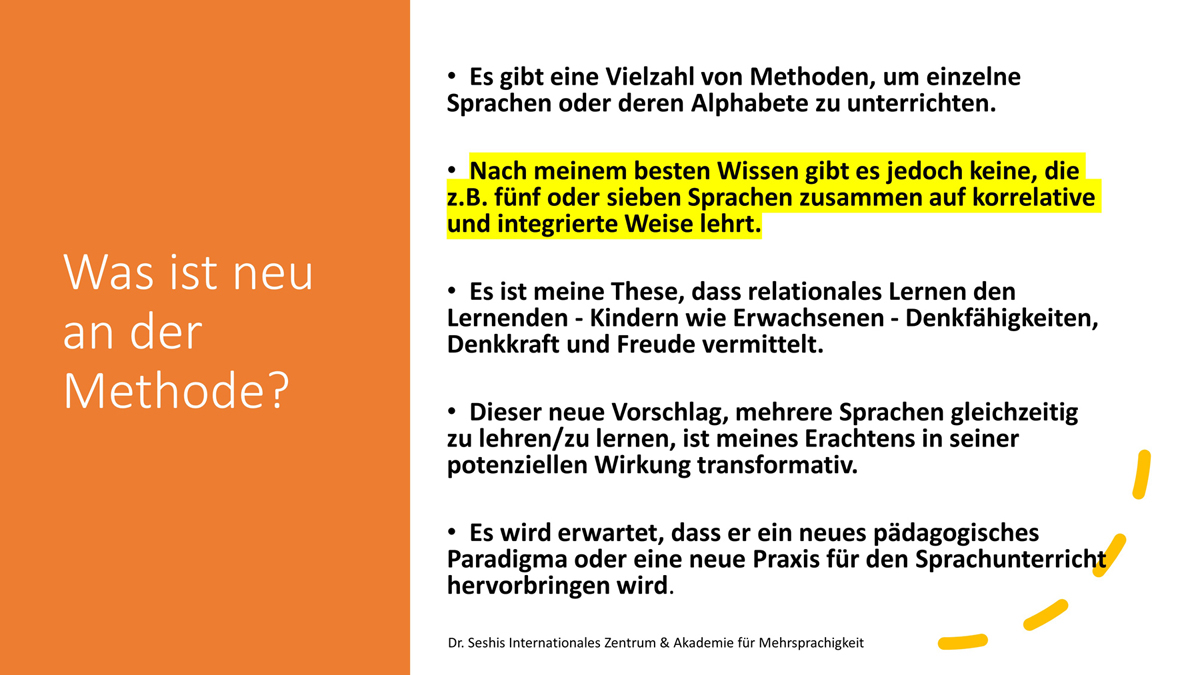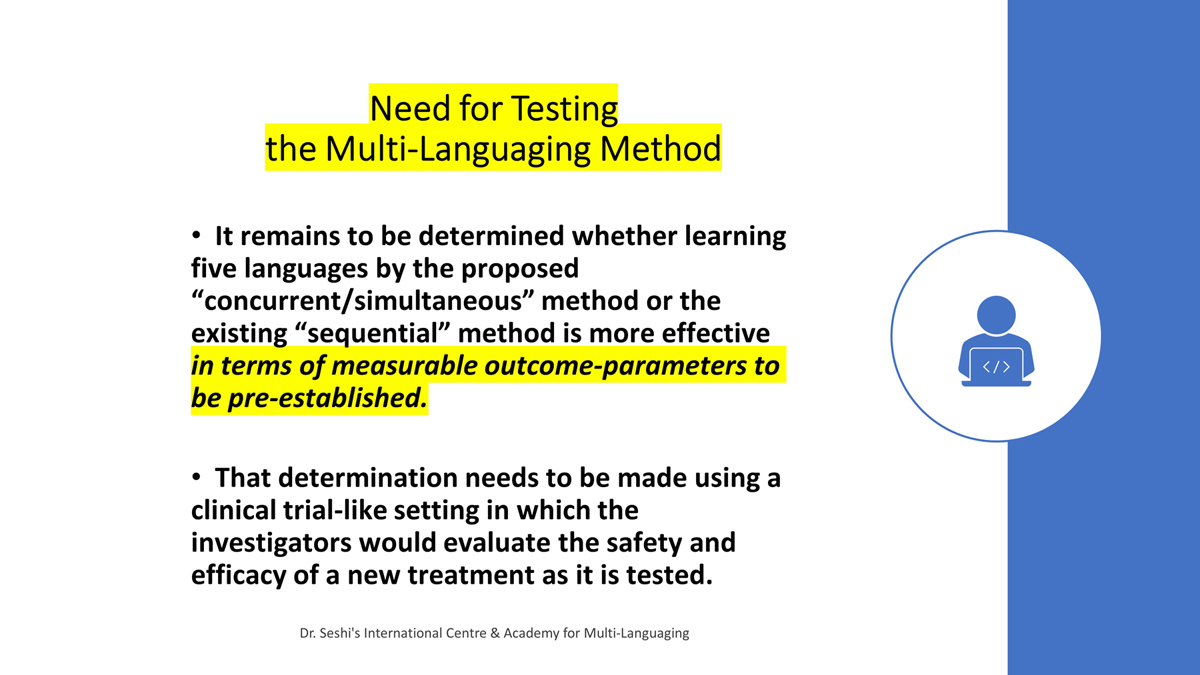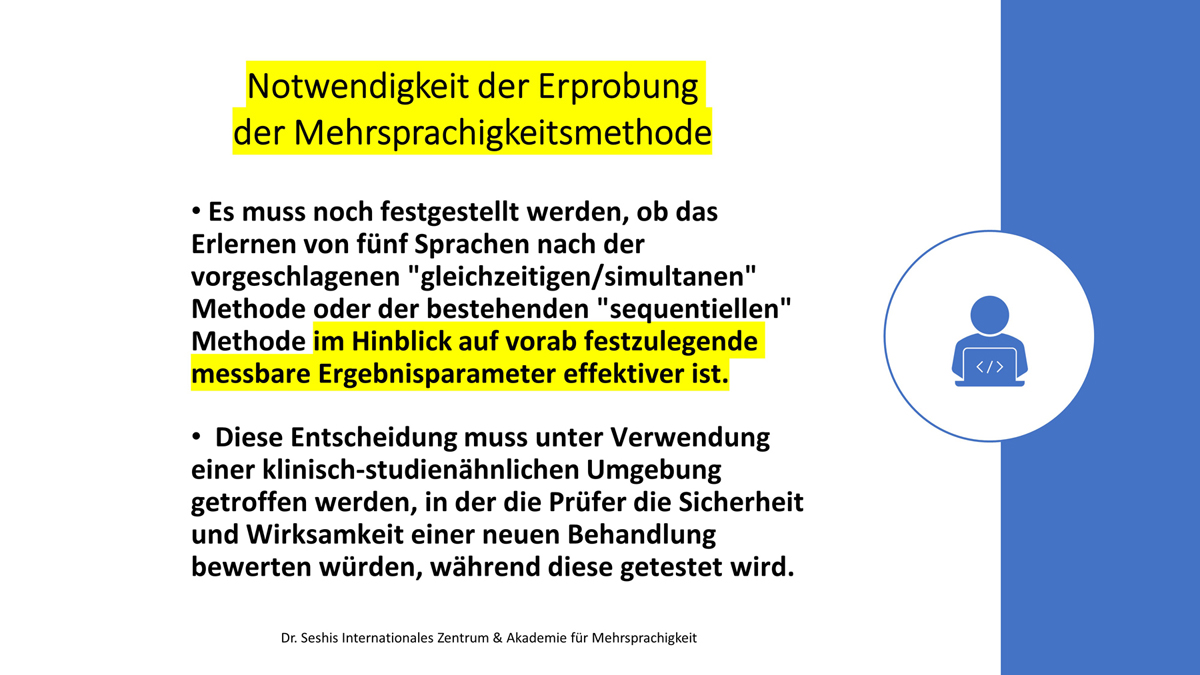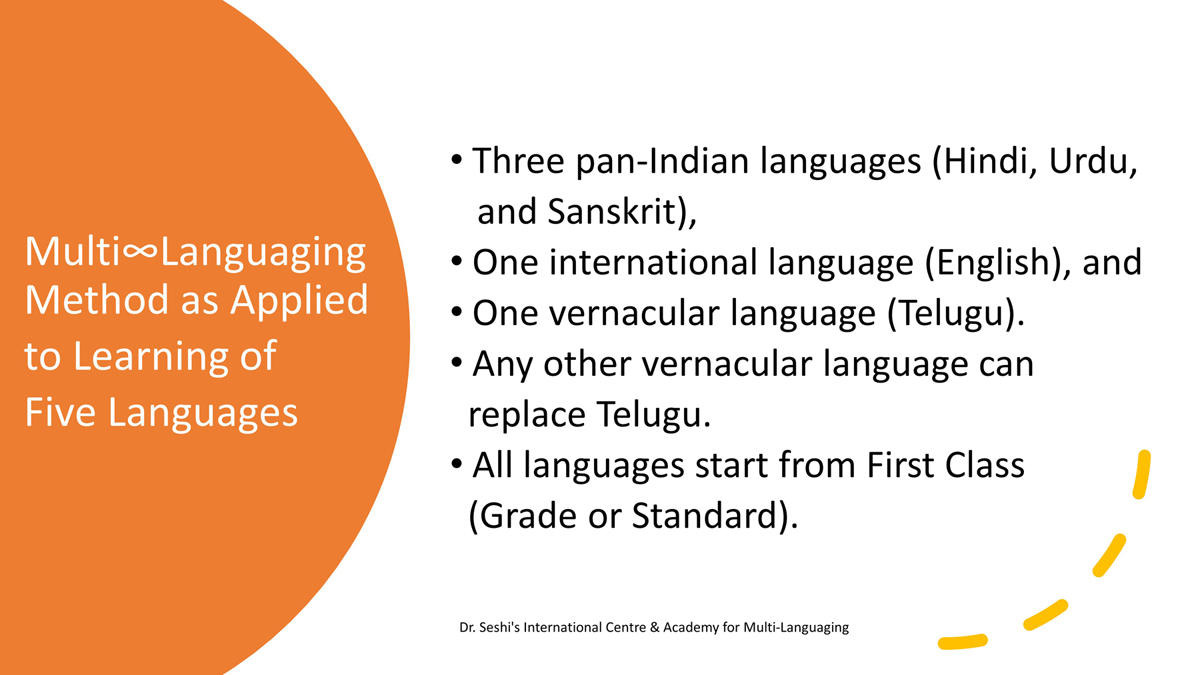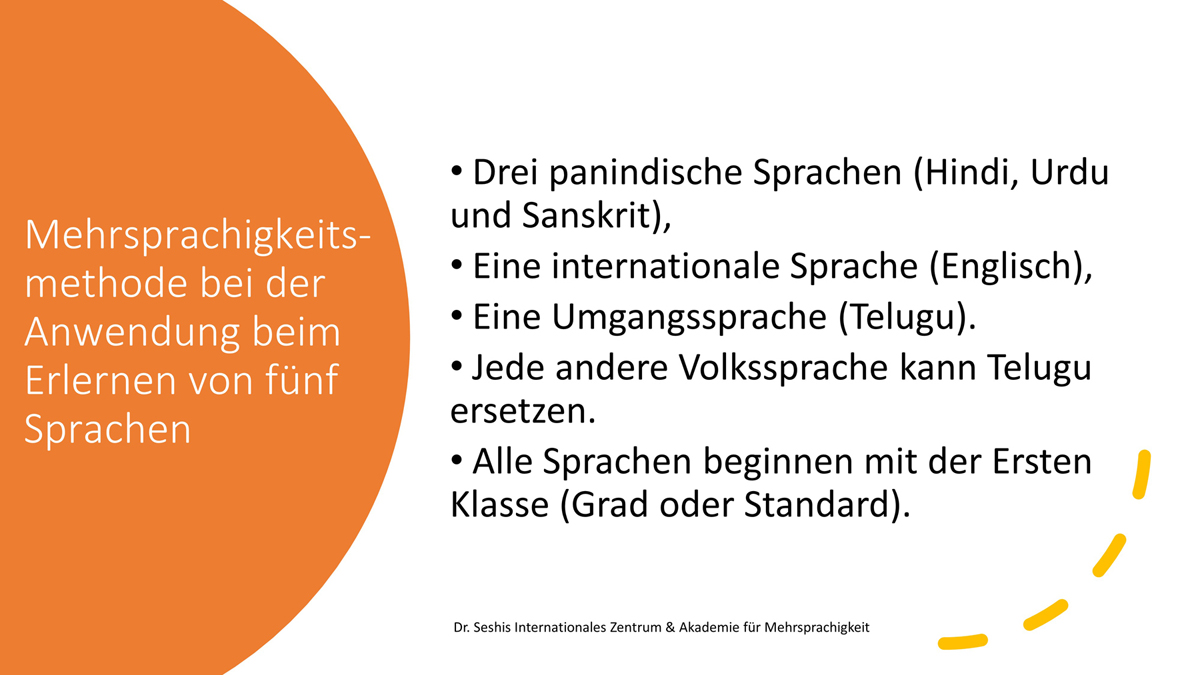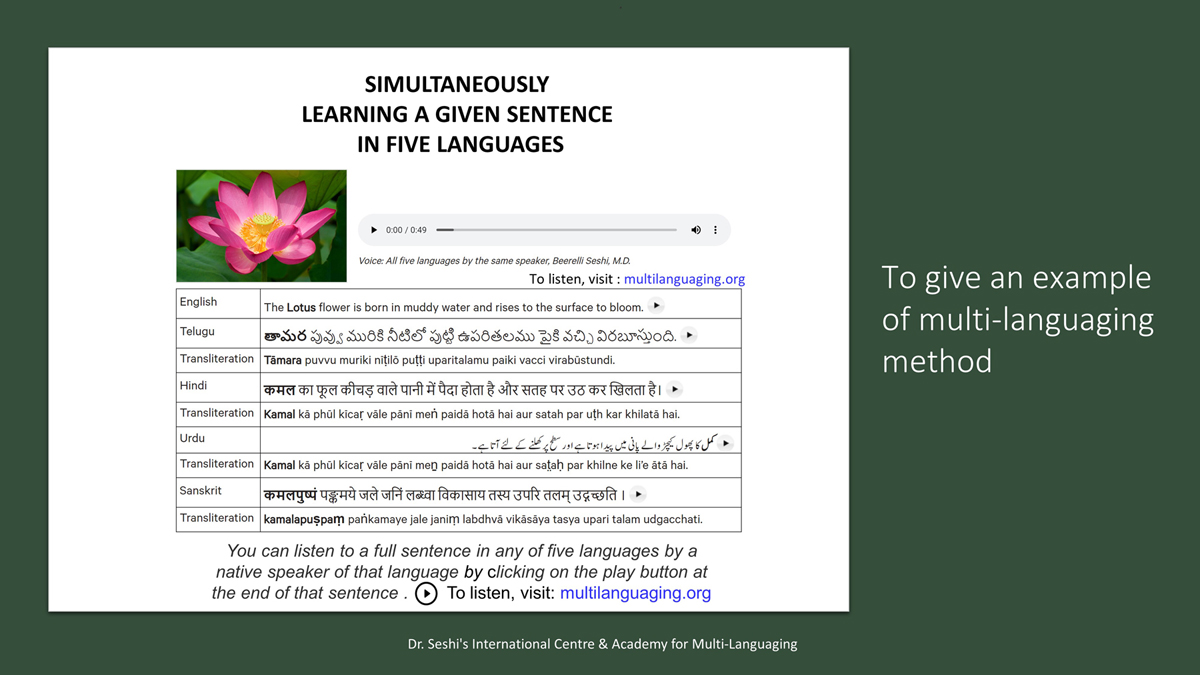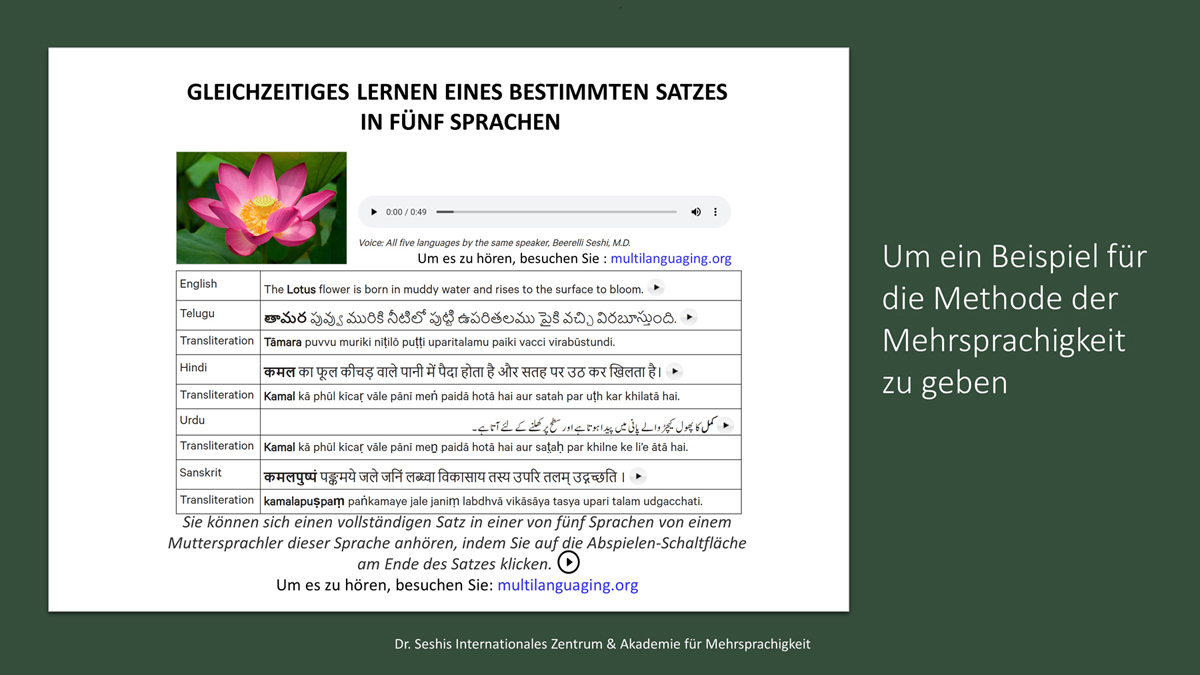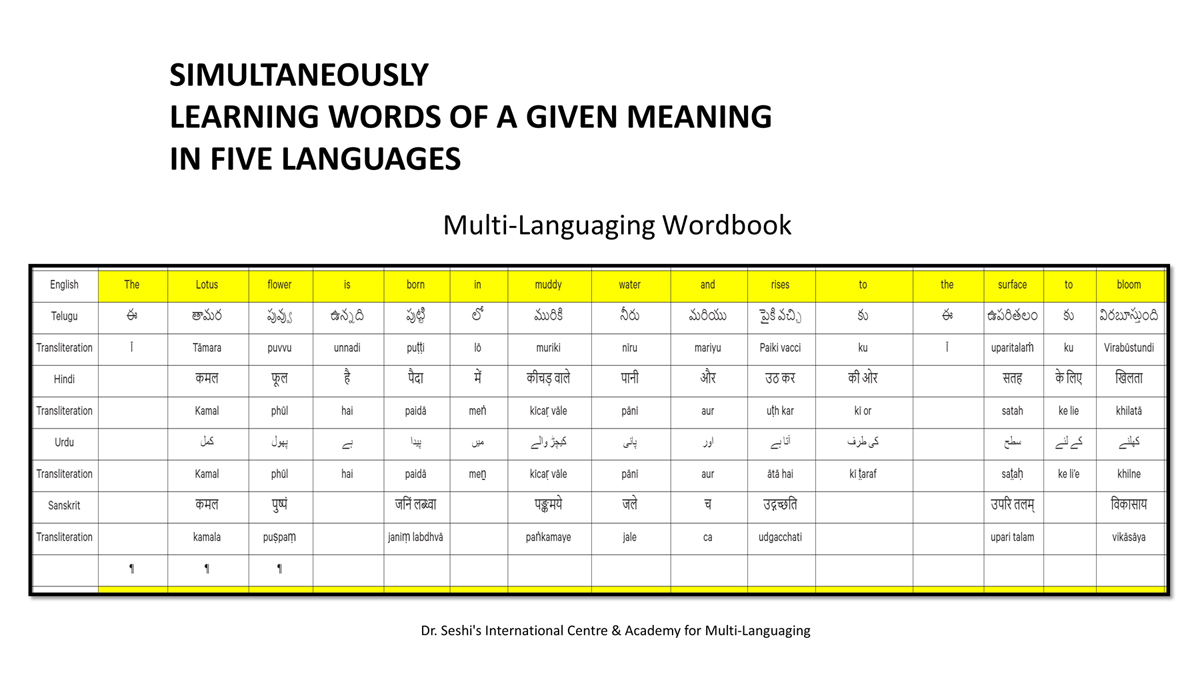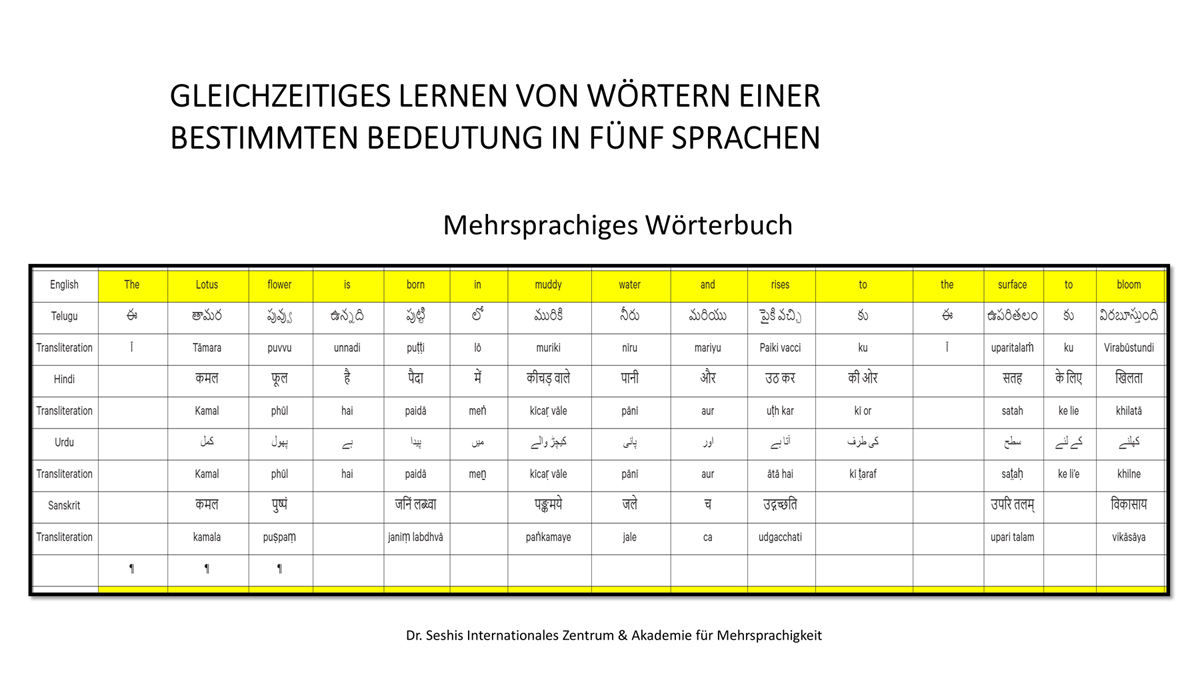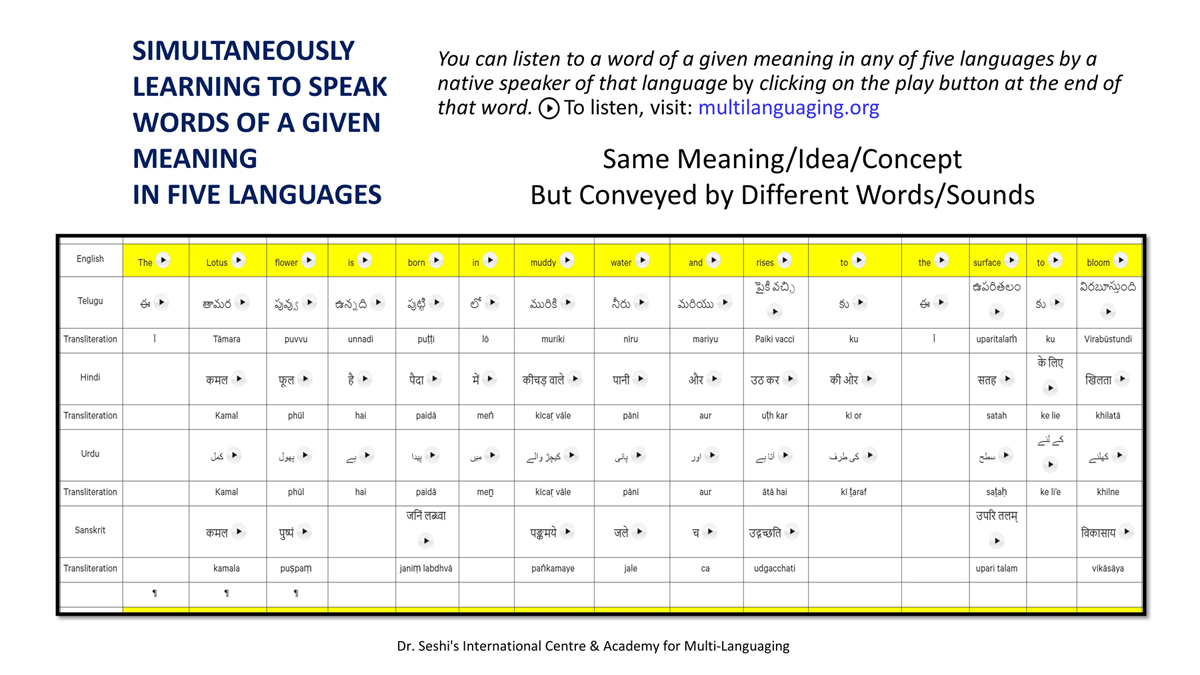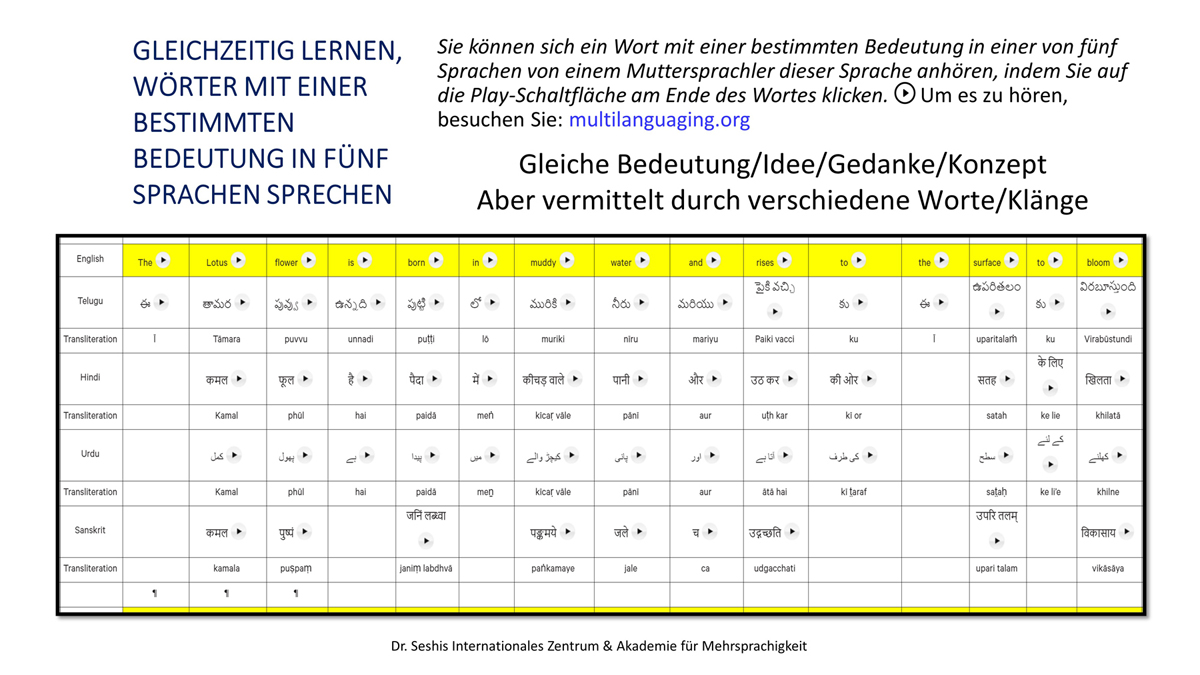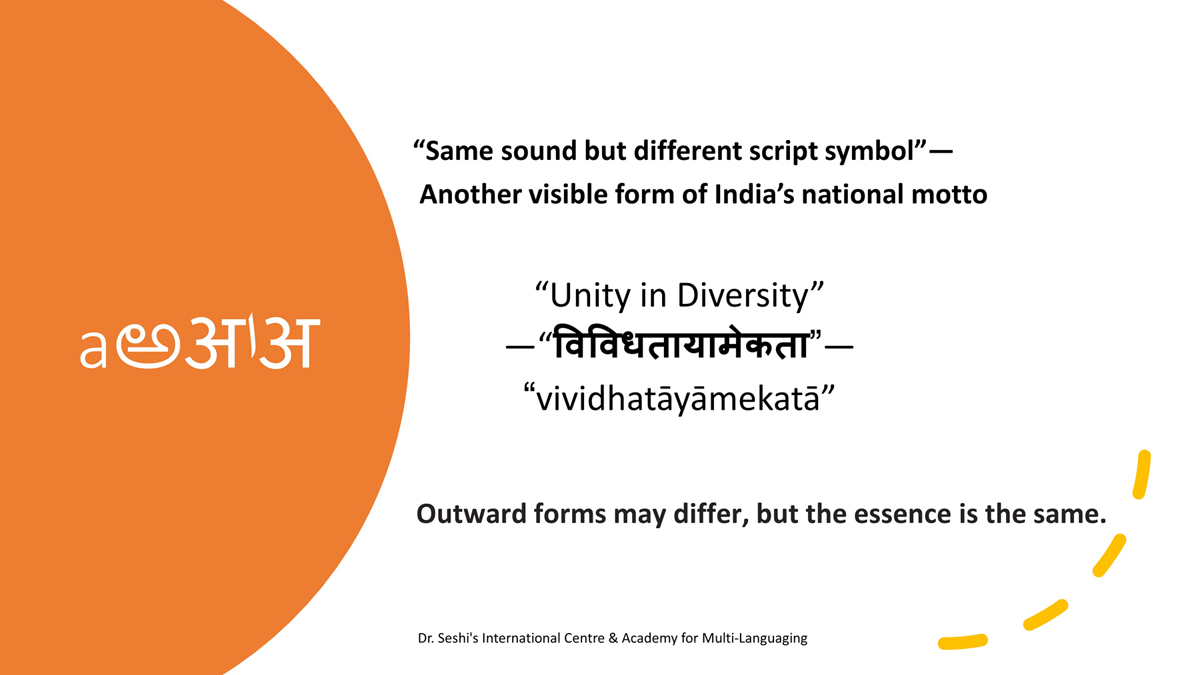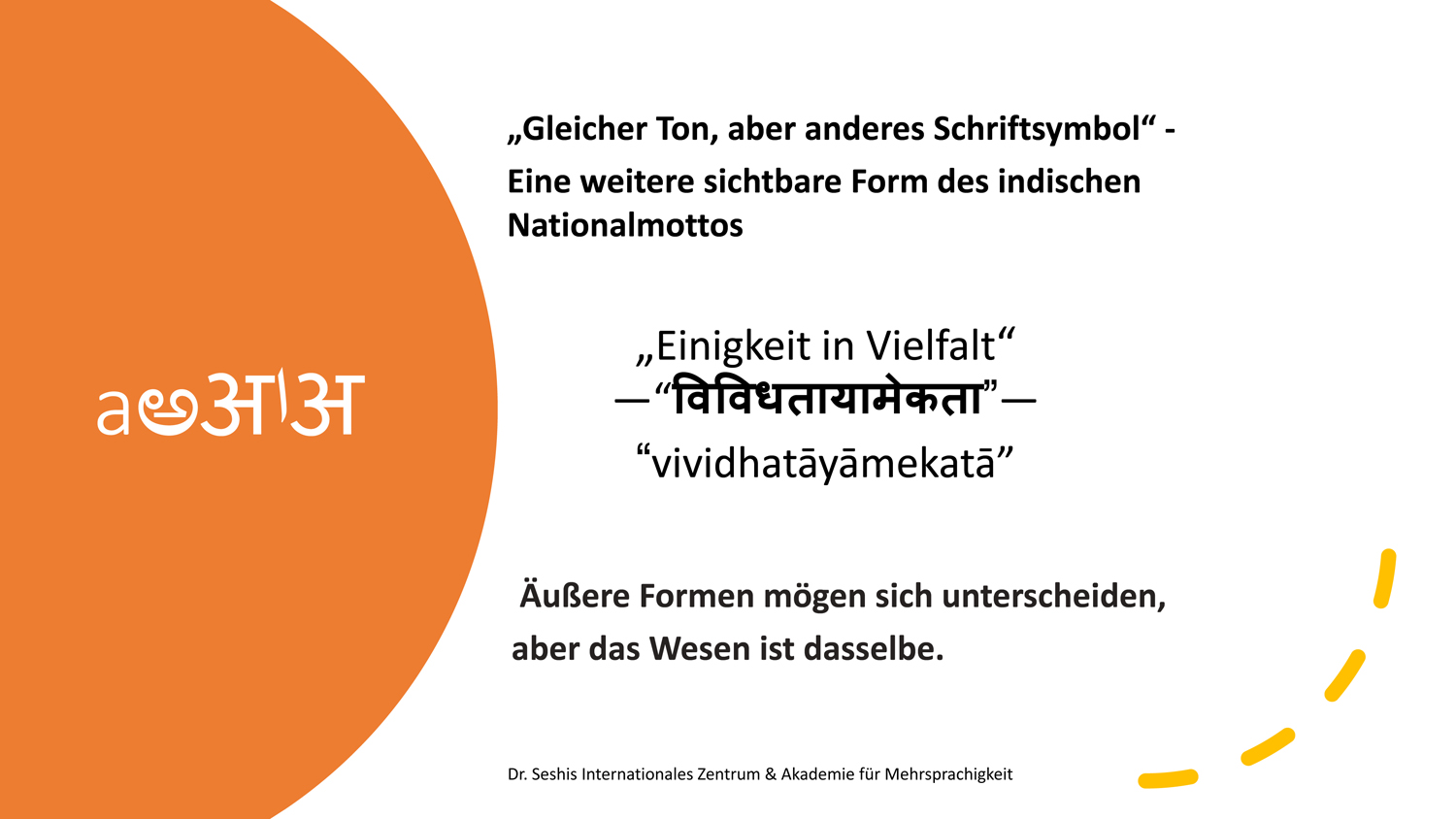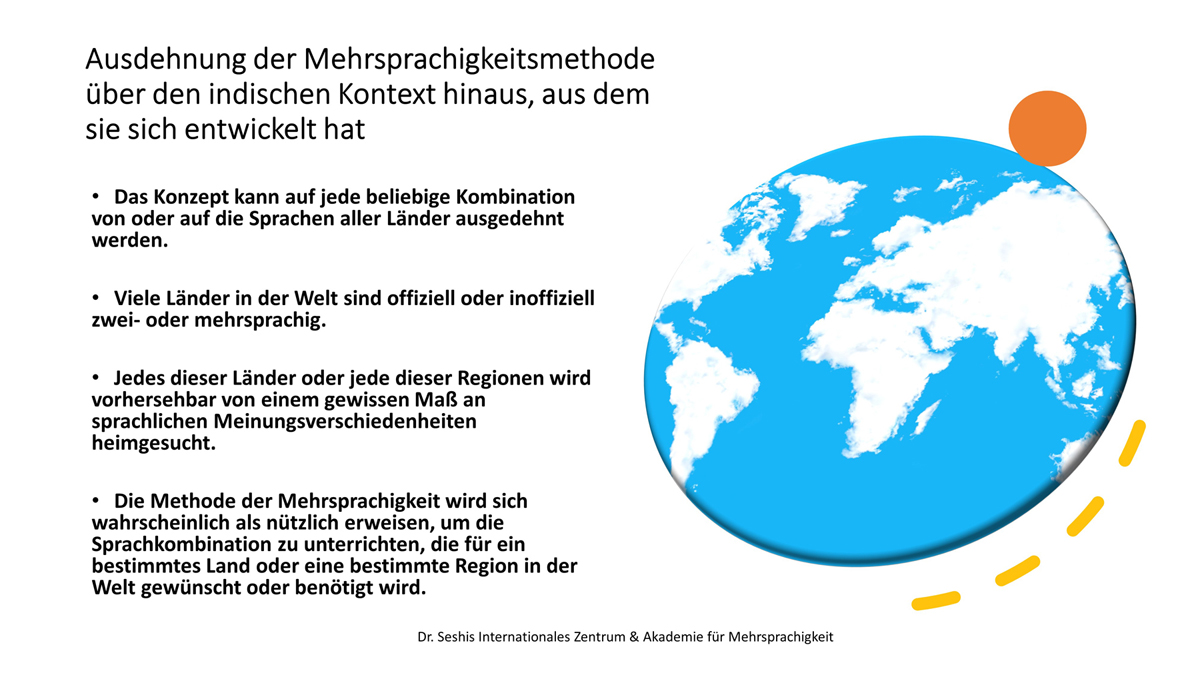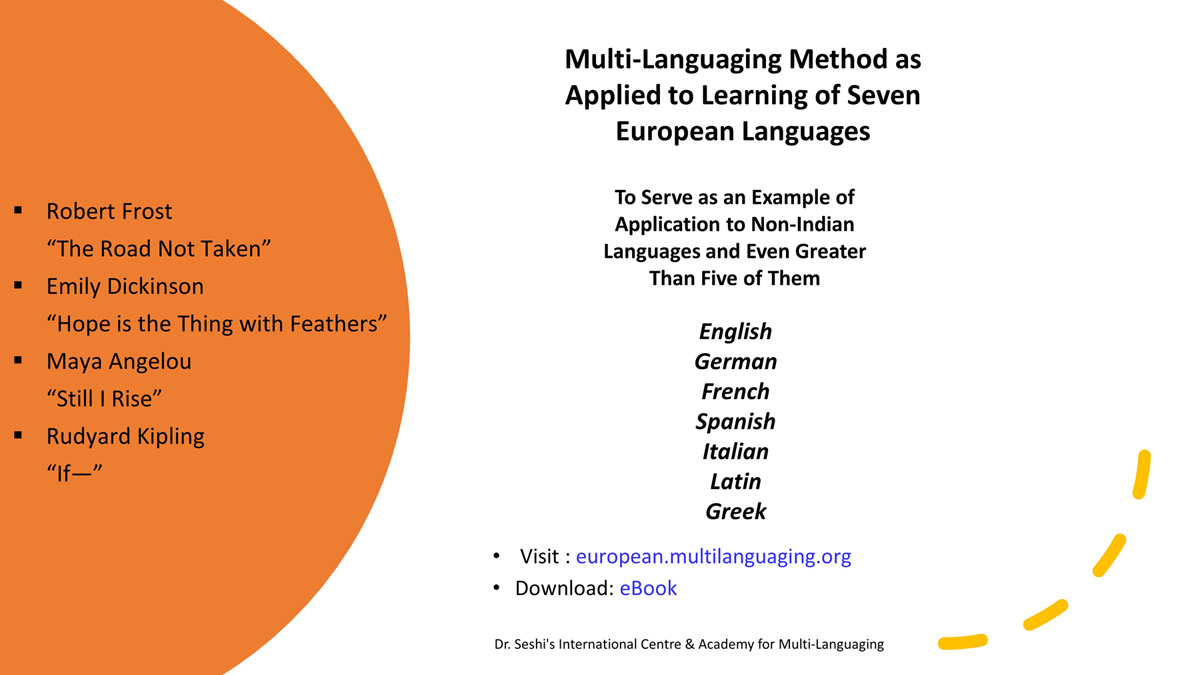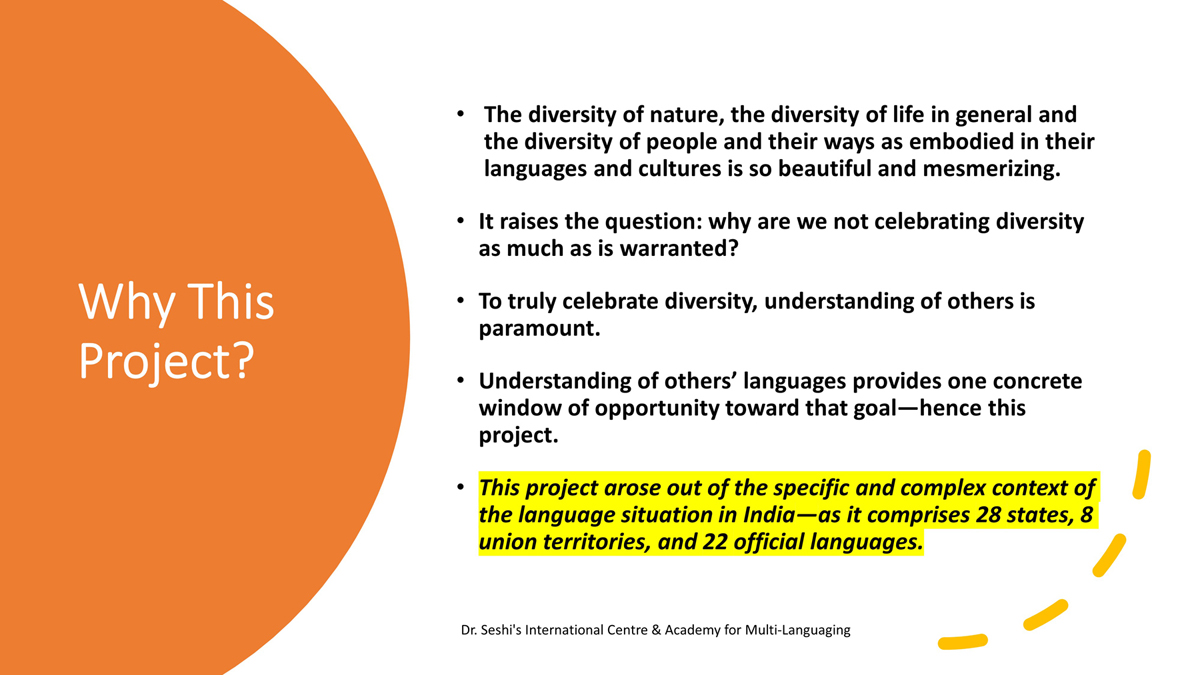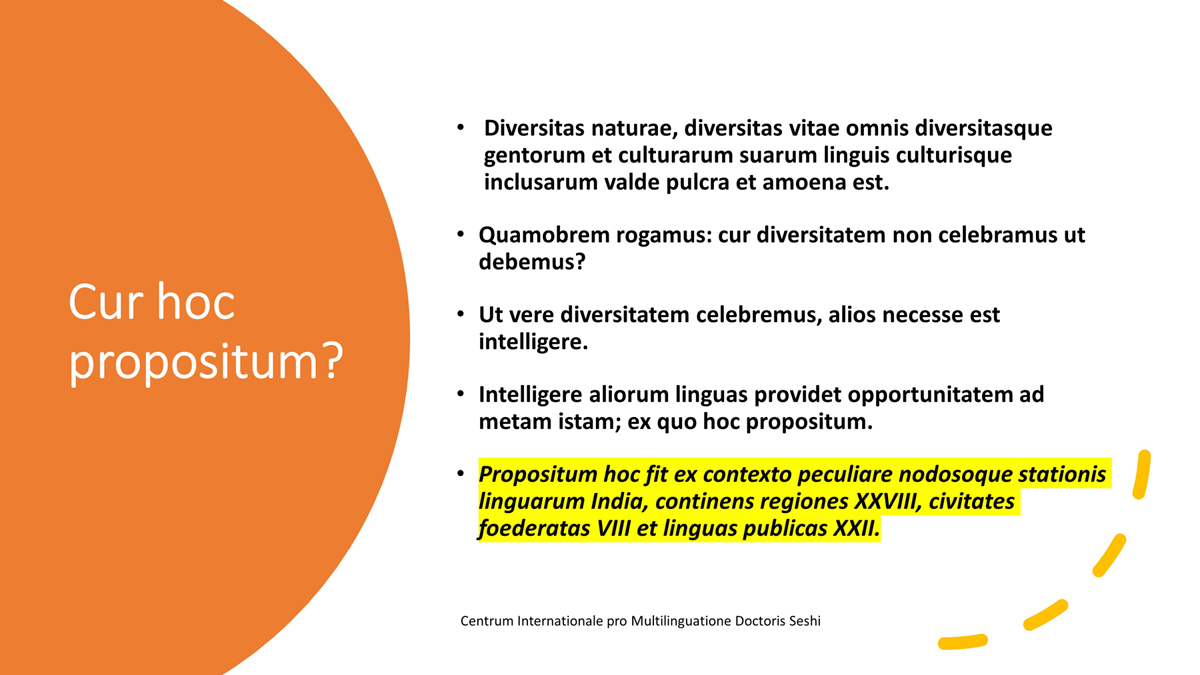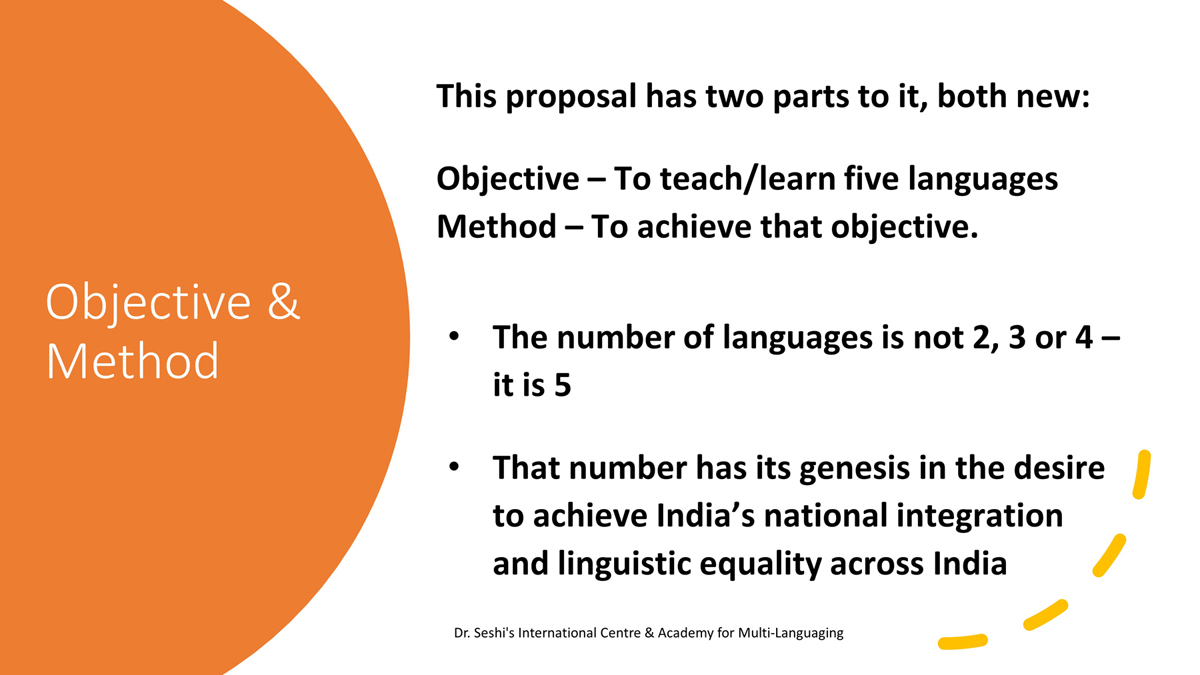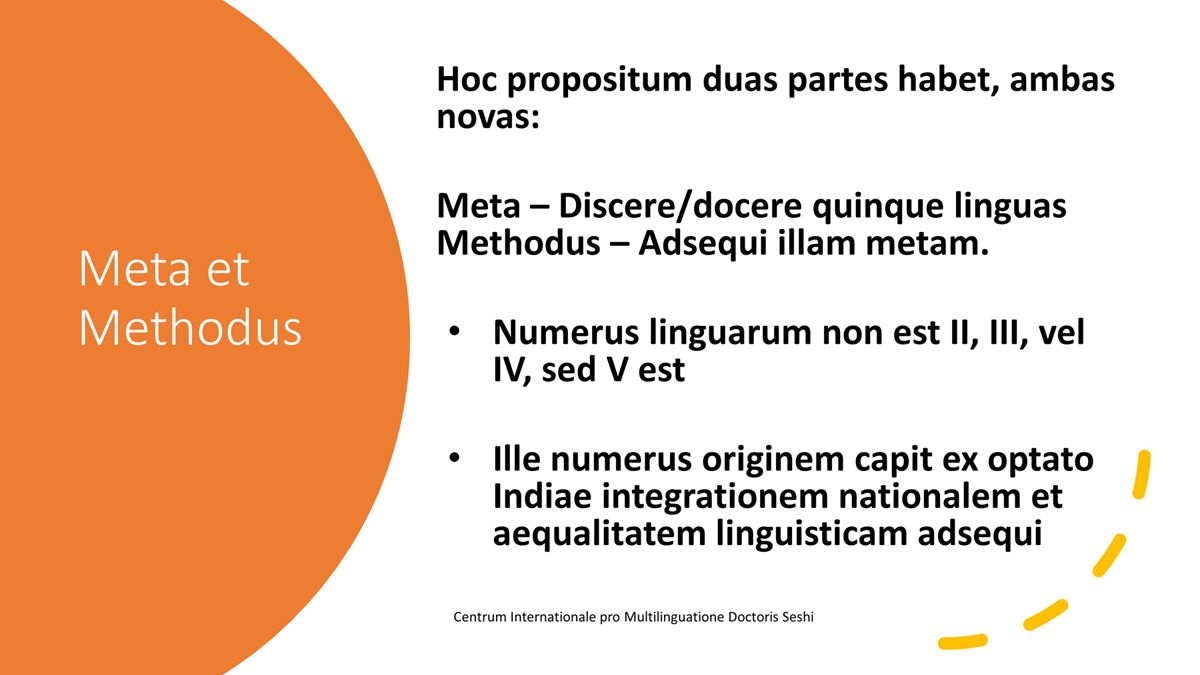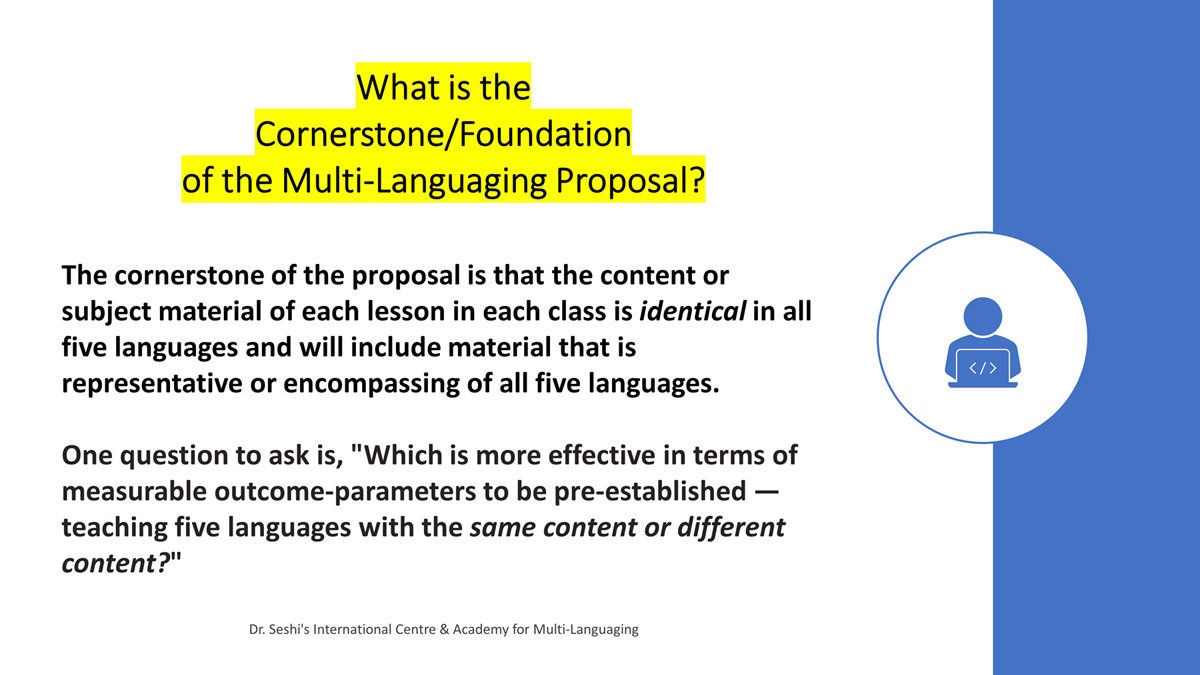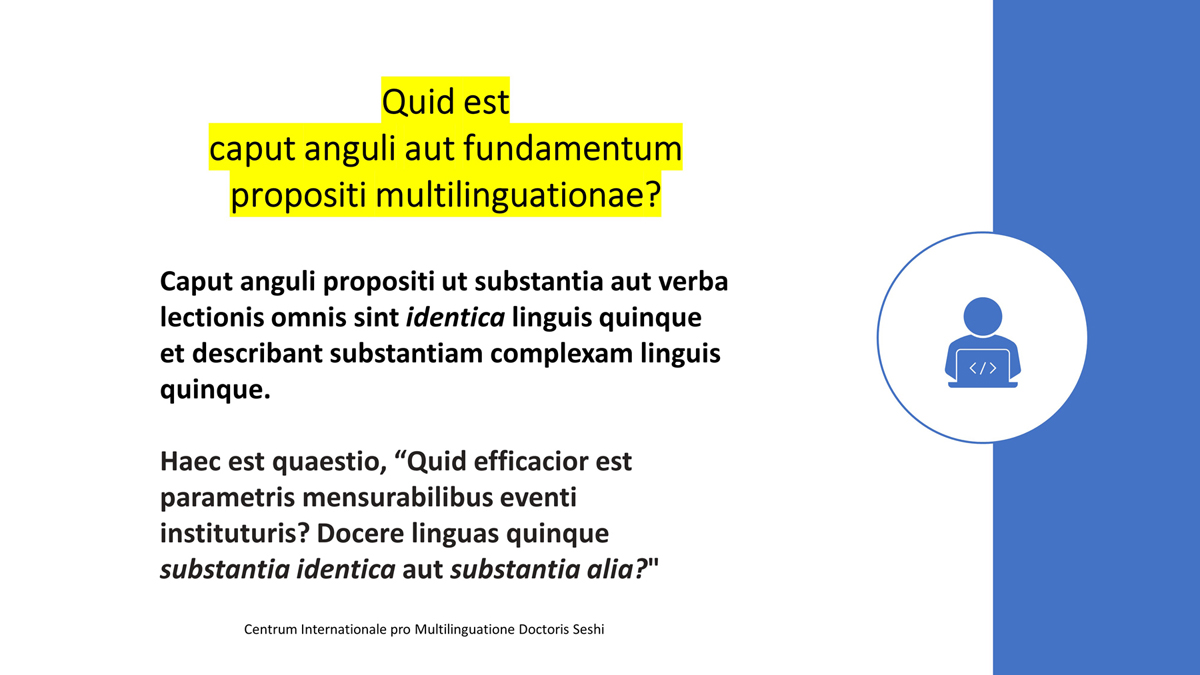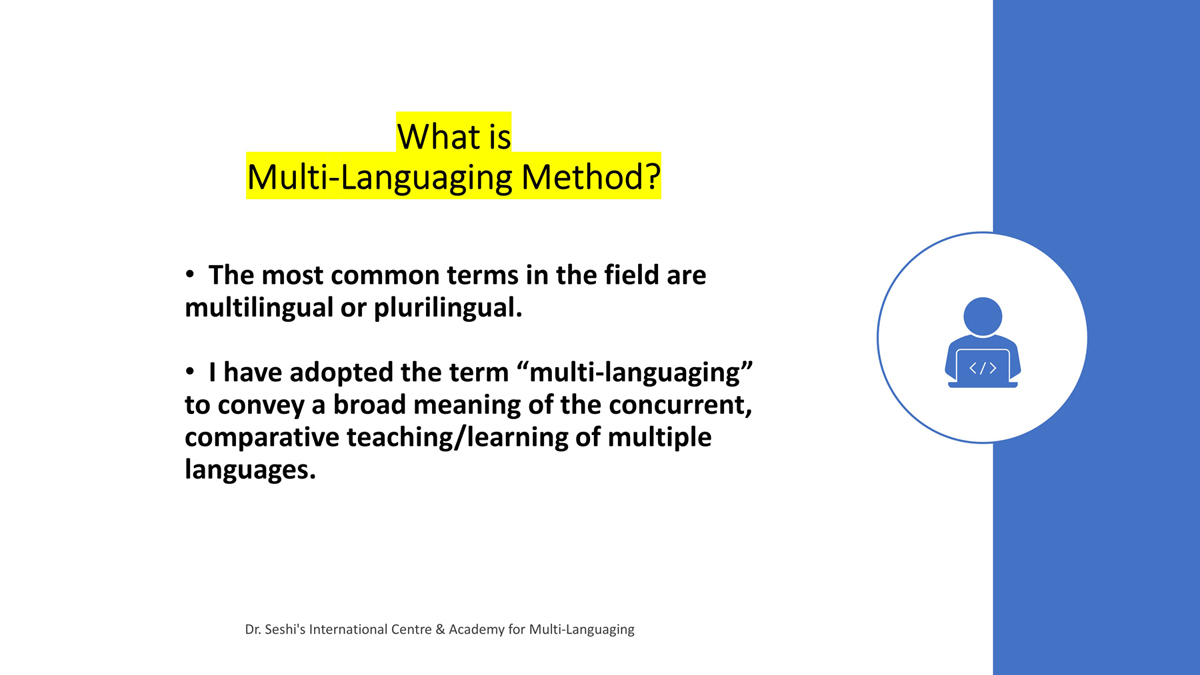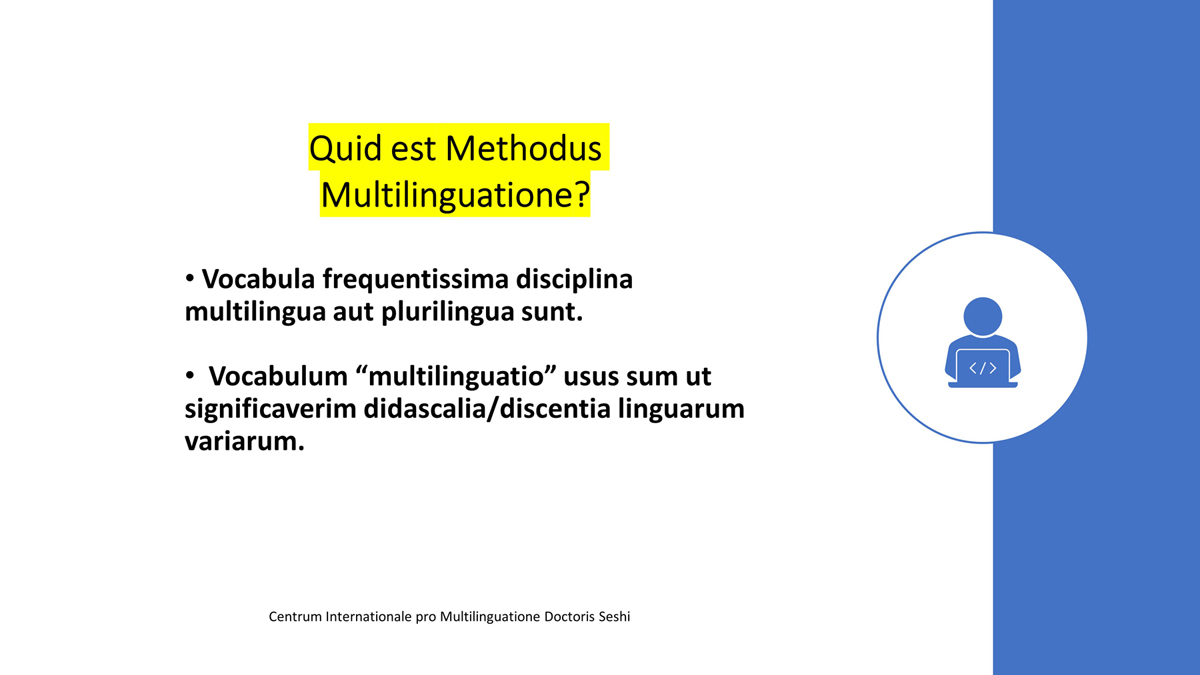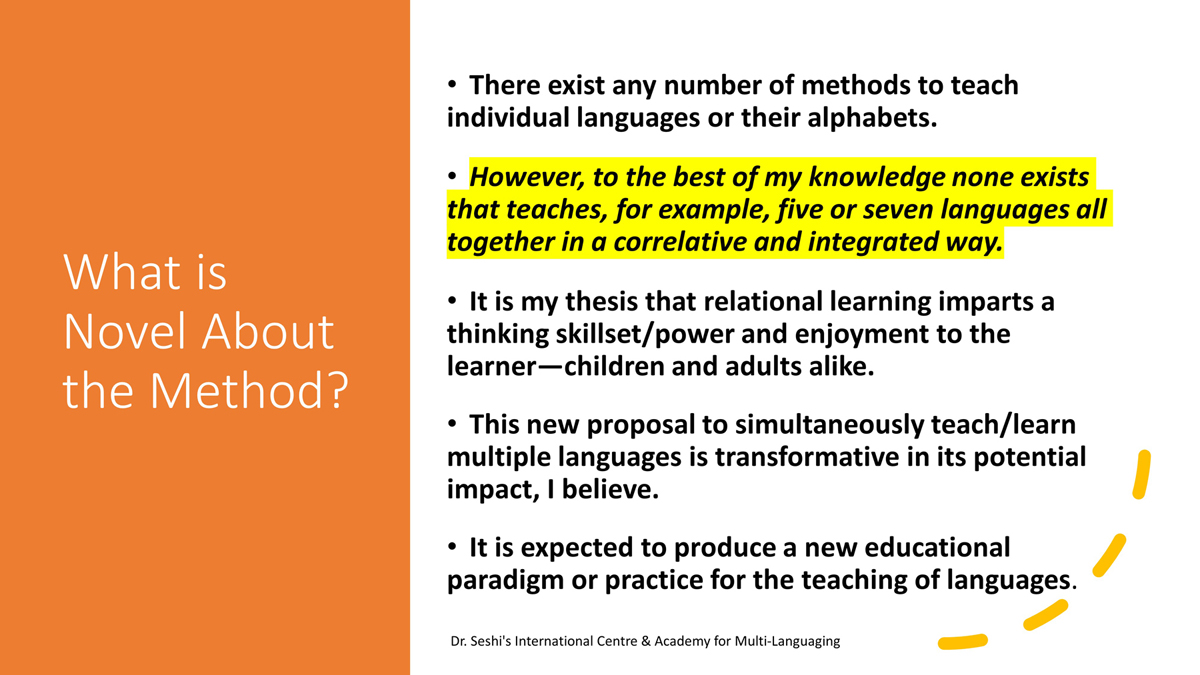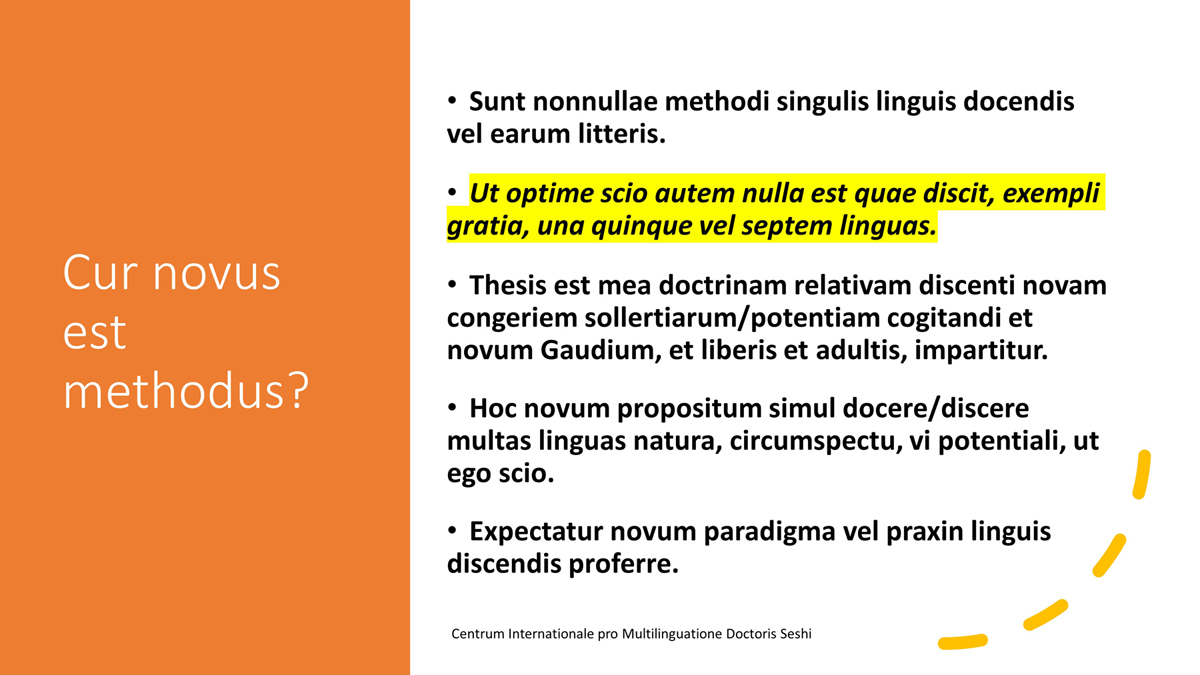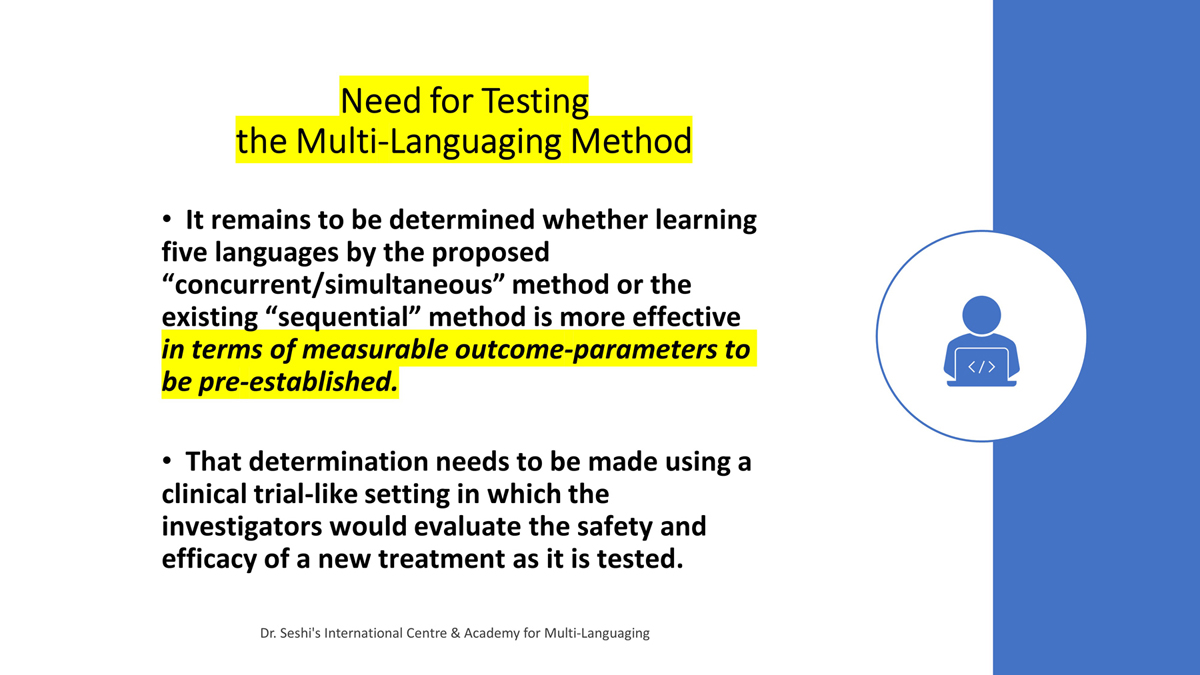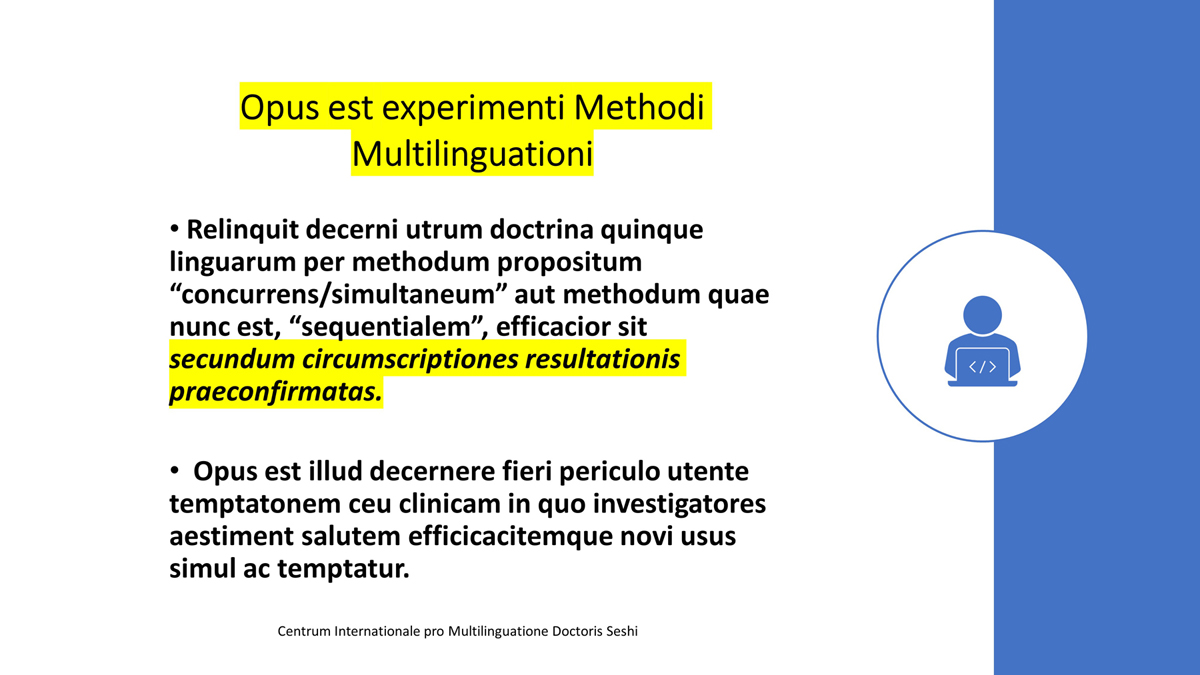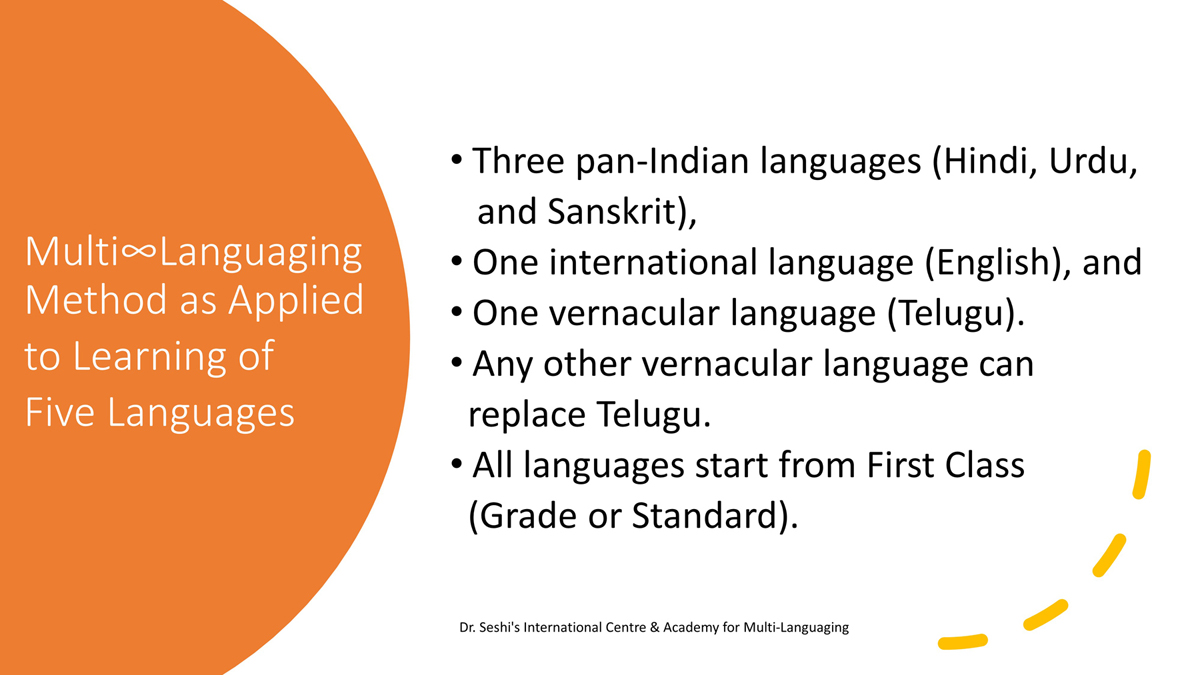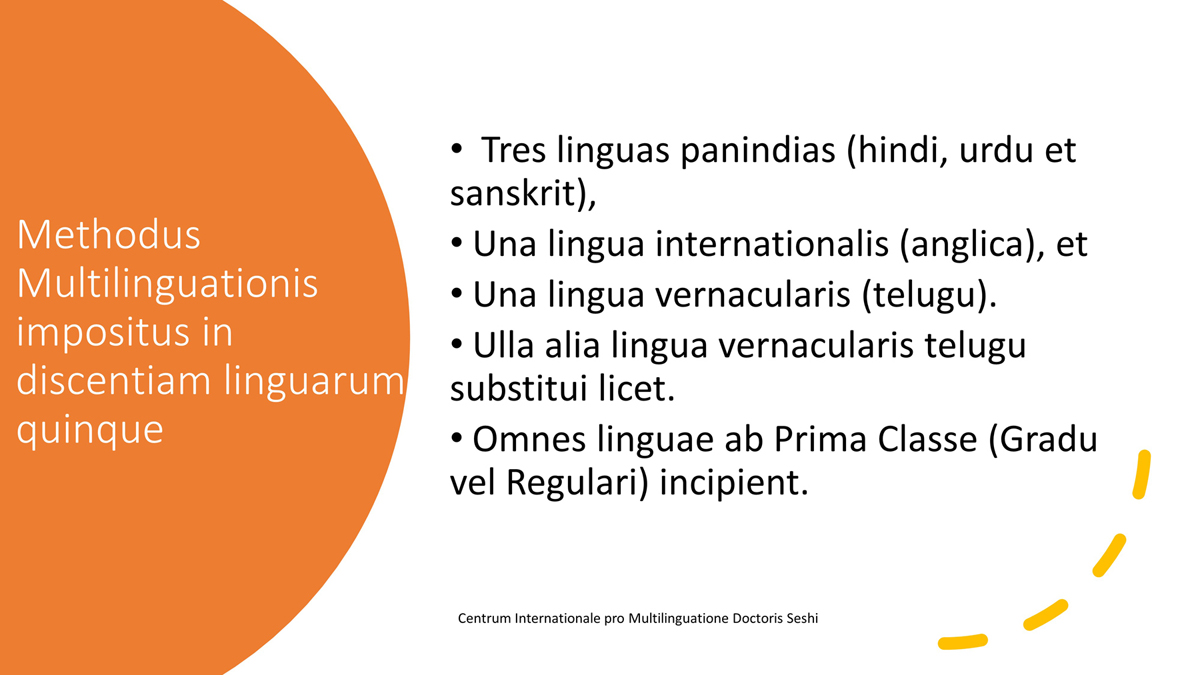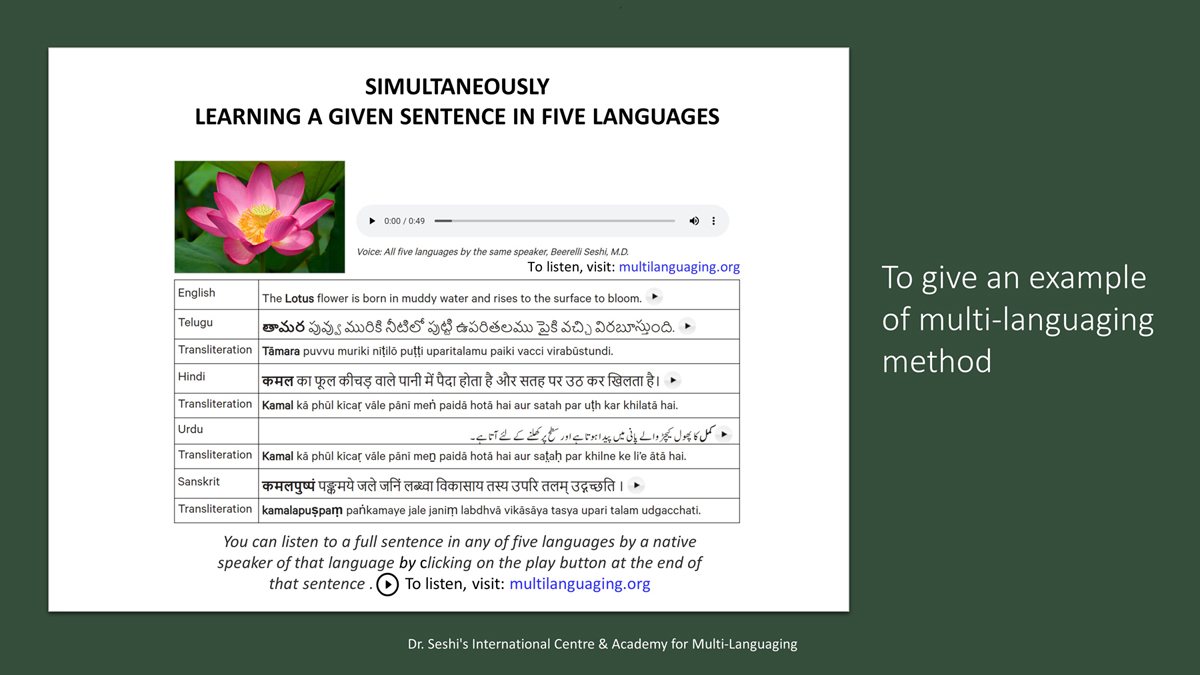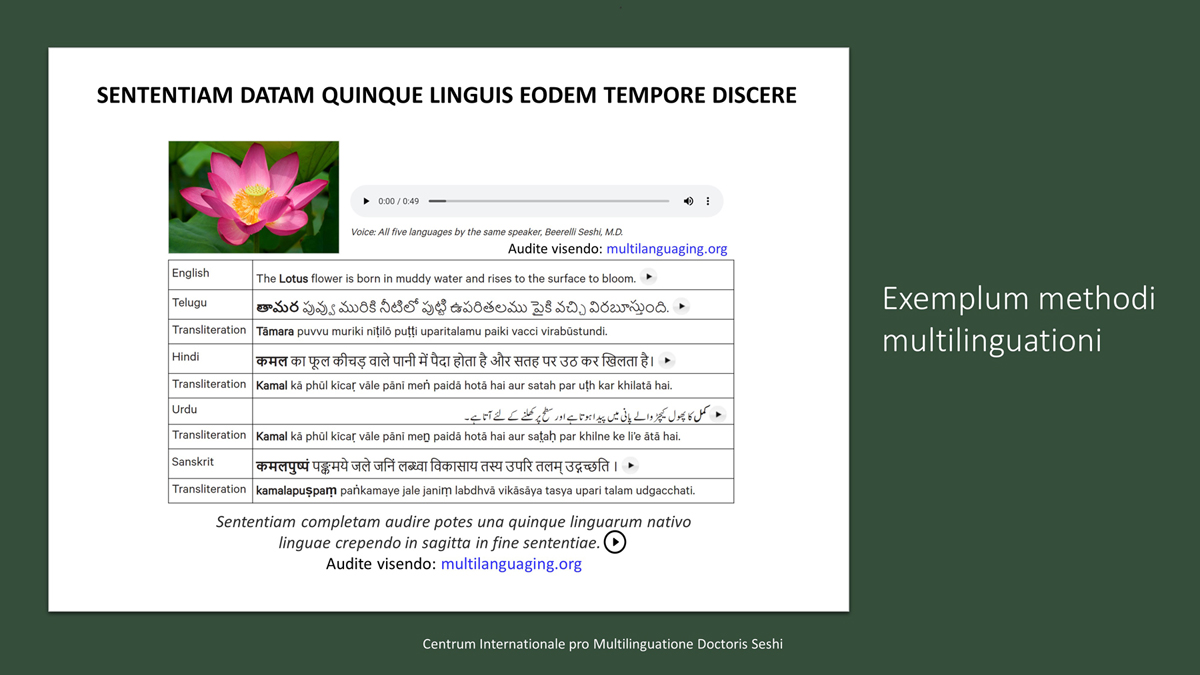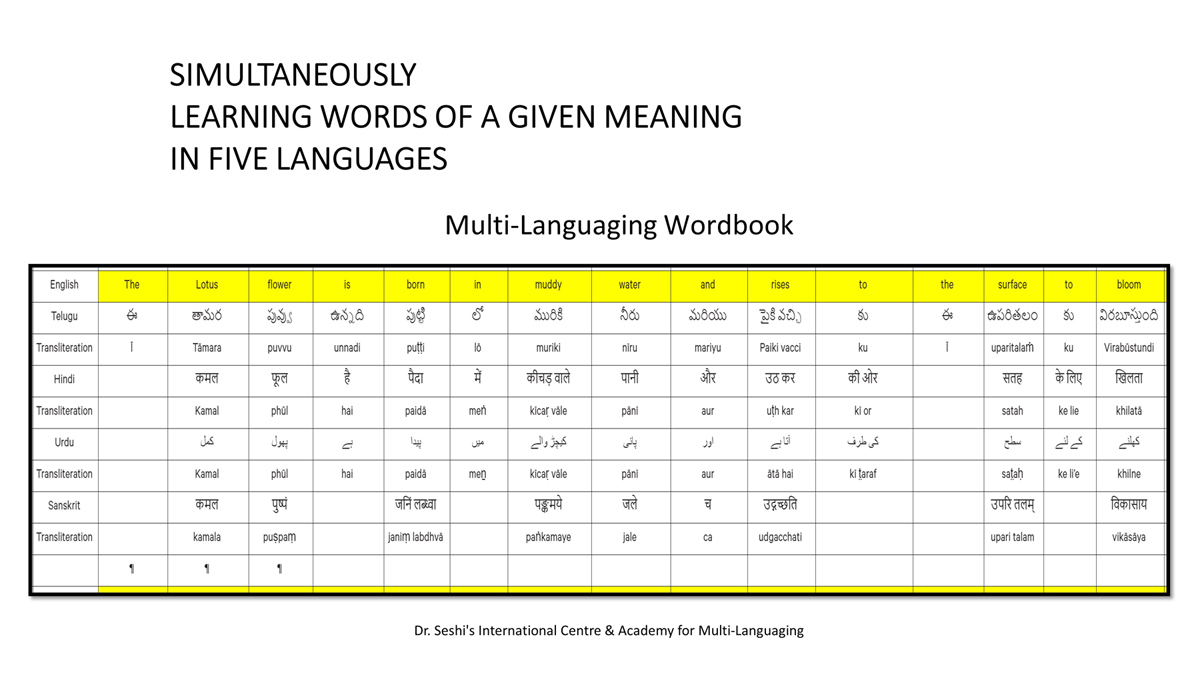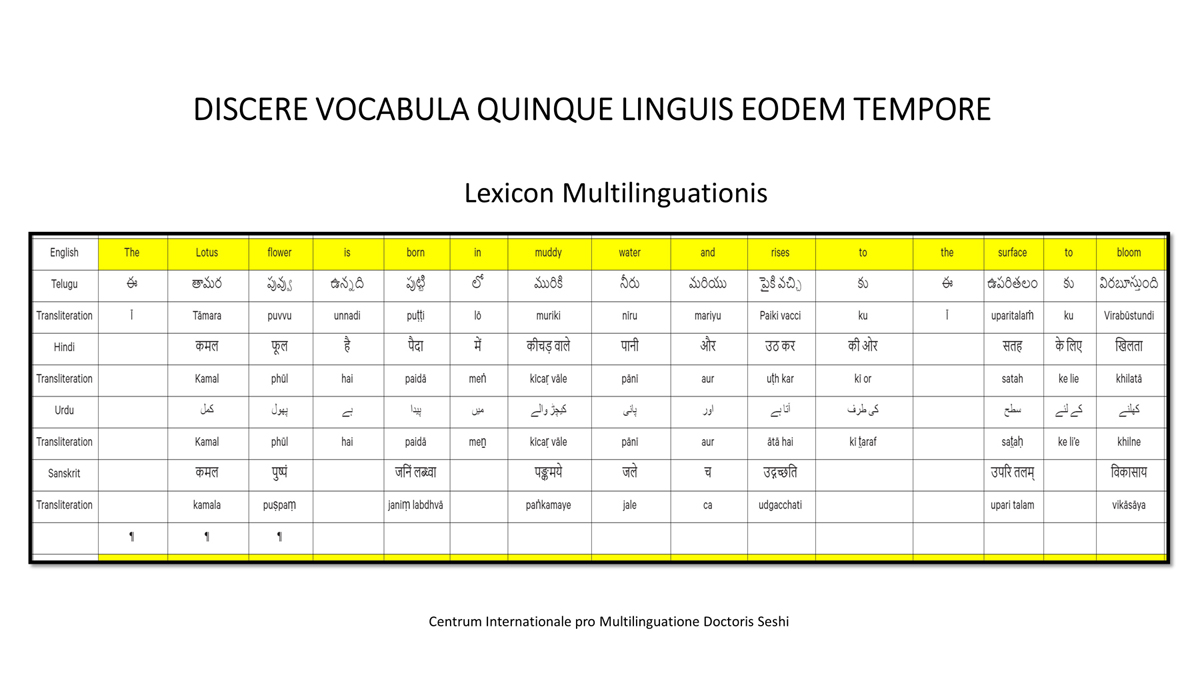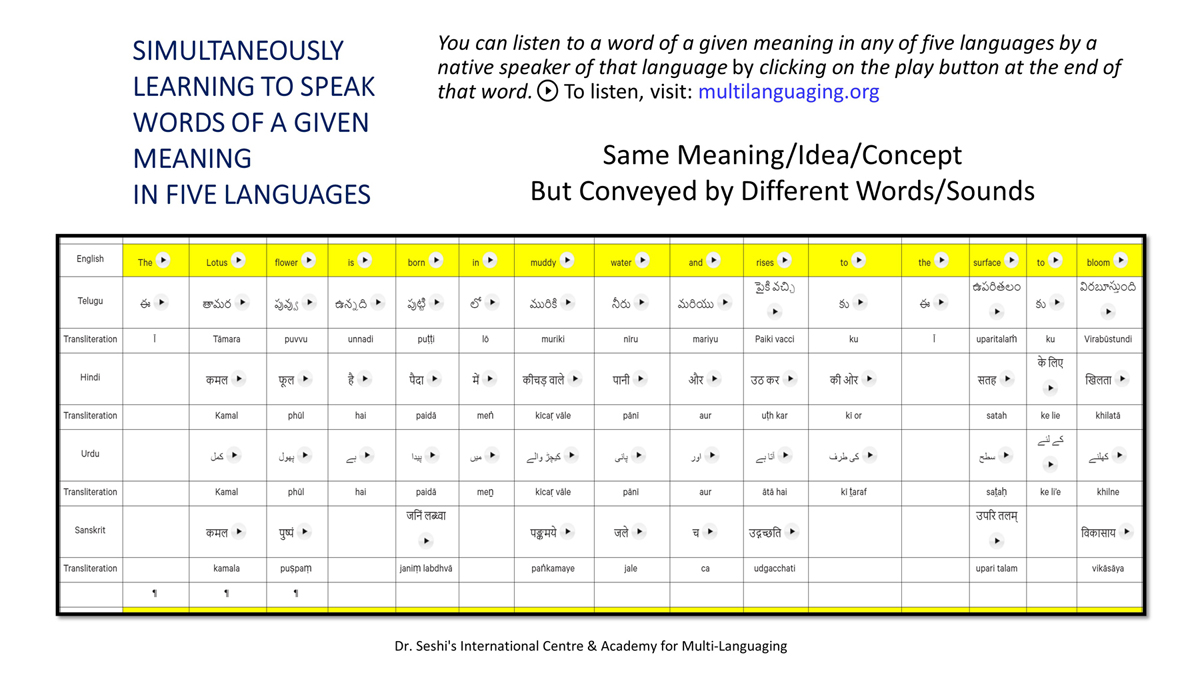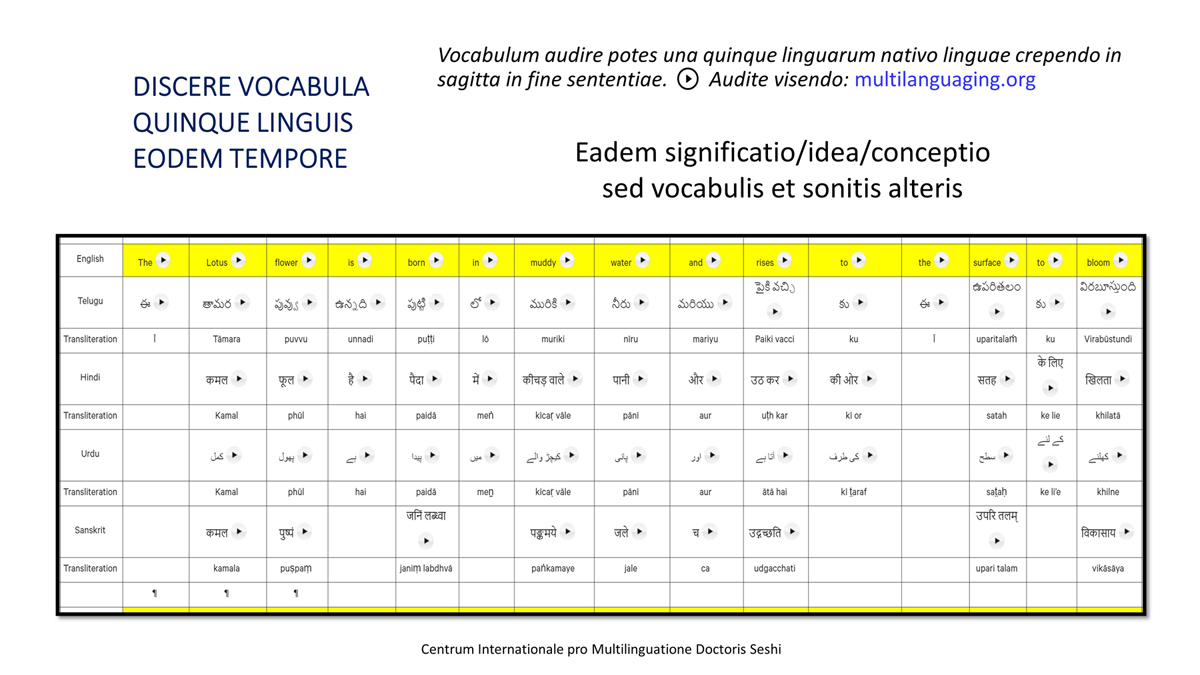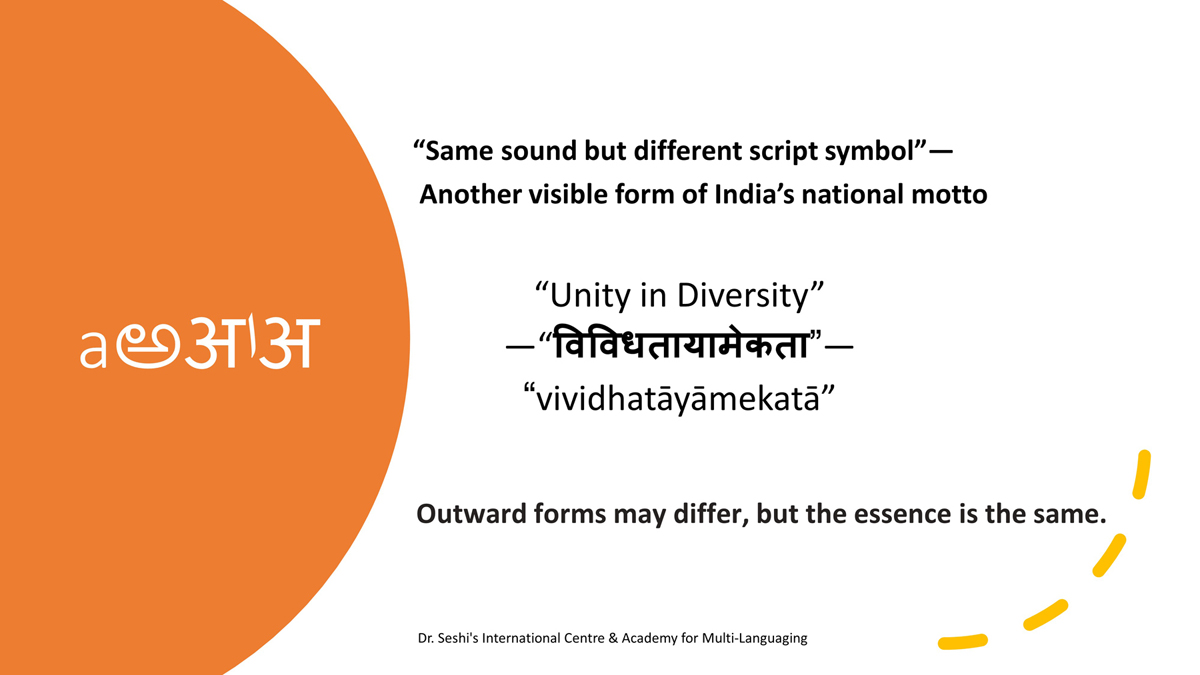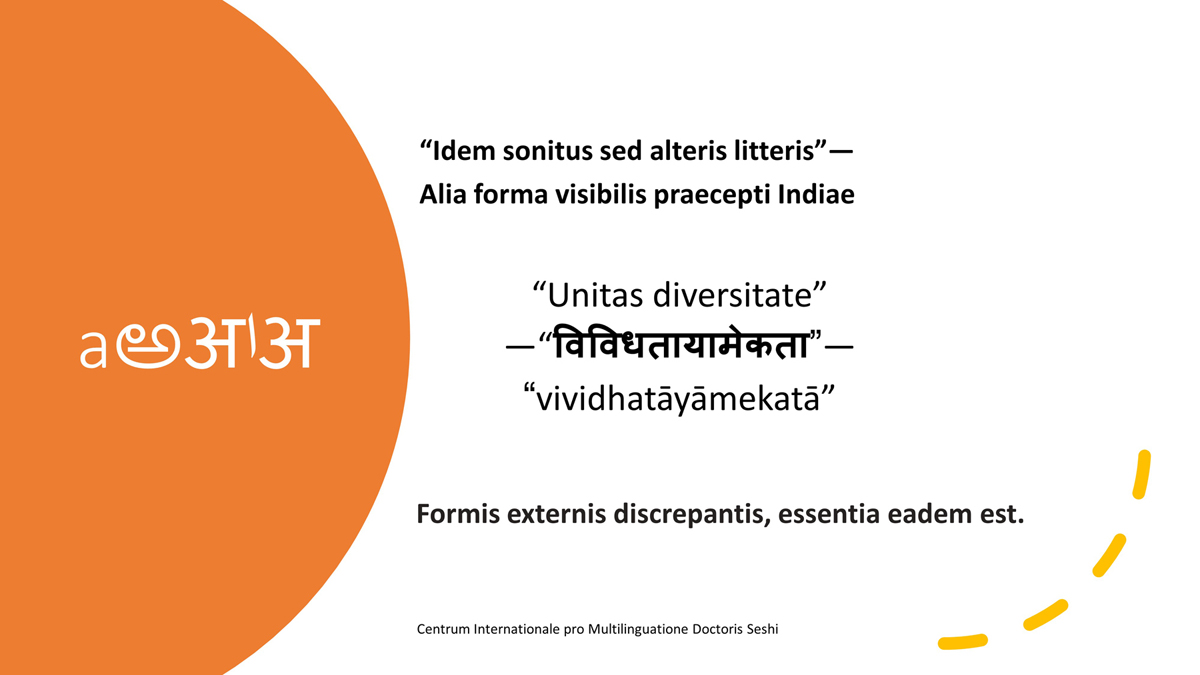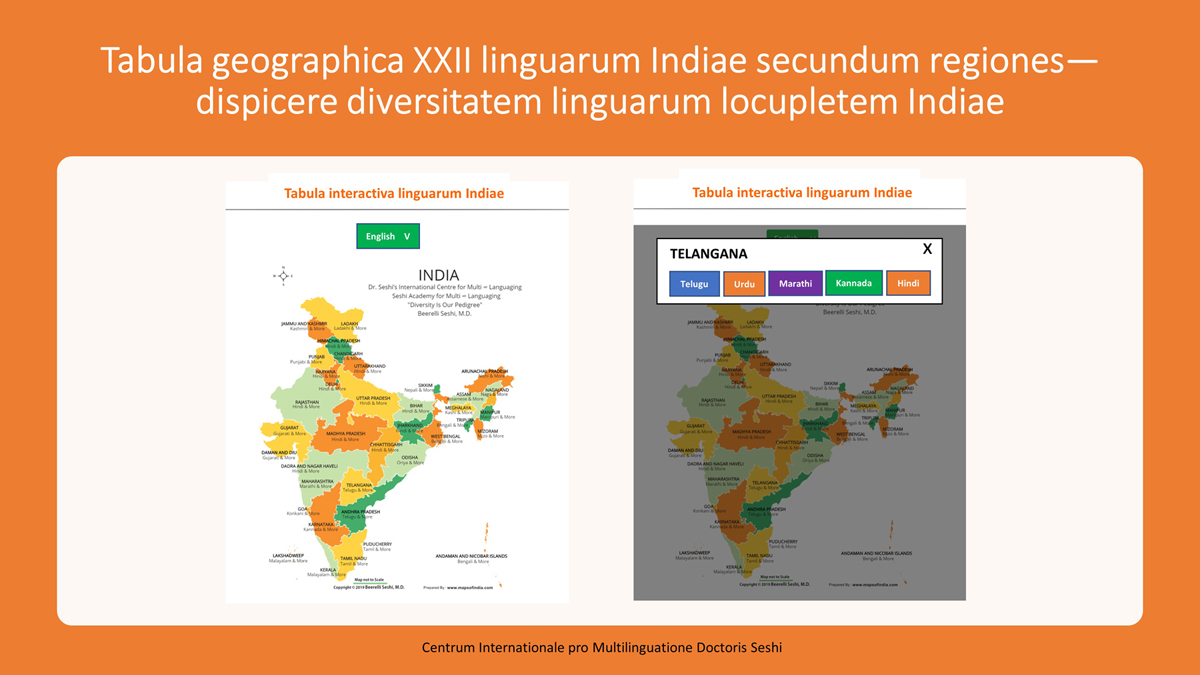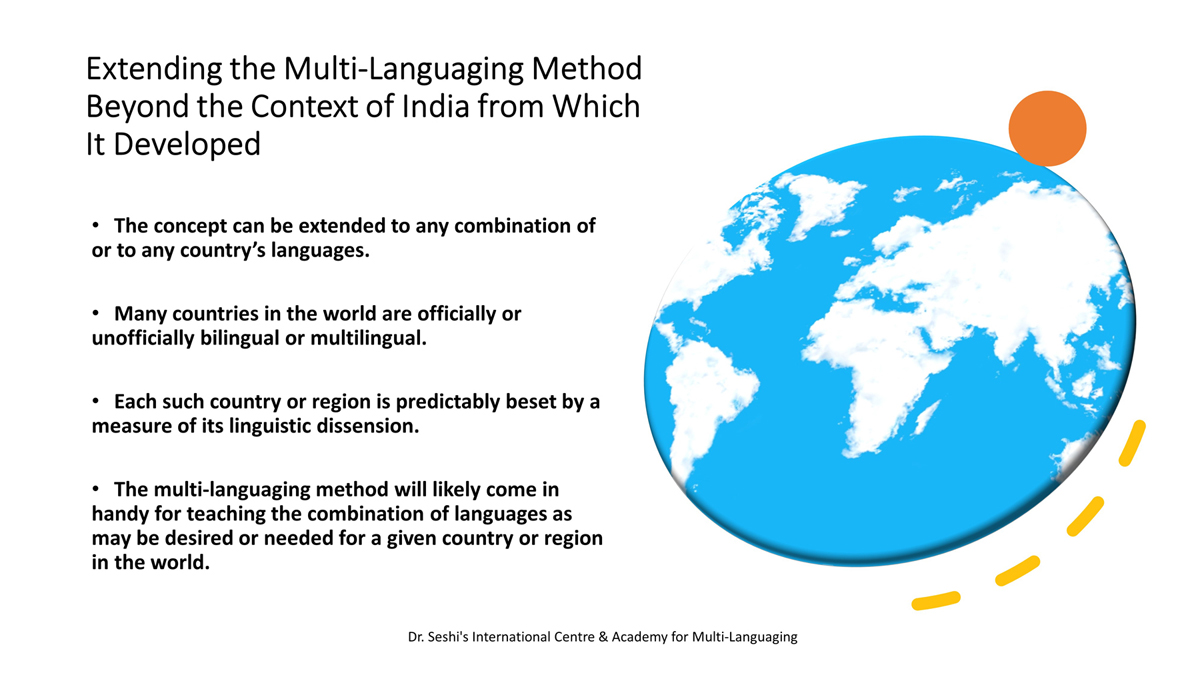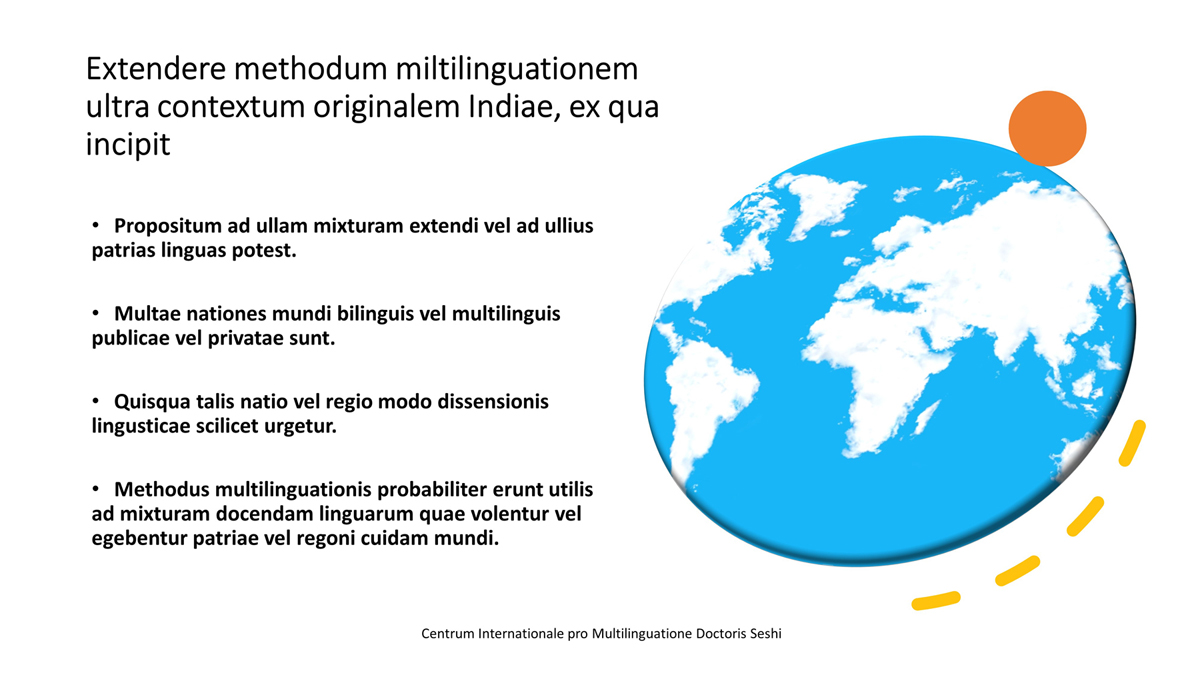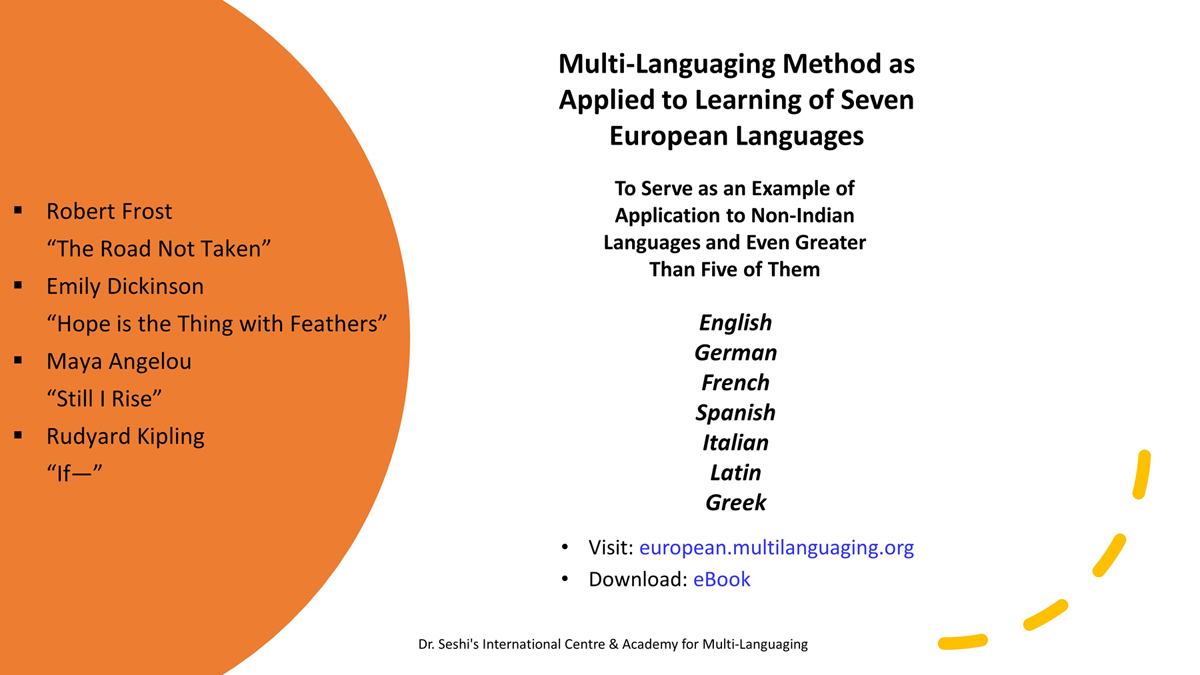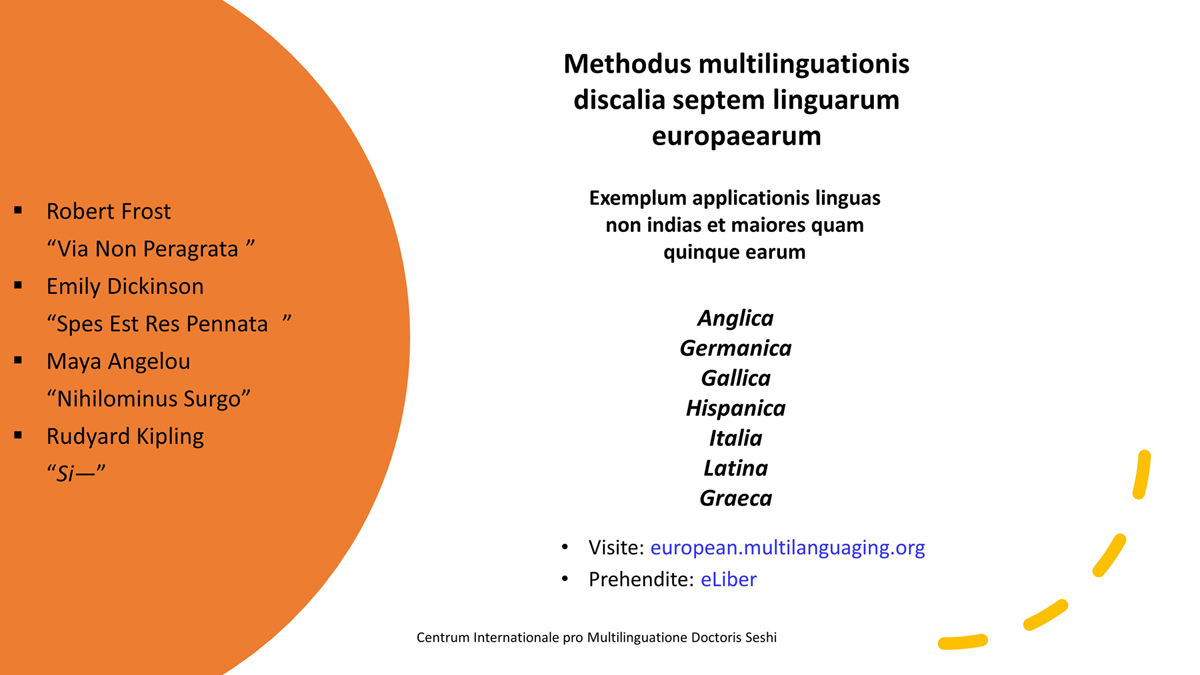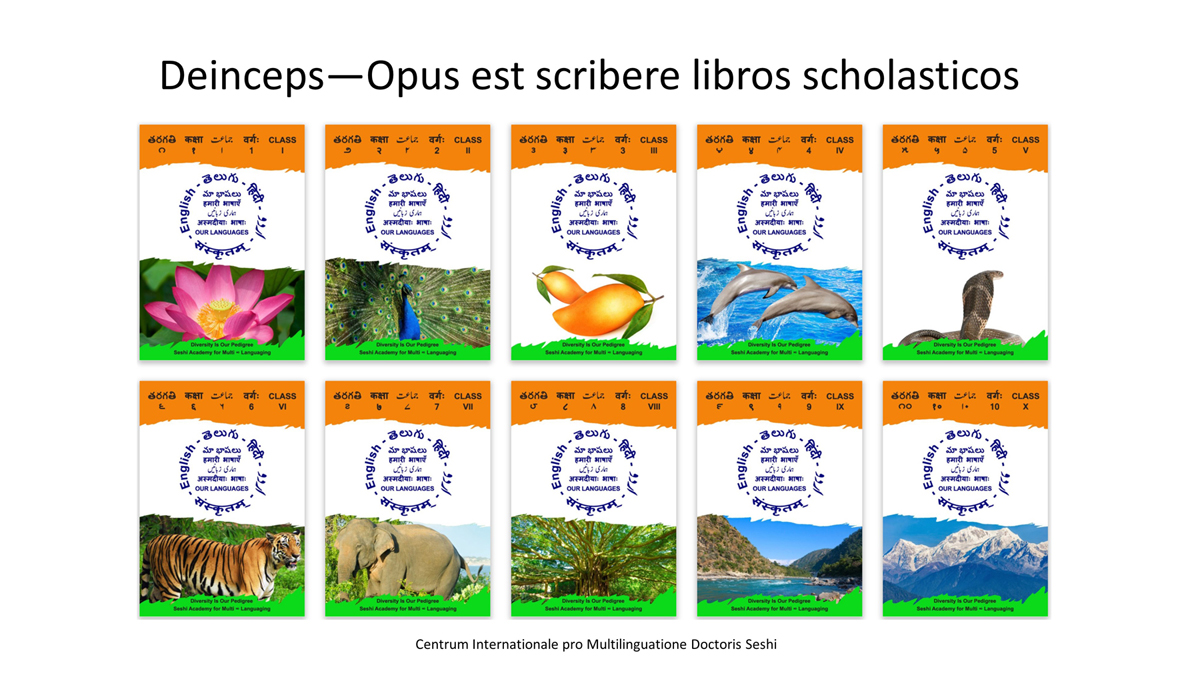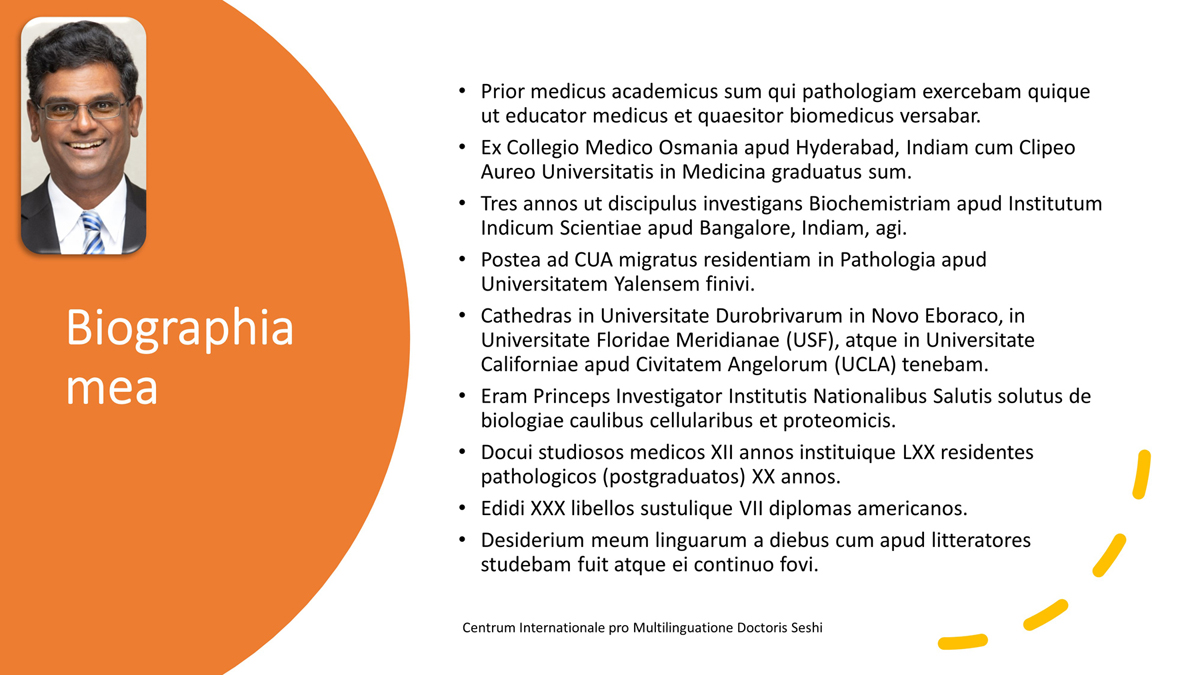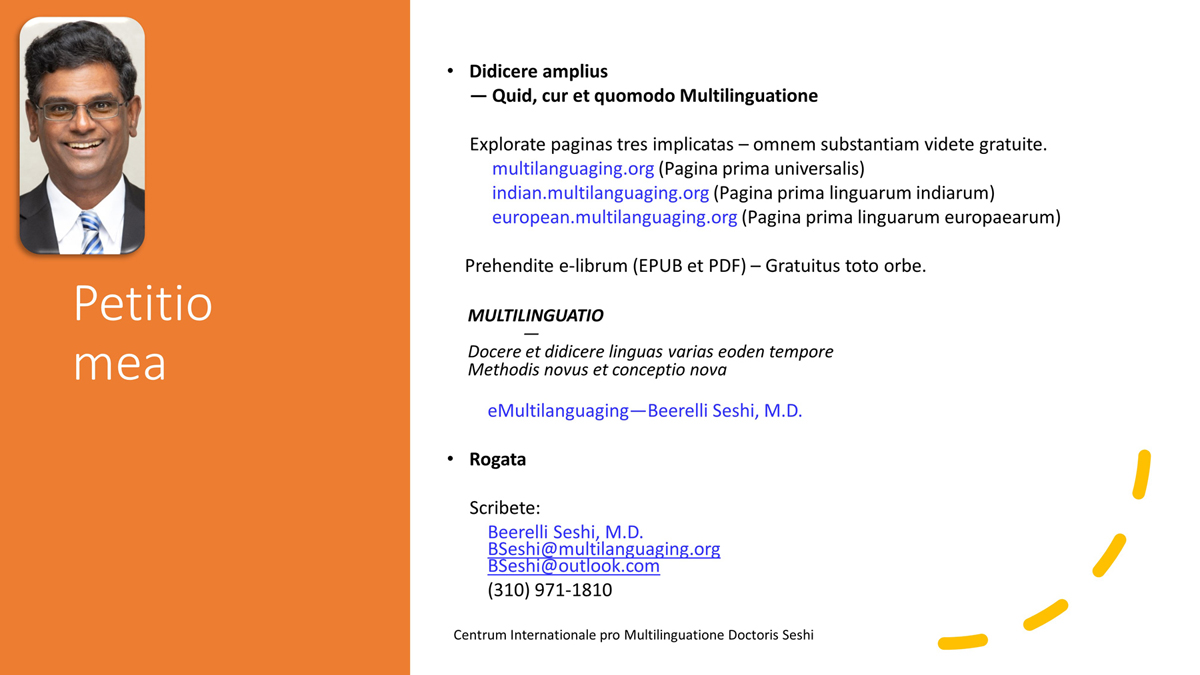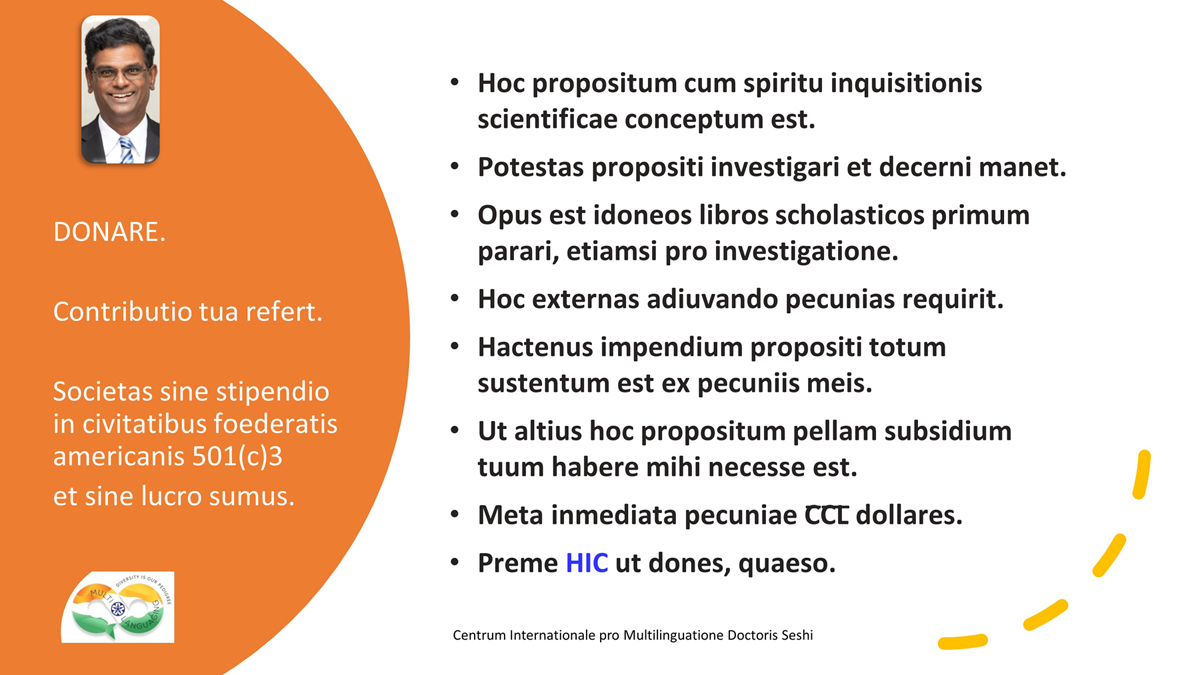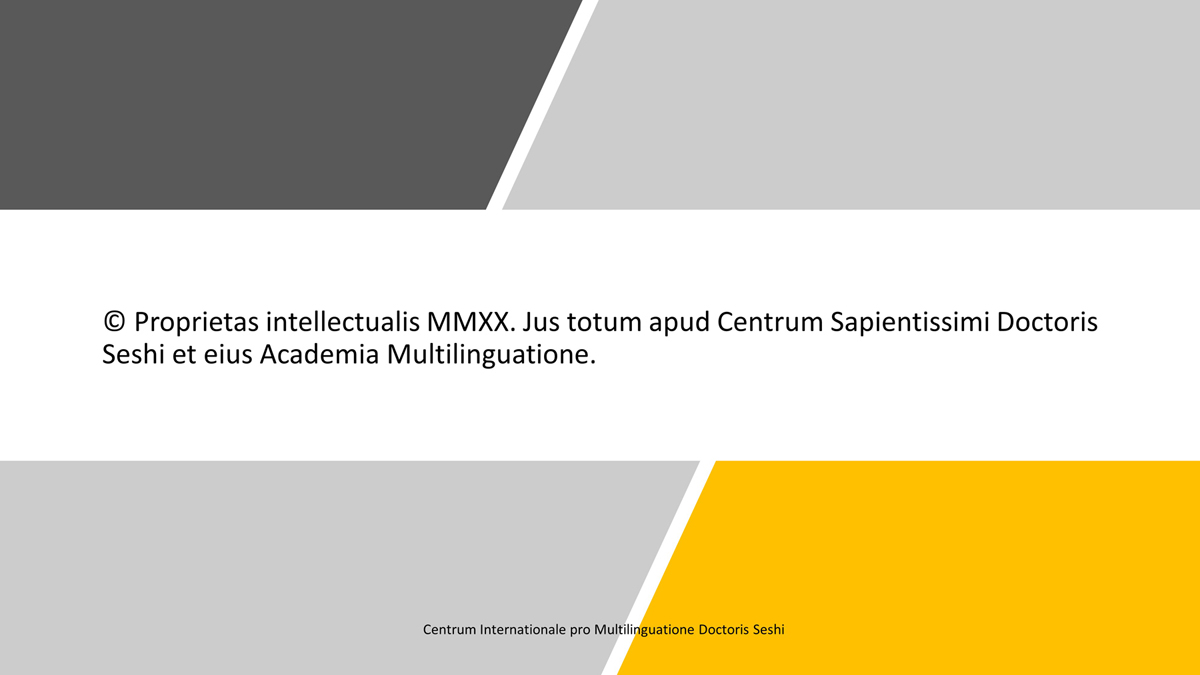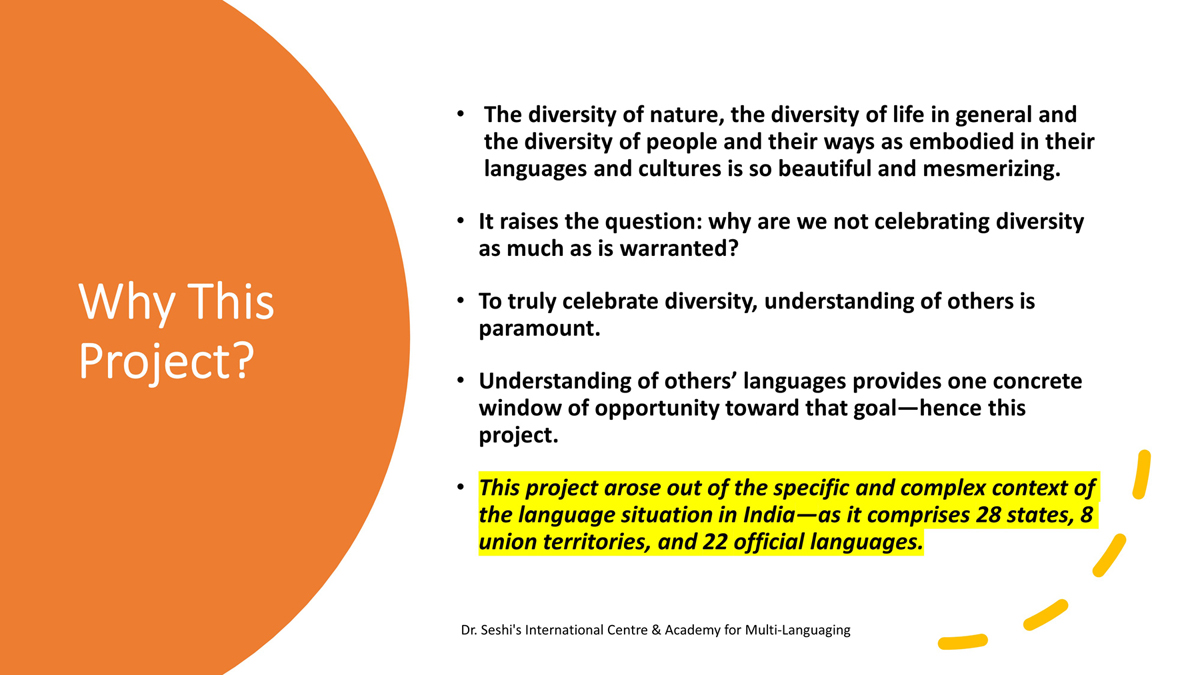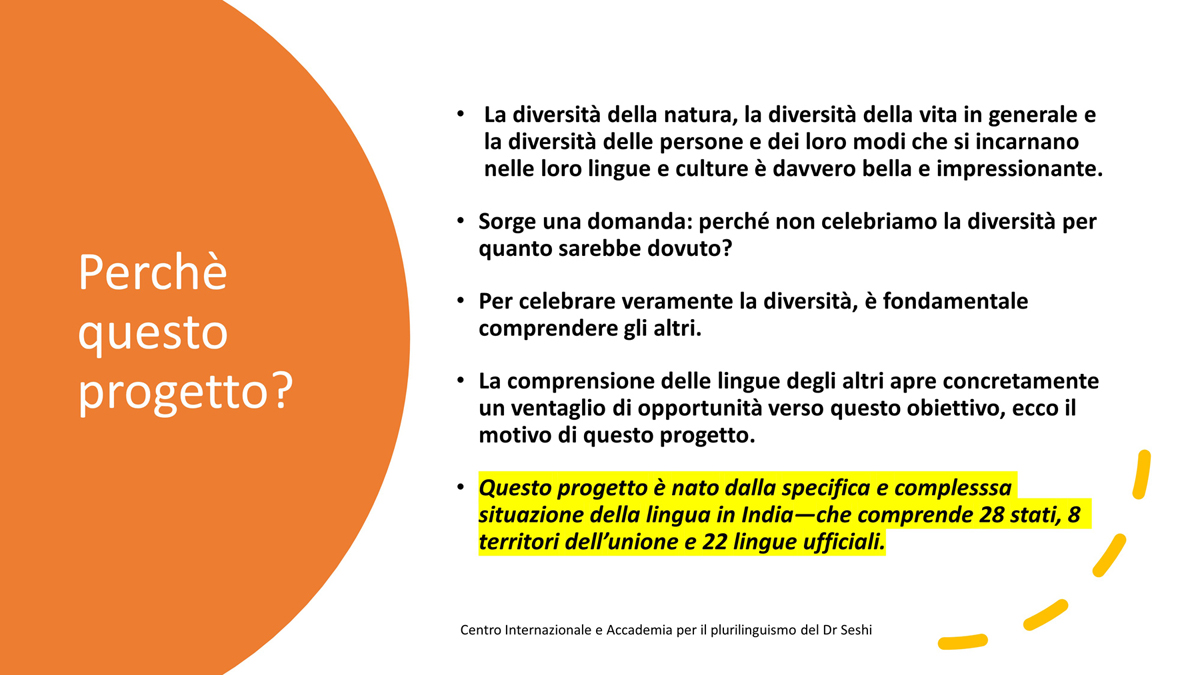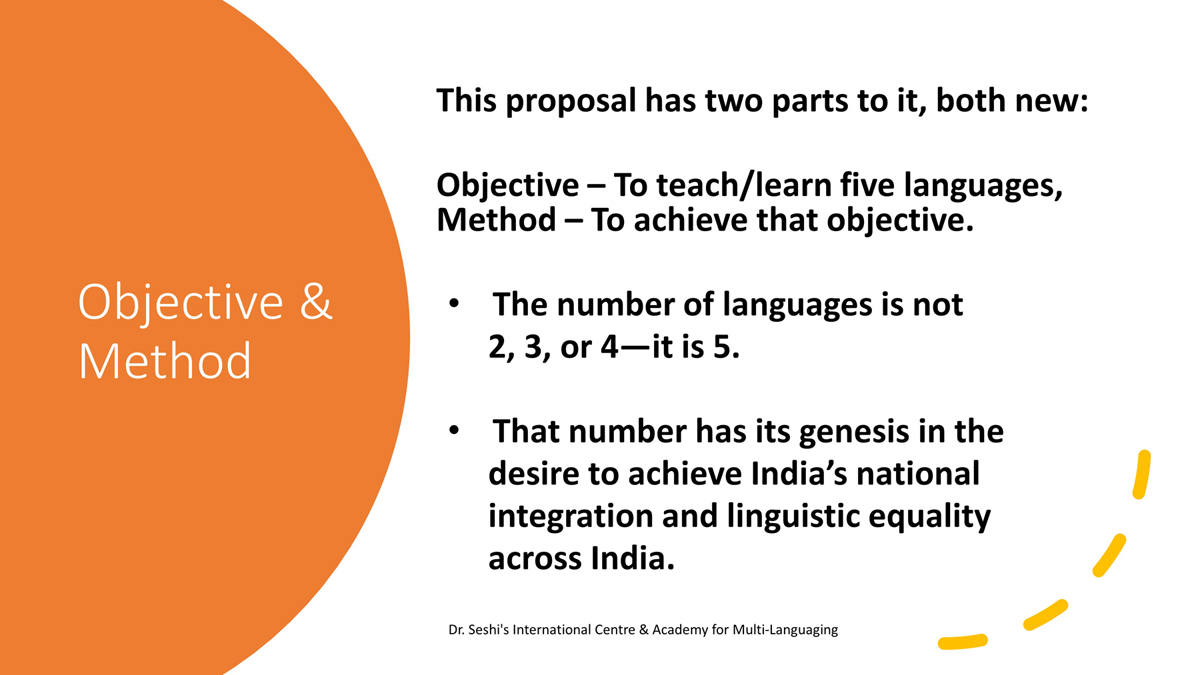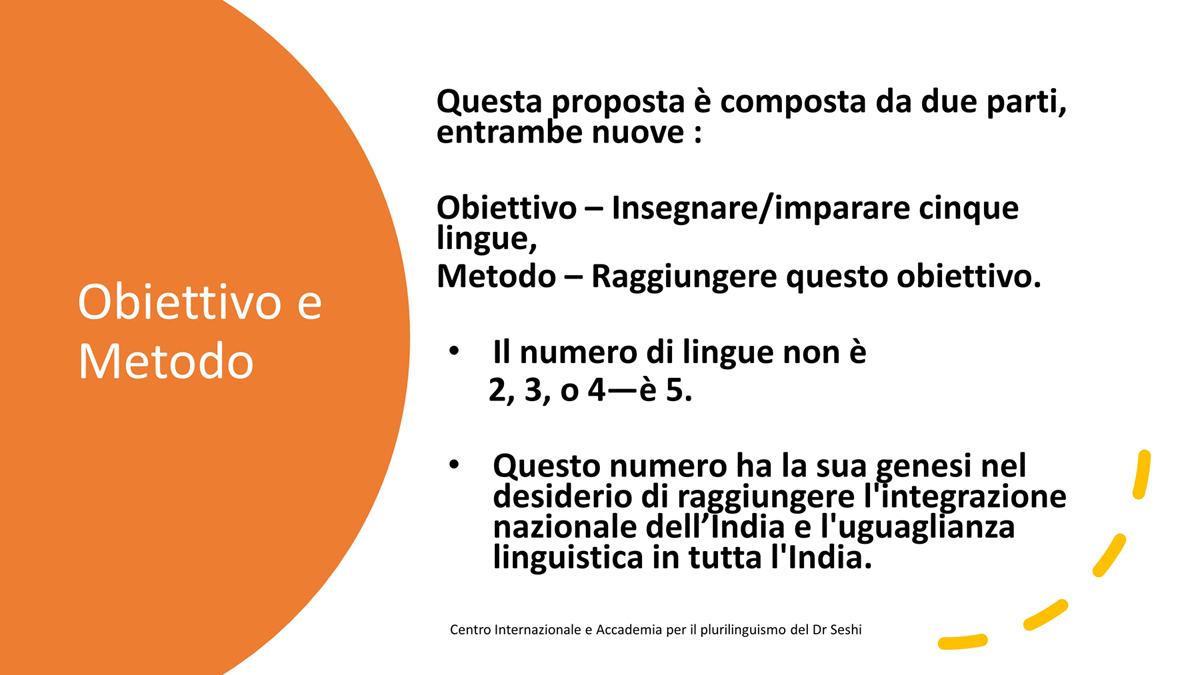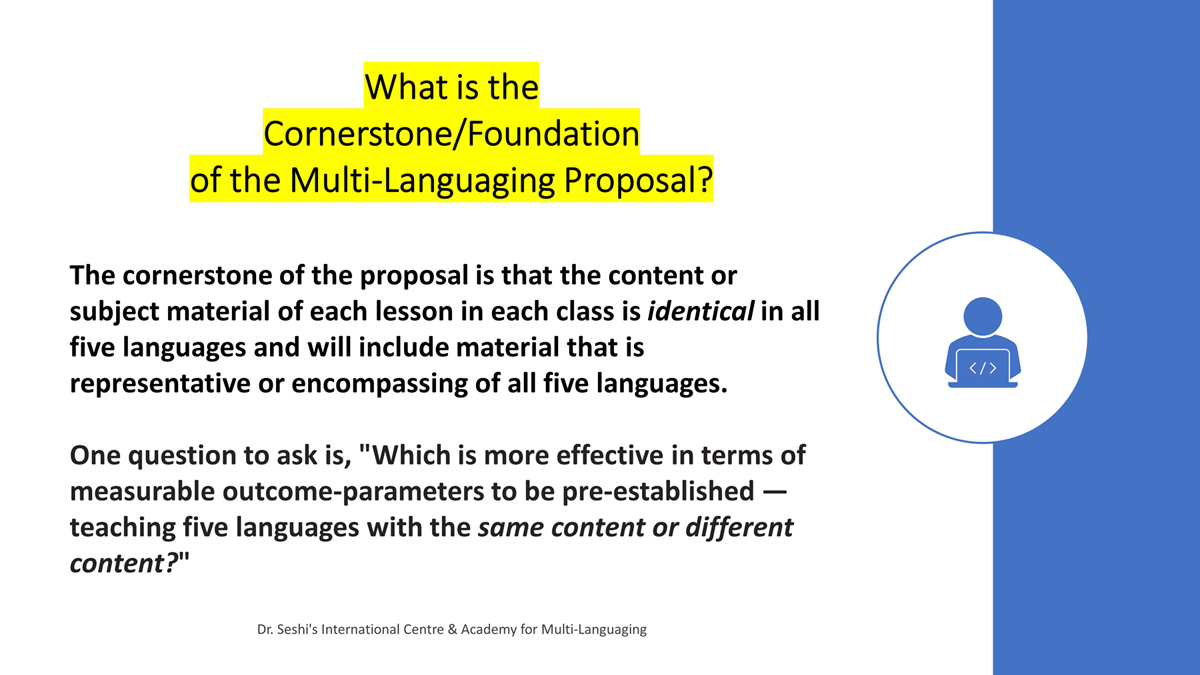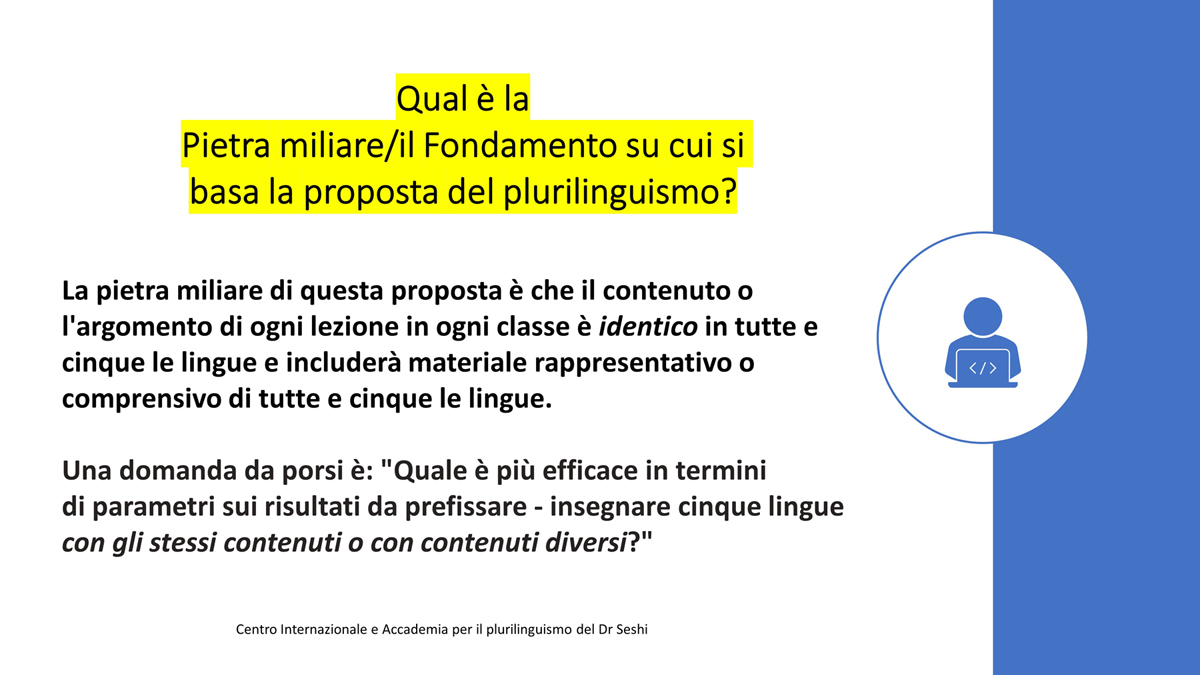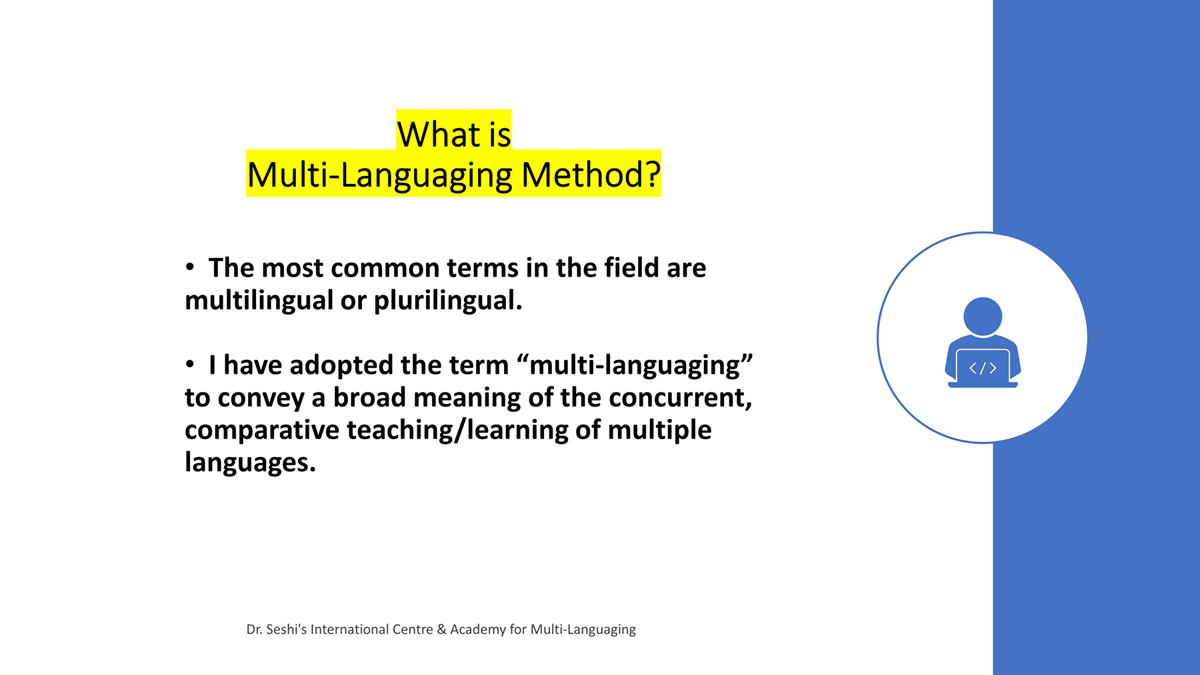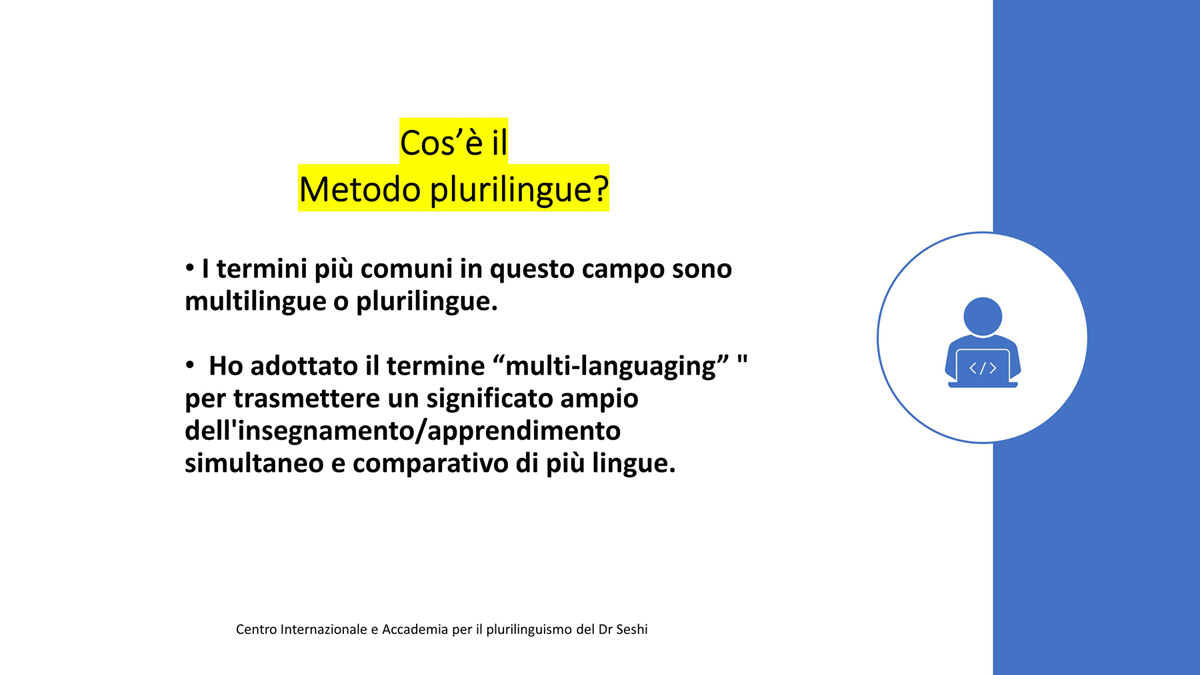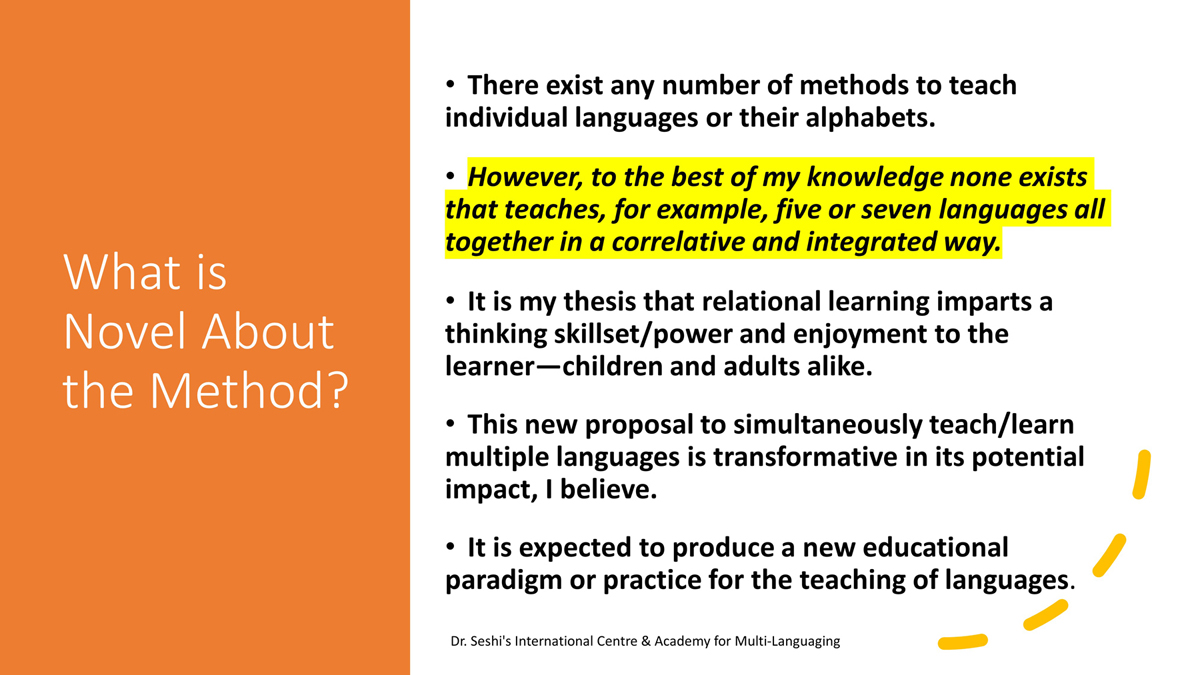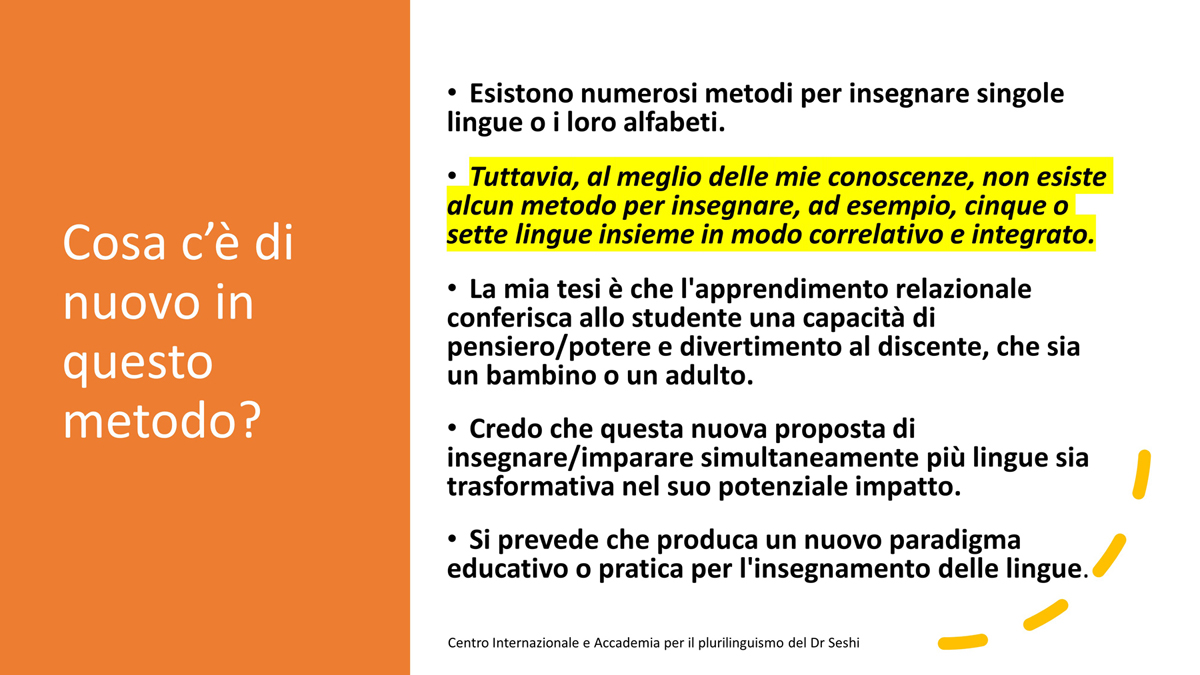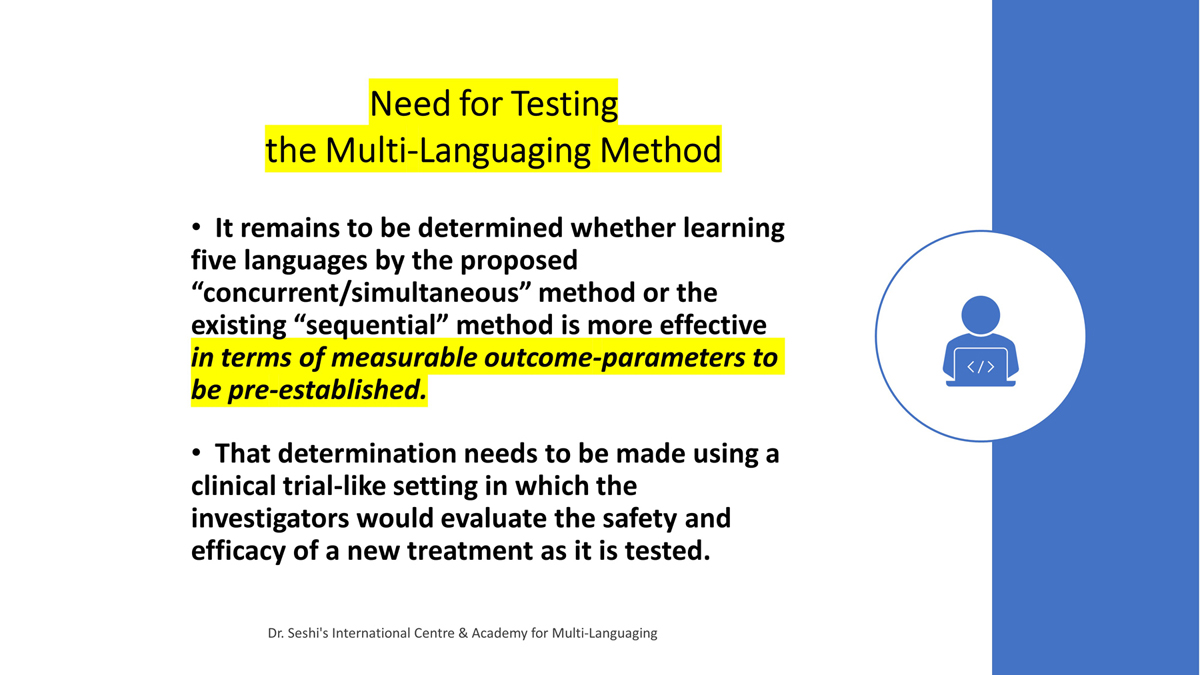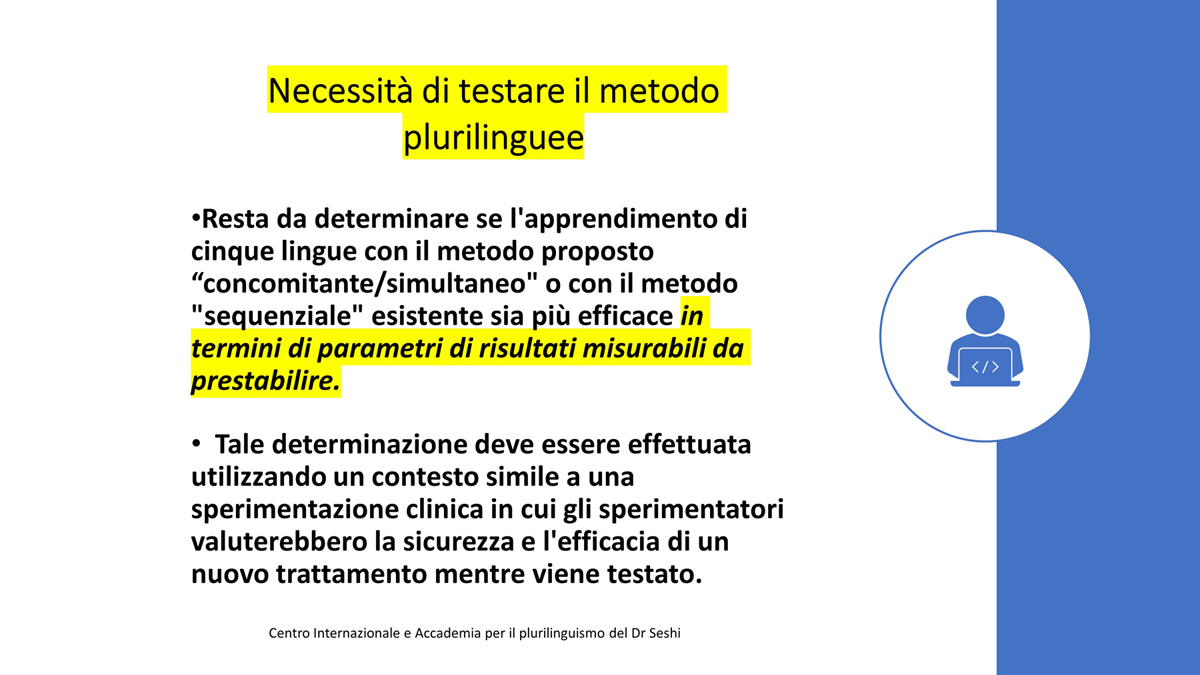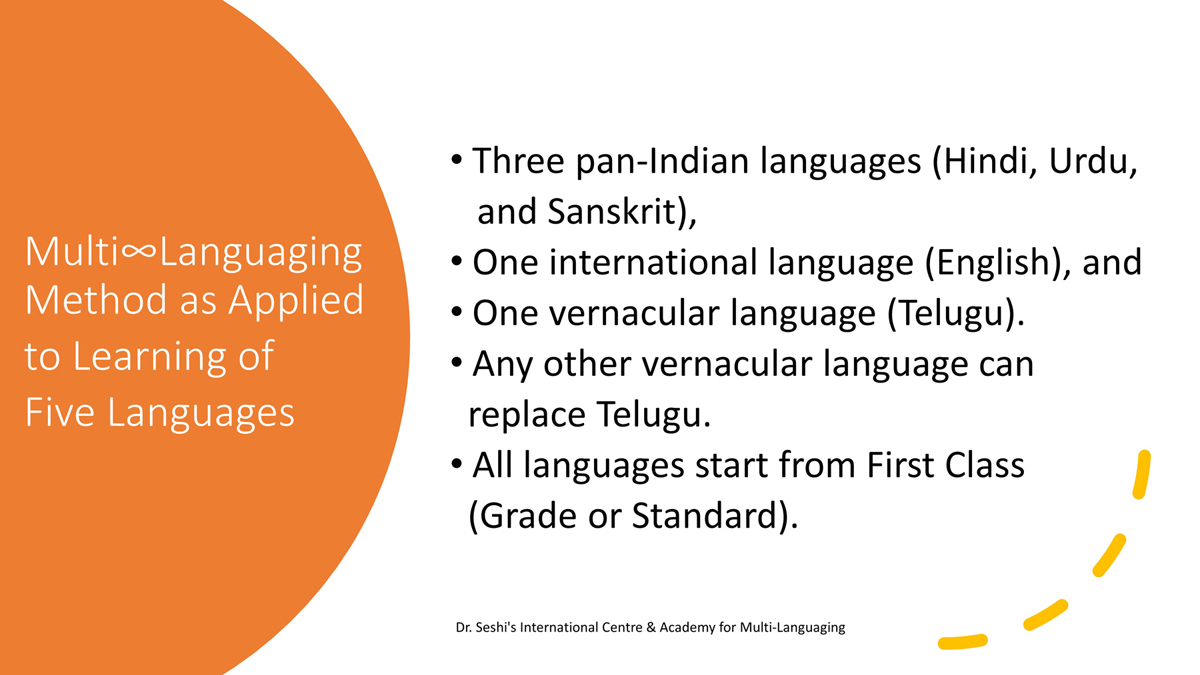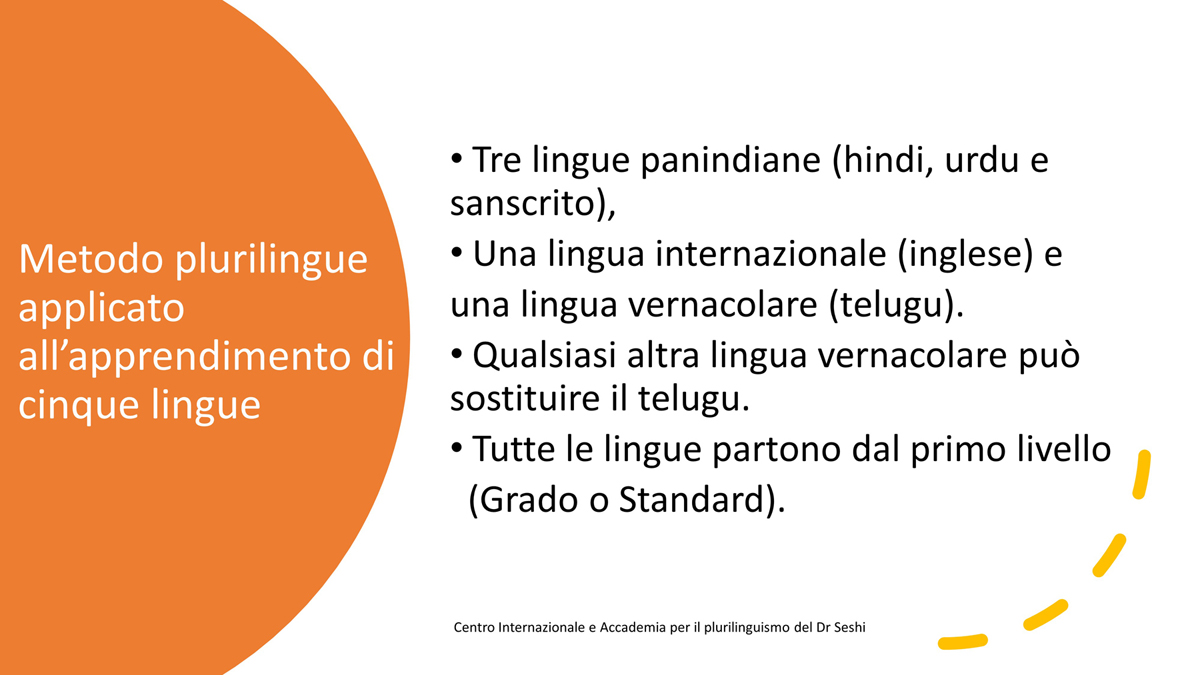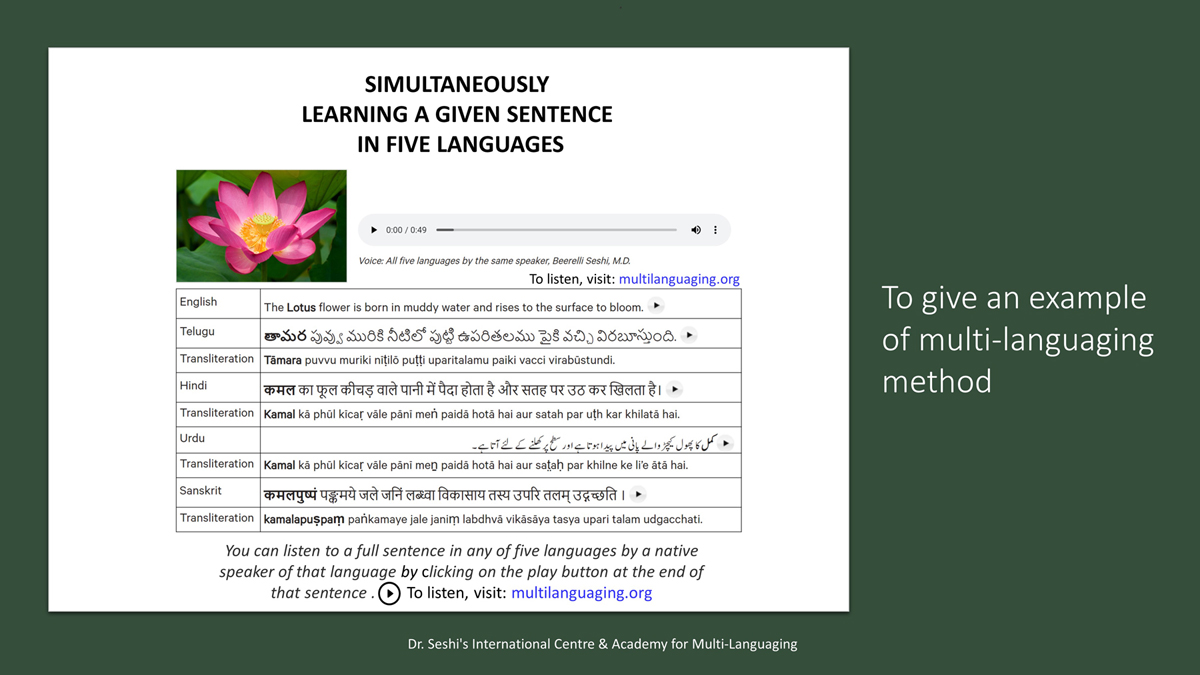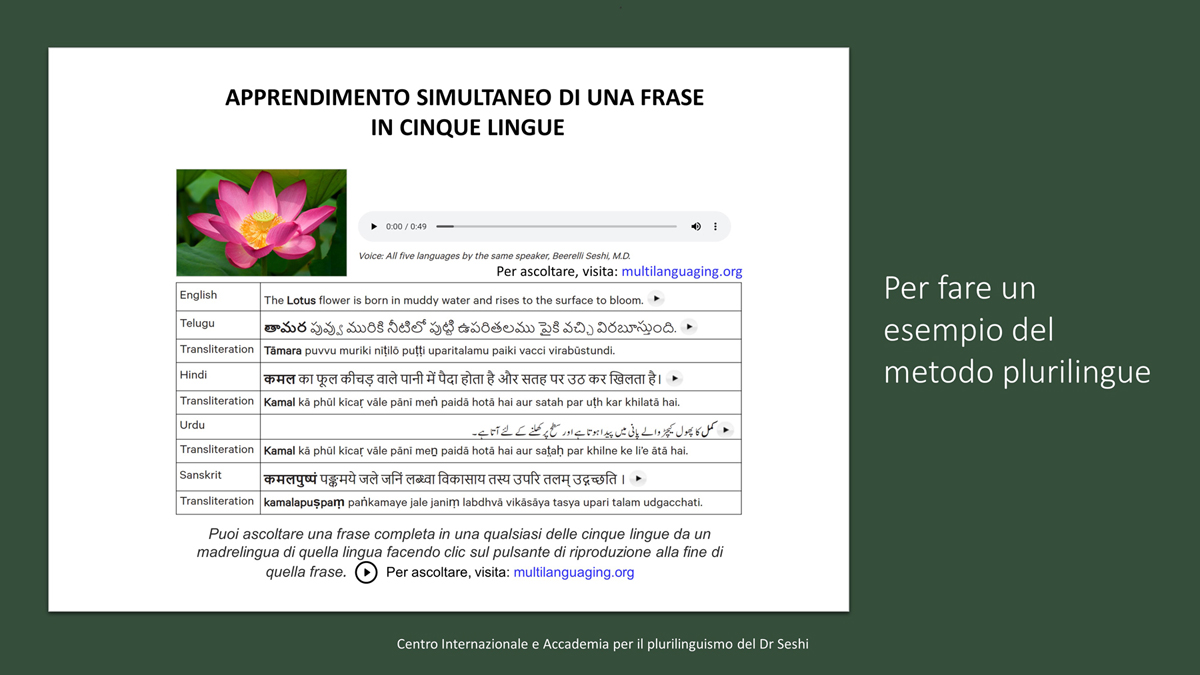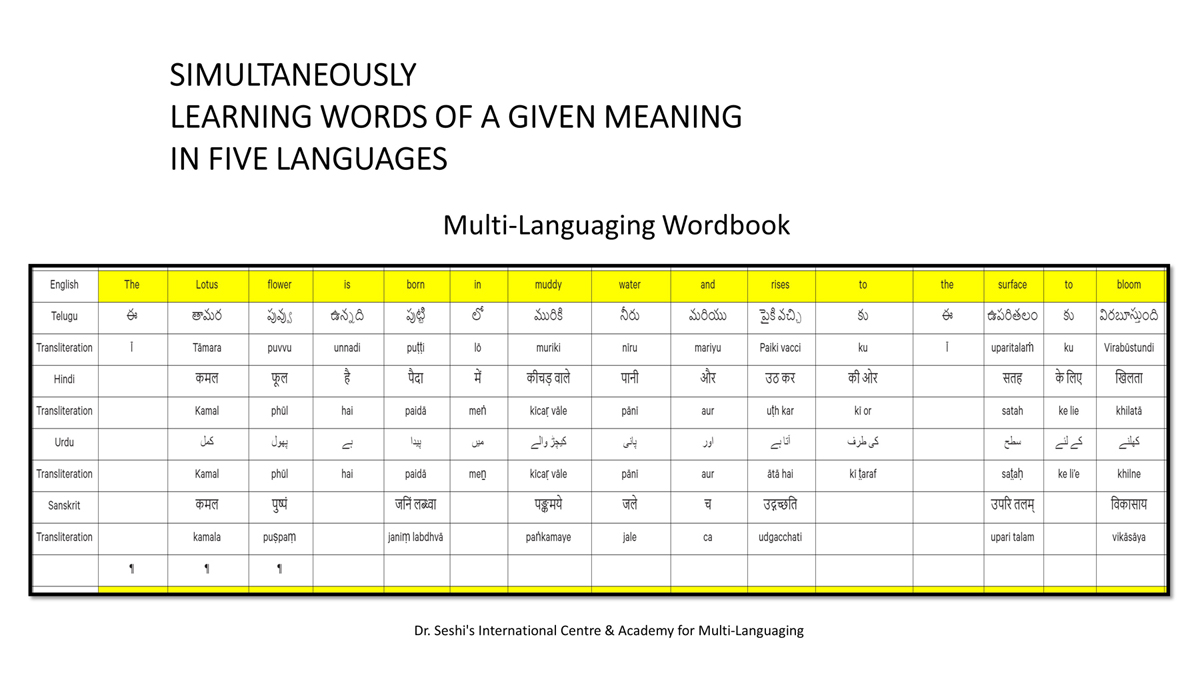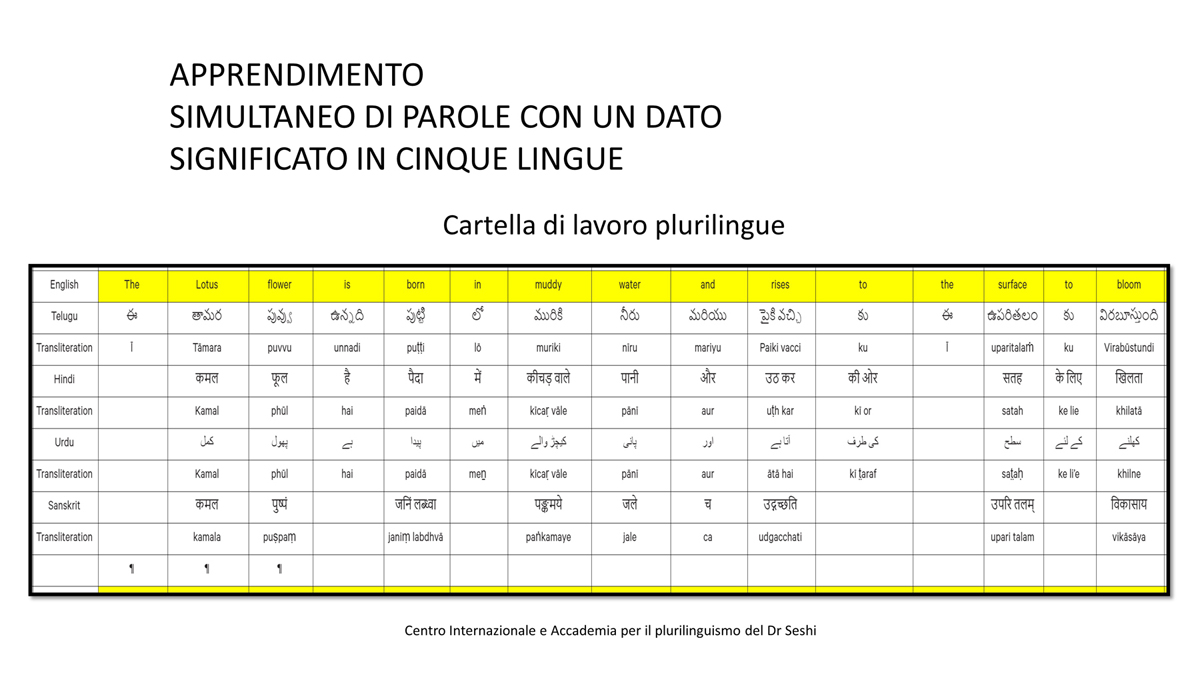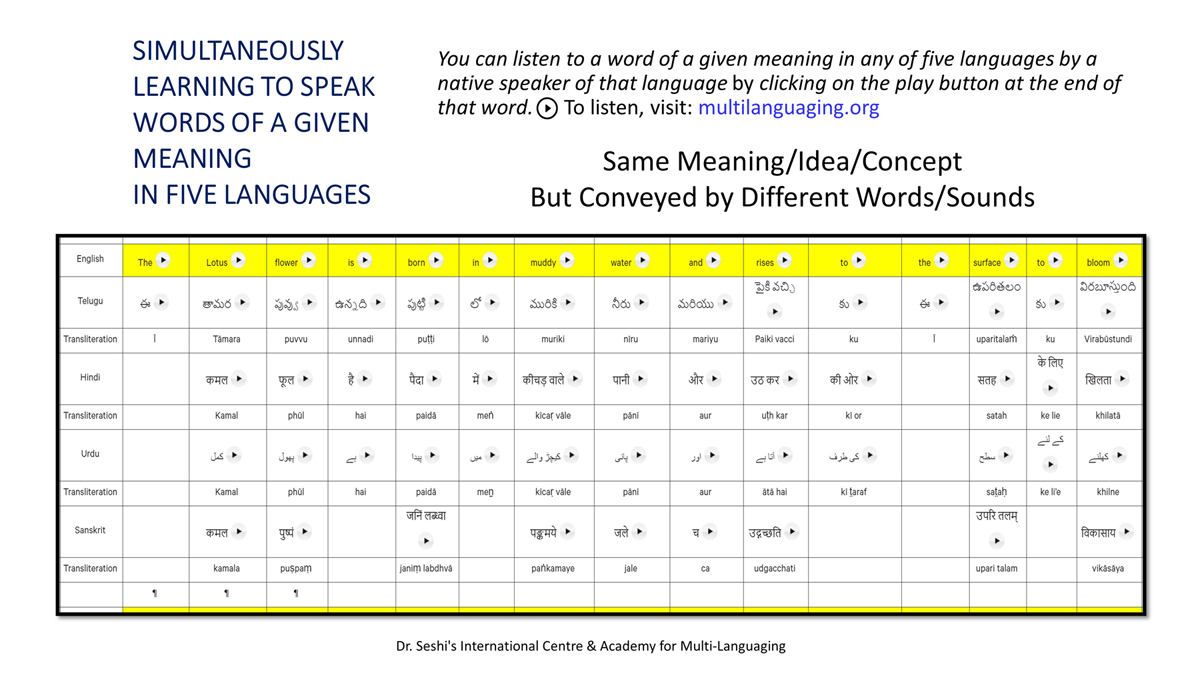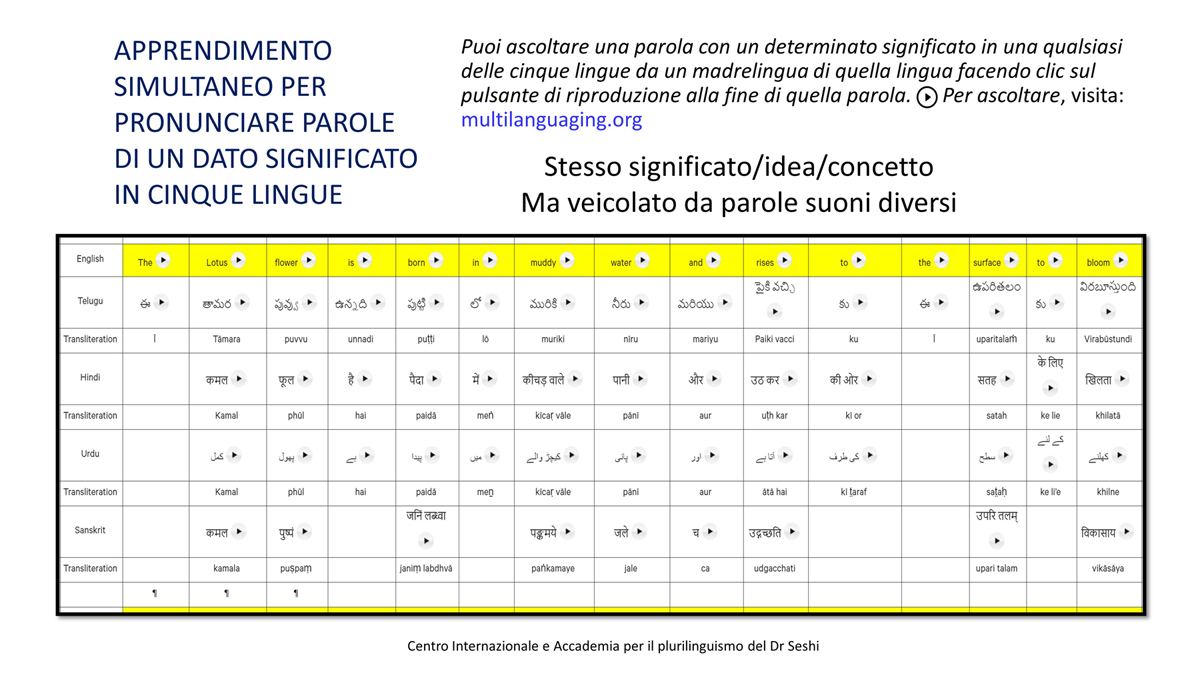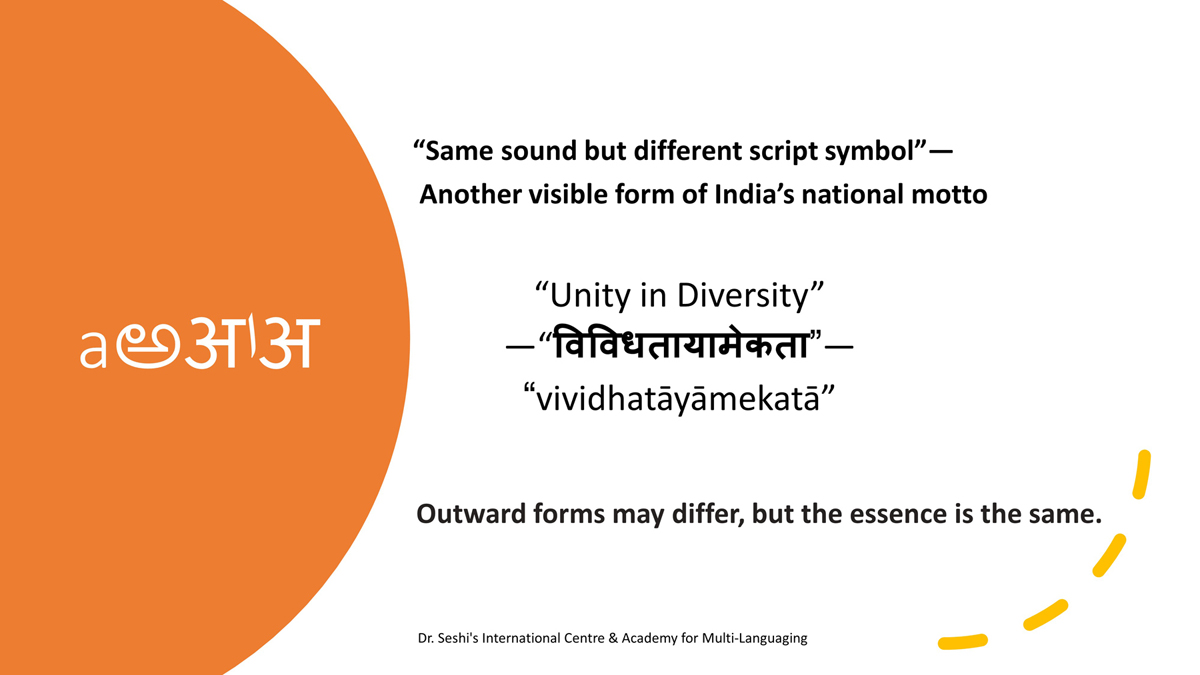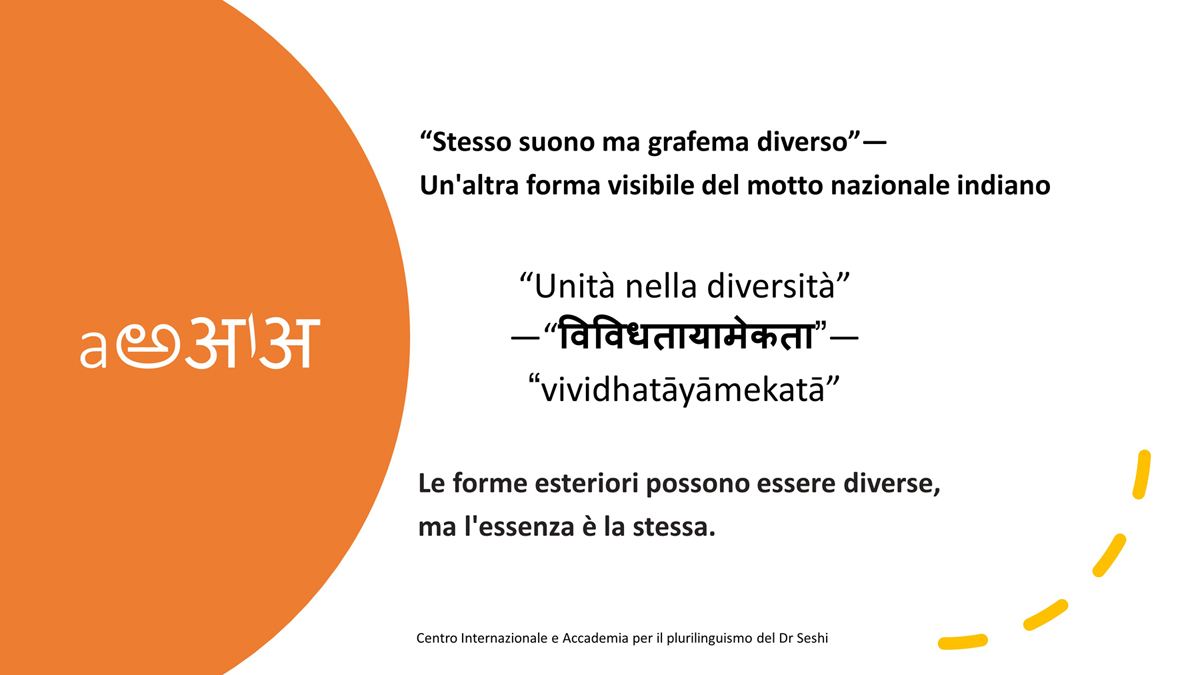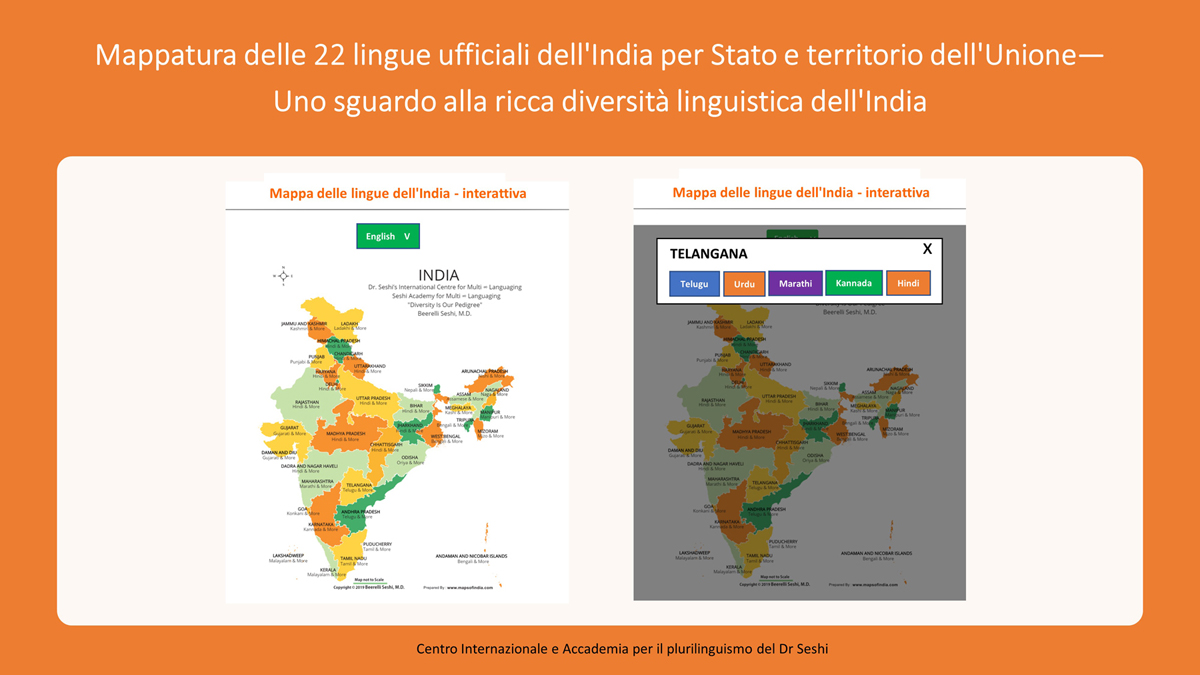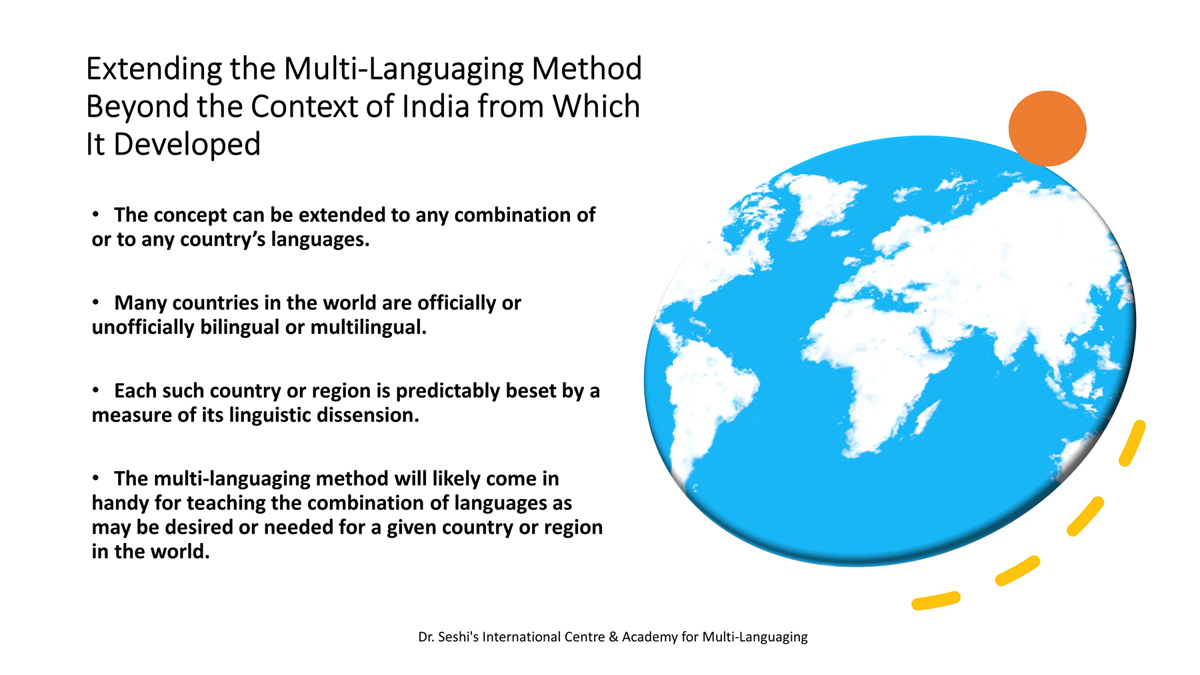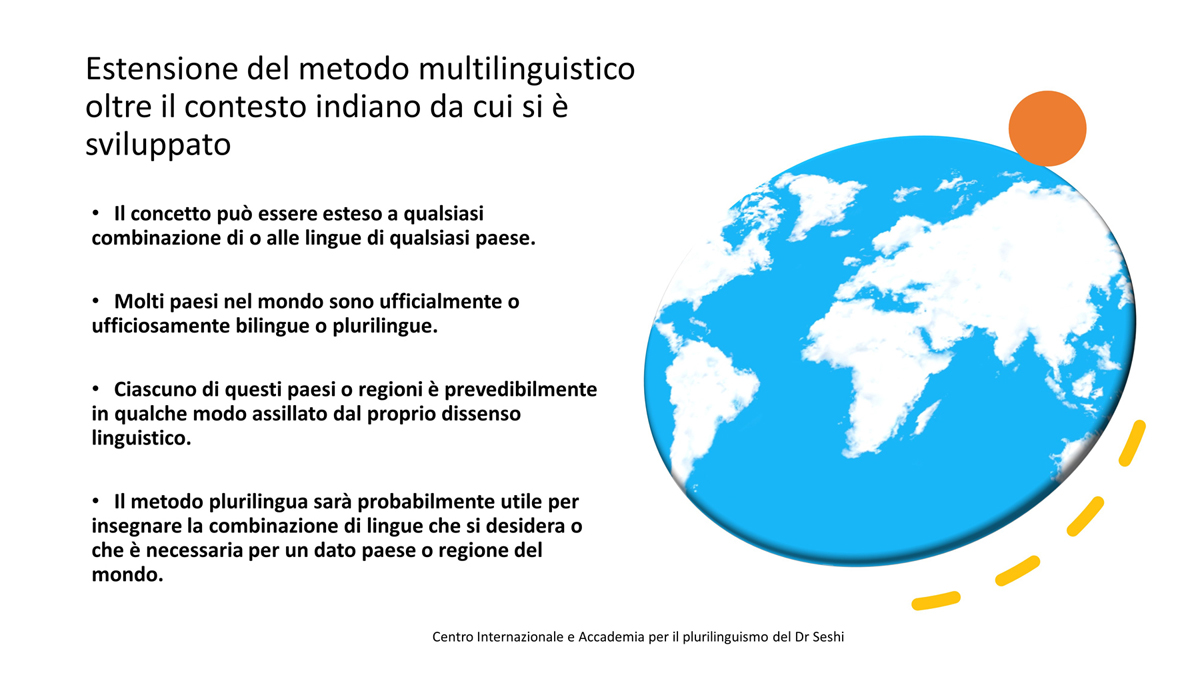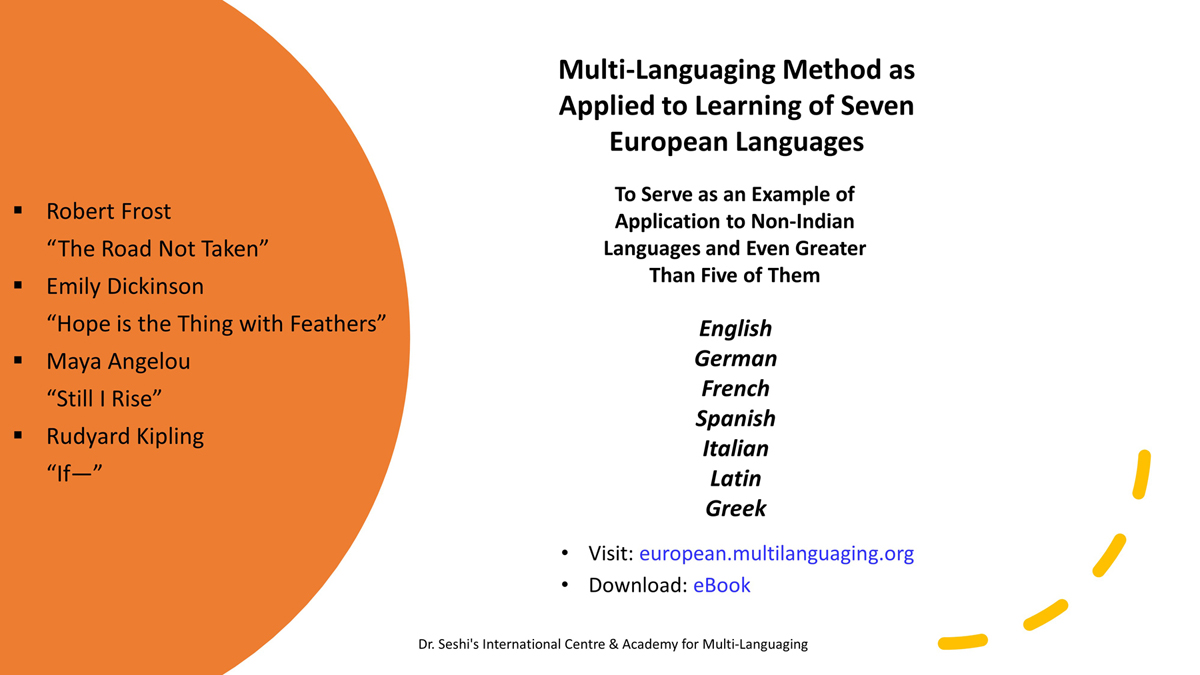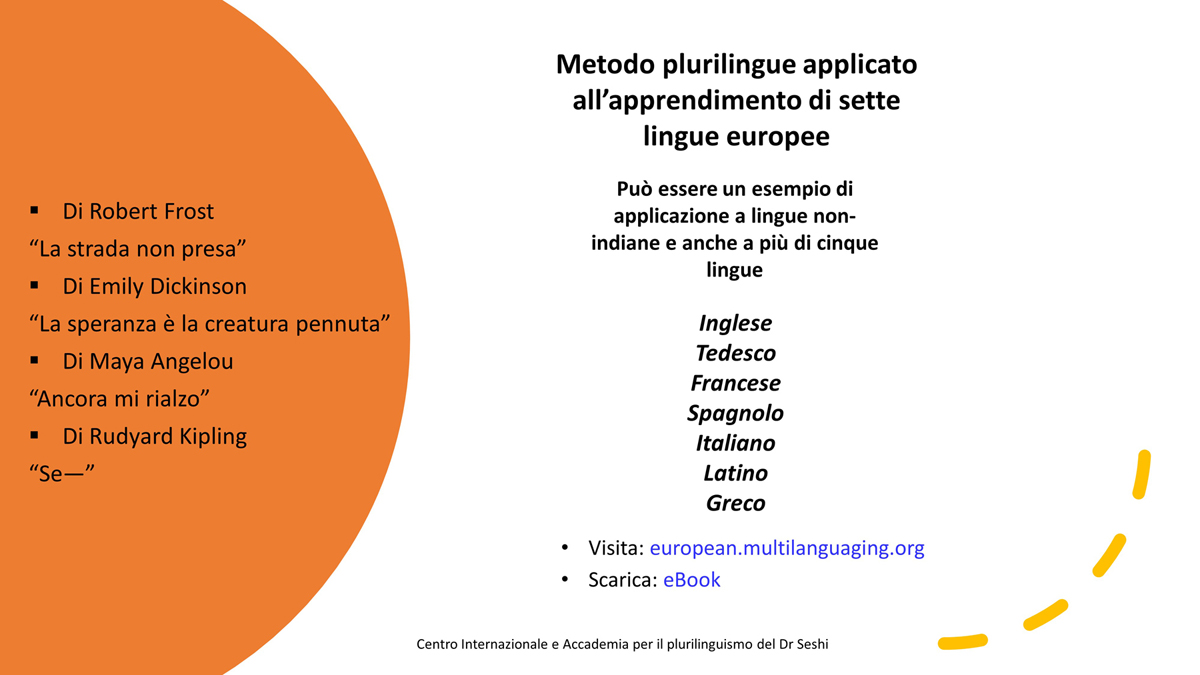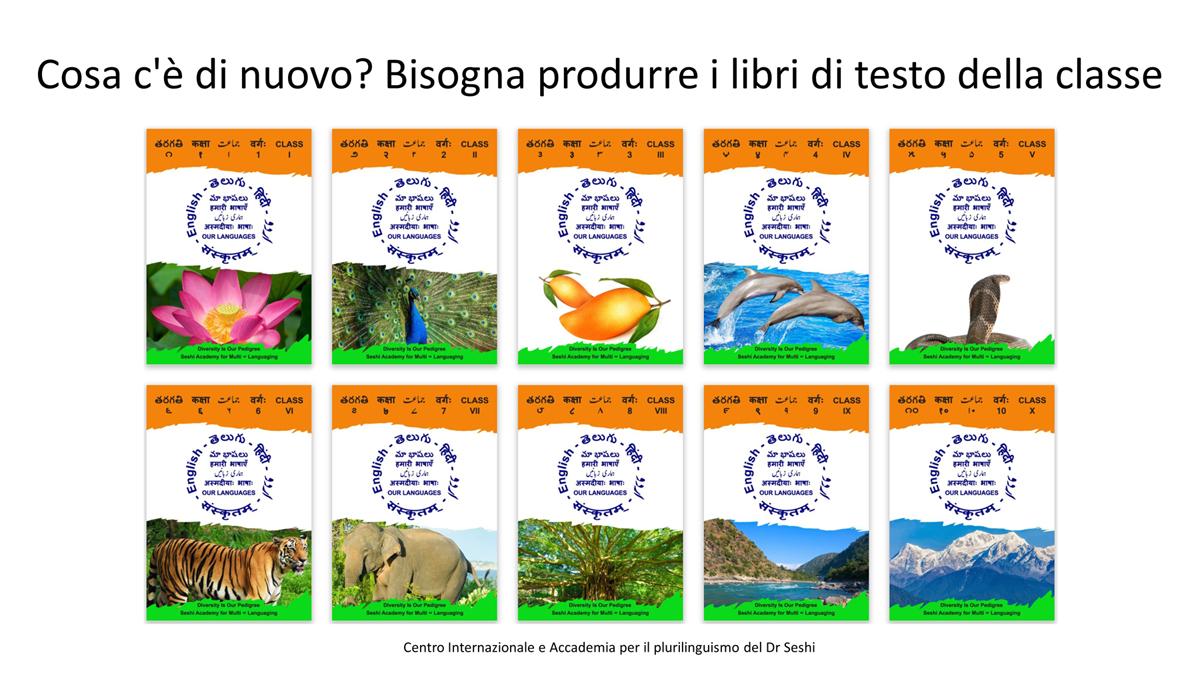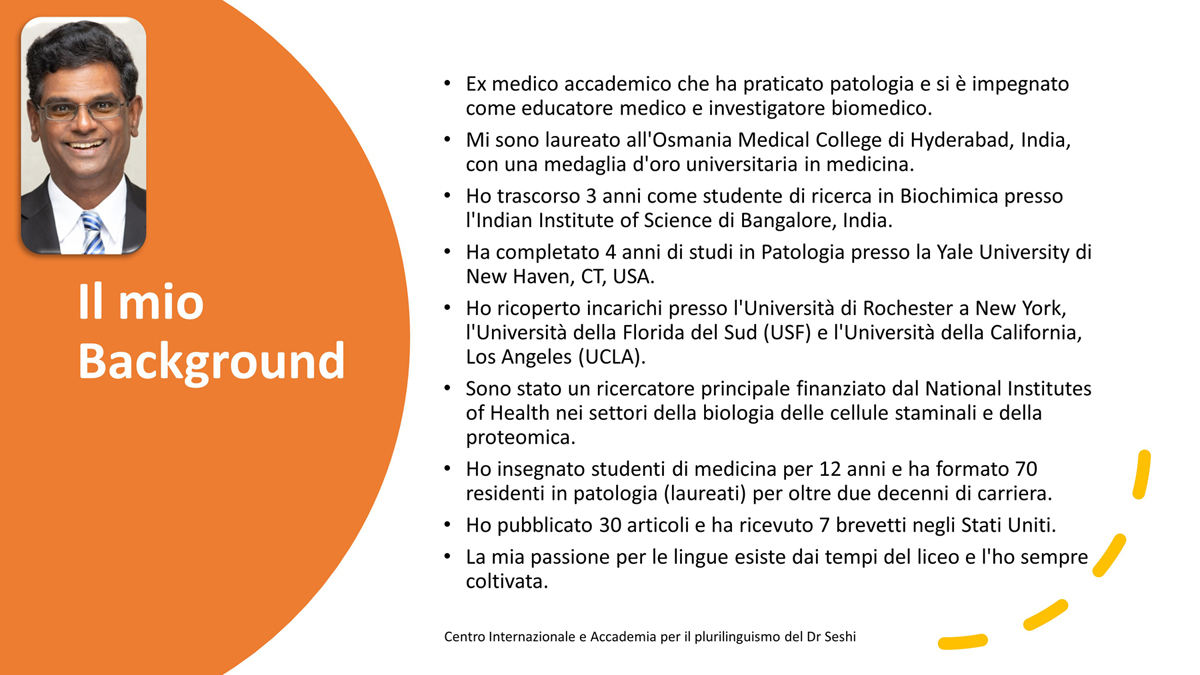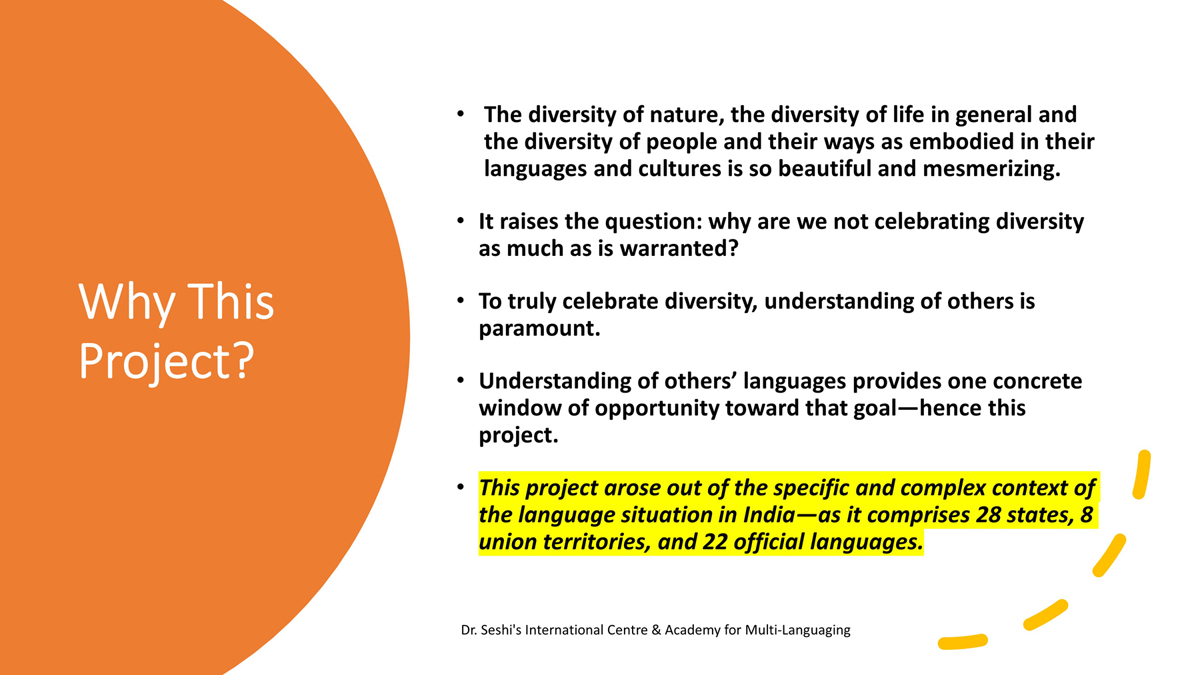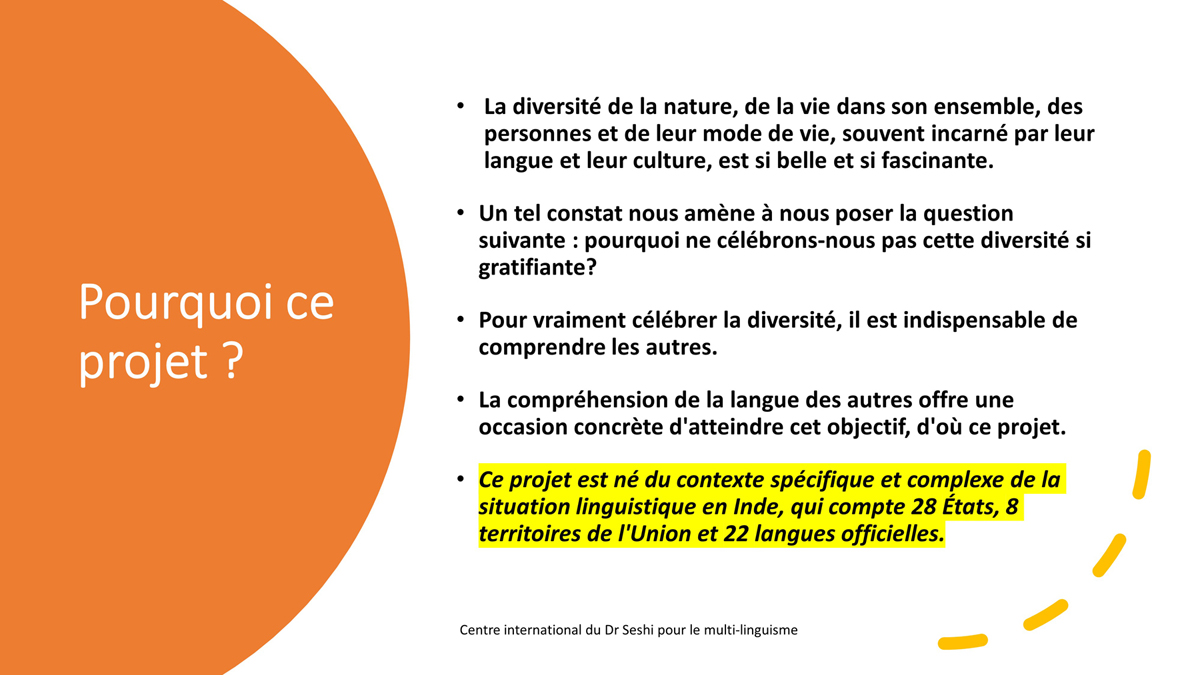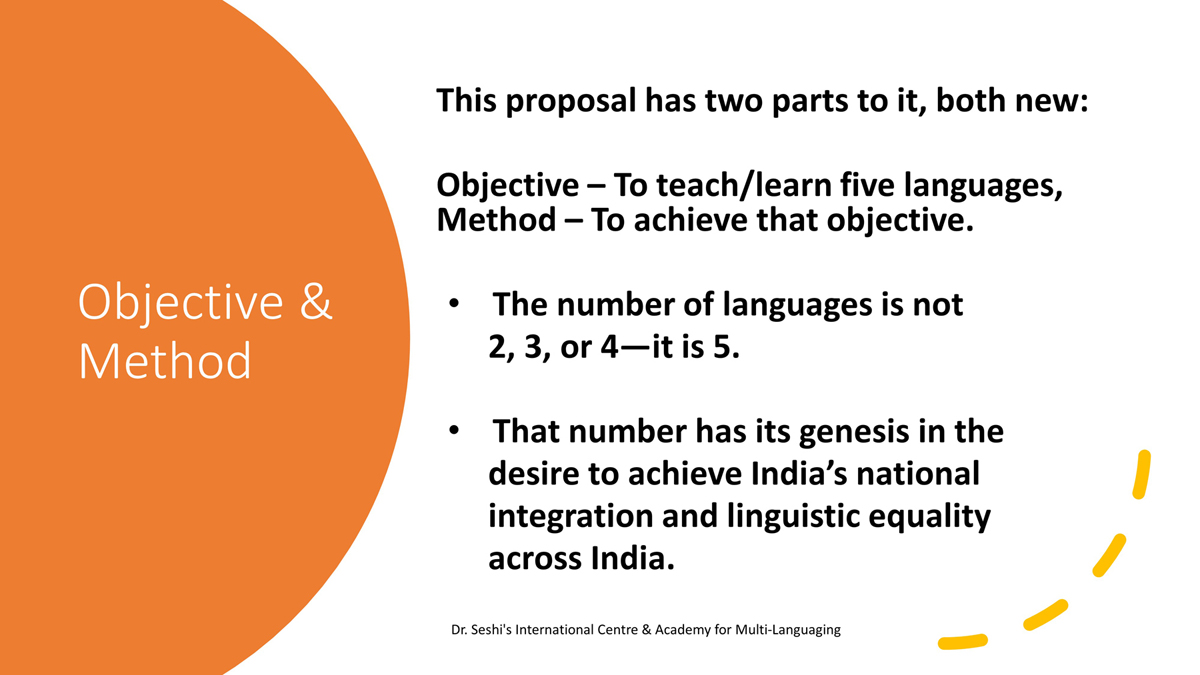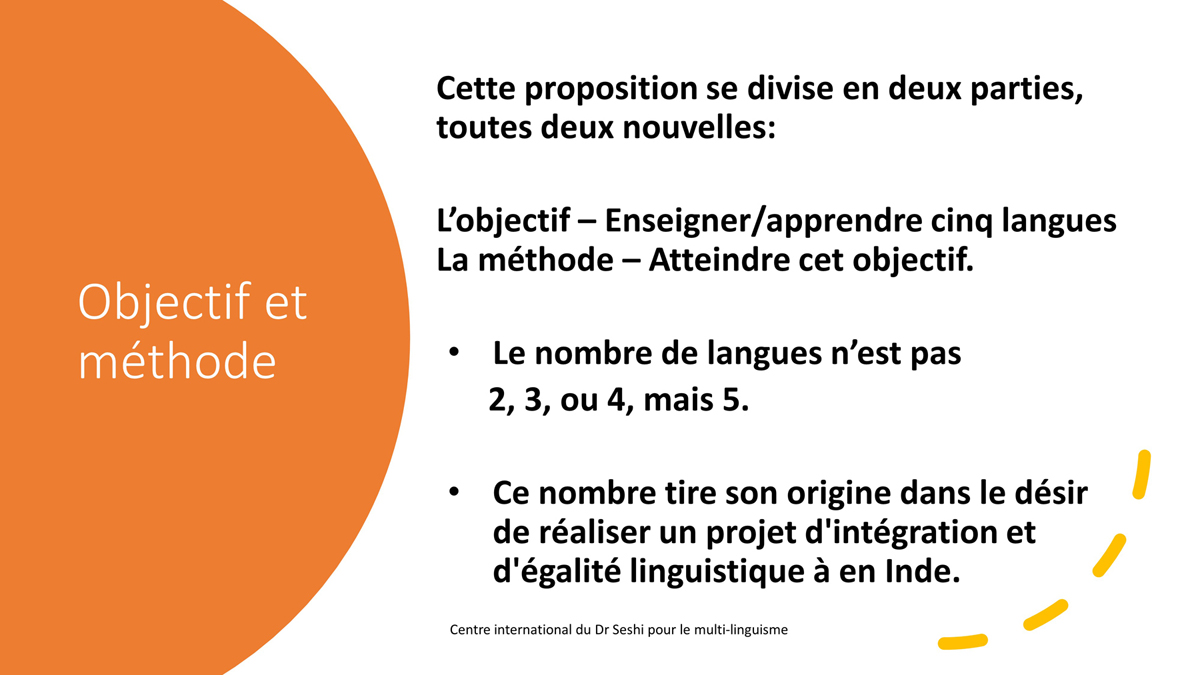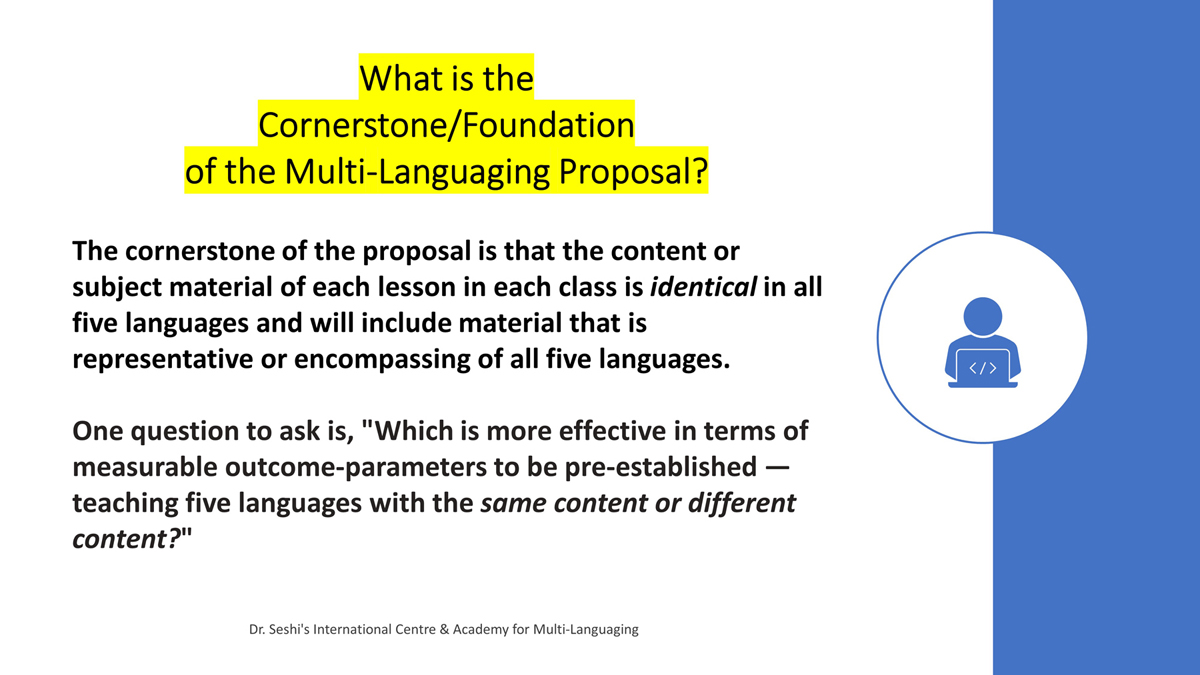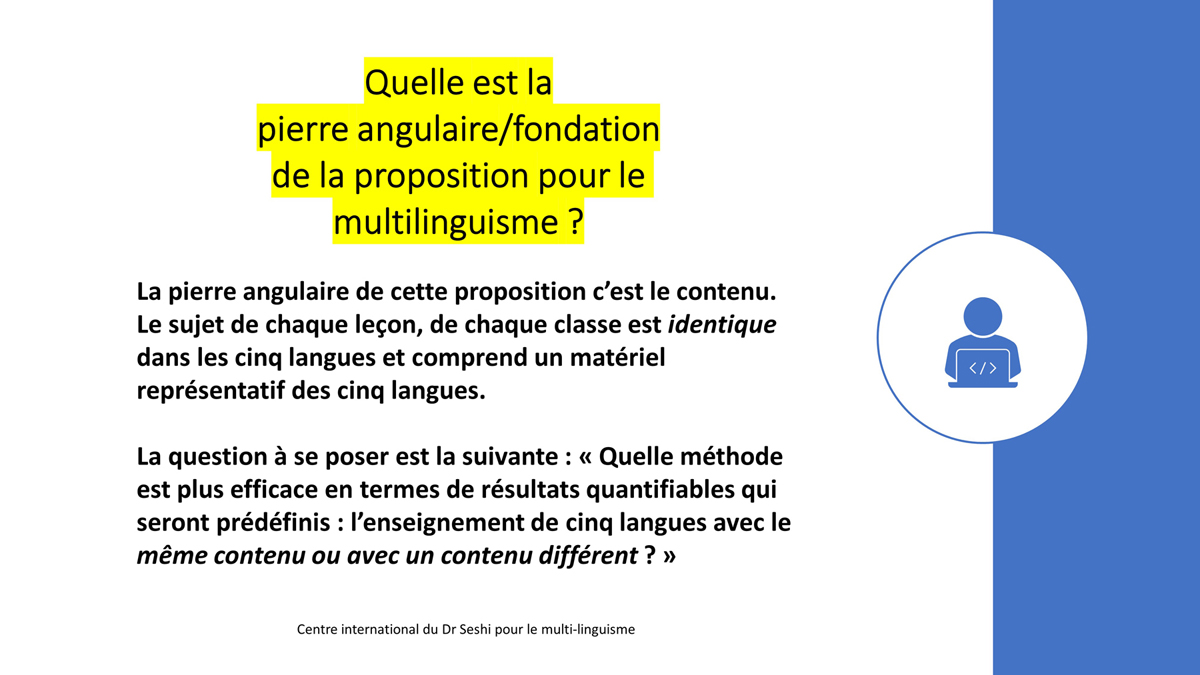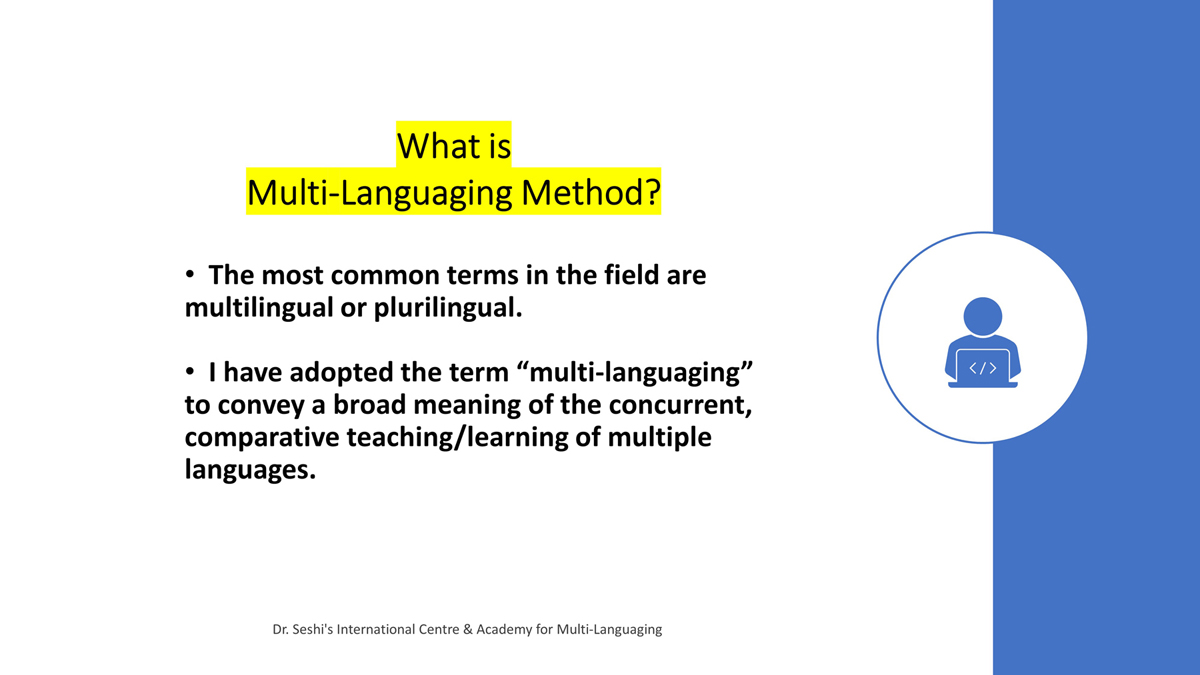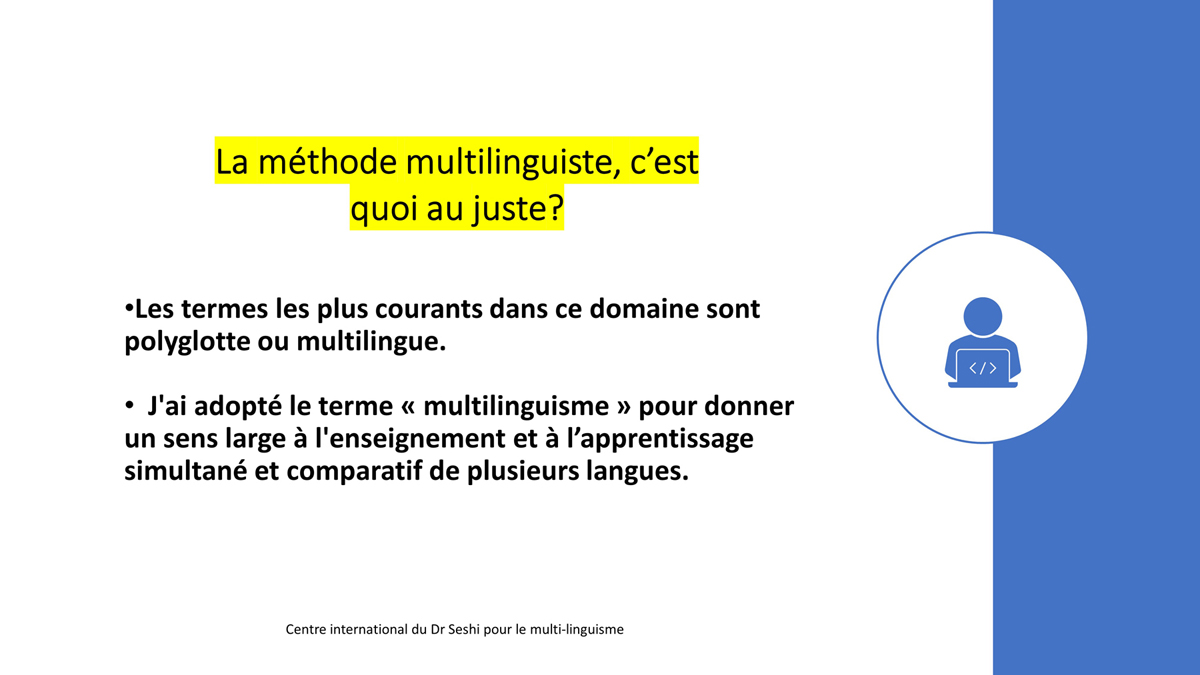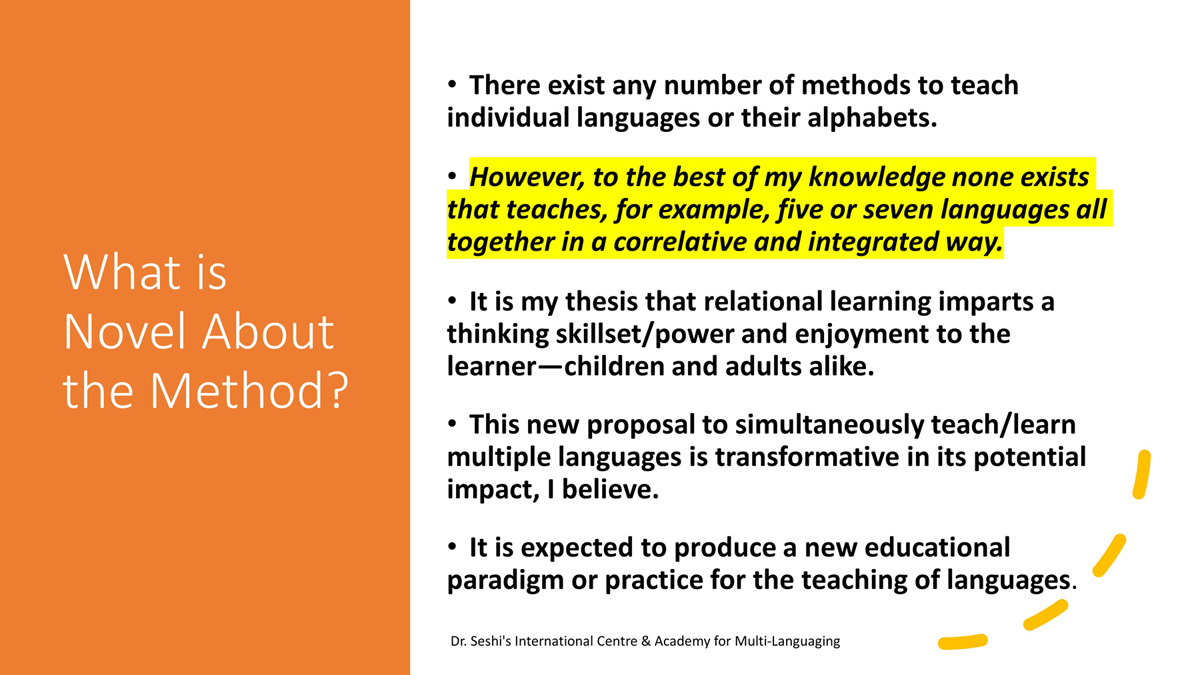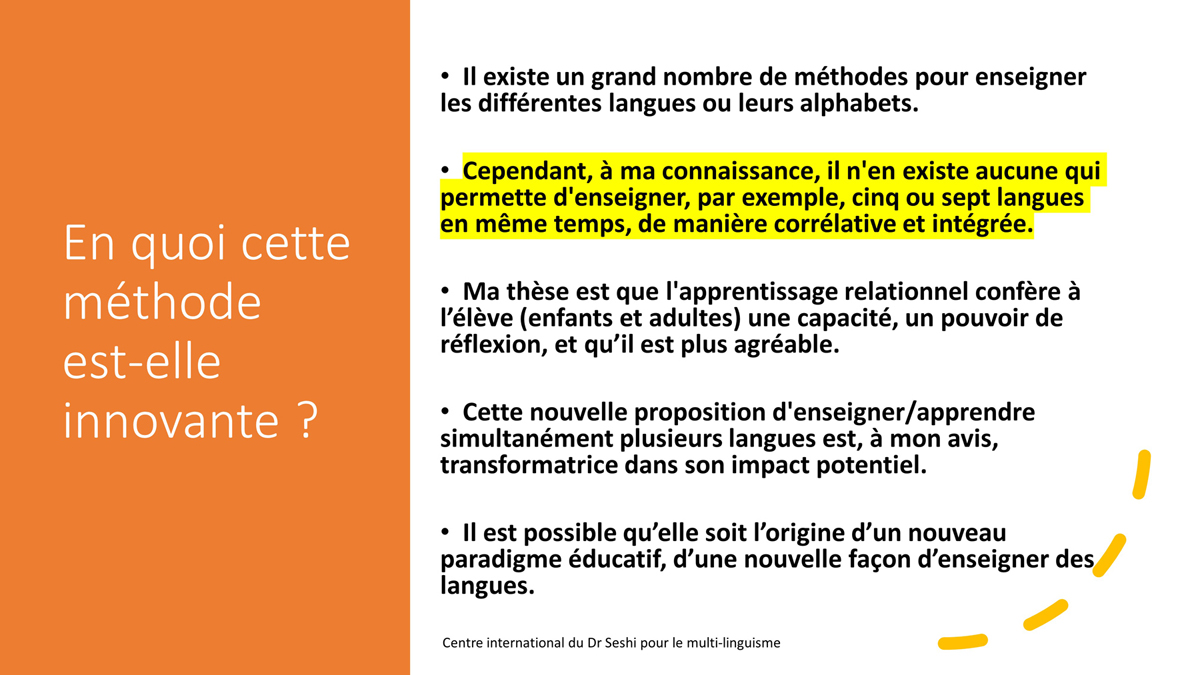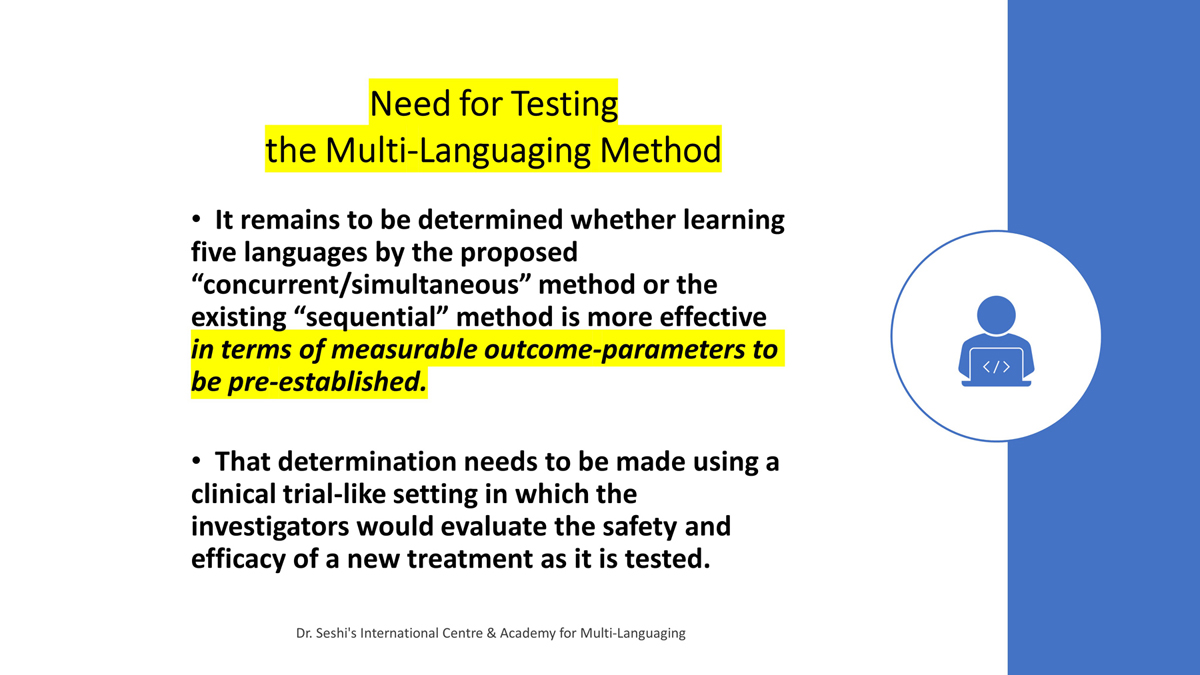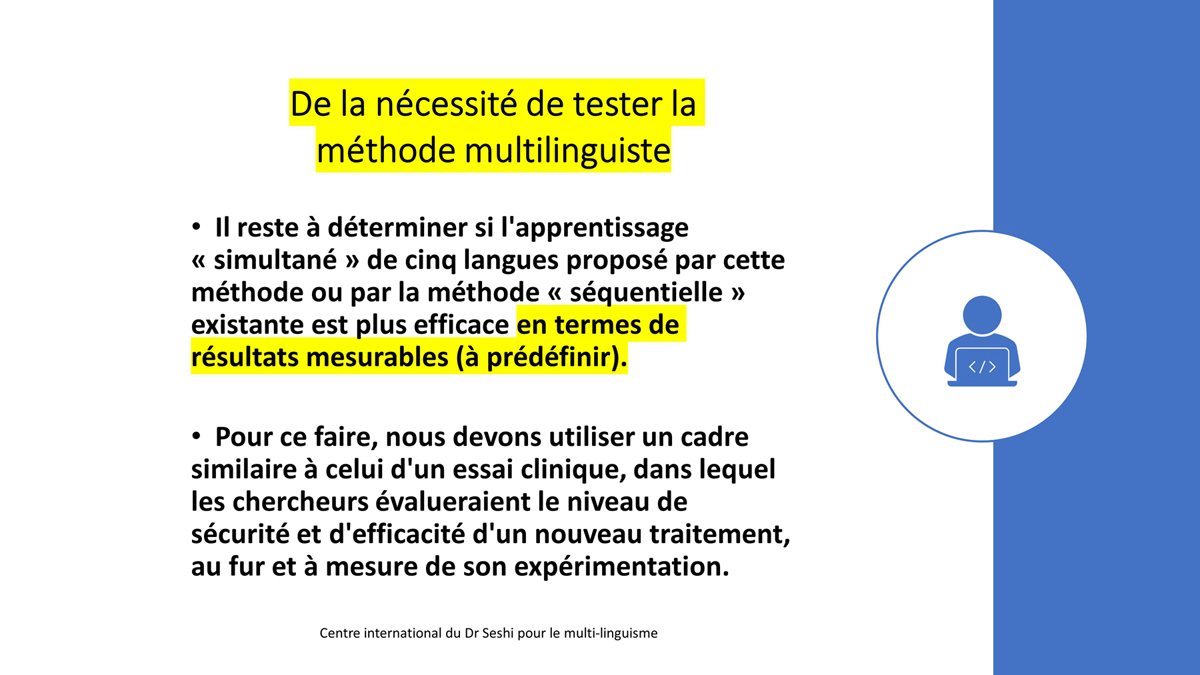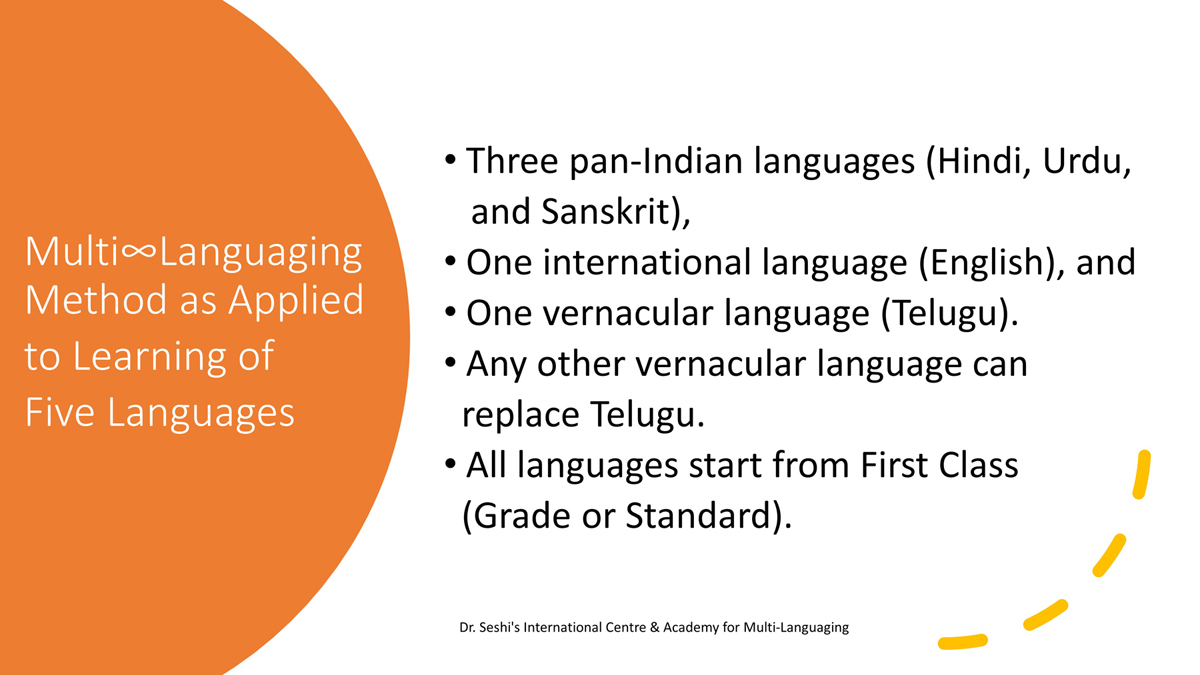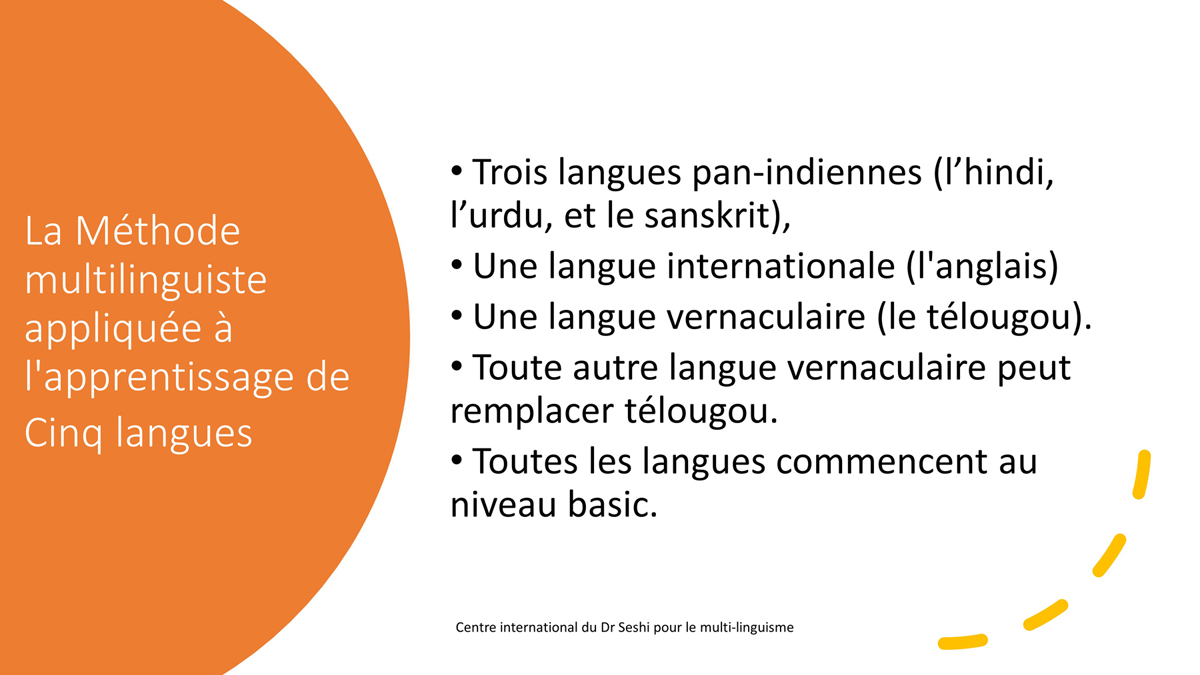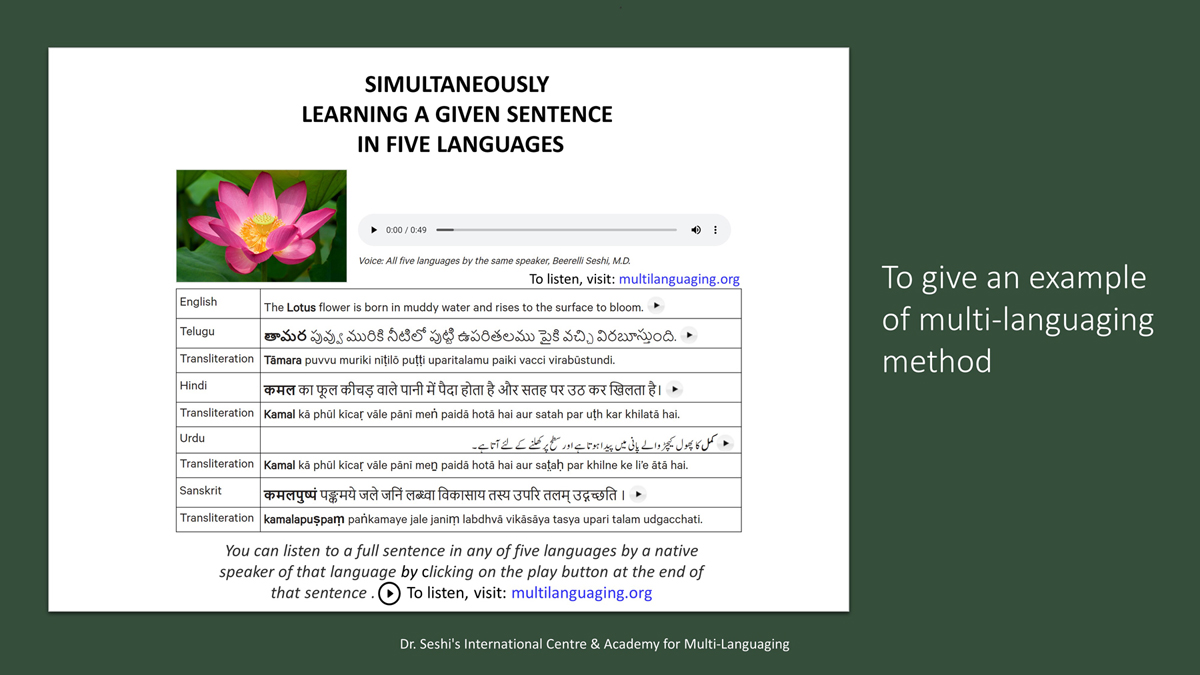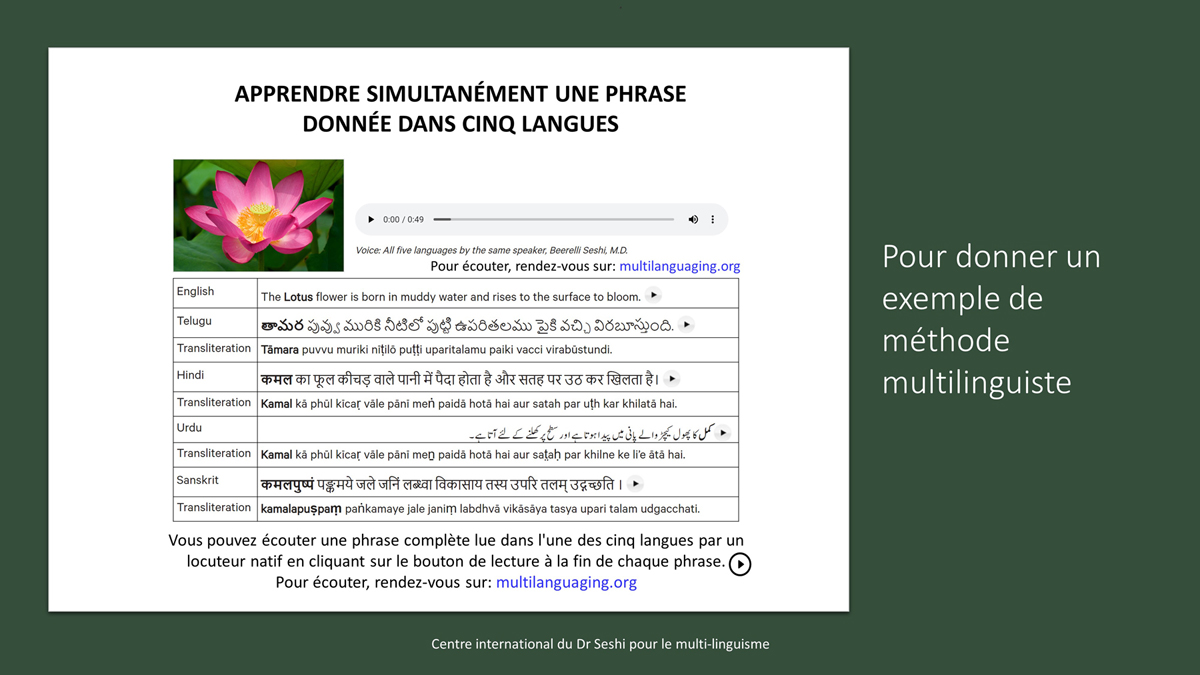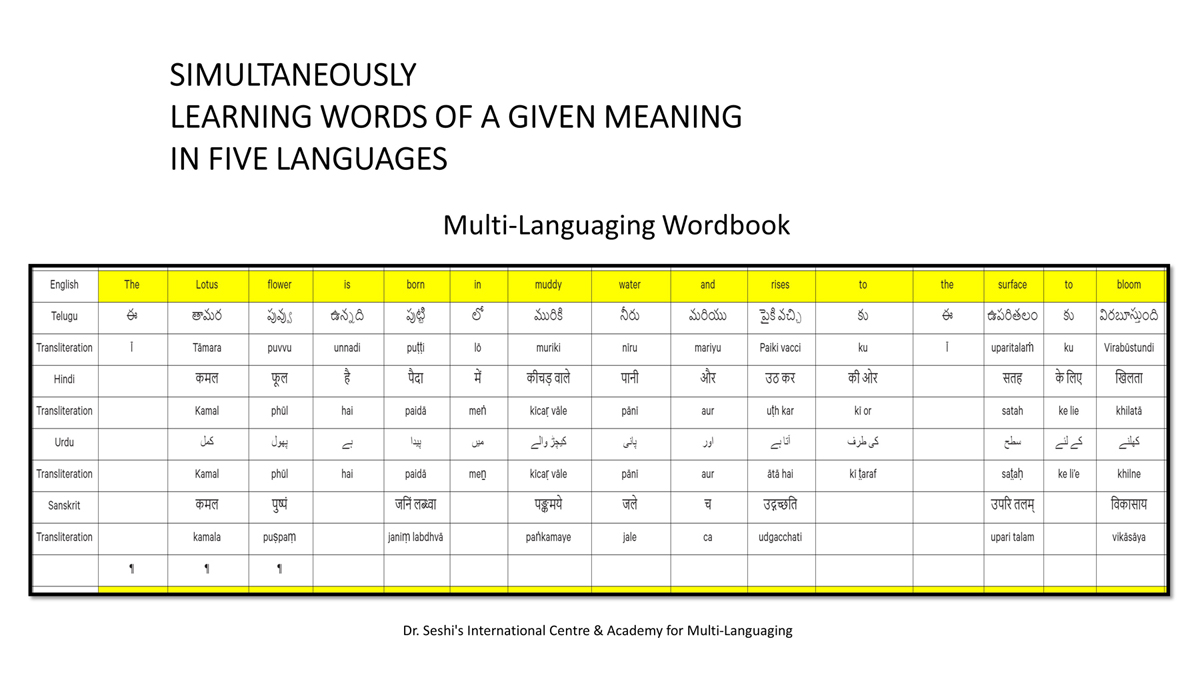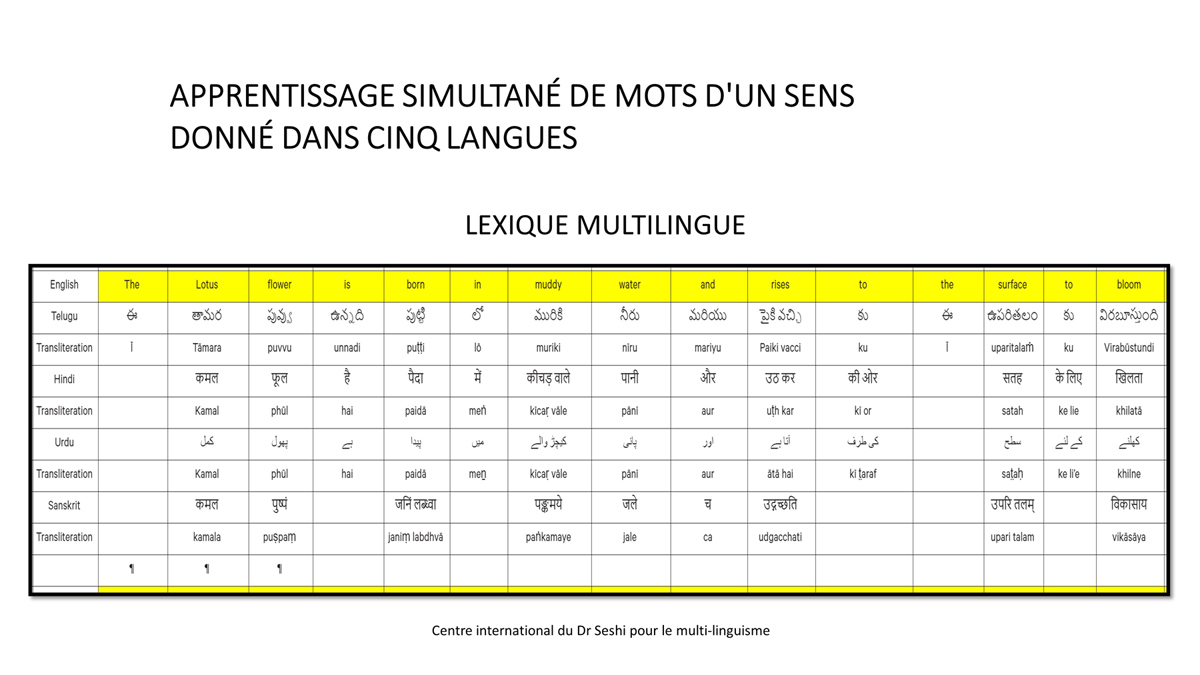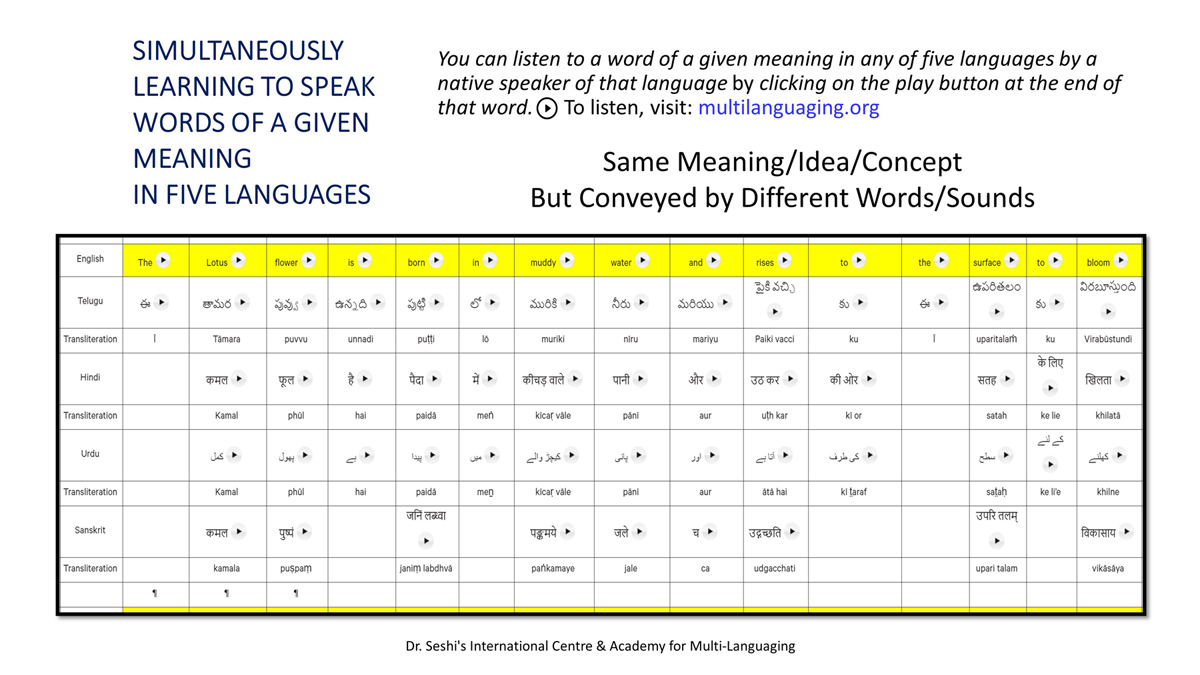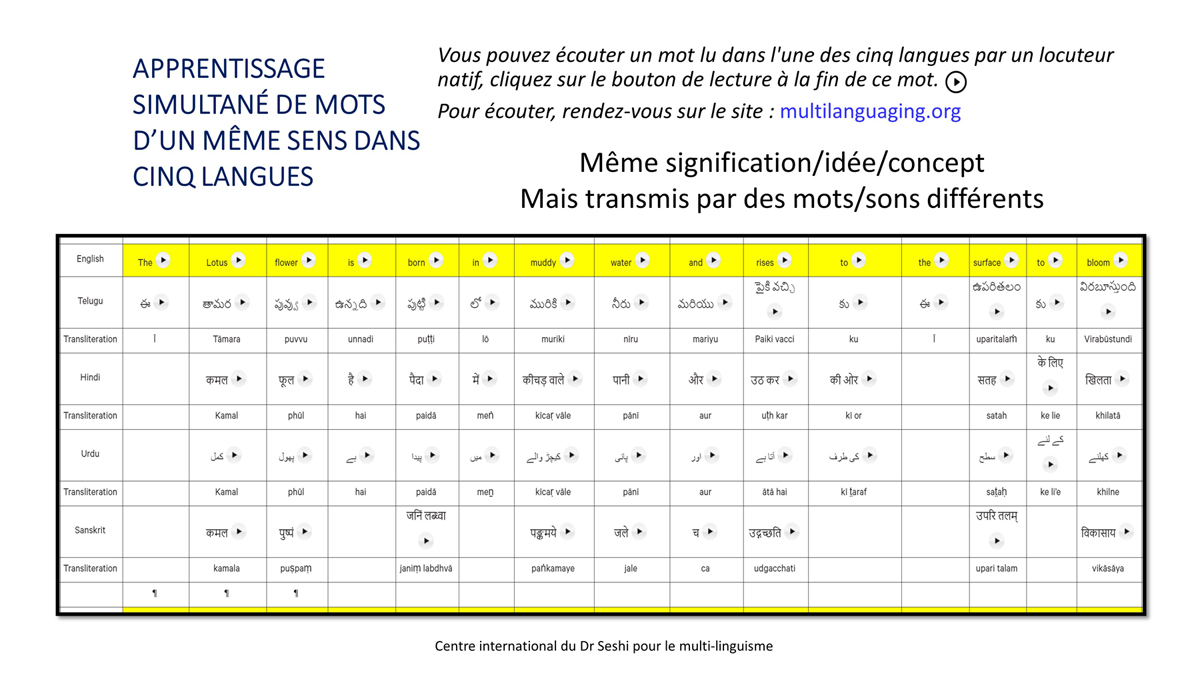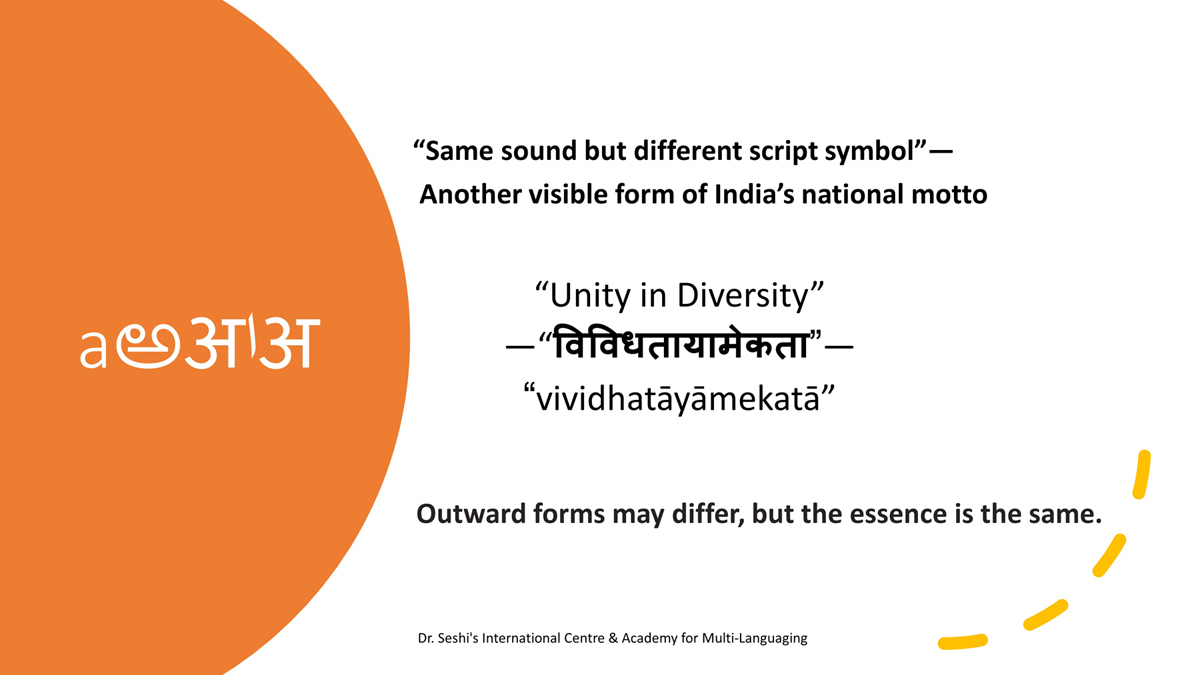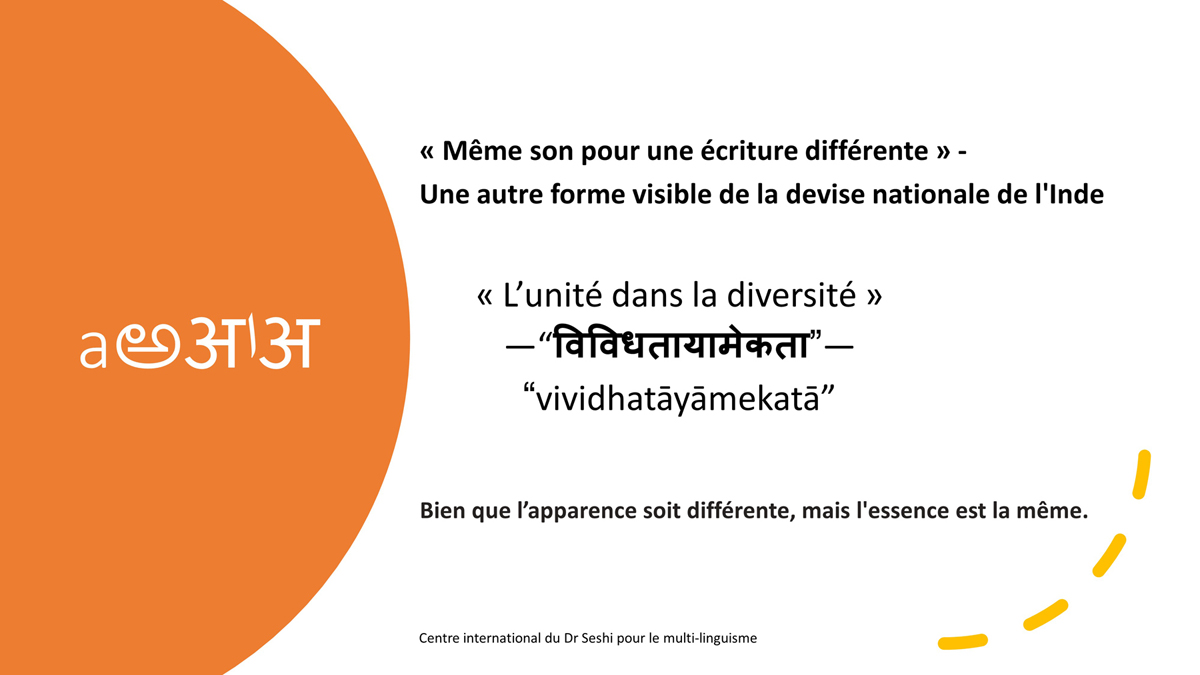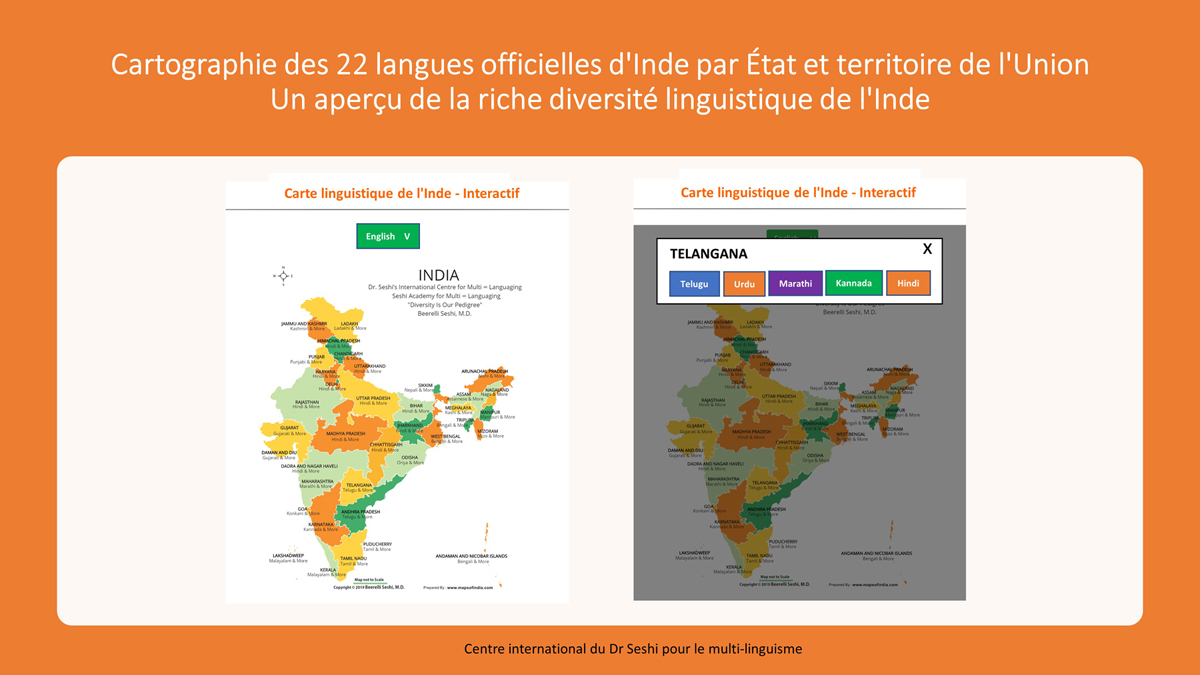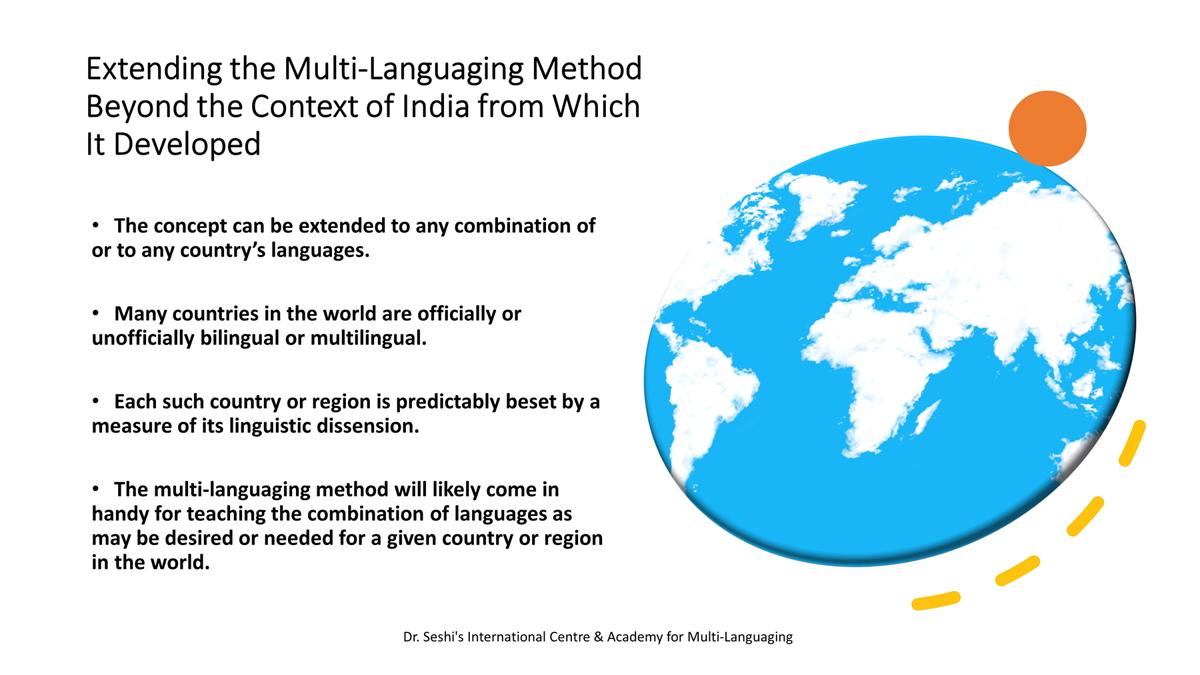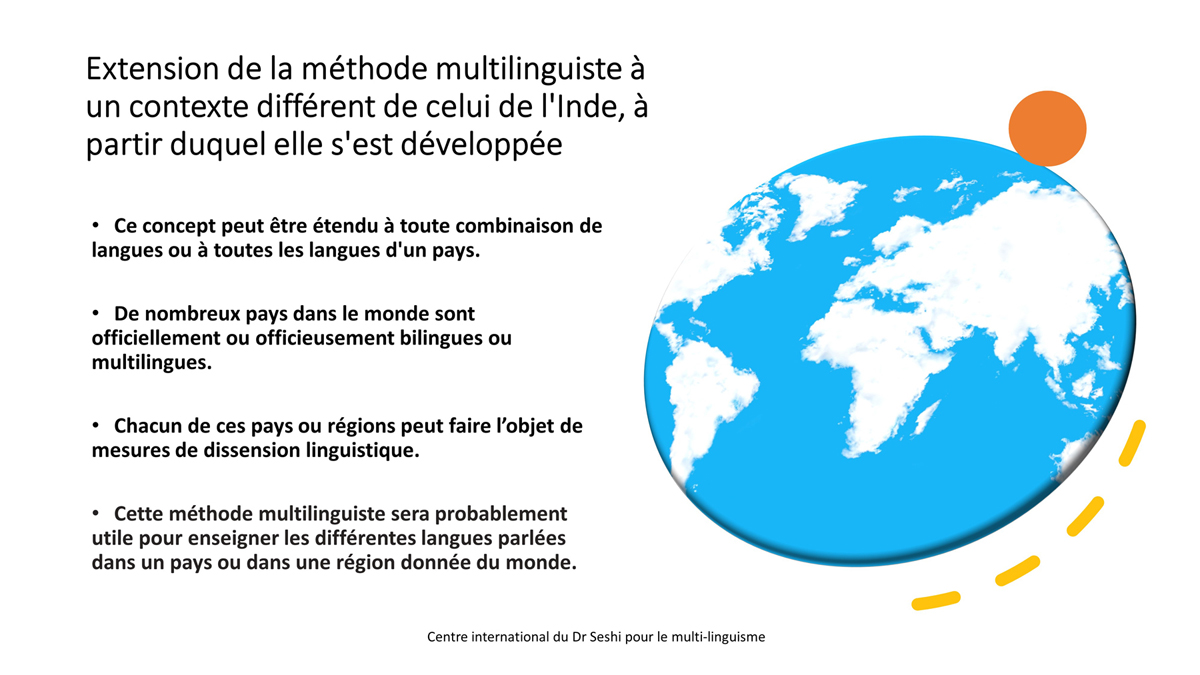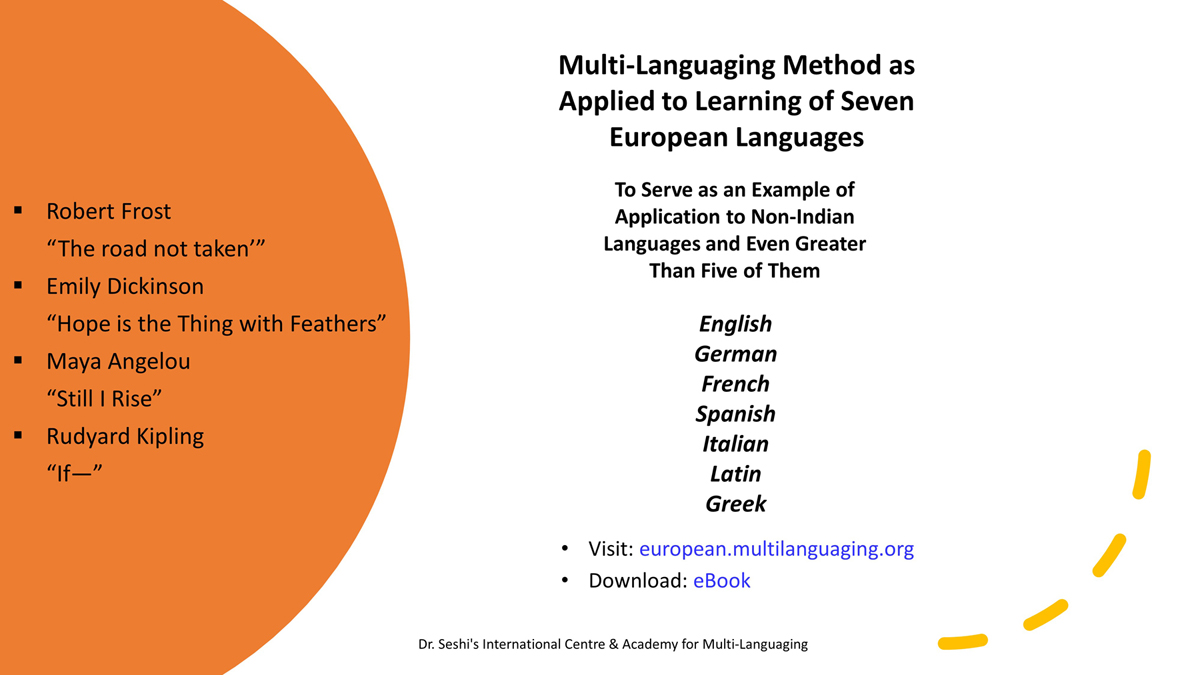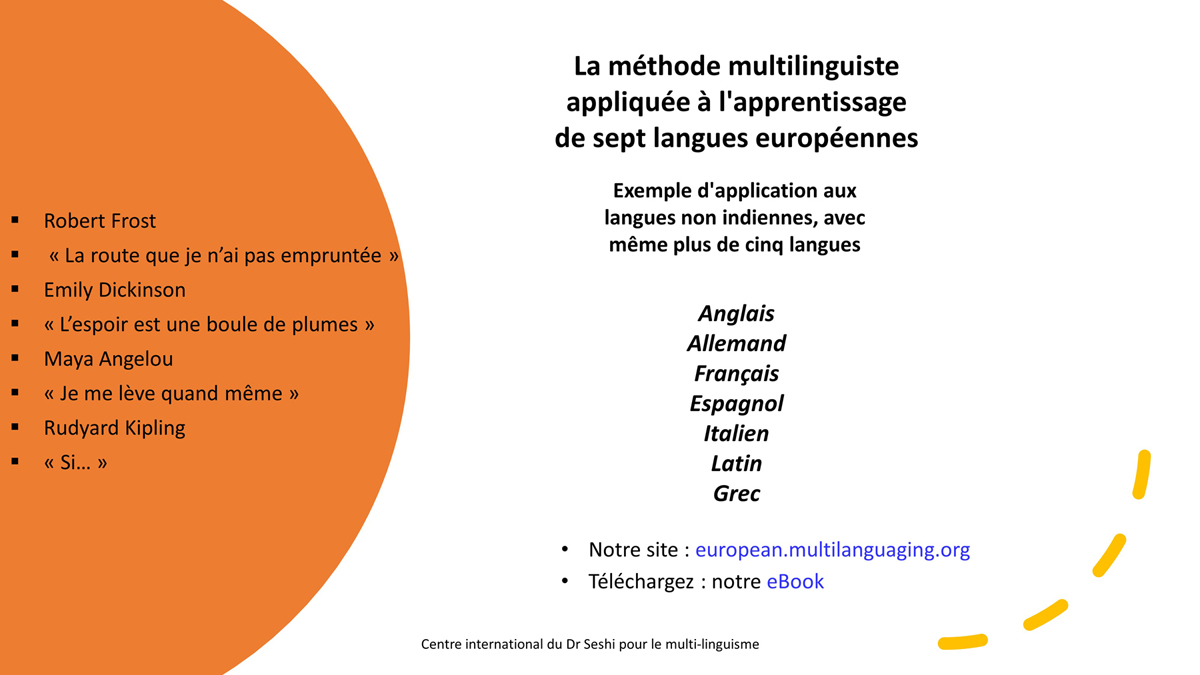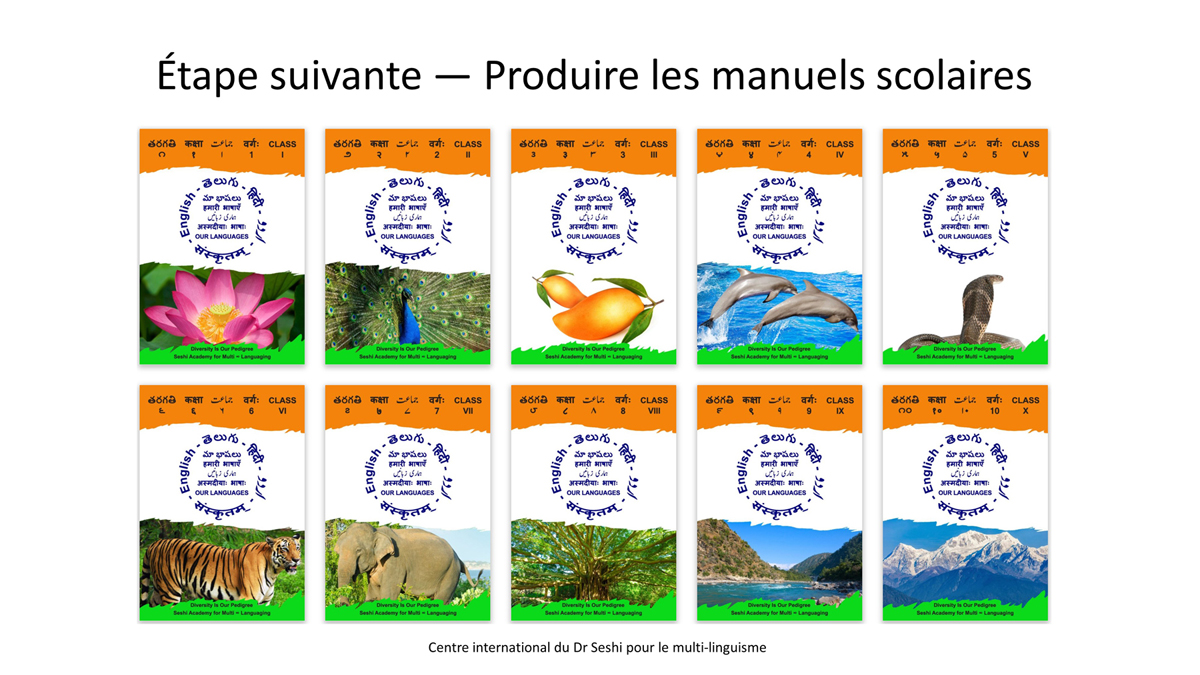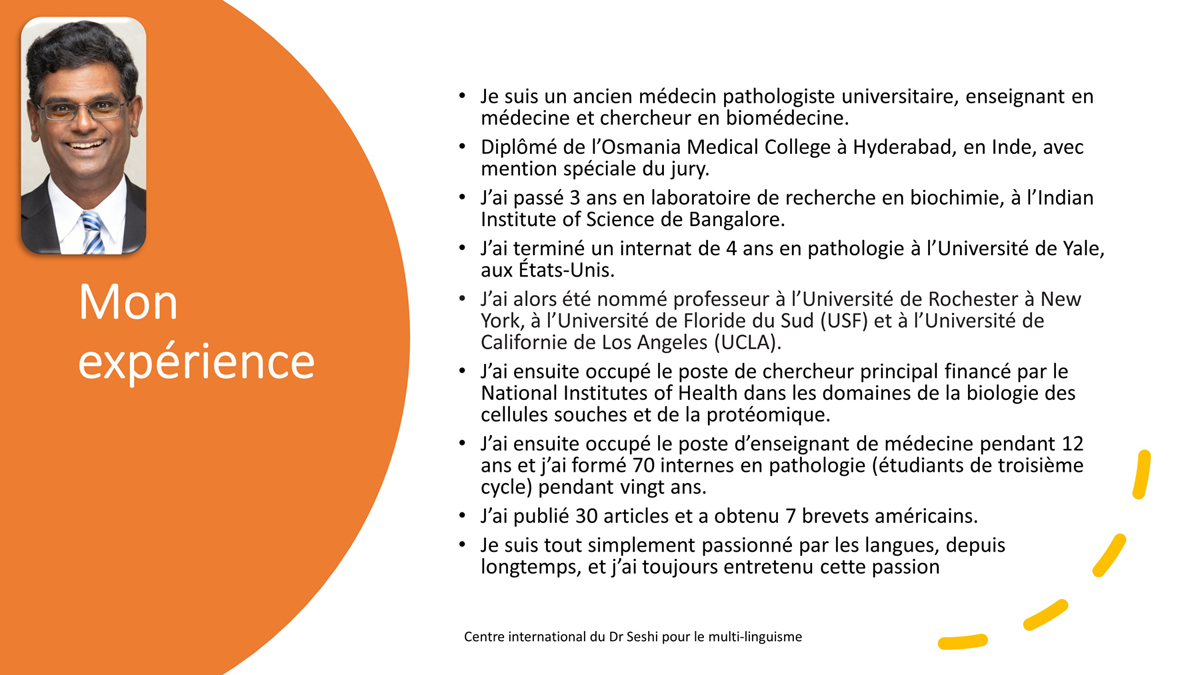
“Change your language and you change your thoughts.”
Karl Albrecht

Beerelli Seshi, M.D.
| English | Still I Rise |
| German | Immer noch erhebe ich mich |
| French | Pourtant, je m’élève |
| Spanish | Aun así, me levanto |
| Italian | Ancora mi rialzo |
| Latin | Nihilominus (I)9 Surgo |
| Greek | Μολαταύτα Ανασηκώνομαι |
| Transliteration | Molatáfta Anasikonomai |
| English | By Maya Angelou (1978) |
| German | Von Maya Angelou (1978) |
| French | De Maya Angelou (1978) |
| Spanish | Por Maya Angelou (1978) |
| Italian | Di Maya Angelou (1978) |
| Latin | Maya Angelou scripsit (1978) |
| Greek | Της Μάγιας Αγγέλου (1978) |
| Transliteration | Tis Mágias Angélou (1978) |
| English | “You may write me down in history |
| German | „Du kannst mich in die Geschichte schreiben |
| French | « Vous pouvez (write)2 me rabaisser dans l’Histoire |
| Spanish | “Puedes anotarme en la historia |
| Italian | “Puoi svalutarmi5 nella storia |
| Latin | Potes describere me (down)9 in historia |
| Greek | «Μπορείς να με καταγράψεις στην ιστορία |
| Transliteration | “ Boreis na me katagrapseis stin istoria |
| English | With your bitter, twisted lies, |
| German | Mit deinen bitteren, verdrehten Lügen, |
| French | Avec vos amers (twisted)3 mensonges. |
| Spanish | con tus amargas, torcidas mentiras, |
| Italian | Con le tue amare bugie contorte, |
| Latin | Cum tuis acerbis, convolutis mendaciis, |
| Greek | Με τα πικρόχολα, διεστραμμένα ψέματά σου, |
| Transliteration | Me ta pikrochola, diestrammena psemata sou, |
| English | You may trod me in the very dirt |
| German | Du kannst mich in den tiefsten Dreck treten |
| French | Vous pouvez me traîner dans la (very)3 boue, |
| Spanish | Puedes hollarme en el fondo del barro |
| Italian | Potresti calpestarmi nel fango6 |
| Latin | (You may)9 Potes calcare me in (the)9 ipso caeno |
| Greek | Μπορείς να με πατήσεις μέχρι και στο χώμα, |
| Transliteration | Boreis na me patiseis mechri kai sto choma, |
| English | But still, like dust, I’ll rise. |
| German | Aber trotzdem werde ich mich wie Staub erheben. |
| French | Mais (still)3 comme la poussière, je m’élève. |
| Spanish | Aún así, como el polvo… me levanto. |
| Italian | Ma lo stesso, come polvere, mi rialzerei. |
| Latin | Sed nihilominus, sicut pulvis, (I’ll)9 surgam. |
| Greek | Αλλά και πάλι, θα ανασηκωθώ σαν την σκόνη. |
| Transliteration | Alla kai pali, tha anasikotho san tin skoni. |
| English | Does my sassiness upset you? |
| German | (Does)1 Verärgert dich meine Frechheit? |
| French | (Does)3 Mes sarcasmes vous dérangent-ils ? |
| Spanish | (Does)4 ¿Mi descaro te molesta? |
| Italian | (Does)7La mia insolenza ti sconvolge? |
| Latin | (Does)9 Nonne mea impudentia conturbat te? |
| Greek | Μήπως σε αναστατώνει η αυθάδειά μου; |
| Transliteration | Mipos se anastatonei I afthadeia mou? |
| English | Why are you beset with gloom? |
| German | Warum bist du von Finsternis geplagt? |
| French | Pourquoi êtes-vous assailli par la morosité ? |
| Spanish | ¿Porqué estás ahí quieto, con pesadumbre? |
| Italian | Perché sei assillato dall’oscurità? |
| Latin | Cur (are you)9 vexaris (with)9 tristitia? |
| Greek | Γιατί σε πιλατεύει η κατήφεια; |
| Transliteration | Giati se pilatevei I katifeia? |
| English | ’Cause I walk like I’ve got oil wells |
| German | Weil ich gehe, als hätte ich Ölquellen |
| French | Parce que je marche comme si j’avais des puits de pétrole |
| Spanish | Porque (I)4 camino como si fuera dueña de pozos petroleros |
| Italian | ‘Perché (I)7cammino come se avessi pozzi di petrolio |
| Latin | Quod (I)9 ambulo quasi (I’ve)9 habeam olei puteos |
| Greek | Γιατί περπατώ λες και έχω πετρελαιοπηγές |
| Transliteration | Giati perpato les kai echo petrelaiopiges |
| English | Pumping in my living room. |
| German | in meinem Wohnzimmer pumpen. |
| French | (Pumping)3 dans ma salle à manger ? |
| Spanish | bombeando en la sala de mi casa… |
| Italian | Che pompano nel mio soggiorno. |
| Latin | Exhaurientes in meo exedrio. |
| Greek | Οι οποίες αντλούνται στο σαλόνι μου. |
| Transliteration | Oi opoies antlountai sto saloni mou |
| English | Just like moons and like suns, |
| German | Genau wie Monde und wie Sonnen, |
| French | Tout comme la lune et (like)3 le soleil, |
| Spanish | (Just)4 Como lunas y como soles, |
| Italian | Proprio come le lune e come i soli, |
| Latin | Sic ut lunae et soles, |
| Greek | Σαν τους ήλιους και τα φεγγάρια |
| Transliteration | San tous ilious kai ta feggaria, |
| English | With the certainty of tides, |
| German | Mit der Gewissheit der Gezeiten, |
| French | avec la certitude des marées, |
| Spanish | con la certeza de las mareas, |
| Italian | Con la certezza delle maree, |
| Latin | Cum (the)9 certitudine (of)9 aestuum, |
| Greek | Με την σιγουριά των παλιρροιών, |
| Transliteration | Me tin sigouria ton palirroion, |
| English | Just like hopes springing high, |
| German | Genau wie große Hoffnungen, |
| French | tel un espoir qui naît |
| Spanish | (Just)4 Como las esperanzas brincando alto, |
| Italian | Proprio come le speranze che balzano in alto, |
| Latin | Sic ut spes alte salientes, |
| Greek | Σαν τις ελπίδες που αναβλύζουν ψηλά, |
| Transliteration | San tis elpides pou anavlyzoun psila, |
| English | Still I’ll rise. |
| German | Ich werde mich immer noch erheben. |
| French | (Still)3 Je m’élèverai. |
| Spanish | Aun así… yo me levanto. |
| Italian | Ancora mi rialzerò. |
| Latin | Nihilominus (I’ll)9 surgam. |
| Greek | Και πάλι θα ανασηκωθώ. |
| Transliteration | Kai pali tha anasikotho. |
| English | Did you want to see me broken? |
| German | Wolltest du mich gebrochen sehen? |
| French | (Did)3 Vous vouliez me voir brisée ? |
| Spanish | (Did)4 ¿Me quieres ver destrozada? |
| Italian | Volevi vedermi a pezzi? |
| Latin | (Did you)9 Nonne voluisti (to)9 videre me fractam, |
| Greek | Ήθελες να με δεις καταρρακωμένη; |
| Transliteration | Itheles na me deis katarrakomeni? |
| English | Bowed head and lowered eyes? |
| German | Mit gebeugtem Kopf und gesenkten Augen? |
| French | Tête baissée,(and)3 le regard fuyant ? |
| Spanish | cabeza agachada y ojos bajos, |
| Italian | Testa china e occhi abbassati? |
| Latin | Flexum caput et demissos oculos? |
| Greek | Με σκυμμένο το κεφάλι και χαμηλωμένο το βλέμμα; |
| Transliteration | Me skymmeno to kefali kai chamilomeno to vlemma? |
| English | Shoulders falling down like teardrops, |
| German | Schultern, die wie Tränen herabfallen, |
| French | Les épaules tombantes comme des larmes, |
| Spanish | hombros caídos como lágrimas, |
| Italian | Spalle che cadono (down)7come lacrime, |
| Latin | Humeros delabentes (down)9 sicut lacrimas, |
| Greek | Με τους ώμους σκυφτούς σαν δάκρυα, |
| Transliteration | Me tous omous skyftous san dakrya, |
| English | Weakened by my soulful cries? |
| German | Von meinen seelenvollen Schreien geschwächt? |
| French | Affaiblie par mes (soulful)3 pleurs ? |
| Spanish | ¿Debilitados por mi llanto desconsolado? |
| Italian | Indebolita dalle mie grida di dolore? |
| Latin | Debilitatos (by)9 meis profundis clamoribus? |
| Greek | Αποδυναμωμένη από τις ολόψυχες κραυγές μου; |
| Transliteration | Apodynamomeni apo tis olopsyches kravges mou? |
| English | Does my haughtiness offend you? |
| German | (Does)1 Beleidigt Dich mein Hochmut? |
| French | (Does)3 Mon arrogance vous offense-t-elle ? |
| Spanish | (Does)4 ¿Mi arrogancia te ofende? |
| Italian | (Does)7 La mia arroganza ti offende? |
| Latin | (Does)9 Nonne offendit te mea superbia? |
| Greek | Μήπως σε προσβάλλει η ακαταδεξιά μου; |
| Transliteration | Mipos se prosvallei i akatadexia mou? |
| English | Don’t you take it awful hard |
| German | Nimm es nicht (you)1 zu schwer. |
| French | Ne le prenez pas mal |
| Spanish | No (you)4 lo tomes tan a pecho, |
| Italian | Non (you)7 prendertela troppo male |
| Latin | Noli (you)9 praeter modum irasci |
| Greek | Μην το παίρνεις και πολύ βαριά |
| Transliteration | Min to pairneis kai poly varia |
| English | ’Cause I laugh like I’ve got gold mines |
| German | Weil ich lache, als hätte ich Goldminen, |
| French | Parce que je ris comme si j’avais des mines d’or |
| Spanish | Porque yo río como si tuviera minas de oro |
| Italian | Perché rido come se avessi trovato miniere d’oro |
| Latin | Quod (I)9 rideo quasi (I’ve)9 inveni aurifodinas |
| Greek | Γιατί γελάω λες και έχω ορυχεία χρυσού. |
| Transliteration | Giati gelao les kai echo orycheia chrysou. |
| English | Diggin’ in my own backyard. |
| German | in meinem eigenen Garten graben. |
| French | (Diggin’)3 dans mon (own)3 jardin. |
| Spanish | Excavando en mi propio patio de casa. |
| Italian | Scavando nel mio (own)7 cortile. |
| Latin | fodiens in meae propriae domus area |
| Greek | Να σκάπτονται στην πίσω αυλή μου. |
| Transliteration | Na skaptontai stin piso avli mou. |
| English | You may shoot me with your words, |
| German | Du könntest mich mit Deinen Worten erschießen, |
| French | Vous pouvez m’abattre avec (your)3 des mots, |
| Spanish | Puedes dispararme con tus palabras, |
| Italian | Puoi spararmi con le tue parole, |
| Latin | (You may)9 Potes me (with)9 tuis verbis transfigere, |
| Greek | Μπορείς να με πυροβολήσεις με τα λόγια σου, |
| Transliteration | Boreis na me pyrovoliseis me ta logia sou, |
| English | You may cut me with your eyes, |
| German | (You may)1 mich mit Deinen Augen zerschneiden, |
| French | Vous pouvez me découper (your)3 du regard, |
| Spanish | puedes herirme con tus ojos, |
| Italian | Puoi tagliarmi con i tuoi occhi, |
| Latin | Incidere me (with)9 tuis oculis, |
| Greek | Μπορείς να με κόψεις με τα μάτια σου, |
| Transliteration | Boreis na me kopseis me ta matia sou, |
| English | You may kill me with your hatefulness, |
| German | Du könntest mich mit Deinem Hass töten, |
| French | (You may)3 Me tuer de toute votre haine, |
| Spanish | puedes matarme con tu odio, |
| Italian | Puoi uccidermi con il tuo odio, |
| Latin | (You may)9 Potes interficere me tuo odio, |
| Greek | Μπορείς να με σκοτώσεις με το μίσος σου, |
| Transliteration | Boreis na me skotoseis me to misos sou, |
| English | But still, like air, I’ll rise. |
| German | Aber trotzdem werde ich mich wie Luft erheben. |
| French | Mais (still)3 comme l’air, je m’élève. |
| Spanish | aun así, como el aire, me levanto. |
| Italian | Ma lo stesso, come l’aria, mi rialzerò. |
| Latin | Sed nihilominus, sicut aer, (I’ll)9 surgam. |
| Greek | Αλλά και πάλι, θα ανασηκωθώ σαν τον αέρα. |
| Transliteration | Alla kai pali, tha anasikotho san ton aera. |
| English | Does my sexiness upset you? |
| German | (Does)1 Verärgert Dich meine Sexualität? |
| French | (Does)3 Ma sensualité vous dérange-t-elle ? |
| Spanish | (Does)4 ¿Mi sensualidad te molesta? |
| Italian | (Does)7 La mia sensualità ti disturba? |
| Latin | (Does)9 Nonne conturbat te mea sensualitas? |
| Greek | Μήπως σε αναστατώνει η σεξουαλικότητά μου; |
| Transliteration | Mipos se anastatonei i sexoualikotita mou? |
| English | Does it come as a surprise |
| German | (Does)1 Kommt es (as a)1 überraschend, |
| French | Est-ce (come)3 si (a)3 surprenant |
| Spanish | (Does it)4 ¿Surge como una sorpresa? |
| Italian | (Does)7 Ti giunge come una sorpresa |
| Latin | (Does it)9 Nonne tibi est (a)9 mirum |
| Greek | (Does it come)10 Σε εκπλήσσει |
| Transliteration | Se ekplissei |
| English | That I dance like I’ve got diamonds |
| German | dass ich tanze, als hätte ich Diamanten, |
| French | que je danse comme si j’avais des diamants |
| Spanish | que yo baile como si tuviera diamantes |
| Italian | Che (I)7 ballo come se avessi diamanti |
| Latin | (me saltare quasi (I’ve)9 adamantes habeam |
| Greek | Που χορεύω λες και έχω διαμάντια |
| Transliteration | Pou chorevo les kai echo diamantia |
| English | At the meeting of my thighs? |
| German | Wenn sich (of)1 meine Oberschenkel treffen? |
| French | à la jointure de mes cuisses ? |
| Spanish | ahí, donde se encuentran (of)4 mis muslos? |
| Italian | Al (the)7 congiungersi delle mie cosce? |
| Latin | Ad commissuras (of)9 meorum femorum? |
| Greek | Εκεί που συναντώνται οι μηροί μου; |
| Transliteration | Ekei pou synantontai oi miroi mou? |
| English | Out of the huts of history’s shame |
| German | Aus (of)1 den Hütten der Schande der Geschichte |
| French | Face aux (the)3 pires hontes de l’Histoire |
| Spanish | De las barracas de vergüenza de la historia |
| Italian | Fuori dalle (the)7 capanne della vergogna della storia |
| Latin | Ex (of the)9 casis (of)9 historiae dedecoris |
| Greek | Μέσα από τα καλύβια της ντροπής της ιστορίας |
| Transliteration | Mesa apo ta kalyvia tis ntropis tis istorias |
| English | I rise |
| German | Erhebe ich mich |
| French | je m’élève |
| Spanish | Me levanto |
| Italian | Io mi rialzo |
| Latin | (I)9 Surgo. |
| Greek | Ανασηκώνομαι |
| Transliteration | Anasikonomai |
| English | Up from a past that’s rooted in pain |
| German | Heraus aus einer (that‘s)1 schmerzhaften Vergangenheit |
| French | Surgissant d’un passé (that’s)3 rempli de douleur |
| Spanish | desde el pasado (that’s)4 enraizado en dolor |
| Italian | Su un passato (that’s)7 radicato nel dolore |
| Latin | Sursum ex (a)9 praeterito cuius radices sunt in dolore |
| Greek | Μέσα από ένα παρελθόν που έχει ρίζες στον πόνο |
| Transliteration | Mesa apo ena parelthon pou echei rizes ston pono |
| English | I rise |
| German | Erhebe ich mich |
| French | je m’élève |
| Spanish | Me levanto |
| Italian | Io mi rialzo |
| Latin | (I)9 Surgo. |
| Greek | Ανασηκώνομαι |
| Transliteration | Anasikonomai |
| English | I’m a black ocean, leaping and wide, |
| German | Ich bin ein schwarzer Ozean, hüpfend und weit, |
| French | Je suis un océan noir, large et bondissant, |
| Spanish | soy un negro océano, amplio e inquieto, |
| Italian | Sono un oceano nero, agitato e ampio, |
| Latin | Sum (a)9 ater oceanus, commotus et latus, |
| Greek | Είμαι ένας μαύρος ωκεανός, μαινόμενος και διάπλατος, |
| Transliteration | Eimai enas mavros okeanos, mainomenos kai diaplatos, |
| English | Welling and swelling I bear in the tide. |
| German | Quellend und schwellend trage ich in der Flut. |
| French | jaillissante et protubérante, je résiste à la marée. |
| Spanish | Manando y extendiendo, me rindo sobre la marea, |
| Italian | Sgorgante e crescente che porto nella (the)7 marea. |
| Latin | Scatens et tumens (I)9 resisto in (the)9 aestu. |
| Greek | Αναβλύζοντας με φουσκοθαλασσιά, αντέχω την παλλίροια. |
| Transliteration | Anavlyzontas me fouskothalassia, antecho tin palirroia. |
| English | Leaving behind nights of terror and fear |
| German | Nächte des Schreckens und der Angst lasse ich hinter mir |
| French | Laissant derrière moi les nuits de terreur et de peur |
| Spanish | Dejando atrás noches de temor y terror |
| Italian | Lasciando dietro notti di terrore e paura |
| Latin | Relinquens (behind)9 noctes (of)9 terroris et timoris |
| Greek | Αφήνοντας πίσω νύχτες τρόμου και φόβου |
| Transliteration | Afinontas piso nychtes tromou kai fovou |
| English | I rise |
| German | Ich erhebe mich |
| French | Je m’élève |
| Spanish | Me levanto |
| Italian | Io mi rialzo |
| Latin | (I)9 Surgo. |
| Greek | Ανασηκώνομαι |
| Transliteration | Anasikonomai |
| English | Into a daybreak that’s wondrously clear |
| German | In einen Tagesanbruch, der wundersam klar ist |
| French | Vers une aube (that’s)3 merveilleusement claire |
| Spanish | A un amanecer (that’s)4 maravillosamente claro, |
| Italian | In un’alba (that’s)7 meravigliosamente chiara |
| Latin | In (a)9 albam mirifice claram |
| Greek | Σε μια υπέροχα διαυγή χαραυγή |
| Transliteration | Se mia yperocha diavgi charavgi |
| English | I rise |
| German | Ich erhebe mich |
| French | Je m’élève |
| Spanish | Me levanto, |
| Italian | Io mi rialzo |
| Latin | (I)9 Surgo |
| Greek | Ανασηκώνομαι |
| Transliteration | Anasikonomai |
| English | Bringing the gifts that my ancestors gave, |
| German | Ich bringe die Geschenke meiner Vorfahren mit gave(1), |
| French | Portant les présents de mes ancêtres (gave)3, |
| Spanish | Trayendo los regalos que me dieron mis ancestros. |
| Italian | Portando i doni che i miei antenati hanno dato, |
| Latin | Ferens (the)9 dona quae abavi mei dederunt, |
| Greek | Φέροντας τα δώρα που μου έδωσαν οι πρόγονοι μου, |
| Transliteration | Ferontas ta dora pou mou edosan oi progonoi mou, |
| English | I am the dream and the hope of the slave. |
| German | Ich bin der Traum und die Hoffnung des Sklaven. |
| French | je symbolise le rêve et (the)3 l’espoir des (the)3 esclaves. |
| Spanish | Yo soy (the)4 sueño y la esperanza del (the)4 esclavo. |
| Italian | Sono il sogno e la speranza dello (the)7 schiavo. |
| Latin | (I)9 Ego sum (the)9 somnium et (the)9 spes (of the)9 servi. |
| Greek | Είμαι το όνειρο και η ελπίδα των σκλάβων. |
| Transliteration | Eimai to oneiro kai i elpida ton sklavon. |
| English | I rise |
| German | Ich erhebe mich |
| French | je m’élève |
| Spanish | Me levanto. |
| Italian | Io mi rialzo |
| Latin | (I)9 Surgo, |
| Greek | Ανασηκώνομαι |
| Transliteration | Anasikonomai |
| English | I rise |
| German | Ich erhebe mich |
| French | je m’élève |
| Spanish | Me levanto. |
| Italian | Io mi rialzo |
| Latin | (I)9 Surgo, |
| Greek | Ανασηκώνομαι |
| Transliteration | Anasikonomai |
| English | I rise.” |
| German | Ich erhebe mich.” |
| French | je m’élève. » |
| Spanish | Me levanto.” |
| Italian | Io mi rialzo” |
| Latin | (I)9 Surgo. |
| Greek | Ανασηκώνομαι.» |
| Transliteration | Anasikonomai.” |
| English | Here is a weblink to a recitation of the poem in English. |
| German | Hier ist ein Weblink zu einer Rezitation des Gedichts in englischer Sprache. |
| French | Voici un lien vers une récitation du poème en anglais. |
| Spanish | Aquí está un enlace web de la recitación del (the)4 poema en inglés. |
| Italian | Qui trovi un collegamento alla (a)7 recitazione della (the)7 poesia in inglese. |
| Latin | Ecce (is a)9 vinculum retiale (to a)9 recitationi (of the)9 poematis in Anglico sermone. |
| Greek | Εδώ βρίσκεται ένας σύνδεσμος προς μια απαγγελία του ποιήματος στα Αγγλικά. |
| Transliteration | Edo vrisketai enas syndesmos pros mia apangelia tou poiimatos sta Anglika, |
| English | I extend an open invitation to the readers to submit recordings of their recitations of its translations. |
| German | Ich richte eine offene Einladung an die Leser, Aufnahmen ihrer Rezitationen der Übersetzungen einzureichen. |
| French | J’invite (an open)3 ouvertement les lecteurs à me soumettre l’enregistrement de la récitation de ces traductions. |
| Spanish | Extiendo una invitación abierta para que los lectores nos manden las grabaciones de sus recitaciones de las traducciones. |
| Italian | Estendo l’invito (an)7 aperto ai (the)7 lettori a presentare le registrazioni delle loro recitazioni delle traduzioni. |
| Latin | Ego (to the)9 lectoribus (an)9 apertam invitationem porrigo ut recordationes recitationum (of)9 suarum translationum (of)9 eius (to)9 submittant. |
| Greek | Παραθέτω ανοιχτή πρόσκληση προς τους αναγνώστες προκειμένου να υποβάλλουν ηχογραφήσεις των μεταφράσεων του ποιήματος. |
| Transliteration | Paratheto anoichti prosklisi pros tous anagnostes prokeimenou na ypovalloun ichografiseis ton metafraseon tou poiimatos. |
| English | If selected, their audio/video clips will be hosted on this website. |
| German | Wenn sie ausgewählt werden, werden ihre Audio-/Videoclips auf dieser Website gehostet. |
| French | Les meilleurs clips audio/vidéo seront sélectionnés et publiés sur ce site. |
| Spanish | Si seleccionamos vuestros clips de audio/video serán publicados en este sitio web. |
| Italian | Se selezionato il tuo audio/videoclip sarà pubblicato su questo sito Web. |
| Latin | Si selecta, eorum audibilia/visibilia praecisa (will be)9 divulgabuntur in hoc sinu retiali. |
| Greek | Αν επιλεγούν, τα ηχητικά/βίντεο κλιπ, θα φιλοξενηθούν στον εν λόγω ιστότοπο. |
| Transliteration | An epilegoún, ta ichitika/ video clip, tha filoxenithoun ston en logo istotopo. |
| English | My invitation to recite the translations is solely for the recitations to be hosted on this website and for advancement of this project―a non-profit venture. |
| German | Meine Einladung, die Übersetzungen zu rezitieren, gilt ausschließlich für die Rezitationen, die auf dieser Website stattfinden sollen, und zur Förderung dieses Projekts – eines gemeinnützigen Vorhabens. |
| French | Mon invitation à réciter les traductions concerne uniquement les poèmes qui seront hébergés sur ce site Web. Vous faites cela pour contribuer à l’avancement de ce projet à but non lucratif. |
| Spanish | Mi invitación para recitar las traducciones concierne solamente a las recitaciones que se alojen en mi página web y para que este proyecto avance―un emprendimiento sin ánimo de lucro. |
| Italian | Il mio invito a recitare le traduzioni è finalizzato solo alla pubblicazione di tali recitazioni su questo sito web e all’avanzamento di questo progetto – un’iniziativa senza scopo di lucro. |
| Latin | Invitatio mea ad translationes recitandas est solum ut recitationes in hoc sinu retiali divulgentur et ad hoc inceptum provehendum—propositum sine lucro. |
| Greek | Η πρόσκλησή μου για απαγγελία των μεταφράσεων είναι αποκλειστικά και μόνο για τη φιλοξενία των απαγγελιών σε αυτό τον ιστότοπο και για την προώθηση αυτού του έργου―ένα μη κερδοσκοπικό εγχείρημα. |
| Transliteration | I prósklisí mou gia apangelía ton metafráseon eínai apokleistiká kai móno gia ti filoxenía ton apangelión se aftó ton istótopo kai gia tin proóthisi aftoú tou érgou―éna mi kerdoskopikó encheírima. |
| English | Your contribution will be credited, but you will receive no monetary benefit from it. |
| German | Ihr Beitrag wird gewürdigt aber er wird finanziell nicht vergütet. |
| French | Votre contribution sera « créditée », mais vous n’en tirerez aucun avantage monétaire. |
| Spanish | Su contribución se acreditará, pero no recibirá ningún beneficio monetario por ello. |
| Italian | Il tuo contributo verrà accreditato, ma non riceverai alcun profitto in denaro. |
| Latin | Opera tua tibi recepta referetur, sed nullam pecuniam ab ea recipies. |
| Greek | Η συνεισφορά σας θα αποδοθεί σε εσάς, αλλά δεν θα λάβετε κάποιο χρηματικό όφελος από αυτό. |
| Transliteration | I syneisforá sas tha apodotheí se esás, allá den tha lávete kápoio chrimatikó ófelos apó aftó. |
German
1 “Does“, “you”, “You may”, “as a”, “of”, “that’s” and “gave”- Translation of these words in German in this context is not necessary because of the language structure, which is different from English.
French
2“You may write me” translated as “Vous pouvez me” which means “You can put me”, “write” translation is no longer needed
3 “twisted”, “very”, “still”, “Does”, “Pumping”, “like”, “Still”, “Did”, “and”, “soulful”, “Diggin’”, “own”, “your”, “You may” “still”, “Does”, “come”, “a”, “the”, “that’s”, “gave”, “by”, “extend an” and “if” – Translation of these words in French in this context is not necessary because of the language structure, which is different from English.
Below are some of the words with explanation.
twisted : Because a lie isn’t twisted in FR, I could find a similar adjective… but for the reason explained before, adding an adjective here would have made the sentence heavy, non natural… Not good for the flow of the poem.
Pumping : Here is the revers translation: Because I walk like I’ve got oil wells in my living room.
Putting « Because I walk like I’ve got oil wells pumping in my living room » would be « comme si j’avais des puits de pétrole en train de pomper dans mon salon ». The « Ing » structure doesn’t exist in FR, in Spanish, they have the « ando » whish is similar, the Italian translator chose to put « which pump ». But in FR: « come si j’avais des puits de pétrole en train de pomper dans mon salon » or « come si j’avais des puits de pétrole qui pompent dans mon salon », is heavy, and not poetic at all. The fact is, the pomp oils are obviously pumping, so it may be important to say it in English, but in French it looks bad.
very : The “very dirt”… can’t be translated in FR, adding « deep in » just goes against the poetic flow.
still :– still: Here, I had to make a choice, « But still » was impossible. I personally thought « but » was important, and in order to keep it « still » had to be removed because you can’t say « Mais quand même comme…”
You cannot translate French word by word literally, it will sounds machine translated.
Spanish
4 “Does”, “I”, “Just”, “Did”, “you”, “Does it”, “of”, “that’s” and “the”- Translation of these words in Spanish in this context is not necessary because of the language structure, which is different from English.
Italian
5 “write me down” is translated as “”svalutarmi” which means “devalue”
6“very dirt” is translated as “”fango” which means “mud”, because this word is commonly used as a metaphor of being in a condition for which one is humiliated and offended.
7 “Does”, “I”, “down”, “you”, “own”, “the”, “that’s”, “a” and “an”- Translation of these words in Italian in this context is not necessary because of the language structure, which is different from English.
8 “Accolgo” means “I welcome”.
Latin
9 “I”, “You may”, “down”, “the”, “I’ll”, “by”, “Does”, “are you”, “with”, ”I’ve”, “of”, “Did you”, “to”, “you”, “Does it”, “a”, “of the”, “behind”, ”is a”, “to a”, “an”, “to the” and “will be”- Translation of these words in Latin in this context is not necessary because of the language structure, which is different from English
Words like ‘very’ (as ‘in the very dirt’} are expressed by an intensive pronoun in agreement with the substantive that it modifies. So Maya Angelou’s ‘in the very dirt’ I render as ‘in ipso caeno’ (lit., ‘in the dirt itself’).
Words like ‘down’ in ‘write me down’ are expressed by prefixes, not usually by separate words. Hence, citing Maya Angelou again, ‘You may write me down in history’ I render’ ‘Describas me in historia’, where the Latin prefix ‘de-‘ in ‘describas’ means ‘down’
Latin has no words for ‘an’ or ‘the’. The meaning of the prepositions ‘to’ and ‘of” is expressed, as normally, by the endings of the words concerned.
Greek
10 “very”, “Does”, “with”, “like”, “Did”, “you”, “own”, “Does it come” and “in” – Translation of these words in Greek in this context is not necessary because of the language structure, which is different from English.
In Greek, semicolon does not exist.
In Greek, semicolon obliterated and is replaced by either comma or full stop.
Semicolon mark (;) in Greek in fact represents question mark (?) in English.
Other punctuation marks like colon ( : ), exclamation mark ( ! ), full stop ( . ) and comma ( , ) are the same between English and Greek.



